FIRST STORY
WHICH DEALS WITH A MIRROR AND ITS FRAGMENTS
그냥 죽죽 읽어 나가세요. 모르는 문장이나 단어가 나와도 그냥 추측하고 지
나가시기 바랍니다. 작은 것을 버리고 큰 것을 얻으면 됩니다. 모르는 문장
은 그런 상황을 뒤에서 여러번 만나면 저절로 알게 됩니다. 그리고 단어는
미리 혹은 나중에 따로 공부하면 됩니다. 그런 것에 자꾸 걸리면 진도가 안
나가고 진도가 안나가면 금방 그만 둡니다. 읽을 때는 오직 줄거리에만 집중
하셔야 합니다.
독해는 종합적인 공부로서 단어, 숙어, 문법, 회화, 듣기, 작문 실력을 한꺼
번에 늘려 줍니다. 모든 영어공부 중에서 가장 종합적인 것이 읽기 입니다.
독해를 많이 하면 소위 영어의 내공이 쌓여 갑니다. 책을 많이 읽는 사람은
도저히 당할 수가 없습니다. 진짜 영어고수들은 모두 독서를 많이 한 사람들
입니다.
중고등학교에서 영어성적 상위 1%에 드는 학생이라면 대체로 초등학교 때 영
어동화책을 많이 읽은 학생입니다. 읽기는 모든 공부의 기초이면서 또한 완
성입니다. 이런 동화들을 죽죽 읽어 나가다 보면 영문독해력은 그야말로 가
랑비에 옷 젖듯이 자기도 모르게 쑥쑥 향상됩니다. 일단은 공부한다는 생각
을 버리고 재미있게 읽는데 촛점을 맞추시기 바랍니다. 욕심을 버리고 재미
있게 읽다보면 독해실력은 저절로 따라오죠. 욕심을 버리는 것! 이게 어렵습
니다.
말이 나온 김에, 단어 이야기도 좀 하겠습니다. 모르는 단어도 여러번 실제
상황 속에서 만나게 되면 대충의 뜻을 저절로 알게 됩니다. 심지어 그 단어
의 분위기나 색깔은 사전에서 보다 더 정확히 알 수 있습니다. 또 이렇게 체
득된 단어는 아주 오래 갑니다. 단어실력을 유지하는 데도 독해가 최고죠.
최소한의 독서량을 유지만 해도 단어실력은 줄지 않습니다.
독서량이 늘면 어휘력이 증가되는 것은 물론, 기존의 어휘력이 유지 되며,
더 나아가 대충 알고 있던 의미가 더 정확해지고 뚜렷해 집니다. 저처럼 평
소에 무식하게 단어만 따로 외웠더라도 나중에 독해를 많이 하게 되면, 여러
상황 속에서 그런 단어들을 접하게 되므로 독해를 하면서 외운 단어들처럼
깊이 체화됩니다. 한 마디로, 독해야말로 어휘력을 늘리고 유지하고 정확히
하는 데도 최선의 방법입니다. 그래서 독해는 종합공부인 것이죠.
참고로, 상급자라 해도 다 같은 실력은 아닙니다. 하늘과 땅 차이일 수도 있
습니다. 그러면 초기 상급자란 무엇인가? 일단 독해에 자신감이 있고 어떤
문장에 대해서도 거부감이 없는 상태이며 모르는 문장들이 나오더라도 실망
하기 보다는 의욕과 투지가 불타는 수준을 말합니다. 어떤 상황에서도 포기
하지 않고 오히려 모르는 문장들을 발전의 기회로 바라보는 수준이죠. 이 수
준까지 가면 일단 그 사람은 영어가 강점이 되었으며 더 이상의 단계로 가는
것은 그냥 시간문제입니다.
미안하지만 이런 사람은 다시 중급자나 하급자가 될 수 없습니다. 한 동안
영어를 놓았더라도 약간만 하면 금방 이전 수준으로 회복 됩니다. 영어실력
자체는 변동이 있을 수 있지만 마음 속에 한 번 자리잡은 자신감은 결코 사
라지지 않습니다. 마치 자전거를 한 번 배운 사람은 언제라도 다시 자전거를
탈 수 있듯이요.^^
Alice's Adventures in WonderlandLewis Carroll
Chapter 1 - Down the Rabbit-Hole
So she was considering in her own mind (as well as she could, for the hot day made her feel very sleepy and stupid), whether the pleasure of making a daisy- chain would be worth the trouble of getting up and picking the daisies, when suddenly a White Rabbit with pink eyes ran close by her. There was nothing so very remarkable in that; nor did Alice think it so very much out of the way to hear the Rabbit say to itself, `Oh dear! Oh dear! I shall be late!' (when she thought it over afterwards, it occurred to her that she ought to have wondered at this, but at the time it all seemed quite natural); but when the Rabbit actually took a watch out of its waistcoat- pocket, and looked at it, and then hurried on, Alice started to her feet, for it flashed across her mind that she had never before seen a rabbit with either a waistcoat-pocket, or a watch to take out of it, and burning with curiosity, she ran across the field after it, and fortunately was just in time to see it pop down a large rabbit-hole under the hedge. In another moment down went Alice after it, never once considering how in the world she was to get out again. The rabbit-hole went straight on like a tunnel for some way, and then dipped suddenly down, so suddenly that Alice had not a moment to think about stopping herself before she found herself falling down a very deep well. Either the well was very deep, or she fell very slowly, for she had plenty of time as she went down to look about her and to wonder what was going to happen next. First, she tried to look down and make out what she was coming to, but it was too dark to see anything; then she looked at the sides of the well, and noticed that they were filled with cupboards and book-shelves; here and there she saw maps and pictures hung upon pegs. She took down a jar from one of the shelves as she passed; it was labelled `ORANGE MARMALADE', but to her great disappointment it was empty: she did not like to drop the jar for fear of killing somebody, so managed to put it into one of the cupboards as she fell past it. `Well!' thought Alice to herself, `after such a fall as this, I shall think nothing of tumbling down stairs! How brave they'll all think me at home! Why, I wouldn't say anything about it, even if I fell off the top of the house!' (Which was very likely true.) Down, down, down. Would the fall never come to an end! `I wonder how many miles I've fallen by this time?' she said aloud. `I must be getting somewhere near the centre of the earth. Let me see: that would be four thousand miles down , I think--' (for, you see, Alice had learnt several things of this sort in her lessons in the schoolroom, and though this was not a very good opportunity for showing off her knowledge, as there was no one to listen to her, still it was good practice to say it over) `--yes, that's about the right distance--but then I wonder what Latitude or Longitude I've got to?' (Alice had no idea what Latitude was, or Longitude either, but thought they were nice grand words to say .) Presently she began again. `I wonder if I shall fall right through the earth! How funny it'll seem to come out among the people that walk with their heads downward! The Antipathies, I think--' (she was rather glad there was no one listening, this time, as it didn't sound at all the right word) `--but I shall have to ask them what the name of the country is, you know. Please, Ma' am, is this New Zealand or Australia?' (and she tried to curtsey as she spoke-- fancy curtseying as you're falling through the air! Do you think you could manage it?) `And what an ignorant little girl she'll think me for asking! No, it'll never do to ask: perhaps I shall see it written up somewhere.' Down, down, down. There was nothing else to do, so Alice soon began talking again. `Dinah'll miss me very much to-night, I should think!' (Dinah was the cat .) `I hope they'll remember her saucer of milk at tea-time. Dinah my dear! I wish you were down here with me! There are no mice in the air, I'm afraid, but you might catch a bat, and that's very like a mouse, you know. But do cats eat bats, I wonder?' And here Alice began to get rather sleepy, and went on saying to herself, in a dreamy sort of way, `Do cats eat bats? Do cats eat bats?' and sometimes, `Do bats eat cats?' for, you see, as she couldn't answer either question, it didn't much matter which way she put it. She felt that she was dozing off, and had just begun to dream that she was walking hand in hand with Dinah, and saying to her very earnestly, `Now, Dinah, tell me the truth: did you ever eat a bat?' when suddenly, thump! thump! down she came upon a heap of sticks and dry leaves, and the fall was over. Alice was not a bit hurt, and she jumped up on to her feet in a moment: she looked up, but it was all dark overhead; before her was another long passage, and the White Rabbit was still in sight, hurrying down it. There was not a moment to be lost: away went Alice like the wind, and was just in time to hear it say, as it turned a corner, `Oh my ears and whiskers, how late it's getting!' She was close behind it when she turned the corner, but the Rabbit was no longer to be seen: she found herself in a long, low hall, which was lit up by a row of lamps hanging from the roof. There were doors all round the hall, but they were all locked; and when Alice had been all the way down one side and up the other, trying every door, she walked sadly down the middle, wondering how she was ever to get out again. Suddenly she came upon a little three-legged table, all made of solid glass; there was nothing on it except a tiny golden key, and Alice's first thought was that it might belong to one of the doors of the hall; but, alas! either the locks were too large, or the key was too small, but at any rate it would not open any of them. However, on the second time round, she came upon a low curtain she had not noticed before, and behind it was a little door about fifteen inches high: she tried the little golden key in the lock, and to her great delight it fitted! Alice opened the door and found that it led into a small passage, not much larger than a rat-hole: she knelt down and looked along the passage into the loveliest garden you ever saw. How she longed to get out of that dark hall, and wander about among those beds of bright flowers and those cool fountains, but she could not even get her head though the doorway; `and even if my head would go through,' thought poor Alice, `it would be of very little use without my shoulders. Oh, how I wish I could shut up like a telescope! I think I could, if I only know how to begin.' For, you see, so many out-of-the-way things had happened lately, that Alice had begun to think that very few things indeed were really impossible.
It was all very well to say `Drink me,' but the wise little Alice was not going to do that in a hurry. `No, I'll look first,' she said, `and see whether it's marked "poison" or not'; for she had read several nice little histories about children who had got burnt, and eaten up by wild beasts and other unpleasant things, all because they would not remember the simple rules their friends had taught them: such as, that a red-hot poker will burn you if you hold it too long; and that if you cut your finger very deeply with a knife, it usually bleeds; and she had never forgotten that, if you drink much from a bottle marked `poison,' it is almost certain to disagree with you, sooner or later. However, this bottle was NOT marked `poison,' so Alice ventured to taste it, and finding it very nice, (it had, in fact, a sort of mixed flavour of cherry- tart, custard, pine-apple, roast turkey, toffee, and hot buttered toast,) she very soon finished it off. * * * * * * *
* * * * * *
* * * * * * *
`What a curious feeling!' said Alice; `I must be shutting up like a telescope .' And so it was indeed: she was now only ten inches high, and her face brightened up at the thought that she was now the right size for going though the little door into that lovely garden. First, however, she waited for a few minutes to see if she was going to shrink any further: she felt a little nervous about this; `for it might end, you know,' said Alice to herself, `in my going out altogether, like a candle. I wonder what I should be like then?' And she tried to fancy what the flame of a candle is like after the candle is blown out, for she could not remember ever having seen such a thing. After a while, finding that nothing more happened, she decided on going into the garden at once; but, alas for poor Alice! when she got to the door, she found he had forgotten the little golden key, and when she went back to the table for it, she found she could not possibly reach it: she could see it quite plainly through the glass, and she tried her best to climb up one of the legs of the table, but it was too slippery; and when she had tired herself out with trying, the poor little thing sat down and cried. `Come, there's no use in crying like that!' said Alice to herself, rather sharply; `I advise you to leave off this minute!' She generally gave herself very good advice, (though she very seldom followed it), and sometimes she scolded herself so severely as to bring tears into her eyes; and once she remembered trying to box her own ears for having cheated herself in a game of croquet she was playing against herself, for this curious child was very fond of pretending to be two people. `But it's no use now,' thought poor Alice, `to pretend to be two people! Why, there's hardly enough of me left to make ONE respectable person!' Soon her eye fell on a little glass box that was lying under the table: she opened it, and found in it a very small cake, on which the words `EAT ME' were beautifully marked in currants. `Well, I'll eat it,' said Alice, `and if it makes me grow larger, I can reach the key; and if it makes me grow smaller, I can creep under the door; so either way I'll get into the garden, and I don't care which happens!' She ate a little bit, and said anxiously to herself, `Which way? Which way?', holding her hand on the top of her head to feel which way it was growing, and she was quite surprised to find that she remained the same size: to be sure, this generally happens when one eats cake, but Alice had got so much into the way of expecting nothing but out-of-the-way things to happen, that it seemed quite dull and stupid for life to go on in the common way. So she set to work, and very soon finished off the cake. * * * * * * *
* * * * * *
* * * * * * *
|
`Curiouser and curiouser!' cried Alice (she was so much surprised, that for the moment she quite forgot how to speak good English); `now I'm opening out like the largest telescope that ever was! Good-bye, feet!' (for when she looked down at her feet, they seemed to be almost out of sight, they were getting so far off). `Oh, my poor little feet, I wonder who will put on your shoes and stockings for you now, dears? I'm sure _I_ shan't be able! I shall be a great deal too far off to trouble myself about you: you must manage the best way you can; --but I must be kind to them,' thought Alice, `or perhaps they won't walk the way I want to go! Let me see: I'll give them a new pair of boots every Christmas.'
And she went on planning to herself how she would manage it. `They must go by the carrier,' she thought; `and how funny it'll seem, sending presents to one's own feet! And how odd the directions will look!
ALICE'S RIGHT FOOT, ESQ.
Oh dear, what nonsense I'm talking!'
Just then her head struck against the roof of the hall: in fact she was now more than nine feet high, and she at once took up the little golden key and hurried off to the garden door.
Poor Alice! It was as much as she could do, lying down on one side, to look through into the garden with one eye; but to get through was more hopeless than ever: she sat down and began to cry again.
`You ought to be ashamed of yourself,' said Alice, `a great girl like you,' ( she might well say this), `to go on crying in this way! Stop this moment, I tell you!' But she went on all the same, shedding gallons of tears, until there was a large pool all round her, about four inches deep and reaching half down the hall .
After a time she heard a little pattering of feet in the distance, and she hastily dried her eyes to see what was coming. It was the White Rabbit returning , splendidly dressed, with a pair of white kid gloves in one hand and a large fan in the other: he came trotting along in a great hurry, muttering to himself as he came, `Oh! the Duchess, the Duchess! Oh! won't she be savage if I've kept her waiting!' Alice felt so desperate that she was ready to ask help of any one; so, when the Rabbit came near her, she began, in a low, timid voice, `If you please, sir--' The Rabbit started violently, dropped the white kid gloves and the fan, and skurried away into the darkness as hard as he could go.
Alice took up the fan and gloves, and, as the hall was very hot, she kept fanning herself all the time she went on talking: `Dear, dear! How queer everything is to-day! And yesterday things went on just as usual. I wonder if I' ve been changed in the night? Let me think: was I the same when I got up this morning? I almost think I can remember feeling a little different. But if I'm not the same, the next question is, Who in the world am I? Ah, THAT'S the great puzzle!' And she began thinking over all the children she knew that were of the same age as herself, to see if she could have been changed for any of them.
`I'm sure I'm not Ada,' she said, `for her hair goes in such long ringlets, and mine doesn't go in ringlets at all; and I'm sure I can't be Mabel, for I know all sorts of things, and she, oh! she knows such a very little! Besides, SHE'S she, and I'm I, and--oh dear, how puzzling it all is! I'll try if I know all the things I used to know. Let me see: four times five is twelve, and four times six is thirteen, and four times seven is--oh dear! I shall never get to twenty at that rate! However, the Multiplication Table doesn't signify: let's try Geography. London is the capital of Paris, and Paris is the capital of Rome, and Rome--no, THAT'S all wrong, I'm certain! I must have been changed for Mabel! I'll try and say "How doth the little--"' and she crossed her hands on her lap as if she were saying lessons, and began to repeat it, but her voice sounded hoarse and strange, and the words did not come the same as they used to do:--
`How doth the little crocodile Improve his shining tail, And pour the waters of the Nile On every golden scale!
`How cheerfully he seems to grin, How neatly spread his claws, And welcome little fishes in With gently smiling jaws!'
`I'm sure those are not the right words,' said poor Alice, and her eyes filled with tears again as she went on, `I must be Mabel after all, and I shall have to go and live in that poky little house, and have next to no toys to play with, and oh! ever so many lessons to learn! No, I've made up my mind about it; if I'm Mabel, I'll stay down here! It'll be no use their putting their heads down and saying "Come up again, dear!" I shall only look up and say "Who am I then? Tell me that first, and then, if I like being that person, I'll come up: if not, I'll stay down here till I'm somebody else"--but, oh dear!' cried Alice, with a sudden burst of tears, `I do wish they WOULD put their heads down! I am so VERY tired of being all alone here!'
As she said this she looked down at her hands, and was surprised to see that she had put on one of the Rabbit's little white kid gloves while she was talking . `How CAN I have done that?' she thought. `I must be growing small again.' She got up and went to the table to measure herself by it, and found that, as nearly as she could guess, she was now about two feet high, and was going on shrinking rapidly: she soon found out that the cause of this was the fan she was holding, and she dropped it hastily, just in time to avoid shrinking away altogether.
`That WAS a narrow escape!' said Alice, a good deal frightened at the sudden change, but very glad to find herself still in existence; `and now for the garden!' and she ran with all speed back to the little door: but, alas! the little door was shut again, and the little golden key was lying on the glass table as before, `and things are worse than ever,' thought the poor child, `for I never was so small as this before, never! And I declare it's too bad, that it is!'
As she said these words her foot slipped, and in another moment, splash! she was up to her chin in salt water. He first idea was that she had somehow fallen into the sea, `and in that case I can go back by railway,' she said to herself. (Alice had been to the seaside once in her life, and had come to the general conclusion, that wherever you go to on the English coast you find a number of bathing machines in the sea, some children digging in the sand with wooden spades, then a row of lodging houses, and behind them a railway station.) However, she soon made out that she was in the pool of tears which she had wept when she was nine feet high.
`I wish I hadn't cried so much!' said Alice, as she swam about, trying to find her way out. `I shall be punished for it now, I suppose, by being drowned in my own tears! That WILL be a queer thing, to be sure! However, everything is queer to-day.'
Just then she heard something splashing about in the pool a little way off, and she swam nearer to make out what it was: at first she thought it must be a walrus or hippopotamus, but then she remembered how small she was now, and she soon made out that it was only a mouse that had slipped in like herself.
`Would it be of any use, now,' thought Alice, `to speak to this mouse? Everything is so out-of-the-way down here, that I should think very likely it can talk: at any rate, there's no harm in trying.' So she began: `O Mouse, do you know the way out of this pool? I am very tired of swimming about here, O Mouse!' (Alice thought this must be the right way of speaking to a mouse: she had never done such a thing before, but she remembered having seen in her brother's Latin Grammar, `A mouse--of a mouse--to a mouse--a mouse--O mouse!' The Mouse looked at her rather inquisitively, and seemed to her to wink with one of its little eyes, but it said nothing.
`Perhaps it doesn't understand English,' thought Alice; `I daresay it's a French mouse, come over with William the Conqueror.' (For, with all her knowledge of history, Alice had no very clear notion how long ago anything had happened.) So she began again: `Ou est ma chatte?' which was the first sentence in her French lesson-book. The Mouse gave a sudden leap out of the water, and seemed to quiver all over with fright. `Oh, I beg your pardon!' cried Alice hastily, afraid that she had hurt the poor animal's feelings. `I quite forgot you didn't like cats.'
`Not like cats!' cried the Mouse, in a shrill, passionate voice. `Would YOU like cats if you were me?'
`Well, perhaps not,' said Alice in a soothing tone: `don't be angry about it. And yet I wish I could show you our cat Dinah: I think you'd take a fancy to cats if you could only see her. She is such a dear quiet thing,' Alice went on, half to herself, as she swam lazily about in the pool, `and she sits purring so nicely by the fire, licking her paws and washing her face--and she is such a nice soft thing to nurse--and she's such a capital one for catching mice--oh, I beg your pardon!' cried Alice again, for this time the Mouse was bristling all over, and she felt certain it must be really offended. `We won't talk about her any more if you'd rather not.'
`We indeed!' cried the Mouse, who was trembling down to the end of his tail. `As if I would talk on such a subject! Our family always HATED cats: nasty, low, vulgar things! Don't let me hear the name again!'
`I won't indeed!' said Alice, in a great hurry to change the subject of conversation. `Are you--are you fond--of--of dogs?' The Mouse did not answer, so Alice went on eagerly: `There is such a nice little dog near our house I should like to show you! A little bright-eyed terrier, you know, with oh, such long curly brown hair! And it'll fetch things when you throw them, and it'll sit up and beg for its dinner, and all sorts of things--I can't remember half of them-- and it belongs to a farmer, you know, and he says it's so useful, it's worth a hundred pounds! He says it kills all the rats and--oh dear!' cried Alice in a sorrowful tone, `I'm afraid I've offended it again!' For the Mouse was swimming away from her as hard as it could go, and making quite a commotion in the pool as it went.
So she called softly after it, `Mouse dear! Do come back again, and we won't talk about cats or dogs either, if you don't like them!' When the Mouse heard this, it turned round and swam slowly back to her: its face was quite pale (with passion, Alice thought), and it said in a low trembling voice, `Let us get to the shore, and then I'll tell you my history, and you'll understand why it is I hate cats and dogs.'
It was high time to go, for the pool was getting quite crowded with the birds and animals that had fallen into it: there were a Duck and a Dodo, a Lory and an Eaglet, and several other curious creatures. Alice led the way, and the whole party swam to the shore.
They were indeed a queer-looking party that assembled on the bank--the birds with draggled feathers, the animals with their fur clinging close to them, and all dripping wet, cross, and uncomfortable.
The first question of course was, how to get dry again: they had a consultation about this, and after a few minutes it seemed quite natural to Alice to find herself talking familiarly with them, as if she had known them all her life. Indeed, she had quite a long argument with the Lory, who at last turned sulky, and would only say, `I am older than you, and must know better'; and this Alice would not allow without knowing how old it was, and, as the Lory positively refused to tell its age, there was no more to be said.
At last the Mouse, who seemed to be a person of authority among them, called out, `Sit down, all of you, and listen to me! I'LL soon make you dry enough!' They all sat down at once, in a large ring, with the Mouse in the middle. Alice kept her eyes anxiously fixed on it, for she felt sure she would catch a bad cold if she did not get dry very soon.
`Ahem!' said the Mouse with an important air, `are you all ready? This is the driest thing I know. Silence all round, if you please! "William the Conqueror, whose cause was favoured by the pope, was soon submitted to by the English, who wanted leaders, and had been of late much accustomed to usurpation and conquest. Edwin and Morcar, the earls of Mercia and Northumbria--"'
`Ugh!' said the Lory, with a shiver.
`I beg your pardon!' said the Mouse, frowning, but very politely: `Did you speak?'
`Not I!' said the Lory hastily.
`I thought you did,' said the Mouse. `--I proceed. "Edwin and Morcar, the earls of Mercia and Northumbria, declared for him: and even Stigand, the patriotic archbishop of Canterbury, found it advisable--"'
`Found WHAT?' said the Duck.
`Found IT,' the Mouse replied rather crossly: `of course you know what "it" means.'
`I know what "it" means well enough, when I find a thing,' said the Duck: `it 's generally a frog or a worm. The question is, what did the archbishop find?'
The Mouse did not notice this question, but hurriedly went on, `"--found it advisable to go with Edgar Atheling to meet William and offer him the crown. William's conduct at first was moderate. But the insolence of his Normans--" How are you getting on now, my dear?' it continued, turning to Alice as it spoke.
`As wet as ever,' said Alice in a melancholy tone: `it doesn't seem to dry me at all.'
`In that case,' said the Dodo solemnly, rising to its feet, `I move that the meeting adjourn, for the immediate adoption of more energetic remedies--'
`Speak English!' said the Eaglet. `I don't know the meaning of half those long words, and, what's more, I don't believe you do either!' And the Eaglet bent down its head to hide a smile: some of the other birds tittered audibly.
`What I was going to say,' said the Dodo in an offended tone, `was, that the best thing to get us dry would be a Caucus-race.'
`What IS a Caucus-race?' said Alice; not that she wanted much to know, but the Dodo had paused as if it thought that SOMEBODY ought to speak, and no one else seemed inclined to say anything.
`Why,' said the Dodo, `the best way to explain it is to do it.' (And, as you might like to try the thing yourself, some winter day, I will tell you how the Dodo managed it.)
First it marked out a race-course, in a sort of circle, (`the exact shape doesn't matter,' it said,) and then all the party were placed along the course, here and there. There was no `One, two, three, and away,' but they began running when they liked, and left off when they liked, so that it was not easy to know when the race was over. However, when they had been running half an hour or so, and were quite dry again, the Dodo suddenly called out `The race is over!' and they all crowded round it, panting, and asking, `But who has won?'
This question the Dodo could not answer without a great deal of thought, and it sat for a long time with one finger pressed upon its forehead (the position in which you usually see Shakespeare, in the pictures of him), while the rest waited in silence. At last the Dodo said, `EVERYBODY has won, and all must have prizes.'
`But who is to give the prizes?' quite a chorus of voices asked.
`Why, SHE, of course,' said the Dodo, pointing to Alice with one finger; and the whole party at once crowded round her, calling out in a confused way, ` Prizes! Prizes!'
Alice had no idea what to do, and in despair she put her hand in her pocket, and pulled out a box of comfits, (luckily the salt water had not got into it), and handed them round as prizes. There was exactly one a-piece all round.
`But she must have a prize herself, you know,' said the Mouse.
`Of course,' the Dodo replied very gravely. `What else have you got in your pocket?' he went on, turning to Alice.
`Only a thimble,' said Alice sadly.
`Hand it over here,' said the Dodo.
Then they all crowded round her once more, while the Dodo solemnly presented the thimble, saying `We beg your acceptance of this elegant thimble'; and, when it had finished this short speech, they all cheered.
Alice thought the whole thing very absurd, but they all looked so grave that she did not dare to laugh; and, as she could not think of anything to say, she simply bowed, and took the thimble, looking as solemn as she could.
The next thing was to eat the comfits: this caused some noise and confusion, as the large birds complained that they could not taste theirs, and the small ones choked and had to be patted on the back. However, it was over at last, and they sat down again in a ring, and begged the Mouse to tell them something more.
`You promised to tell me your history, you know,' said Alice, `and why it is you hate--C and D,' she added in a whisper, half afraid that it would be offended again.
`Mine is a long and a sad tale!' said the Mouse, turning to Alice, and sighing.
`It IS a long tail, certainly,' said Alice, looking down with wonder at the Mouse's tail; `but why do you call it sad?' And she kept on puzzling about it while the Mouse was speaking, so that her idea of the tale was something like this:--
`Fury said to a mouse, That he met in the house, "Let us both go to law: I will prosecute YOU. --Come, I'll take no denial; We must have a trial: For really this morning I've nothing to do." Said the mouse to the cur, "Such a trial, dear Sir, With no jury or judge, would be wasting our breath." "I'll be judge, I'll be jury," Said cunning old Fury: "I'll try the whole cause, and condemn you to death."'
`You are not attending!' said the Mouse to Alice severely. `What are you thinking of?'
`I beg your pardon,' said Alice very humbly: `you had got to the fifth bend, I think?'
`I had NOT!' cried the Mouse, sharply and very angrily.
`A knot!' said Alice, always ready to make herself useful, and looking anxiously about her. `Oh, do let me help to undo it!'
`I shall do nothing of the sort,' said the Mouse, getting up and walking away . `You insult me by talking such nonsense!'
`I didn't mean it!' pleaded poor Alice. `But you're so easily offended, you know!'
The Mouse only growled in reply.
`Please come back and finish your story!' Alice called after it; and the others all joined in chorus, `Yes, please do!' but the Mouse only shook its head impatiently, and walked a little quicker.
`What a pity it wouldn't stay!' sighed the Lory, as soon as it was quite out of sight; and an old Crab took the opportunity of saying to her daughter `Ah, my dear! Let this be a lesson to you never to lose YOUR temper!' `Hold your tongue, Ma!' said the young Crab, a little snappishly. `You're enough to try the patience of an oyster!'
`I wish I had our Dinah here, I know I do!' said Alice aloud, addressing nobody in particular. `She'd soon fetch it back!'
`And who is Dinah, if I might venture to ask the question?' said the Lory.
Alice replied eagerly, for she was always ready to talk about her pet: `Dinah 's our cat. And she's such a capital one for catching mice you can't think! And oh, I wish you could see her after the birds! Why, she'll eat a little bird as soon as look at it!'
This speech caused a remarkable sensation among the party. Some of the birds hurried off at once: one the old Magpie began wrapping itself up very carefully, remarking, `I really must be getting home; the night-air doesn't suit my throat! ' and a Canary called out in a trembling voice to its children, `Come away, my dears! It's high time you were all in bed!' On various pretexts they all moved off, and Alice was soon left alone.
`I wish I hadn't mentioned Dinah!' she said to herself in a melancholy tone. `Nobody seems to like her, down here, and I'm sure she's the best cat in the world! Oh, my dear Dinah! I wonder if I shall ever see you any more!' And here poor Alice began to cry again, for she felt very lonely and low-spirited. In a little while, however, she again heard a little pattering of footsteps in the distance, and she looked up eagerly, half hoping that the Mouse had changed his mind, and was coming back to finish his story.
It was the White Rabbit, trotting slowly back again, and looking anxiously about as it went, as if it had lost something; and she heard it muttering to itself `The Duchess! The Duchess! Oh my dear paws! Oh my fur and whiskers! She' ll get me executed, as sure as ferrets are ferrets! Where CAN I have dropped them, I wonder?' Alice guessed in a moment that it was looking for the fan and the pair of white kid gloves, and she very good-naturedly began hunting about for them, but they were nowhere to be seen--everything seemed to have changed since her swim in the pool, and the great hall, with the glass table and the little door, had vanished completely.
Very soon the Rabbit noticed Alice, as she went hunting about, and called out to her in an angry tone, `Why, Mary Ann, what ARE you doing out here? Run home this moment, and fetch me a pair of gloves and a fan! Quick, now!' And Alice was so much frightened that she ran off at once in the direction it pointed to, without trying to explain the mistake it had made.
`He took me for his housemaid,' she said to herself as she ran. `How surprised he'll be when he finds out who I am! But I'd better take him his fan and gloves--that is, if I can find them.' As she said this, she came upon a neat little house, on the door of which was a bright brass plate with the name `W. RABBIT' engraved upon it. She went in without knocking, and hurried upstairs, in great fear lest she should meet the real Mary Ann, and be turned out of the house before she had found the fan and gloves.
`How queer it seems,' Alice said to herself, `to be going messages for a rabbit! I suppose Dinah'll be sending me on messages next!' And she began fancying the sort of thing that would happen: `"Miss Alice! Come here directly, and get ready for your walk!" "Coming in a minute, nurse! But I've got to see that the mouse doesn't get out." Only I don't think,' Alice went on, `that they' d let Dinah stop in the house if it began ordering people about like that!'
By this time she had found her way into a tidy little room with a table in the window, and on it (as she had hoped) a fan and two or three pairs of tiny white kid gloves: she took up the fan and a pair of the gloves, and was just going to leave the room, when her eye fell upon a little bottle that stood near the looking- glass. There was no label this time with the words `DRINK ME,' but nevertheless she uncorked it and put it to her lips. `I know SOMETHING interesting is sure to happen,' she said to herself, `whenever I eat or drink anything; so I'll just see what this bottle does. I do hope it'll make me grow large again, for really I'm quite tired of being such a tiny little thing!'
It did so indeed, and much sooner than she had expected: before she had drunk half the bottle, she found her head pressing against the ceiling, and had to stoop to save her neck from being broken. She hastily put down the bottle, saying to herself `That's quite enough--I hope I shan't grow any more--As it is, I can't get out at the door--I do wish I hadn't drunk quite so much!'
Alas! it was too late to wish that! She went on growing, and growing, and very soon had to kneel down on the floor: in another minute there was not even room for this, and she tried the effect of lying down with one elbow against the door, and the other arm curled round her head. Still she went on growing, and, as a last resource, she put one arm out of the window, and one foot up the chimney, and said to herself `Now I can do no more, whatever happens. What WILL become of me?'
Luckily for Alice, the little magic bottle had now had its full effect, and she grew no larger: still it was very uncomfortable, and, as there seemed to be no sort of chance of her ever getting out of the room again, no wonder she felt unhappy.
`It was much pleasanter at home,' thought poor Alice, `when one wasn't always growing larger and smaller, and being ordered about by mice and rabbits. I almost wish I hadn't gone down that rabbit-hole--and yet--and yet--it's rather curious, you know, this sort of life! I do wonder what CAN have happened to me! When I used to read fairy-tales, I fancied that kind of thing never happened, and now here I am in the middle of one! There ought to be a book written about me, that there ought! And when I grow up, I'll write one--but I'm grown up now,' she added in a sorrowful tone; `at least there's no room to grow up any more HERE.'
`But then,' thought Alice, `shall I NEVER get any older than I am now? That' ll be a comfort, one way--never to be an old woman- -but then--always to have lessons to learn! Oh, I shouldn't like THAT!'
`Oh, you foolish Alice!' she answered herself. `How can you learn lessons in here? Why, there's hardly room for YOU, and no room at all for any lesson-books! '
And so she went on, taking first one side and then the other, and making quite a conversation of it altogether; but after a few minutes she heard a voice outside, and stopped to listen.
`Mary Ann! Mary Ann!' said the voice. `Fetch me my gloves this moment!' Then came a little pattering of feet on the stairs. Alice knew it was the Rabbit coming to look for her, and she trembled till she shook the house, quite forgetting that she was now about a thousand times as large as the Rabbit, and had no reason to be afraid of it.
Presently the Rabbit came up to the door, and tried to open it; but, as the door opened inwards, and Alice's elbow was pressed hard against it, that attempt proved a failure. Alice heard it say to itself `Then I'll go round and get in at the window.'
`THAT you won't' thought Alice, and, after waiting till she fancied she heard the Rabbit just under the window, she suddenly spread out her hand, and made a snatch in the air. She did not get hold of anything, but she heard a little shriek and a fall, and a crash of broken glass, from which she concluded that it was just possible it had fallen into a cucumber-frame, or something of the sort.
Next came an angry voice--the Rabbit's--`Pat! Pat! Where are you?' And then a voice she had never heard before, `Sure then I'm here! Digging for apples, yer honour!'
`Digging for apples, indeed!' said the Rabbit angrily. `Here! Come and help me out of THIS!' (Sounds of more broken glass.)
`Now tell me, Pat, what's that in the window?'
`Sure, it's an arm, yer honour!' (He pronounced it `arrum.')
`An arm, you goose! Who ever saw one that size? Why, it fills the whole window!'
`Sure, it does, yer honour: but it's an arm for all that.'
`Well, it's got no business there, at any rate: go and take it away!'
There was a long silence after this, and Alice could only hear whispers now and then; such as, `Sure, I don't like it, yer honour, at all, at all!' `Do as I tell you, you coward!' and at last she spread out her hand again, and made another snatch in the air. This time there were TWO little shrieks, and more sounds of broken glass. `What a number of cucumber-frames there must be!' thought Alice. `I wonder what they'll do next! As for pulling me out of the window, I only wish they COULD! I'm sure I don't want to stay in here any longer !'
She waited for some time without hearing anything more: at last came a rumbling of little cartwheels, and the sound of a good many voice all talking together: she made out the words: `Where's the other ladder?--Why, I hadn't to bring but one; Bill's got the other--Bill! fetch it here, lad!--Here, put 'em up at this corner--No, tie 'em together first--they don't reach half high enough yet--Oh! they'll do well enough; don't be particular- -Here, Bill! catch hold of this rope--Will the roof bear?--Mind that loose slate--Oh, it's coming down! Heads below!' (a loud crash)--`Now, who did that?--It was Bill, I fancy--Who's to go down the chimney?--Nay, I shan't! YOU do it!--That I won't, then!--Bill's to go down--Here, Bill! the master says you're to go down the chimney!'
`Oh! So Bill's got to come down the chimney, has he?' said Alice to herself. `Shy, they seem to put everything upon Bill! I wouldn't be in Bill's place for a good deal: this fireplace is narrow, to be sure; but I THINK I can kick a little !'
She drew her foot as far down the chimney as she could, and waited till she heard a little animal (she couldn't guess of what sort it was) scratching and scrambling about in the chimney close above her: then, saying to herself `This is Bill,' she gave one sharp kick, and waited to see what would happen next.
The first thing she heard was a general chorus of `There goes Bill!' then the Rabbit's voice along--`Catch him, you by the hedge!' then silence, and then another confusion of voices--`Hold up his head--Brandy now--Don't choke him--How was it, old fellow? What happened to you? Tell us all about it!'
Last came a little feeble, squeaking voice, (`That's Bill,' thought Alice,) ` Well, I hardly know--No more, thank ye; I'm better now--but I'm a deal too flustered to tell you--all I know is, something comes at me like a Jack-in-the- box, and up I goes like a sky-rocket!'
`So you did, old fellow!' said the others.
`We must burn the house down!' said the Rabbit's voice; and Alice called out as loud as she could, `If you do. I'll set Dinah at you!'
There was a dead silence instantly, and Alice thought to herself, `I wonder what they WILL do next! If they had any sense, they'd take the roof off.' After a minute or two, they began moving about again, and Alice heard the Rabbit say, `A barrowful will do, to begin with.'
`A barrowful of WHAT?' thought Alice; but she had not long to doubt, for the next moment a shower of little pebbles came rattling in at the window, and some of them hit her in the face. `I'll put a stop to this,' she said to herself, and shouted out, `You'd better not do that again!' which produced another dead silence.
Alice noticed with some surprise that the pebbles were all turning into little cakes as they lay on the floor, and a bright idea came into her head. `If I eat one of these cakes,' she thought, `it's sure to make SOME change in my size; and as it can't possibly make me larger, it must make me smaller, I suppose.'
So she swallowed one of the cakes, and was delighted to find that she began shrinking directly. As soon as she was small enough to get through the door, she ran out of the house, and found quite a crowd of little animals and birds waiting outside. The poor little Lizard, Bill, was in the middle, being held up by two guinea-pigs, who were giving it something out of a bottle. They all made a rush at Alice the moment she appeared; but she ran off as hard as she could, and soon found herself safe in a thick wood.
`The first thing I've got to do,' said Alice to herself, as she wandered about in the wood, `is to grow to my right size again; and the second thing is to find my way into that lovely garden. I think that will be the best plan.'
It sounded an excellent plan, no doubt, and very neatly and simply arranged; the only difficulty was, that she had not the smallest idea how to set about it; and while she was peering about anxiously among the trees, a little sharp bark just over her head made her look up in a great hurry.
An enormous puppy was looking down at her with large round eyes, and feebly stretching out one paw, trying to touch her. `Poor little thing!' said Alice, in a coaxing tone, and she tried hard to whistle to it; but she was terribly frightened all the time at the thought that it might be hungry, in which case it would be very likely to eat her up in spite of all her coaxing.
Hardly knowing what she did, she picked up a little bit of stick, and held it out to the puppy; whereupon the puppy jumped into the air off all its feet at once, with a yelp of delight, and rushed at the stick, and made believe to worry it; then Alice dodged behind a great thistle, to keep herself from being run over; and the moment she appeared on the other side, the puppy made another rush at the stick, and tumbled head over heels in its hurry to get hold of it; then Alice, thinking it was very like having a game of play with a cart-horse, and expecting every moment to be trampled under its feet, ran round the thistle again; then the puppy began a series of short charges at the stick, running a very little way forwards each time and a long way back, and barking hoarsely all the while, till at last it sat down a good way off, panting, with its tongue hanging out of its mouth, and its great eyes half shut.
This seemed to Alice a good opportunity for making her escape; so she set off at once, and ran till she was quite tired and out of breath, and till the puppy' s bark sounded quite faint in the distance.
`And yet what a dear little puppy it was!' said Alice, as she leant against a buttercup to rest herself, and fanned herself with one of the leaves: `I should have liked teaching it tricks very much, if--if I'd only been the right size to do it! Oh dear! I'd nearly forgotten that I've got to grow up again! Let me see- -how IS it to be managed? I suppose I ought to eat or drink something or other; but the great question is, what?'
The great question certainly was, what? Alice looked all round her at the flowers and the blades of grass, but she did not see anything that looked like the right thing to eat or drink under the circumstances. There was a large mushroom growing near her, about the same height as herself; and when she had looked under it, and on both sides of it, and behind it, it occurred to her that she might as well look and see what was on the top of it.
She stretched herself up on tiptoe, and peeped over the edge of the mushroom, and her eyes immediately met those of a large caterpillar, that was sitting on the top with its arms folded, quietly smoking a long hookah, and taking not the smallest notice of her or of anything else.
그냥 죽죽 읽어 나가세요. 모르는 문장이나 단어가 나와도 그냥 추측하고 지
나가시기 바랍니다. 작은 것을 버리고 큰 것을 얻으면 됩니다. 모르는 문장
은 그런 상황을 뒤에서 여러번 만나면 저절로 알게 됩니다. 그리고 단어는
미리 혹은 나중에 따로 공부하면 됩니다. 그런 것에 자꾸 걸리면 진도가 안
나가고 진도가 안나가면 금방 그만 둡니다. 읽을 때는 오직 줄거리에만 집중
하셔야 합니다.
독해는 종합적인 공부로서 단어, 숙어, 문법, 회화, 듣기, 작문 실력을 한꺼
번에 늘려 줍니다. 모든 영어공부 중에서 가장 종합적인 것이 읽기 입니다.
독해를 많이 하면 소위 영어의 내공이 쌓여 갑니다. 책을 많이 읽는 사람은
도저히 당할 수가 없습니다. 진짜 영어고수들은 모두 독서를 많이 한 사람들
입니다.
중고등학교에서 영어성적 상위 1%에 드는 학생이라면 대체로 초등학교 때 영
어동화책을 많이 읽은 학생입니다. 읽기는 모든 공부의 기초이면서 또한 완
성입니다. 이런 동화들을 죽죽 읽어 나가다 보면 영문독해력은 그야말로 가
랑비에 옷 젖듯이 자기도 모르게 쑥쑥 향상됩니다. 일단은 공부한다는 생각
을 버리고 재미있게 읽는데 촛점을 맞추시기 바랍니다. 욕심을 버리고 재미
있게 읽다보면 독해실력은 저절로 따라오죠. 욕심을 버리는 것! 이게 어렵습
니다.
말이 나온 김에, 단어 이야기도 좀 하겠습니다. 모르는 단어도 여러번 실제
상황 속에서 만나게 되면 대충의 뜻을 저절로 알게 됩니다. 심지어 그 단어
의 분위기나 색깔은 사전에서 보다 더 정확히 알 수 있습니다. 또 이렇게 체
득된 단어는 아주 오래 갑니다. 단어실력을 유지하는 데도 독해가 최고죠.
최소한의 독서량을 유지만 해도 단어실력은 줄지 않습니다.
독서량이 늘면 어휘력이 증가되는 것은 물론, 기존의 어휘력이 유지 되며,
더 나아가 대충 알고 있던 의미가 더 정확해지고 뚜렷해 집니다. 저처럼 평
소에 무식하게 단어만 따로 외웠더라도 나중에 독해를 많이 하게 되면, 여러
상황 속에서 그런 단어들을 접하게 되므로 독해를 하면서 외운 단어들처럼
깊이 체화됩니다. 한 마디로, 독해야말로 어휘력을 늘리고 유지하고 정확히
하는 데도 최선의 방법입니다. 그래서 독해는 종합공부인 것이죠.
참고로, 상급자라 해도 다 같은 실력은 아닙니다. 하늘과 땅 차이일 수도 있
습니다. 그러면 초기 상급자란 무엇인가? 일단 독해에 자신감이 있고 어떤
문장에 대해서도 거부감이 없는 상태이며 모르는 문장들이 나오더라도 실망
하기 보다는 의욕과 투지가 불타는 수준을 말합니다. 어떤 상황에서도 포기
하지 않고 오히려 모르는 문장들을 발전의 기회로 바라보는 수준이죠. 이 수
준까지 가면 일단 그 사람은 영어가 강점이 되었으며 더 이상의 단계로 가는
것은 그냥 시간문제입니다.
미안하지만 이런 사람은 다시 중급자나 하급자가 될 수 없습니다. 한 동안
영어를 놓았더라도 약간만 하면 금방 이전 수준으로 회복 됩니다. 영어실력
자체는 변동이 있을 수 있지만 마음 속에 한 번 자리잡은 자신감은 결코 사
라지지 않습니다. 마치 자전거를 한 번 배운 사람은 언제라도 다시 자전거를
탈 수 있듯이요.^^
Alice's Adventures in Wonderland
Chapter 5 - Advice from a Caterpillar
The Caterpillar and Alice looked at each other for some time in silence: at last the Caterpillar took the hookah out of its mouth, and addressed her in a languid, sleepy voice.
`Who are YOU?' said the Caterpillar.
This was not an encouraging opening for a conversation. Alice replied, rather shyly, `I--I hardly know, sir, just at present-- at least I know who I WAS when I got up this morning, but I think I must have been changed several times since then.'
`What do you mean by that?' said the Caterpillar sternly. `Explain yourself!'
`I can't explain MYSELF, I'm afraid, sir' said Alice, `because I'm not myself, you see.'
`I don't see,' said the Caterpillar.
`I'm afraid I can't put it more clearly,' Alice replied very politely, `for I can't understand it myself to begin with; and being so many different sizes in a day is very confusing.'
`It isn't,' said the Caterpillar.
`Well, perhaps you haven't found it so yet,' said Alice; `but when you have to turn into a chrysalis--you will some day, you know--and then after that into a butterfly, I should think you'll feel it a little queer, won't you?'
`Not a bit,' said the Caterpillar.
`Well, perhaps your feelings may be different,' said Alice; `all I know is, it would feel very queer to ME.'
`You!' said the Caterpillar contemptuously. `Who are YOU?'
Which brought them back again to the beginning of the conversation. Alice felt a little irritated at the Caterpillar's making such VERY short remarks, and she drew herself up and said, very gravely, `I think, you ought to tell me who YOU are, first.'
`Why?' said the Caterpillar.
Here was another puzzling question; and as Alice could not think of any good reason, and as the Caterpillar seemed to be in a VERY unpleasant state of mind, she turned away.
`Come back!' the Caterpillar called after her. `I've something important to say!'
This sounded promising, certainly: Alice turned and came back again.
`Keep your temper,' said the Caterpillar.
`Is that all?' said Alice, swallowing down her anger as well as she could.
`No,' said the Caterpillar.
Alice thought she might as well wait, as she had nothing else to do, and perhaps after all it might tell her something worth hearing. For some minutes it puffed away without speaking, but at last it unfolded its arms, took the hookah out of its mouth again, and said, `So you think you're changed, do you?'
`I'm afraid I am, sir,' said Alice; `I can't remember things as I used--and I don't keep the same size for ten minutes together!'
`Can't remember WHAT things?' said the Caterpillar.
`Well, I've tried to say "HOW DOTH THE LITTLE BUSY BEE," but it all came different!' Alice replied in a very melancholy voice.
`Repeat, "YOU ARE OLD, FATHER WILLIAM,"' said the Caterpillar.
Alice folded her hands, and began:--
`You are old, Father William,' the young man said, `And your hair has become very white; And yet you incessantly stand on your head-- Do you think, at your age, it is right?'
`In my youth,' Father William replied to his son, `I feared it might injure the brain; But, now that I'm perfectly sure I have none, Why, I do it again and again.'
`You are old,' said the youth, `as I mentioned before, And have grown most uncommonly fat; Yet you turned a back-somersault in at the door-- Pray, what is the reason of that?'
`In my youth,' said the sage, as he shook his grey locks, `I kept all my limbs very supple By the use of this ointment--one shilling the box-- Allow me to sell you a couple?'
`You are old,' said the youth, `and your jaws are too weak For anything tougher than suet; Yet you finished the goose, with the bones and the beak-- Pray how did you manage to do it?'
`In my youth,' said his father, `I took to the law, And argued each case with my wife; And the muscular strength, which it gave to my jaw, Has lasted the rest of my life.'
`You are old,' said the youth, `one would hardly suppose That your eye was as steady as ever; Yet you balanced an eel on the end of your nose-- What made you so awfully clever?'
`I have answered three questions, and that is enough,' Said his father; `don't give yourself airs! Do you think I can listen all day to such stuff? Be off, or I'll kick you down stairs!'
`That is not said right,' said the Caterpillar.
`Not QUITE right, I'm afraid,' said Alice, timidly; `some of the words have got altered.'
`It is wrong from beginning to end,' said the Caterpillar decidedly, and there was silence for some minutes.
The Caterpillar was the first to speak.
`What size do you want to be?' it asked.
`Oh, I'm not particular as to size,' Alice hastily replied; `only one doesn't like changing so often, you know.'
`I DON'T know,' said the Caterpillar.
Alice said nothing: she had never been so much contradicted in her life before, and she felt that she was losing her temper.
`Are you content now?' said the Caterpillar.
`Well, I should like to be a LITTLE larger, sir, if you wouldn't mind,' said Alice: `three inches is such a wretched height to be.'
`It is a very good height indeed!' said the Caterpillar angrily, rearing itself upright as it spoke (it was exactly three inches high).
`But I'm not used to it!' pleaded poor Alice in a piteous tone. And she thought of herself, `I wish the creatures wouldn't be so easily offended!'
`You'll get used to it in time,' said the Caterpillar; and it put the hookah into its mouth and began smoking again.
This time Alice waited patiently until it chose to speak again. In a minute or two the Caterpillar took the hookah out of its mouth and yawned once or twice, and shook itself. Then it got down off the mushroom, and crawled away in the grass, merely remarking as it went, `One side will make you grow taller, and the other side will make you grow shorter.'
`One side of WHAT? The other side of WHAT?' thought Alice to herself.
`Of the mushroom,' said the Caterpillar, just as if she had asked it aloud; and in another moment it was out of sight.
Alice remained looking thoughtfully at the mushroom for a minute, trying to make out which were the two sides of it; and as it was perfectly round, she found this a very difficult question. However, at last she stretched her arms round it as far as they would go, and broke off a bit of the edge with each hand.
`And now which is which?' she said to herself, and nibbled a little of the right-hand bit to try the effect: the next moment she felt a violent blow underneath her chin: it had struck her foot!
She was a good deal frightened by this very sudden change, but she felt that there was no time to be lost, as she was shrinking rapidly; so she set to work at once to eat some of the other bit. Her chin was pressed so closely against her foot, that there was hardly room to open her mouth; but she did it at last, and managed to swallow a morsel of the lefthand bit.
* * * * * * *
* * * * * *
* * * * * * *
`Come, my head's free at last!' said Alice in a tone of delight, which changed into alarm in another moment, when she found that her shoulders were nowhere to be found: all she could see, when she looked down, was an immense length of neck, which seemed to rise like a stalk out of a sea of green leaves that lay far below her.
`What CAN all that green stuff be?' said Alice. `And where HAVE my shoulders got to? And oh, my poor hands, how is it I can't see you?' She was moving them about as she spoke, but no result seemed to follow, except a little shaking among the distant green leaves.
As there seemed to be no chance of getting her hands up to her head, she tried to get her head down to them, and was delighted to find that her neck would bend about easily in any direction, like a serpent. She had just succeeded in curving it down into a graceful zigzag, and was going to dive in among the leaves, which she found to be nothing but the tops of the trees under which she had been wandering, when a sharp hiss made her draw back in a hurry: a large pigeon had flown into her face, and was beating her violently with its wings.
`Serpent!' screamed the Pigeon.
`I'm NOT a serpent!' said Alice indignantly. `Let me alone!'
`Serpent, I say again!' repeated the Pigeon, but in a more subdued tone, and added with a kind of sob, `I've tried every way, and nothing seems to suit them!'
`I haven't the least idea what you're talking about,' said Alice.
`I've tried the roots of trees, and I've tried banks, and I've tried hedges,' the Pigeon went on, without attending to her; `but those serpents! There's no pleasing them!'
Alice was more and more puzzled, but she thought there was no use in saying anything more till the Pigeon had finished.
`As if it wasn't trouble enough hatching the eggs,' said the Pigeon; `but I must be on the look-out for serpents night and day! Why, I haven't had a wink of sleep these three weeks!'
`I'm very sorry you've been annoyed,' said Alice, who was beginning to see its meaning.
`And just as I'd taken the highest tree in the wood,' continued the Pigeon, raising its voice to a shriek, `and just as I was thinking I should be free of them at last, they must needs come wriggling down from the sky! Ugh, Serpent!'
`But I'm NOT a serpent, I tell you!' said Alice. `I'm a--I'm a--'
`Well! WHAT are you?' said the Pigeon. `I can see you're trying to invent something!'
`I--I'm a little girl,' said Alice, rather doubtfully, as she remembered the number of changes she had gone through that day.
`A likely story indeed!' said the Pigeon in a tone of the deepest contempt. `I've seen a good many little girls in my time, but never ONE with such a neck as that! No, no! You're a serpent; and there's no use denying it. I suppose you'll be telling me next that you never tasted an egg!'
`I HAVE tasted eggs, certainly,' said Alice, who was a very truthful child; `but little girls eat eggs quite as much as serpents do, you know.'
`I don't believe it,' said the Pigeon; `but if they do, why then they're a kind of serpent, that's all I can say.'
This was such a new idea to Alice, that she was quite silent for a minute or two, which gave the Pigeon the opportunity of adding, `You're looking for eggs, I know THAT well enough; and what does it matter to me whether you're a little girl or a serpent?'
`It matters a good deal to ME,' said Alice hastily; `but I'm not looking for eggs, as it happens; and if I was, I shouldn't want YOURS: I don't like them raw.'
`Well, be off, then!' said the Pigeon in a sulky tone, as it settled down again into its nest. Alice crouched down among the trees as well as she could, for her neck kept getting entangled among the branches, and every now and then she had to stop and untwist it. After a while she remembered that she still held the pieces of mushroom in her hands, and she set to work very carefully, nibbling first at one and then at the other, and growing sometimes taller and sometimes shorter, until she had succeeded in bringing herself down to her usual height.
It was so long since she had been anything near the right size, that it felt quite strange at first; but she got used to it in a few minutes, and began talking to herself, as usual. `Come, there's half my plan done now! How puzzling all these changes are! I'm never sure what I'm going to be, from one minute to another! However, I've got back to my right size: the next thing is, to get into that beautiful garden--how IS that to be done, I wonder?' As she said this, she came suddenly upon an open place, with a little house in it about four feet high. `Whoever lives there,' thought Alice, `it'll never do to come upon them THIS size: why, I should frighten them out of their wits!' So she began nibbling at the righthand bit again, and did not venture to go near the house till she had brought herself down to nine inches high.
For a minute or two she stood looking at the house, and wondering what to do next, when suddenly a footman in livery came running out of the wood--(she considered him to be a footman because he was in livery: otherwise, judging by his face only, she would have called him a fish)--and rapped loudly at the door with his knuckles. It was opened by another footman in livery, with a round face, and large eyes like a frog; and both footmen, Alice noticed, had powdered hair that curled all over their heads. She felt very curious to know what it was all about, and crept a little way out of the wood to listen.
The Fish-Footman began by producing from under his arm a great letter, nearly as large as himself, and this he handed over to the other, saying, in a solemn tone, `For the Duchess. An invitation from the Queen to play croquet.' The Frog-Footman repeated, in the same solemn tone, only changing the order of the words a little, `From the Queen. An invitation for the Duchess to play croquet.'
Then they both bowed low, and their curls got entangled together.
Alice laughed so much at this, that she had to run back into the wood for fear of their hearing her; and when she next peeped out the Fish-Footman was gone, and the other was sitting on the ground near the door, staring stupidly up into the sky.
Alice went timidly up to the door, and knocked.
`There's no sort of use in knocking,' said the Footman, `and that for two reasons. First, because I'm on the same side of the door as you are; secondly, because they're making such a noise inside, no one could possibly hear you.' And certainly there was a most extraordinary noise going on within--a constant howling and sneezing, and every now and then a great crash, as if a dish or kettle had been broken to pieces.
`Please, then,' said Alice, `how am I to get in?'
`There might be some sense in your knocking,' the Footman went on without attending to her, `if we had the door between us. For instance, if you were INSIDE, you might knock, and I could let you out, you know.' He was looking up into the sky all the time he was speaking, and this Alice thought decidedly uncivil. `But perhaps he can't help it,' she said to herself; `his eyes are so VERY nearly at the top of his head. But at any rate he might answer questions.--How am I to get in?' she repeated, aloud.
`I shall sit here,' the Footman remarked, `till tomorrow--'
At this moment the door of the house opened, and a large plate came skimming out, straight at the Footman's head: it just grazed his nose, and broke to pieces against one of the trees behind him.
`--or next day, maybe,' the Footman continued in the same tone, exactly as if nothing had happened.
`How am I to get in?' asked Alice again, in a louder tone.
`ARE you to get in at all?' said the Footman. `That's the first question, you know.'
It was, no doubt: only Alice did not like to be told so. `It's really dreadful,' she muttered to herself, `the way all the creatures argue. It's enough to drive one crazy!'
The Footman seemed to think this a good opportunity for repeating his remark, with variations. `I shall sit here,' he said, `on and off, for days and days.'
`But what am I to do?' said Alice.
`Anything you like,' said the Footman, and began whistling.
`Oh, there's no use in talking to him,' said Alice desperately: `he's perfectly idiotic!' And she opened the door and went in.
The door led right into a large kitchen, which was full of smoke from one end to the other: the Duchess was sitting on a three-legged stool in the middle, nursing a baby; the cook was leaning over the fire, stirring a large cauldron which seemed to be full of soup.
`There's certainly too much pepper in that soup!' Alice said to herself, as well as she could for sneezing.
There was certainly too much of it in the air. Even the Duchess sneezed occasionally; and as for the baby, it was sneezing and howling alternately without a moment's pause. The only things in the kitchen that did not sneeze, were the cook, and a large cat which was sitting on the hearth and grinning from ear to ear.
`Please would you tell me,' said Alice, a little timidly, for she was not quite sure whether it was good manners for her to speak first, `why your cat grins like that?'
`It's a Cheshire cat,' said the Duchess, `and that's why. Pig!'
She said the last word with such sudden violence that Alice quite jumped; but she saw in another moment that it was addressed to the baby, and not to her, so she took courage, and went on again:--
`I didn't know that Cheshire cats always grinned; in fact, I didn't know that cats COULD grin.'
`They all can,' said the Duchess; `and most of 'em do.'
`I don't know of any that do,' Alice said very politely, feeling quite pleased to have got into a conversation.
`You don't know much,' said the Duchess; `and that's a fact.'
Alice did not at all like the tone of this remark, and thought it would be as well to introduce some other subject of conversation. While she was trying to fix on one, the cook took the cauldron of soup off the fire, and at once set to work throwing everything within her reach at the Duchess and the baby --the fire-irons came first; then followed a shower of saucepans, plates, and dishes. The Duchess took no notice of them even when they hit her; and the baby was howling so much already, that it was quite impossible to say whether the blows hurt it or not.
`Oh, PLEASE mind what you're doing!' cried Alice, jumping up and down in an agony of terror. `Oh, there goes his PRECIOUS nose'; as an unusually large saucepan flew close by it, and very nearly carried it off.
`If everybody minded their own business,' the Duchess said in a hoarse growl, `the world would go round a deal faster than it does.'
`Which would NOT be an advantage,' said Alice, who felt very glad to get an opportunity of showing off a little of her knowledge. `Just think of what work it would make with the day and night! You see the earth takes twenty-four hours to turn round on its axis--'
`Talking of axes,' said the Duchess, `chop off her head!'
Alice glanced rather anxiously at the cook, to see if she meant to take the hint; but the cook was busily stirring the soup, and seemed not to be listening, so she went on again: `Twenty-four hours, I THINK; or is it twelve? I--'
`Oh, don't bother ME,' said the Duchess; `I never could abide figures!' And with that she began nursing her child again, singing a sort of lullaby to it as she did so, and giving it a violent shake at the end of every line:
`Speak roughly to your little boy, And beat him when he sneezes: He only does it to annoy, Because he knows it teases.'
CHORUS.
(In which the cook and the baby joined):--
`Wow! wow! wow!'
While the Duchess sang the second verse of the song, she kept tossing the baby violently up and down, and the poor little thing howled so, that Alice could hardly hear the words:--
`I speak severely to my boy, I beat him when he sneezes; For he can thoroughly enjoy The pepper when he pleases!'
CHORUS.
`Wow! wow! wow!'
`Here! you may nurse it a bit, if you like!' the Duchess said to Alice, flinging the baby at her as she spoke. `I must go and get ready to play croquet with the Queen,' and she hurried out of the room. The cook threw a frying-pan after her as she went out, but it just missed her.
Alice caught the baby with some difficulty, as it was a queer- shaped little creature, and held out its arms and legs in all directions, `just like a star-fish,' thought Alice. The poor little thing was snorting like a steam-engine when she caught it, and kept doubling itself up and straightening itself out again, so that altogether, for the first minute or two, it was as much as she could do to hold it.
As soon as she had made out the proper way of nursing it, (which was to twist it up into a sort of knot, and then keep tight hold of its right ear and left foot, so as to prevent its undoing itself,) she carried it out into the open air. `IF I don't take this child away with me,' thought Alice, `they're sure to kill it in a day or two: wouldn't it be murder to leave it behind?' She said the last words out loud, and the little thing grunted in reply (it had left off sneezing by this time). `Don't grunt,' said Alice; `that's not at all a proper way of expressing yourself.'
The baby grunted again, and Alice looked very anxiously into its face to see what was the matter with it. There could be no doubt that it had a VERY turn-up nose, much more like a snout than a real nose; also its eyes were getting extremely small for a baby: altogether Alice did not like the look of the thing at all. `But perhaps it was only sobbing,' she thought, and looked into its eyes again, to see if there were any tears.
No, there were no tears. `If you're going to turn into a pig, my dear,' said Alice, seriously, `I'll have nothing more to do with you. Mind now!' The poor little thing sobbed again (or grunted, it was impossible to say which), and they went on for some while in silence.
Alice was just beginning to think to herself, `Now, what am I to do with this creature when I get it home?' when it grunted again, so violently, that she looked down into its face in some alarm. This time there could be NO mistake about it: it was neither more nor less than a pig, and she felt that it would be quite absurd for her to carry it further.
So she set the little creature down, and felt quite relieved to see it trot away quietly into the wood. `If it had grown up,' she said to herself, `it would have made a dreadfully ugly child: but it makes rather a handsome pig, I think.' And she began thinking over other children she knew, who might do very well as pigs, and was just saying to herself, `if one only knew the right way to change them--' when she was a little startled by seeing the Cheshire Cat sitting on a bough of a tree a few yards off.
The Cat only grinned when it saw Alice. It looked good- natured, she thought: still it had VERY long claws and a great many teeth, so she felt that it ought to be treated with respect.
`Cheshire Puss,' she began, rather timidly, as she did not at all know whether it would like the name: however, it only grinned a little wider. `Come, it's pleased so far,' thought Alice, and she went on. `Would you tell me, please, which way I ought to go from here?'
`That depends a good deal on where you want to get to,' said the Cat.
`I don't much care where--' said Alice.
`Then it doesn't matter which way you go,' said the Cat.
`--so long as I get SOMEWHERE,' Alice added as an explanation.
`Oh, you're sure to do that,' said the Cat, `if you only walk long enough.'
Alice felt that this could not be denied, so she tried another question. `What sort of people live about here?'
`In THAT direction,' the Cat said, waving its right paw round, `lives a Hatter: and in THAT direction,' waving the other paw, `lives a March Hare. Visit either you like: they're both mad.'
`But I don't want to go among mad people,' Alice remarked.
`Oh, you can't help that,' said the Cat: `we're all mad here. I'm mad. You're mad.'
`How do you know I'm mad?' said Alice.
`You must be,' said the Cat, `or you wouldn't have come here.'
Alice didn't think that proved it at all; however, she went on `And how do you know that you're mad?'
`To begin with,' said the Cat, `a dog's not mad. You grant that?'
`I suppose so,' said Alice.
`Well, then,' the Cat went on, `you see, a dog growls when it's angry, and wags its tail when it's pleased. Now I growl when I'm pleased, and wag my tail when I'm angry. Therefore I'm mad.'
`I call it purring, not growling,' said Alice.
`Call it what you like,' said the Cat. `Do you play croquet with the Queen to-day?'
`I should like it very much,' said Alice, `but I haven't been invited yet.'
`You'll see me there,' said the Cat, and vanished.
Alice was not much surprised at this, she was getting so used to queer things happening. While she was looking at the place where it had been, it suddenly appeared again.
`By-the-bye, what became of the baby?' said the Cat. `I'd nearly forgotten to ask.'
`It turned into a pig,' Alice quietly said, just as if it had come back in a natural way.
`I thought it would,' said the Cat, and vanished again.
Alice waited a little, half expecting to see it again, but it did not appear, and after a minute or two she walked on in the direction in which the March Hare was said to live. `I've seen hatters before,' she said to herself; `the March Hare will be much the most interesting, and perhaps as this is May it won't be raving mad--at least not so mad as it was in March.' As she said this, she looked up, and there was the Cat again, sitting on a branch of a tree.
`Did you say pig, or fig?' said the Cat.
`I said pig,' replied Alice; `and I wish you wouldn't keep appearing and vanishing so suddenly: you make one quite giddy.'
`All right,' said the Cat; and this time it vanished quite slowly, beginning with the end of the tail, and ending with the grin, which remained some time after the rest of it had gone.
`Well! I've often seen a cat without a grin,' thought Alice; `but a grin without a cat! It's the most curious thing I ever say in my life!'
She had not gone much farther before she came in sight of the house of the March Hare: she thought it must be the right house, because the chimneys were shaped like ears and the roof was thatched with fur. It was so large a house, that she did not like to go nearer till she had nibbled some more of the lefthand bit of mushroom, and raised herself to about two feet high: even then she walked up towards it rather timidly, saying to herself `Suppose it should be raving mad after all! I almost wish I'd gone to see the Hatter instead!'
There was a table set out under a tree in front of the house, and the March Hare and the Hatter were having tea at it: a Dormouse was sitting between them, fast asleep, and the other two were using it as a cushion, resting their elbows on it, and the talking over its head. `Very uncomfortable for the Dormouse,' thought Alice; `only, as it's asleep, I suppose it doesn't mind.'
The table was a large one, but the three were all crowded together at one corner of it: `No room! No room!' they cried out when they saw Alice coming. `There's PLENTY of room!' said Alice indignantly, and she sat down in a large arm-chair at one end of the table.
`Have some wine,' the March Hare said in an encouraging tone.
Alice looked all round the table, but there was nothing on it but tea. `I don't see any wine,' she remarked.
`There isn't any,' said the March Hare.
`Then it wasn't very civil of you to offer it,' said Alice angrily.
`It wasn't very civil of you to sit down without being invited,' said the March Hare.
`I didn't know it was YOUR table,' said Alice; `it's laid for a great many more than three.'
`Your hair wants cutting,' said the Hatter. He had been looking at Alice for some time with great curiosity, and this was his first speech.
`You should learn not to make personal remarks,' Alice said with some severity; `it's very rude.'
The Hatter opened his eyes very wide on hearing this; but all he SAID was, `Why is a raven like a writing-desk?'
`Come, we shall have some fun now!' thought Alice. `I'm glad they've begun asking riddles.--I believe I can guess that,' she added aloud.
`Do you mean that you think you can find out the answer to it?' said the March Hare.
`Exactly so,' said Alice.
`Then you should say what you mean,' the March Hare went on.
`I do,' Alice hastily replied; `at least--at least I mean what I say--that's the same thing, you know.'
`Not the same thing a bit!' said the Hatter. `You might just as well say that "I see what I eat" is the same thing as "I eat what I see"!'
`You might just as well say,' added the March Hare, `that "I like what I get" is the same thing as "I get what I like"!'
`You might just as well say,' added the Dormouse, who seemed to be talking in his sleep, `that "I breathe when I sleep" is the same thing as "I sleep when I breathe"!'
`It IS the same thing with you,' said the Hatter, and here the conversation dropped, and the party sat silent for a minute, while Alice thought over all she could remember about ravens and writing-desks, which wasn't much.
The Hatter was the first to break the silence. `What day of the month is it?' he said, turning to Alice: he had taken his watch out of his pocket, and was looking at it uneasily, shaking it every now and then, and holding it to his ear.
Alice considered a little, and then said `The fourth.'
`Two days wrong!' sighed the Hatter. `I told you butter wouldn't suit the works!' he added looking angrily at the March Hare.
`It was the BEST butter,' the March Hare meekly replied.
`Yes, but some crumbs must have got in as well,' the Hatter grumbled: `you shouldn't have put it in with the bread-knife.'
The March Hare took the watch and looked at it gloomily: then he dipped it into his cup of tea, and looked at it again: but he could think of nothing better to say than his first remark, `It was the BEST butter, you know.'
Alice had been looking over his shoulder with some curiosity. `What a funny watch!' she remarked. `It tells the day of the month, and doesn't tell what o'clock it is!'
`Why should it?' muttered the Hatter. `Does YOUR watch tell you what year it is?'
`Of course not,' Alice replied very readily: `but that's because it stays the same year for such a long time together.'
`Which is just the case with MINE,' said the Hatter.
Alice felt dreadfully puzzled. The Hatter's remark seemed to have no sort of meaning in it, and yet it was certainly English. `I don't quite understand you,' she said, as politely as she could.
`The Dormouse is asleep again,' said the Hatter, and he poured a little hot tea upon its nose.
The Dormouse shook its head impatiently, and said, without opening its eyes, `Of course, of course; just what I was going to remark myself.'
`Have you guessed the riddle yet?' the Hatter said, turning to Alice again.
`No, I give it up,' Alice replied: `what's the answer?'
`I haven't the slightest idea,' said the Hatter.
`Nor I,' said the March Hare.
Alice sighed wearily. `I think you might do something better with the time,' she said, `than waste it in asking riddles that have no answers.'
`If you knew Time as well as I do,' said the Hatter, `you wouldn't talk about wasting IT. It's HIM.'
`I don't know what you mean,' said Alice.
`Of course you don't!' the Hatter said, tossing his head contemptuously. `I dare say you never even spoke to Time!'
`Perhaps not,' Alice cautiously replied: `but I know I have to beat time when I learn music.'
`Ah! that accounts for it,' said the Hatter. `He won't stand beating. Now, if you only kept on good terms with him, he'd do almost anything you liked with the clock. For instance, suppose it were nine o'clock in the morning, just time to begin lessons: you'd only have to whisper a hint to Time, and round goes the clock in a twinkling! Half-past one, time for dinner!'
(`I only wish it was,' the March Hare said to itself in a whisper.)
`That would be grand, certainly,' said Alice thoughtfully: `but then--I shouldn't be hungry for it, you know.'
`Not at first, perhaps,' said the Hatter: `but you could keep it to half-past one as long as you liked.'
`Is that the way YOU manage?' Alice asked.
The Hatter shook his head mournfully. `Not I!' he replied. `We quarrelled last March--just before HE went mad, you know--' (pointing with his tea spoon at the March Hare,) `--it was at the great concert given by the Queen of Hearts, and I had to sing
"Twinkle, twinkle, little bat! How I wonder what you're at!"
You know the song, perhaps?'
`I've heard something like it,' said Alice.
`It goes on, you know,' the Hatter continued, `in this way:--
"Up above the world you fly, Like a tea-tray in the sky. Twinkle, twinkle--"'
Here the Dormouse shook itself, and began singing in its sleep `Twinkle, twinkle, twinkle, twinkle--' and went on so long that they had to pinch it to make it stop.
`Well, I'd hardly finished the first verse,' said the Hatter, `when the Queen jumped up and bawled out, "He's murdering the time! Off with his head!"'
`How dreadfully savage!' exclaimed Alice.
`And ever since that,' the Hatter went on in a mournful tone, `he won't do a thing I ask! It's always six o'clock now.'
A bright idea came into Alice's head. `Is that the reason so many tea-things are put out here?' she asked.
`Yes, that's it,' said the Hatter with a sigh: `it's always tea-time, and we've no time to wash the things between whiles.'
`Then you keep moving round, I suppose?' said Alice.
`Exactly so,' said the Hatter: `as the things get used up.'
`But what happens when you come to the beginning again?' Alice ventured to ask.
`Suppose we change the subject,' the March Hare interrupted, yawning. `I'm getting tired of this. I vote the young lady tells us a story.'
`I'm afraid I don't know one,' said Alice, rather alarmed at the proposal.
`Then the Dormouse shall!' they both cried. `Wake up, Dormouse!' And they pinched it on both sides at once.
The Dormouse slowly opened his eyes. `I wasn't asleep,' he said in a hoarse, feeble voice: `I heard every word you fellows were saying.'
`Tell us a story!' said the March Hare.
`Yes, please do!' pleaded Alice.
`And be quick about it,' added the Hatter, `or you'll be asleep again before it's done.'
`Once upon a time there were three little sisters,' the Dormouse began in a great hurry; `and their names were Elsie, Lacie, and Tillie; and they lived at the bottom of a well--'
`What did they live on?' said Alice, who always took a great interest in questions of eating and drinking.
`They lived on treacle,' said the Dormouse, after thinking a minute or two.
`They couldn't have done that, you know,' Alice gently remarked; `they'd have been ill.'
`So they were,' said the Dormouse; `VERY ill.'
Alice tried to fancy to herself what such an extraordinary ways of living would be like, but it puzzled her too much, so she went on: `But why did they live at the bottom of a well?'
`Take some more tea,' the March Hare said to Alice, very earnestly.
`I've had nothing yet,' Alice replied in an offended tone, `so I can't take more.'
`You mean you can't take LESS,' said the Hatter: `it's very easy to take MORE than nothing.'
`Nobody asked YOUR opinion,' said Alice.
`Who's making personal remarks now?' the Hatter asked triumphantly.
Alice did not quite know what to say to this: so she helped herself to some tea and bread-and-butter, and then turned to the Dormouse, and repeated her question. `Why did they live at the bottom of a well?'
The Dormouse again took a minute or two to think about it, and then said, `It was a treacle-well.'
`There's no such thing!' Alice was beginning very angrily, but the Hatter and the March Hare went `Sh! sh!' and the Dormouse sulkily remarked, `If you can't be civil, you'd better finish the story for yourself.'
`No, please go on!' Alice said very humbly; `I won't interrupt again. I dare say there may be ONE.'
`One, indeed!' said the Dormouse indignantly. However, he consented to go on. `And so these three little sisters--they were learning to draw, you know--'
`What did they draw?' said Alice, quite forgetting her promise.
`Treacle,' said the Dormouse, without considering at all this time.
`I want a clean cup,' interrupted the Hatter: `let's all move one place on.'
He moved on as he spoke, and the Dormouse followed him: the March Hare moved into the Dormouse's place, and Alice rather unwillingly took the place of the March Hare. The Hatter was the only one who got any advantage from the change: and Alice was a good deal worse off than before, as the March Hare had just upset the milk-jug into his plate.
Alice did not wish to offend the Dormouse again, so she began very cautiously: `But I don't understand. Where did they draw the treacle from?'
`You can draw water out of a water-well,' said the Hatter; `so I should think you could draw treacle out of a treacle-well--eh, stupid?'
`But they were IN the well,' Alice said to the Dormouse, not choosing to notice this last remark.
`Of course they were', said the Dormouse; `--well in.'
This answer so confused poor Alice, that she let the Dormouse go on for some time without interrupting it.
`They were learning to draw,' the Dormouse went on, yawning and rubbing its eyes, for it was getting very sleepy; `and they drew all manner of things--everything that begins with an M--'
`Why with an M?' said Alice.
`Why not?' said the March Hare.
Alice was silent.
The Dormouse had closed its eyes by this time, and was going off into a doze; but, on being pinched by the Hatter, it woke up again with a little shriek, and went on: `--that begins with an M, such as mouse-traps, and the moon, and memory, and muchness-- you know you say things are "much of a muchness"--did you ever see such a thing as a drawing of a muchness?'
`Really, now you ask me,' said Alice, very much confused, `I don't think--'
`Then you shouldn't talk,' said the Hatter.
This piece of rudeness was more than Alice could bear: she got up in great disgust, and walked off; the Dormouse fell asleep instantly, and neither of the others took the least notice of her going, though she looked back once or twice, half hoping that they would call after her: the last time she saw them, they were trying to put the Dormouse into the teapot.
`At any rate I'll never go THERE again!' said Alice as she picked her way through the wood. `It's the stupidest tea-party I ever was at in all my life!'
Just as she said this, she noticed that one of the trees had a door leading right into it. `That's very curious!' she thought. `But everything's curious today. I think I may as well go in at once.' And in she went.
Once more she found herself in the long hall, and close to the little glass table. `Now, I'll manage better this time,' she said to herself, and began by taking the little golden key, and unlocking the door that led into the garden. Then she went to work nibbling at the mushroom (she had kept a piece of it in her pocked) till she was about a foot high: then she walked down the little passage: and THEN--she found herself at last in the beautiful garden, among the bright flower-beds and the cool fountains.
A large rose-tree stood near the entrance of the garden: the roses growing on it were white, but there were three gardeners at it, busily painting them red. Alice thought this a very curious thing, and she went nearer to watch them, and just as she came up to them she heard one of them say, `Look out now, Five! Don't go splashing paint over me like that!'
`I couldn't help it,' said Five, in a sulky tone; `Seven jogged my elbow.'
On which Seven looked up and said, `That's right, Five! Always lay the blame on others!'
`YOU'D better not talk!' said Five. `I heard the Queen say only yesterday you deserved to be beheaded!'
`What for?' said the one who had spoken first.
`That's none of YOUR business, Two!' said Seven.
`Yes, it IS his business!' said Five, `and I'll tell him--it was for bringing the cook tulip-roots instead of onions.'
Seven flung down his brush, and had just begun `Well, of all the unjust things--' when his eye chanced to fall upon Alice, as she stood watching them, and he checked himself suddenly: the others looked round also, and all of them bowed low.
`Would you tell me,' said Alice, a little timidly, `why you are painting those roses?'
Five and Seven said nothing, but looked at Two. Two began in a low voice, `Why the fact is, you see, Miss, this here ought to have been a RED rose-tree, and we put a white one in by mistake; and if the Queen was to find it out, we should all have our heads cut off, you know. So you see, Miss, we're doing our best, afore she comes, to--' At this moment Five, who had been anxiously looking across the garden, called out `The Queen! The Queen!' and the three gardeners instantly threw themselves flat upon their faces. There was a sound of many footsteps, and Alice looked round, eager to see the Queen.
First came ten soldiers carrying clubs; these were all shaped like the three gardeners, oblong and flat, with their hands and feet at the corners: next the ten courtiers; these were ornamented all over with diamonds, and walked two and two, as the soldiers did. After these came the royal children; there were ten of them, and the little dears came jumping merrily along hand in hand, in couples: they were all ornamented with hearts. Next came the guests, mostly Kings and Queens, and among them Alice recognised the White Rabbit: it was talking in a hurried nervous manner, smiling at everything that was said, and went by without noticing her. Then followed the Knave of Hearts, carrying the King's crown on a crimson velvet cushion; and, last of all this grand procession, came THE KING AND QUEEN OF HEARTS.
Alice was rather doubtful whether she ought not to lie down on her face like the three gardeners, but she could not remember every having heard of such a rule at processions; `and besides, what would be the use of a procession,' thought she, `if people had all to lie down upon their faces, so that they couldn't see it?' So she stood still where she was, and waited.
When the procession came opposite to Alice, they all stopped and looked at her, and the Queen said severely `Who is this?' She said it to the Knave of Hearts, who only bowed and smiled in reply.
`Idiot!' said the Queen, tossing her head impatiently; and, turning to Alice, she went on, `What's your name, child?'
`My name is Alice, so please your Majesty,' said Alice very politely; but she added, to herself, `Why, they're only a pack of cards, after all. I needn't be afraid of them!'
`And who are THESE?' said the Queen, pointing to the three gardeners who were lying round the rosetree; for, you see, as they were lying on their faces, and the pattern on their backs was the same as the rest of the pack, she could not tell whether they were gardeners, or soldiers, or courtiers, or three of her own children.
`How should I know?' said Alice, surprised at her own courage. `It's no business of MINE.'
The Queen turned crimson with fury, and, after glaring at her for a moment like a wild beast, screamed `Off with her head! Off--'
`Nonsense!' said Alice, very loudly and decidedly, and the Queen was silent.
The King laid his hand upon her arm, and timidly said `Consider, my dear: she is only a child!'
The Queen turned angrily away from him, and said to the Knave `Turn them over!'
The Knave did so, very carefully, with one foot.
`Get up!' said the Queen, in a shrill, loud voice, and the three gardeners instantly jumped up, and began bowing to the King, the Queen, the royal children, and everybody else.
`Leave off that!' screamed the Queen. `You make me giddy.' And then, turning to the rose-tree, she went on, `What HAVE you been doing here?'
`May it please your Majesty,' said Two, in a very humble tone, going down on one knee as he spoke, `we were trying--'
`I see!' said the Queen, who had meanwhile been examining the roses. `Off with their heads!' and the procession moved on, three of the soldiers remaining behind to execute the unfortunate gardeners, who ran to Alice for protection.
`You shan't be beheaded!' said Alice, and she put them into a large flower-pot that stood near. The three soldiers wandered about for a minute or two, looking for them, and then quietly marched off after the others.
`Are their heads off?' shouted the Queen.
`Their heads are gone, if it please your Majesty!' the soldiers shouted in reply.
`That's right!' shouted the Queen. `Can you play croquet?'
The soldiers were silent, and looked at Alice, as the question was evidently meant for her.
`Yes!' shouted Alice.
`Come on, then!' roared the Queen, and Alice joined the procession, wondering very much what would happen next.
`It's--it's a very fine day!' said a timid voice at her side. She was walking by the White Rabbit, who was peeping anxiously into her face.
`Very,' said Alice: `--where's the Duchess?'
`Hush! Hush!' said the Rabbit in a low, hurried tone. He looked anxiously over his shoulder as he spoke, and then raised himself upon tiptoe, put his mouth close to her ear, and whispered `She's under sentence of execution.'
`What for?' said Alice.
`Did you say "What a pity!"?' the Rabbit asked.
`No, I didn't,' said Alice: `I don't think it's at all a pity. I said "What for?"'
`She boxed the Queen's ears--' the Rabbit began. Alice gave a little scream of laughter. `Oh, hush!' the Rabbit whispered in a frightened tone. `The Queen will hear you! You see, she came rather late, and the Queen said--'
`Get to your places!' shouted the Queen in a voice of thunder, and people began running about in all directions, tumbling up against each other; however, they got settled down in a minute or two, and the game began. Alice thought she had never seen such a curious croquet-ground in her life; it was all ridges and furrows; the balls were live hedgehogs, the mallets live flamingoes, and the soldiers had to double themselves up and to stand on their hands and feet, to make the arches.
The chief difficulty Alice found at first was in managing her flamingo: she succeeded in getting its body tucked away, comfortably enough, under her arm, with its legs hanging down, but generally, just as she had got its neck nicely straightened out, and was going to give the hedgehog a blow with its head, it WOULD twist itself round and look up in her face, with such a puzzled expression that she could not help bursting out laughing: and when she had got its head down, and was going to begin again, it was very provoking to find that the hedgehog had unrolled itself, and was in the act of crawling away: besides all this, there was generally a ridge or furrow in the way wherever she wanted to send the hedgehog to, and, as the doubled-up soldiers were always getting up and walking off to other parts of the ground, Alice soon came to the conclusion that it was a very difficult game indeed.
The players all played at once without waiting for turns, quarrelling all the while, and fighting for the hedgehogs; and in a very short time the Queen was in a furious passion, and went stamping about, and shouting `Off with his head!' or `Off with her head!' about once in a minute.
Alice began to feel very uneasy: to be sure, she had not as yet had any dispute with the Queen, but she knew that it might happen any minute, `and then,' thought she, `what would become of me? They're dreadfully fond of beheading people here; the great wonder is, that there's any one left alive!'
She was looking about for some way of escape, and wondering whether she could get away without being seen, when she noticed a curious appearance in the air: it puzzled her very much at first, but, after watching it a minute or two, she made it out to be a grin, and she said to herself `It's the Cheshire Cat: now I shall have somebody to talk to.'
`How are you getting on?' said the Cat, as soon as there was mouth enough for it to speak with.
Alice waited till the eyes appeared, and then nodded. `It's no use speaking to it,' she thought, `till its ears have come, or at least one of them.' In another minute the whole head appeared, and then Alice put down her flamingo, and began an account of the game, feeling very glad she had someone to listen to her. The Cat seemed to think that there was enough of it now in sight, and no more of it appeared.
`I don't think they play at all fairly,' Alice began, in rather a complaining tone, `and they all quarrel so dreadfully one can't hear oneself speak--and they don't seem to have any rules in particular; at least, if there are, nobody attends to them--and you've no idea how confusing it is all the things being alive; for instance, there's the arch I've got to go through next walking about at the other end of the ground--and I should have croqueted the Queen's hedgehog just now, only it ran away when it saw mine coming!'
`How do you like the Queen?' said the Cat in a low voice.
`Not at all,' said Alice: `she's so extremely--' Just then she noticed that the Queen was close behind her, listening: so she went on, `--likely to win, that it's hardly worth while finishing the game.'
The Queen smiled and passed on.
`Who ARE you talking to?' said the King, going up to Alice, and looking at the Cat's head with great curiosity.
`It's a friend of mine--a Cheshire Cat,' said Alice: `allow me to introduce it.'
`I don't like the look of it at all,' said the King: `however, it may kiss my hand if it likes.'
`I'd rather not,' the Cat remarked.
`Don't be impertinent,' said the King, `and don't look at me like that!' He got behind Alice as he spoke.
`A cat may look at a king,' said Alice. `I've read that in some book, but I don't remember where.'
`Well, it must be removed,' said the King very decidedly, and he called the Queen, who was passing at the moment, `My dear! I wish you would have this cat removed!'
The Queen had only one way of settling all difficulties, great or small. `Off with his head!' she said, without even looking round.
`I'll fetch the executioner myself,' said the King eagerly, and he hurried off.
Alice thought she might as well go back, and see how the game was going on, as she heard the Queen's voice in the distance, screaming with passion. She had already heard her sentence three of the players to be executed for having missed their turns, and she did not like the look of things at all, as the game was in such confusion that she never knew whether it was her turn or not. So she went in search of her hedgehog.
The hedgehog was engaged in a fight with another hedgehog, which seemed to Alice an excellent opportunity for croqueting one of them with the other: the only difficulty was, that her flamingo was gone across to the other side of the garden, where Alice could see it trying in a helpless sort of way to fly up into a tree.
By the time she had caught the flamingo and brought it back, the fight was over, and both the hedgehogs were out of sight: `but it doesn't matter much,' thought Alice, `as all the arches are gone from this side of the ground.' So she tucked it away under her arm, that it might not escape again, and went back for a little more conversation with her friend.
When she got back to the Cheshire Cat, she was surprised to find quite a large crowd collected round it: there was a dispute going on between the executioner, the King, and the Queen, who were all talking at once, while all the rest were quite silent, and looked very uncomfortable.
The moment Alice appeared, she was appealed to by all three to settle the question, and they repeated their arguments to her, though, as they all spoke at once, she found it very hard indeed to make out exactly what they said.
The executioner's argument was, that you couldn't cut off a head unless there was a body to cut it off from: that he had never had to do such a thing before, and he wasn't going to begin at HIS time of life.
The King's argument was, that anything that had a head could be beheaded, and that you weren't to talk nonsense.
The Queen's argument was, that if something wasn't done about it in less than no time she'd have everybody executed, all round. (It was this last remark that had made the whole party look so grave and anxious.)
Alice could think of nothing else to say but `It belongs to the Duchess: you'd better ask HER about it.'
`She's in prison,' the Queen said to the executioner: `fetch her here.' And the executioner went off like an arrow.
The Cat's head began fading away the moment he was gone, and, by the time he had come back with the Dutchess, it had entirely disappeared; so the King and the executioner ran wildly up and down looking for it, while the rest of the party went back to the game.

`You can't think how glad I am to see you again, you dear old thing!' said the Duchess, as she tucked her arm affectionately into Alice's, and they walked off together.
Alice was very glad to find her in such a pleasant temper, and thought to herself that perhaps it was only the pepper that had made her so savage when they met in the kitchen.
`When I'M a Duchess,' she said to herself, (not in a very hopeful tone though), `I won't have any pepper in my kitchen AT ALL. Soup does very well without--Maybe it's always pepper that makes people hot-tempered,' she went on, very much pleased at having found out a new kind of rule, `and vinegar that makes them sour--and camomile that makes them bitter--and--and barley-sugar and such things that make children sweet-tempered. I only wish people knew that: then they wouldn't be so stingy about it, you know--'
She had quite forgotten the Duchess by this time, and was a little startled when she heard her voice close to her ear. `You're thinking about something, my dear, and that makes you forget to talk. I can't tell you just now what the moral of that is, but I shall remember it in a bit.'
`Perhaps it hasn't one,' Alice ventured to remark.
`Tut, tut, child!' said the Duchess. `Everything's got a moral, if only you can find it.' And she squeezed herself up closer to Alice's side as she spoke.
Alice did not much like keeping so close to her: first, because the Duchess was VERY ugly; and secondly, because she was exactly the right height to rest her chin upon Alice's shoulder, and it was an uncomfortably sharp chin. However, she did not like to be rude, so she bore it as well as she could.
`The game's going on rather better now,' she said, by way of keeping up the conversation a little.
`'Tis so,' said the Duchess: `and the moral of that is--"Oh, 'tis love, 'tis love, that makes the world go round!"'
`Somebody said,' Alice whispered, `that it's done by everybody minding their own business!'
`Ah, well! It means much the same thing,' said the Duchess, digging her sharp little chin into Alice's shoulder as she added, `and the moral of THAT is--"Take care of the sense, and the sounds will take care of themselves."'
`How fond she is of finding morals in things!' Alice thought to herself.
`I dare say you're wondering why I don't put my arm round your waist,' the Duchess said after a pause: `the reason is, that I'm doubtful about the temper of your flamingo. Shall I try the experiment?'
`HE might bite,' Alice cautiously replied, not feeling at all anxious to have the experiment tried.
`Very true,' said the Duchess: `flamingoes and mustard both bite. And the moral of that is--"Birds of a feather flock together."'
`Only mustard isn't a bird,' Alice remarked.
`Right, as usual,' said the Duchess: `what a clear way you have of putting things!'
`It's a mineral, I THINK,' said Alice.
`Of course it is,' said the Duchess, who seemed ready to agree to everything that Alice said; `there's a large mustard-mine near here. And the moral of that is--"The more there is of mine, the less there is of yours."'
`Oh, I know!' exclaimed Alice, who had not attended to this last remark, `it's a vegetable. It doesn't look like one, but it is.'
`I quite agree with you,' said the Duchess; `and the moral of that is--"Be what you would seem to be"--or if you'd like it put more simply--"Never imagine yourself not to be otherwise than what it might appear to others that what you were or might have been was not otherwise than what you had been would have appeared to them to be otherwise."'
`I think I should understand that better,' Alice said very politely, `if I had it written down: but I can't quite follow it as you say it.'
`That's nothing to what I could say if I chose,' the Duchess replied, in a pleased tone.
`Pray don't trouble yourself to say it any longer than that,' said Alice.
`Oh, don't talk about trouble!' said the Duchess. `I make you a present of everything I've said as yet.'
`A cheap sort of present!' thought Alice. `I'm glad they don't give birthday presents like that!' But she did not venture to say it out loud.
`Thinking again?' the Duchess asked, with another dig of her sharp little chin.
`I've a right to think,' said Alice sharply, for she was beginning to feel a little worried.
`Just about as much right,' said the Duchess, `as pigs have to fly; and the m--'
But here, to Alice's great surprise, the Duchess's voice died away, even in the middle of her favourite word `moral,' and the arm that was linked into hers began to tremble. Alice looked up, and there stood the Queen in front of them, with her arms folded, frowning like a thunderstorm.
`A fine day, your Majesty!' the Duchess began in a low, weak voice.
`Now, I give you fair warning,' shouted the Queen, stamping on the ground as she spoke; `either you or your head must be off, and that in about half no time! Take your choice!'
The Duchess took her choice, and was gone in a moment.
`Let's go on with the game,' the Queen said to Alice; and Alice was too much frightened to say a word, but slowly followed her back to the croquet-ground.
The other guests had taken advantage of the Queen's absence, and were resting in the shade: however, the moment they saw her, they hurried back to the game, the Queen merely remarking that a moment's delay would cost them their lives.
All the time they were playing the Queen never left off quarrelling with the other players, and shouting `Off with his head!' or `Off with her head!' Those whom she sentenced were taken into custody by the soldiers, who of course had to leave off being arches to do this, so that by the end of half an hour or so there were no arches left, and all the players, except the King, the Queen, and Alice, were in custody and under sentence of execution.
Then the Queen left off, quite out of breath, and said to Alice, `Have you seen the Mock Turtle yet?'
`No,' said Alice. `I don't even know what a Mock Turtle is.'
`It's the thing Mock Turtle Soup is made from,' said the Queen.
`I never saw one, or heard of one,' said Alice.
`Come on, then,' said the Queen, `and he shall tell you his history,'
As they walked off together, Alice heard the King say in a low voice, to the company generally, `You are all pardoned.' `Come, THAT'S a good thing!' she said to herself, for she had felt quite unhappy at the number of executions the Queen had ordered.
They very soon came upon a Gryphon, lying fast asleep in the sun. (IF you don't know what a Gryphon is, look at the picture.) `Up, lazy thing!' said the Queen, `and take this young lady to see the Mock Turtle, and to hear his history. I must go back and see after some executions I have ordered'; and she walked off, leaving Alice alone with the Gryphon. Alice did not quite like the look of the creature, but on the whole she thought it would be quite as safe to stay with it as to go after that savage Queen: so she waited.
The Gryphon sat up and rubbed its eyes: then it watched the Queen till she was out of sight: then it chuckled. `What fun!' said the Gryphon, half to itself, half to Alice.
`What IS the fun?' said Alice.
`Why, SHE,' said the Gryphon. `It's all her fancy, that: they never executes nobody, you know. Come on!'
`Everybody says "come on!" here,' thought Alice, as she went slowly after it: `I never was so ordered about in all my life, never!'
They had not gone far before they saw the Mock Turtle in the distance, sitting sad and lonely on a little ledge of rock, and, as they came nearer, Alice could hear him sighing as if his heart would break. She pitied him deeply. `What is his sorrow?' she asked the Gryphon, and the Gryphon answered, very nearly in the same words as before, `It's all his fancy, that: he hasn't got no sorrow, you know. Come on!'
So they went up to the Mock Turtle, who looked at them with large eyes full of tears, but said nothing.
`This here young lady,' said the Gryphon, `she wants for to know your history, she do.'
`I'll tell it her,' said the Mock Turtle in a deep, hollow tone: `sit down, both of you, and don't speak a word till I've finished.'
So they sat down, and nobody spoke for some minutes. Alice thought to herself, `I don't see how he can EVEN finish, if he doesn't begin.' But she waited patiently.
`Once,' said the Mock Turtle at last, with a deep sigh, `I was a real Turtle.'
These words were followed by a very long silence, broken only by an occasional exclamation of `Hjckrrh!' from the Gryphon, and the constant heavy sobbing of the Mock Turtle. Alice was very nearly getting up and saying, `Thank you, sir, for your interesting story,' but she could not help thinking there MUST be more to come, so she sat still and said nothing.
`When we were little,' the Mock Turtle went on at last, more calmly, though still sobbing a little now and then, `we went to school in the sea. The master was an old Turtle--we used to call him Tortoise--'
`Why did you call him Tortoise, if he wasn't one?' Alice asked.
`We called him Tortoise because he taught us,' said the Mock Turtle angrily: `really you are very dull!'
`You ought to be ashamed of yourself for asking such a simple question,' added the Gryphon; and then they both sat silent and looked at poor Alice, who felt ready to sink into the earth. At last the Gryphon said to the Mock Turtle, `Drive on, old fellow! Don't be all day about it!' and he went on in these words:
`Yes, we went to school in the sea, though you mayn't believe it--'
`I never said I didn't!' interrupted Alice.
`You did,' said the Mock Turtle.
`Hold your tongue!' added the Gryphon, before Alice could speak again. The Mock Turtle went on.
`We had the best of educations--in fact, we went to school every day--'
`I'VE been to a day-school, too,' said Alice; `you needn't be so proud as all that.'
`With extras?' asked the Mock Turtle a little anxiously.
`Yes,' said Alice, `we learned French and music.'
`And washing?' said the Mock Turtle.
`Certainly not!' said Alice indignantly.
`Ah! then yours wasn't a really good school,' said the Mock Turtle in a tone of great relief. `Now at OURS they had at the end of the bill, "French, music, AND WASHING--extra."'
`You couldn't have wanted it much,' said Alice; `living at the bottom of the sea.'
`I couldn't afford to learn it.' said the Mock Turtle with a sigh. `I only took the regular course.'
`What was that?' inquired Alice.
`Reeling and Writhing, of course, to begin with,' the Mock Turtle replied; `and then the different branches of Arithmetic-- Ambition, Distraction, Uglification, and Derision.'
`I never heard of "Uglification,"' Alice ventured to say. `What is it?'
The Gryphon lifted up both its paws in surprise. `What! Never heard of uglifying!' it exclaimed. `You know what to beautify is, I suppose?'
`Yes,' said Alice doubtfully: `it means--to--make--anything-- prettier.'
`Well, then,' the Gryphon went on, `if you don't know what to uglify is, you ARE a simpleton.'
Alice did not feel encouraged to ask any more questions about it, so she turned to the Mock Turtle, and said `What else had you to learn?'
`Well, there was Mystery,' the Mock Turtle replied, counting off the subjects on his flappers, `--Mystery, ancient and modern, with Seaography: then Drawling--the Drawling-master was an old conger-eel, that used to come once a week: HE taught us Drawling, Stretching, and Fainting in Coils.'
`What was THAT like?' said Alice.
`Well, I can't show it you myself,' the Mock Turtle said: `I'm too stiff. And the Gryphon never learnt it.'
`Hadn't time,' said the Gryphon: `I went to the Classics master, though. He was an old crab, HE was.'
`I never went to him,' the Mock Turtle said with a sigh: `he taught Laughing and Grief, they used to say.'
`So he did, so he did,' said the Gryphon, sighing in his turn; and both creatures hid their faces in their paws.
`And how many hours a day did you do lessons?' said Alice, in a hurry to change the subject.
`Ten hours the first day,' said the Mock Turtle: `nine the next, and so on.'
`What a curious plan!' exclaimed Alice.
`That's the reason they're called lessons,' the Gryphon remarked: `because they lessen from day to day.'
This was quite a new idea to Alice, and she thought it over a little before she made her next remark. `Then the eleventh day must have been a holiday?'
`Of course it was,' said the Mock Turtle.
`And how did you manage on the twelfth?' Alice went on eagerly.
`That's enough about lessons,' the Gryphon interrupted in a very decided tone: `tell her something about the games now.'
The Mock Turtle sighed deeply, and drew the back of one flapper across his eyes. He looked at Alice, and tried to speak, but for a minute or two sobs choked his voice. `Same as if he had a bone in his throat,' said the Gryphon: and it set to work shaking him and punching him in the back. At last the Mock Turtle recovered his voice, and, with tears running down his cheeks, he went on again:--
`You may not have lived much under the sea--' (`I haven't,' said Alice)--`and perhaps you were never even introduced to a lobster--' (Alice began to say `I once tasted--' but checked herself hastily, and said `No, never') `--so you can have no idea what a delightful thing a Lobster Quadrille is!'
`No, indeed,' said Alice. `What sort of a dance is it?'
`Why,' said the Gryphon, `you first form into a line along the sea-shore--'
`Two lines!' cried the Mock Turtle. `Seals, turtles, salmon, and so on; then, when you've cleared all the jelly-fish out of the way--'
`THAT generally takes some time,' interrupted the Gryphon.
`--you advance twice--'
`Each with a lobster as a partner!' cried the Gryphon.
`Of course,' the Mock Turtle said: `advance twice, set to partners--'
`--change lobsters, and retire in same order,' continued the Gryphon.
`Then, you know,' the Mock Turtle went on, `you throw the--'
`The lobsters!' shouted the Gryphon, with a bound into the air.
`--as far out to sea as you can--'
`Swim after them!' screamed the Gryphon.
`Turn a somersault in the sea!' cried the Mock Turtle, capering wildly about.
`Back to land again, and that's all the first figure,' said the Mock Turtle, suddenly dropping his voice; and the two creatures, who had been jumping about like mad things all this time, sat down again very sadly and quietly, and looked at Alice.
`It must be a very pretty dance,' said Alice timidly.
`Would you like to see a little of it?' said the Mock Turtle.
`Very much indeed,' said Alice.
`Come, let's try the first figure!' said the Mock Turtle to the Gryphon. `We can do without lobsters, you know. Which shall sing?'
`Oh, YOU sing,' said the Gryphon. `I've forgotten the words.'
So they began solemnly dancing round and round Alice, every now and then treading on her toes when they passed too close, and waving their forepaws to mark the time, while the Mock Turtle sang this, very slowly and sadly:--
`"Will you walk a little faster?" said a whiting to a snail. "There's a porpoise close behind us, and he's treading on my tail. See how eagerly the lobsters and the turtles all advance! They are waiting on the shingle--will you come and join the dance?
Will you, won't you, will you, won't you, will you join the dance? Will you, won't you, will you, won't you, won't you join the dance?
"You can really have no notion how delightful it will be When they take us up and throw us, with the lobsters, out to sea!" But the snail replied "Too far, too far!" and gave a look askance-- Said he thanked the whiting kindly, but he would not join the dance. Would not, could not, would not, could not, would not join the dance. Would not, could not, would not, could not, could not join the dance.
`"What matters it how far we go?" his scaly friend replied. "There is another shore, you know, upon the other side. The further off from England the nearer is to France-- Then turn not pale, beloved snail, but come and join the dance.
Will you, won't you, will you, won't you, will you join the dance? Will you, won't you, will you, won't you, won't you join the dance?"'
`Thank you, it's a very interesting dance to watch,' said Alice, feeling very glad that it was over at last: `and I do so like that curious song about the whiting!'
`Oh, as to the whiting,' said the Mock Turtle, `they--you've seen them, of course?'
`Yes,' said Alice, `I've often seen them at dinn--' she checked herself hastily.
`I don't know where Dinn may be,' said the Mock Turtle, `but if you've seen them so often, of course you know what they're like.'
`I believe so,' Alice replied thoughtfully. `They have their tails in their mouths--and they're all over crumbs.'
`You're wrong about the crumbs,' said the Mock Turtle: `crumbs would all wash off in the sea. But they HAVE their tails in their mouths; and the reason is--' here the Mock Turtle yawned and shut his eyes.--`Tell her about the reason and all that,' he said to the Gryphon.
`The reason is,' said the Gryphon, `that they WOULD go with the lobsters to the dance. So they got thrown out to sea. So they had to fall a long way. So they got their tails fast in their mouths. So they couldn't get them out again. That's all.'
`Thank you,' said Alice, `it's very interesting. I never knew so much about a whiting before.'
`I can tell you more than that, if you like,' said the Gryphon. `Do you know why it's called a whiting?'
`I never thought about it,' said Alice. `Why?'
`IT DOES THE BOOTS AND SHOES.' the Gryphon replied very solemnly.
Alice was thoroughly puzzled. `Does the boots and shoes!' she repeated in a wondering tone.
`Why, what are YOUR shoes done with?' said the Gryphon. `I mean, what makes them so shiny?'
Alice looked down at them, and considered a little before she gave her answer. `They're done with blacking, I believe.'
`Boots and shoes under the sea,' the Gryphon went on in a deep voice, `are done with a whiting. Now you know.'
`And what are they made of?' Alice asked in a tone of great curiosity.
`Soles and eels, of course,' the Gryphon replied rather impatiently: `any shrimp could have told you that.'
`If I'd been the whiting,' said Alice, whose thoughts were still running on the song, `I'd have said to the porpoise, "Keep back, please: we don't want YOU with us!"'
`They were obliged to have him with them,' the Mock Turtle said: `no wise fish would go anywhere without a porpoise.'
`Wouldn't it really?' said Alice in a tone of great surprise.
`Of course not,' said the Mock Turtle: `why, if a fish came to ME, and told me he was going a journey, I should say "With what porpoise?"'
`Don't you mean "purpose"?' said Alice.
`I mean what I say,' the Mock Turtle replied in an offended tone. And the Gryphon added `Come, let's hear some of YOUR adventures.'
`I could tell you my adventures--beginning from this morning,' said Alice a little timidly: `but it's no use going back to yesterday, because I was a different person then.'
`Explain all that,' said the Mock Turtle.
`No, no! The adventures first,' said the Gryphon in an impatient tone: `explanations take such a dreadful time.'
So Alice began telling them her adventures from the time when she first saw the White Rabbit. She was a little nervous about it just at first, the two creatures got so close to her, one on each side, and opened their eyes and mouths so VERY wide, but she gained courage as she went on. Her listeners were perfectly quiet till she got to the part about her repeating `YOU ARE OLD, FATHER WILLIAM,' to the Caterpillar, and the words all coming different, and then the Mock Turtle drew a long breath, and said `That's very curious.'
`It's all about as curious as it can be,' said the Gryphon.
`It all came different!' the Mock Turtle repeated thoughtfully. `I should like to hear her try and repeat something now. Tell her to begin.' He looked at the Gryphon as if he thought it had some kind of authority over Alice.
`Stand up and repeat "'TIS THE VOICE OF THE SLUGGARD,"' said the Gryphon.
`How the creatures order one about, and make one repeat lessons!' thought Alice; `I might as well be at school at once.' However, she got up, and began to repeat it, but her head was so full of the Lobster Quadrille, that she hardly knew what she was saying, and the words came very queer indeed:--
`'Tis the voice of the Lobster; I heard him declare, "You have baked me too brown, I must sugar my hair." As a duck with its eyelids, so he with his nose Trims his belt and his buttons, and turns out his toes.'
[later editions continued as follows When the sands are all dry, he is gay as a lark, And will talk in contemptuous tones of the Shark, But, when the tide rises and sharks are around, His voice has a timid and tremulous sound.]
`That's different from what I used to say when I was a child,' said the Gryphon.
`Well, I never heard it before,' said the Mock Turtle; `but it sounds uncommon nonsense.'
Alice said nothing; she had sat down with her face in her hands, wondering if anything would EVER happen in a natural way again.
`I should like to have it explained,' said the Mock Turtle.
`She can't explain it,' said the Gryphon hastily. `Go on with the next verse.'
`But about his toes?' the Mock Turtle persisted. `How COULD he turn them out with his nose, you know?'
`It's the first position in dancing.' Alice said; but was dreadfully puzzled by the whole thing, and longed to change the subject.
`Go on with the next verse,' the Gryphon repeated impatiently: `it begins "I passed by his garden."'
Alice did not dare to disobey, though she felt sure it would all come wrong, and she went on in a trembling voice:--
`I passed by his garden, and marked, with one eye, How the Owl and the Panther were sharing a pie--'
[later editions continued as follows The Panther took pie-crust, and gravy, and meat, While the Owl had the dish as its share of the treat. When the pie was all finished, the Owl, as a boon, Was kindly permitted to pocket the spoon: While the Panther received knife and fork with a growl, And concluded the banquet--]
`What IS the use of repeating all that stuff,' the Mock Turtle interrupted, `if you don't explain it as you go on? It's by far the most confusing thing I ever heard!'
`Yes, I think you'd better leave off,' said the Gryphon: and Alice was only too glad to do so.
`Shall we try another figure of the Lobster Quadrille?' the Gryphon went on. `Or would you like the Mock Turtle to sing you a song?'
`Oh, a song, please, if the Mock Turtle would be so kind,' Alice replied, so eagerly that the Gryphon said, in a rather offended tone, `Hm! No accounting for tastes! Sing her "Turtle Soup," will you, old fellow?'
The Mock Turtle sighed deeply, and began, in a voice sometimes choked with sobs, to sing this:--
`Beautiful Soup, so rich and green, Waiting in a hot tureen! Who for such dainties would not stoop? Soup of the evening, beautiful Soup! Soup of the evening, beautiful Soup! Beau--ootiful Soo--oop! Beau--ootiful Soo--oop! Soo--oop of the e--e--evening, Beautiful, beautiful Soup!
`Beautiful Soup! Who cares for fish, Game, or any other dish? Who would not give all else for two p ennyworth only of beautiful Soup? Pennyworth only of beautiful Soup? Beau--ootiful Soo--oop! Beau--ootiful Soo--oop! Soo--oop of the e--e--evening, Beautiful, beauti--FUL SOUP!'
`Chorus again!' cried the Gryphon, and the Mock Turtle had just begun to repeat it, when a cry of `The trial's beginning!' was heard in the distance.
`Come on!' cried the Gryphon, and, taking Alice by the hand, it hurried off, without waiting for the end of the song.
`What trial is it?' Alice panted as she ran; but the Gryphon only answered `Come on!' and ran the faster, while more and more faintly came, carried on the breeze that followed them, the melancholy words:--
`Soo--oop of the e--e--evening, Beautiful, beautiful Soup!'
The King and Queen of Hearts were seated on their throne when they arrived, with a great crowd assembled about them--all sorts of little birds and beasts, as well as the whole pack of cards: the Knave was standing before them, in chains, with a soldier on each side to guard him; and near the King was the White Rabbit, with a trumpet in one hand, and a scroll of parchment in the other. In the very middle of the court was a table, with a large dish of tarts upon it: they looked so good, that it made Alice quite hungry to look at them--`I wish they'd get the trial done,' she thought, `and hand round the refreshments!' But there seemed to be no chance of this, so she began looking at everything about her, to pass away the time.
Alice had never been in a court of justice before, but she had read about them in books, and she was quite pleased to find that she knew the name of nearly everything there. `That's the judge,' she said to herself, `because of his great wig.'
The judge, by the way, was the King; and as he wore his crown over the wig, (look at the frontispiece if you want to see how he did it,) he did not look at all comfortable, and it was certainly not becoming.
`And that's the jury-box,' thought Alice, `and those twelve creatures,' (she was obliged to say `creatures,' you see, because some of them were animals, and some were birds,) `I suppose they are the jurors.' She said this last word two or three times over to herself, being rather proud of it: for she thought, and rightly too, that very few little girls of her age knew the meaning of it at all. However, `jury-men' would have done just as well.
The twelve jurors were all writing very busily on slates. `What are they doing?' Alice whispered to the Gryphon. `They can't have anything to put down yet, before the trial's begun.'
`They're putting down their names,' the Gryphon whispered in reply, `for fear they should forget them before the end of the trial.'
`Stupid things!' Alice began in a loud, indignant voice, but she stopped hastily, for the White Rabbit cried out, `Silence in the court!' and the King put on his spectacles and looked anxiously round, to make out who was talking.
Alice could see, as well as if she were looking over their shoulders, that all the jurors were writing down `stupid things!' on their slates, and she could even make out that one of them didn't know how to spell `stupid,' and that he had to ask his neighbour to tell him. `A nice muddle their slates'll be in before the trial's over!' thought Alice.
One of the jurors had a pencil that squeaked. This of course, Alice could not stand, and she went round the court and got behind him, and very soon found an opportunity of taking it away. She did it so quickly that the poor little juror (it was Bill, the Lizard) could not make out at all what had become of it; so, after hunting all about for it, he was obliged to write with one finger for the rest of the day; and this was of very little use, as it left no mark on the slate.
`Herald, read the accusation!' said the King.
On this the White Rabbit blew three blasts on the trumpet, and then unrolled the parchment scroll, and read as follows:--
`The Queen of Hearts, she made some tarts, All on a summer day: The Knave of Hearts, he stole those tarts, And took them quite away!'
`Consider your verdict,' the King said to the jury.
`Not yet, not yet!' the Rabbit hastily interrupted. `There's a great deal to come before that!'
`Call the first witness,' said the King; and the White Rabbit blew three blasts on the trumpet, and called out, `First witness!'
The first witness was the Hatter. He came in with a teacup in one hand and a piece of bread-and-butter in the other. `I beg pardon, your Majesty,' he began, `for bringing these in: but I hadn't quite finished my tea when I was sent for.'
`You ought to have finished,' said the King. `When did you begin?'
The Hatter looked at the March Hare, who had followed him into the court, arm-in-arm with the Dormouse. `Fourteenth of March, I think it was,' he said.
`Fifteenth,' said the March Hare.
`Sixteenth,' added the Dormouse.
`Write that down,' the King said to the jury, and the jury eagerly wrote down all three dates on their slates, and then added them up, and reduced the answer to shillings and pence.
`Take off your hat,' the King said to the Hatter.
`It isn't mine,' said the Hatter.
`Stolen!' the King exclaimed, turning to the jury, who instantly made a memorandum of the fact.
`I keep them to sell,' the Hatter added as an explanation; `I've none of my own. I'm a hatter.'
Here the Queen put on her spectacles, and began staring at the Hatter, who turned pale and fidgeted.
`Give your evidence,' said the King; `and don't be nervous, or I'll have you executed on the spot.'
This did not seem to encourage the witness at all: he kept shifting from one foot to the other, looking uneasily at the Queen, and in his confusion he bit a large piece out of his teacup instead of the bread-and-butter.
Just at this moment Alice felt a very curious sensation, which puzzled her a good deal until she made out what it was: she was beginning to grow larger again, and she thought at first she would get up and leave the court; but on second thoughts she decided to remain where she was as long as there was room for her.
`I wish you wouldn't squeeze so.' said the Dormouse, who was sitting next to her. `I can hardly breathe.'
`I can't help it,' said Alice very meekly: `I'm growing.'
`You've no right to grow here,' said the Dormouse.
`Don't talk nonsense,' said Alice more boldly: `you know you're growing too.'
`Yes, but I grow at a reasonable pace,' said the Dormouse: `not in that ridiculous fashion.' And he got up very sulkily and crossed over to the other side of the court.
All this time the Queen had never left off staring at the Hatter, and, just as the Dormouse crossed the court, she said to one of the officers of the court, `Bring me the list of the singers in the last concert!' on which the wretched Hatter trembled so, that he shook both his shoes off.
`Give your evidence,' the King repeated angrily, `or I'll have you executed, whether you're nervous or not.'
`I'm a poor man, your Majesty,' the Hatter began, in a trembling voice, `--and I hadn't begun my tea--not above a week or so--and what with the bread-and-butter getting so thin--and the twinkling of the tea--'
`The twinkling of the what?' said the King.
`It began with the tea,' the Hatter replied.
`Of course twinkling begins with a T!' said the King sharply. `Do you take me for a dunce? Go on!'
`I'm a poor man,' the Hatter went on, `and most things twinkled after that--only the March Hare said--'
`I didn't!' the March Hare interrupted in a great hurry.
`You did!' said the Hatter.
`I deny it!' said the March Hare.
`He denies it,' said the King: `leave out that part.'
`Well, at any rate, the Dormouse said--' the Hatter went on, looking anxiously round to see if he would deny it too: but the Dormouse denied nothing, being fast asleep.
`After that,' continued the Hatter, `I cut some more bread- and-butter--'
`But what did the Dormouse say?' one of the jury asked.
`That I can't remember,' said the Hatter.
`You MUST remember,' remarked the King, `or I'll have you executed.'
The miserable Hatter dropped his teacup and bread-and-butter, and went down on one knee. `I'm a poor man, your Majesty,' he began.
`You're a very poor speaker,' said the King.
Here one of the guinea-pigs cheered, and was immediately suppressed by the officers of the court. (As that is rather a hard word, I will just explain to you how it was done. They had a large canvas bag, which tied up at the mouth with strings: into this they slipped the guinea-pig, head first, and then sat upon it.)
`I'm glad I've seen that done,' thought Alice. `I've so often read in the newspapers, at the end of trials, "There was some attempts at applause, which was immediately suppressed by the officers of the court," and I never understood what it meant till now.'
`If that's all you know about it, you may stand down,' continued the King.
`I can't go no lower,' said the Hatter: `I'm on the floor, as it is.'
`Then you may SIT down,' the King replied.
Here the other guinea-pig cheered, and was suppressed.
`Come, that finished the guinea-pigs!' thought Alice. `Now we shall get on better.'
`I'd rather finish my tea,' said the Hatter, with an anxious look at the Queen, who was reading the list of singers.
`You may go,' said the King, and the Hatter hurriedly left the court, without even waiting to put his shoes on.
`--and just take his head off outside,' the Queen added to one of the officers: but the Hatter was out of sight before the officer could get to the door.
`Call the next witness!' said the King.
The next witness was the Duchess's cook. She carried the pepper-box in her hand, and Alice guessed who it was, even before she got into the court, by the way the people near the door began sneezing all at once.
`Give your evidence,' said the King.
`Shan't,' said the cook.
The King looked anxiously at the White Rabbit, who said in a low voice, `Your Majesty must cross-examine THIS witness.'
`Well, if I must, I must,' the King said, with a melancholy air, and, after folding his arms and frowning at the cook till his eyes were nearly out of sight, he said in a deep voice, `What are tarts made of?'
`Pepper, mostly,' said the cook.
`Treacle,' said a sleepy voice behind her.
`Collar that Dormouse,' the Queen shrieked out. `Behead that Dormouse! Turn that Dormouse out of court! Suppress him! Pinch him! Off with his whiskers!'
For some minutes the whole court was in confusion, getting the Dormouse turned out, and, by the time they had settled down again, the cook had disappeared.
`Never mind!' said the King, with an air of great relief. `Call the next witness.' And he added in an undertone to the Queen, `Really, my dear, YOU must cross-examine the next witness. It quite makes my forehead ache!'
Alice watched the White Rabbit as he fumbled over the list, feeling very curious to see what the next witness would be like, `--for they haven't got much evidence YET,' she said to herself. Imagine her surprise, when the White Rabbit read out, at the top of his shrill little voice, the name `Alice!'
`Here!' cried Alice, quite forgetting in the flurry of the moment how large she had grown in the last few minutes, and she jumped up in such a hurry that she tipped over the jury-box with the edge of her skirt, upsetting all the jurymen on to the heads of the crowd below, and there they lay sprawling about, reminding her very much of a globe of goldfish she had accidentally upset the week before.
`Oh, I BEG your pardon!' she exclaimed in a tone of great dismay, and began picking them up again as quickly as she could, for the accident of the goldfish kept running in her head, and she had a vague sort of idea that they must be collected at once and put back into the jury-box, or they would die.
`The trial cannot proceed,' said the King in a very grave voice, `until all the jurymen are back in their proper places-- ALL,' he repeated with great emphasis, looking hard at Alice as he said do.
Alice looked at the jury-box, and saw that, in her haste, she had put the Lizard in head downwards, and the poor little thing was waving its tail about in a melancholy way, being quite unable to move. She soon got it out again, and put it right; `not that it signifies much,' she said to herself; `I should think it would be QUITE as much use in the trial one way up as the other.'
As soon as the jury had a little recovered from the shock of being upset, and their slates and pencils had been found and handed back to them, they set to work very diligently to write out a history of the accident, all except the Lizard, who seemed too much overcome to do anything but sit with its mouth open, gazing up into the roof of the court.
`What do you know about this business?' the King said to Alice.
`Nothing,' said Alice.
`Nothing WHATEVER?' persisted the King.
`Nothing whatever,' said Alice.
`That's very important,' the King said, turning to the jury. They were just beginning to write this down on their slates, when the White Rabbit interrupted: `UNimportant, your Majesty means, of course,' he said in a very respectful tone, but frowning and making faces at him as he spoke.
`UNimportant, of course, I meant,' the King hastily said, and went on to himself in an undertone, `important--unimportant-- unimportant--important--' as if he were trying which word sounded best.
Some of the jury wrote it down `important,' and some `unimportant.' Alice could see this, as she was near enough to look over their slates; `but it doesn't matter a bit,' she thought to herself.
At this moment the King, who had been for some time busily writing in his note-book, cackled out `Silence!' and read out from his book, `Rule Forty-two. ALL PERSONS MORE THAN A MILE HIGH TO LEAVE THE COURT.'
Everybody looked at Alice.
`I'M not a mile high,' said Alice.
`You are,' said the King.
`Nearly two miles high,' added the Queen.
`Well, I shan't go, at any rate,' said Alice: `besides, that's not a regular rule: you invented it just now.'
`It's the oldest rule in the book,' said the King.
`Then it ought to be Number One,' said Alice.
The King turned pale, and shut his note-book hastily. `Consider your verdict,' he said to the jury, in a low, trembling voice.
`There's more evidence to come yet, please your Majesty,' said the White Rabbit, jumping up in a great hurry; `this paper has just been picked up.'
`What's in it?' said the Queen.
`I haven't opened it yet,' said the White Rabbit, `but it seems to be a letter, written by the prisoner to--to somebody.'
`It must have been that,' said the King, `unless it was written to nobody, which isn't usual, you know.'
`Who is it directed to?' said one of the jurymen.
`It isn't directed at all,' said the White Rabbit; `in fact, there's nothing written on the OUTSIDE.' He unfolded the paper as he spoke, and added `It isn't a letter, after all: it's a set of verses.'
`Are they in the prisoner's handwriting?' asked another of they jurymen.
`No, they're not,' said the White Rabbit, `and that's the queerest thing about it.' (The jury all looked puzzled.)
`He must have imitated somebody else's hand,' said the King. (The jury all brightened up again.)
`Please your Majesty,' said the Knave, `I didn't write it, and they can't prove I did: there's no name signed at the end.'
`If you didn't sign it,' said the King, `that only makes the matter worse. You MUST have meant some mischief, or else you'd have signed your name like an honest man.'
There was a general clapping of hands at this: it was the first really clever thing the King had said that day.
`That PROVES his guilt,' said the Queen.
`It proves nothing of the sort!' said Alice. `Why, you don't even know what they're about!'
`Read them,' said the King.
The White Rabbit put on his spectacles. `Where shall I begin, please your Majesty?' he asked.
`Begin at the beginning,' the King said gravely, `and go on till you come to the end: then stop.'
These were the verses the White Rabbit read:--
`They told me you had been to her,
And mentioned me to him:
She gave me a good character,
But said I could not swim.
He sent them word I had not gone
(We know it to be true):
If she should push the matter on,
What would become of you?
I gave her one, they gave him two,
You gave us three or more;
They all returned from him to you,
Though they were mine before.
If I or she should chance to be
Involved in this affair,
He trusts to you to set them free,
Exactly as we were.
My notion was that you had been
(Before she had this fit)
An obstacle that came between
Him, and ourselves, and it.
Don't let him know she liked them best,
For this must ever be
A secret, kept from all the rest,
Between yourself and me.'
`That's the most important piece of evidence we've heard yet,' said the King, rubbing his hands; `so now let the jury--'
`If any one of them can explain it,' said Alice, (she had grown so large in the last few minutes that she wasn't a bit afraid of interrupting him,) `I'll give him sixpence. _I_ don't believe there's an atom of meaning in it.'
The jury all wrote down on their slates, `She doesn't believe there's an atom of meaning in it,' but none of them attempted to explain the paper.
`If there's no meaning in it,' said the King, `that saves a world of trouble, you know, as we needn't try to find any. And yet I don't know,' he went on, spreading out the verses on his knee, and looking at them with one eye; `I seem to see some meaning in them, after all. "--said i could not swim--" you can't swim, can you?' he added, turning to the Knave.
The Knave shook his head sadly. `Do I look like it?' he said. (Which he certainly did not, being made entirely of cardboard.)
`All right, so far,' said the King, and he went on muttering over the verses to himself: `"We know it to be true--" that's the jury, of course-- "I gave her one, they gave him two--" why, that must be what he did with the tarts, you know--'
`But, it goes on "They all returned from him to you,"' said Alice.
`Why, there they are!' said the King triumphantly, pointing to the tarts on the table. `Nothing can be clearer than that. Then again--"Before she had this fit--" you never had fits, my dear, I think?' he said to the Queen.
`Never!' said the Queen furiously, throwing an inkstand at the Lizard as she spoke. (The unfortunate little Bill had left off writing on his slate with one finger, as he found it made no mark; but he now hastily began again, using the ink, that was trickling down his face, as long as it lasted.)
`Then the words don't fit you,' said the King, looking round the court with a smile. There was a dead silence.
`It's a pun!' the King added in an offended tone, and everybody laughed, `Let the jury consider their verdict,' the King said, for about the twentieth time that day.
`No, no!' said the Queen. `Sentence first--verdict afterwards.'
`Stuff and nonsense!' said Alice loudly. `The idea of having the sentence first!'
`Hold your tongue!' said the Queen, turning purple.
`I won't!' said Alice.
`Off with her head!' the Queen shouted at the top of her voice. Nobody moved.
`Who cares for you?' said Alice, (she had grown to her full size by this time.) `You're nothing but a pack of cards!'
At this the whole pack rose up into the air, and came flying down upon her: she gave a little scream, half of fright and half of anger, and tried to beat them off, and found herself lying on the bank, with her head in the lap of her sister, who was gently brushing away some dead leaves that had fluttered down from the trees upon her face.
`Wake up, Alice dear!' said her sister; `Why, what a long sleep you've had!'
`Oh, I've had such a curious dream!' said Alice, and she told her sister, as well as she could remember them, all these strange Adventures of hers that you have just been reading about; and when she had finished, her sister kissed her, and said, `It WAS a curious dream, dear, certainly: but now run in to your tea; it's getting late.' So Alice got up and ran off, thinking while she ran, as well she might, what a wonderful dream it had been.
But her sister sat still just as she left her, leaning her head on her hand, watching the setting sun, and thinking of little Alice and all her wonderful Adventures, till she too began dreaming after a fashion, and this was her dream:--
First, she dreamed of little Alice herself, and once again the tiny hands were clasped upon her knee, and the bright eager eyes were looking up into hers--she could hear the very tones of her voice, and see that queer little toss of her head to keep back the wandering hair that WOULD always get into her eyes--and still as she listened, or seemed to listen, the whole place around her became alive the strange creatures of her little sister's dream.
The long grass rustled at her feet as the White Rabbit hurried by--the frightened Mouse splashed his way through the neighbouring pool--she could hear the rattle of the teacups as the March Hare and his friends shared their never-ending meal, and the shrill voice of the Queen ordering off her unfortunate guests to execution--once more the pig-baby was sneezing on the Duchess's knee, while plates and dishes crashed around it--once more the shriek of the Gryphon, the squeaking of the Lizard's slate-pencil, and the choking of the suppressed guinea-pigs, filled the air, mixed up with the distant sobs of the miserable Mock Turtle.
So she sat on, with closed eyes, and half believed herself in Wonderland, though she knew she had but to open them again, and all would change to dull reality--the grass would be only rustling in the wind, and the pool rippling to the waving of the reeds--the rattling teacups would change to tinkling sheep- bells, and the Queen's shrill cries to the voice of the shepherd boy--and the sneeze of the baby, the shriek of the Gryphon, and all thy other queer noises, would change (she knew) to the confused clamour of the busy farm-yard--while the lowing of the cattle in the distance would take the place of the Mock Turtle's heavy sobs.
Lastly, she pictured to herself how this same little sister of hers would, in the after-time, be herself a grown woman; and how she would keep, through all her riper years, the simple and loving heart of her childhood: and how she would gather about her other little children, and make their eyes bright and eager with many a strange tale, perhaps even with the dream of Wonderland of long ago: and how she would feel with all their simple sorrows, and find a pleasure in all their simple joys, remembering her own child-life, and the happy summer days.
그냥 죽죽 읽어 나가세요. 모르는 문장이나 단어가 나와도 그냥 추측하고 지나가시기 바랍니다. 작은 것을 버리고 큰 것을 얻으면 됩니다. 모르는 문장은 그런 상황을 뒤에서 여러번 만나면 저절로 알게 됩니다. 그리고 단어는 미리 혹은 나중에 따로 공부하면 됩니다. 그런 것에 자꾸 걸리면 진도가 안나가고 진도가 안나가면 금방 그만 둡니다. 읽을 때는 오직 줄거리에만 집중하셔야 합니다.
독해는 종합적인 공부로서 단어, 숙어, 문법, 회화, 듣기, 작문 실력을 한꺼번에 늘려 줍니다. 모든 영어공부 중에서 가장 종합적인 것이 읽기 입니다. 독해를 많이 하면 소위 영어의 내공이 쌓여 갑니다. 책을 많이 읽는 사람은 도저히 당할 수가 없습니다. 진짜 영어고수들은 모두 독서를 많이 한 사람들입니다.
중고등학교에서 영어성적 상위 1%에 드는 학생이라면 대체로 초등학교 때 영어동화책을 많이 읽은 학생입니다. 읽기는 모든 공부의 기초이면서 또한 완성입니다. 이런 동화들을 죽죽 읽어 나가다 보면 영문독해력은 그야말로 가랑비에 옷 젖듯이 자기도 모르게 쑥쑥 향상됩니다. 일단은 공부한다는 생각을 버리고 재미있게 읽는데 촛점을 맞추시기 바랍니다. 욕심을 버리고 재미있게 읽다보면 독해실력은 저절로 따라오죠. 욕심을 버리는 것! 이게 어렵습니다.
말이 나온 김에, 단어 이야기도 좀 하겠습니다. 모르는 단어도 여러번 실제 상황 속에서 만나게 되면 대충의 뜻을 저절로 알게 됩니다. 심지어 그 단어의 분위기나 색깔은 사전에서 보다 더 정확히 알 수 있습니다. 또 이렇게 체득된 단어는 아주 오래 갑니다. 단어실력을 유지하는 데도 독해가 최고죠. 최소한의 독서량을 유지만 해도 단어실력은 줄지 않습니다.
독서량이 늘면 어휘력이 증가되는 것은 물론, 기존의 어휘력이 유지 되며, 더 나아가 대충 알고 있던 의미가 더 정확해지고 뚜렷해 집니다. 저처럼 평소에 무식하게 단어만 따로 외웠더라도 나중에 독해를 많이 하게 되면, 여러 상황 속에서 그런 단어들을 접하게 되므로 독해를 하면서 외운 단어들처럼 깊이 체화됩니다. 한 마디로, 독해야말로 어휘력을 늘리고 유지하고 정확히 하는 데도 최선의 방법입니다. 그래서 독해는 종합공부인 것이죠.
참고로, 상급자라 해도 다 같은 실력은 아닙니다. 하늘과 땅 차이일 수도 있습니다. 그러면 초기 상급자란 무엇인가? 일단 독해에 자신감이 있고 어떤 문장에 대해서도 거부감이 없는 상태이며 모르는 문장들이 나오더라도 실망하기 보다는 의욕과 투지가 불타는 수준을 말합니다. 어떤 상황에서도 포기하지 않고 오히려 모르는 문장들을 발전의 기회로 바라보는 수준이죠. 이 수준까지 가면 일단 그 사람은 영어가 강점이 되었으며 더 이상의 단계로 가는 것은 그냥 시간문제입니다.
미안하지만 이런 사람은 결코 다시 중급자나 하급자가 될 수 없습니다. 한 동안 영어를 놓았더라도 약간만 하면 금방 이전 수준으로 회복 됩니다. 영어실력 자체는 변동이 있을 수 있지만 마음 속에 한 번 자리잡은 자신감은 결코 사라지지 않습니다. 마치 자전거를 한 번 배운 사람은 언제라도 다시 자전거를 탈 수 있듯이요.^^
THE MANDARIN AND THE BUTTERFLY
A mandarin once lived in Kiang-ho who was so exceedingly cross and disagreeable that everyone hated him. He snarled and stormed at every person he met and was never known to laugh or be merry under any circumstances. Especially he hated boys and girls; for the boys jeered at him, which aroused his wrath, and the girls made fun of him, which hurt his pride.
When he had become so unpopular that no one would speak to him, the emperor heard about it and commanded him to emigrate to America. This suited the mandarin very well; but before he left China he stole the Great Book of Magic that belonged to the wise magician Haot-sai. Then, gathering up his little store of money, he took ship for America.
He settled in a city of the middle west and of course started a laundry, since that seems to be the natural vocation of every Chinaman, be he coolie or mandarin.
He made no acquaintances with the other Chinamen of the town, who, when they met him and saw the red button in his hat, knew him for a real mandarin and bowed low before him. He put up a red and white sign and people brought their laundry to him and got paper checks, with Chinese characters upon them, in exchange, this being the only sort of character the mandarin had left.
One day as the ugly one was ironing in his shop in the basement of 263 1/2 Main street, he looked up and saw a crowd of childish faces pressed against the window. Most Chinamen make friends with children; this one hated them and tried to drive them away. But as soon as he returned to his work they were back at the window again, mischievously smiling down upon him.
The naughty mandarin uttered horrid words in the Manchu language and made fierce gestures; but this did no good at all. The children stayed as long as they pleased, and they came again the very next day as soon as school was over, and likewise the next day, and the next. For they saw their presence at the window bothered the Chinaman and were delighted accordingly.
The following day being Sunday the children did not appear, but as the mandarin, being a heathen, worked in his little shop a big butterfly flew in at the open door and fluttered about the room.
The mandarin closed the door and chased the butterfly until he caught it, when he pinned it against the wall by sticking two pins through its beautiful wings. This did not hurt the butterfly, there being no feeling in its wings; but it made him a safe prisoner.
This butterfly was of large size and its wings were exquisitely marked by gorgeous colors laid out in regular designs like the stained glass windows of a cathedral.
The mandarin now opened his wooden chest and drew forth the Great Book of Magic he had stolen from Haot-sai. Turning the pages slowly he came to a passage describing "How to understand the language of butterflies." This he read carefully and then mixed a magic formula in a tin cup and drank it down with a wry face. Immediately thereafter he spoke to the butterfly in its own language, saying:
"Why did you enter this room?"
"I smelled bees-wax," answered the butterfly; "therefore I thought I might find honey here."
"But you are my prisoner," said the mandarin. "If I please I can kill you, or leave you on the wall to starve to death."
"I expect that," replied the butterfly, with a sigh. "But my race is shortlived, anyway; it doesn't matter whether death comes sooner or later."
"Yet you like to live, do you not?" asked the mandarin.
"Yet; life is pleasant and the world is beautiful. I do not seek death."
"Then," said the mandarin, "I will give you life—a long and pleasant life—if you will promise to obey me for a time and carry out my instructions."
"How can a butterfly serve a man?" asked the creature, in surprise.
"Usually they cannot," was the reply. "But I have a book of magic which teaches me strange things. Do you promise?"
"Oh, yes; I promise," answered the butterfly; "for even as your slave I will get some enjoyment out of life, while should you kill me—that is the end of everything!"
"Truly," said the mandarin, "butterflies have no souls, and therefore cannot live again."
"But I have enjoyed three lives already," returned the butterfly, with some pride. "I have been a caterpillar and a chrysalis before I became a butterfly. You were never anything but a Chinaman, although I admit your life is longer than mine."
"I will extend your life for many days, if you will obey me," declared the Chinaman. "I can easily do so by means of my magic."
"Of course I will obey you," said the butterfly, carelessly.
"Then, listen! You know children, do you not?—boys and girls?"
"Yes, I know them. They chase me, and try to catch me, as you have done," replied the butterfly.
"And they mock me, and jeer at me through the window," continued the mandarin, bitterly. "Therefore, they are your enemies and mine! But with your aid and the help of the magic book we shall have a fine revenge for their insults."
"I don't care much for revenge," said the butterfly. "They are but children, and 'tis natural they should wish to catch such a beautiful creature as I am."
"Nevertheless, I care! and you must obey me," retorted the mandarin, harshly. "I, at least, will have my revenge."
Then he stuck a drop of molasses upon the wall beside the butterfly's head and said:
"Eat that, while I read my book and prepare my magic formula."
So the butterfly feasted upon the molasses and the mandarin studied his book, after which he began to mix a magic compound in the tin cup.
When the mixture was ready he released the butterfly from the wall and said to it:
"I command you to dip your two front feet into this magic compound and then fly away until you meet a child. Fly close, whether it be a boy or a girl, and touch the child upon its forehead with your feet. Whosoever is thus touched, the book declares, will at once become a pig, and will remain such forever after. Then return to me and dip you legs afresh in the contents of this cup. So shall all my enemies, the children, become miserable swine, while no one will think of accusing me of the sorcery."
"Very well; since such is your command, I obey," said the butterfly. Then it dipped its front legs, which were the shortest of the six, into the contents of the tin cup, and flew out of the door and away over the houses to the edge of the town. There it alighted in a flower garden and soon forgot all about its mission to turn children into swine.
In going from flower to flower it soon brushed the magic compound from its legs, so that when the sun began to set and the butterfly finally remembered its master, the mandarin, it could not have injured a child had it tried.
But it did not intend to try.
"That horrid old Chinaman," it thought, "hates children and wishes to destroy them. But I rather like children myself and shall not harm them. Of course I must return to my master, for he is a magician, and would seek me out and kill me; but I can deceive him about this matter easily enough."
When the butterfly flew in at the door of the mandarin's laundry he asked, eagerly:
"Well, did you meet a child?"
"I did," replied the butterfly, calmly. "It was a pretty, golden-haired girl—but now 'tis a grunting pig!"
"Good! Good! Good!" cried the mandarin, dancing joyfully about the room. "You shall have molasses for your supper, and to-morrow you must change two children into pigs."
The butterfly did not reply, but ate the molasses in silence. Having no soul it had no conscience, and having no conscience it was able to lie to the mandarin with great readiness and a certain amount of enjoyment.
Next morning, by the mandarin's command, the butterfly dipped its legs in the mixture and flew away in search of children.
When it came to the edge of the town it noticed a pig in a sty, and alighting upon the rail of the sty it looked down at the creature and thought.
"If I could change a child into a pig by touching it with the magic compound, what could I change a pig into, I wonder?"
Being curious to determine this fine point in sorcery the butterfly fluttered down and touched its front feet to the pig's nose. Instantly the animal disappeared, and in its place was a shock-headed, dirty looking boy, which sprang from the sty and ran down the road uttering load whoops.
"That's funny," said the butterfly to itself. "The mandarin would be very angry with me if he knew of this, for I have liberated one more of the creatures that bother him."
It fluttered along after the boy, who had paused to throw stones at a cat. But pussy escaped by running up a tree, where thick branches protected her from the stones. Then the boy discovered a newly-planted garden, and trampled upon the beds until the seeds were scattered far and wide, and the garden was ruined. Next he caught up a switch and struck with it a young calf that stood quietly grazing in a field. The poor creature ran away with piteous bleats, and the boy laughed and followed after it, striking the frightened animal again and again.
"Really," thought the butterfly, "I do not wonder the mandarin hates children, if they are all so cruel and wicked as this one."
The calf having escaped him the boy came back to the road, where he met two little girls on their way to school. One of them had a red apple in her hand, and the boy snatched it away and began eating it. The little girl commenced to cry, but her companion, more brave and sturdy, cried out:
"You ought to be ashamed of yourself, you nasty boy!"
At this the boy reached out and slapped her pretty face, whereupon she also began to sob.
Although possessed of neither soul nor conscience, the butterfly had a very tender heart, and now decided it could endure this boy no longer.
"If I permitted him to exist," it reflected, "I should never forgive myself, for the monster would do nothing but evil from morning 'til night."
So it flew directly into his face and touched his forehead with its sticky front feet.
The next instant the boy had disappeared, but a grunting pig ran swiftly up the road in the direction of its sty.
The butterfly gave a sigh of relief.
"This time I have indeed used the mandarin's magic upon a child," it whispered, as it floated lazily upon the light breeze; "but since the child was originally a pig I do not think I have any cause to reproach myself. The little girls were sweet and gentle, and I would not injure them to save my life, but were all boys like this transformed pig, I should not hesitate to carry out the mandarin's orders."
Then it flew into a rose bush, where it remained comfortably until evening. At sundown it returned to its master.
"Have you changed two of them into pigs?" he asked, at once.
"I have," replied the butterfly. "One was a pretty, black-eyed baby, and the other a freckle-faced, red-haired, barefooted newboy."
"Good! Good! Good!" screamed the mandarin, in an ecstasy of delight. "Those are the ones who torment me the most! Change every newboy you meet into a pig!"
"Very well," answered the butterfly, quietly, and ate its supper of molasses.
Several days were passed by the butterfly in the same manner. It fluttered aimlessly about the flower gardens while the sun shone, and returned at night to the mandarin with false tales of turning children into swine. Sometimes it would be one child which was transformed, sometimes two, and occasionally three; but the mandarin always greeted the butterfly's report with intense delight and gave him molasses for supper.
One evening, however, the butterfly thought it might be well to vary the report, so that the mandarin might not grow suspicious; and when its master asked what child had been had been changed into a pig that day the lying creature answered:
"It was a Chinese boy, and when I touched him he became a black pig."
This angered the mandarin, who was in an especially cross mood. He spitefully snapped the butterfly with his finger, and nearly broke its beautiful wing; for he forgot that Chinese boys had once mocked him and only remembered his hatred for American boys.
The butterfly became very indignant at this abuse from the mandarin. It refused to eat its molasses and sulked all the evening, for it had grown to hate the mandarin almost as much as the mandarin hated children.
When morning came it was still trembling with indignation; but the mandarin cried out:
"Make haste, miserable slave; for to-day you must change four children into pigs, to make up for yesterday."
The butterfly did not reply. His little black eyes were sparkling wickedly, and no sooner had he dipped his feet into the magic compound than he flew full in the mandarin's face, and touched him upon his ugly, flat forehead.
Soon after a gentleman came into the room for his laundry. The mandarin was not there, but running around the place was a repulsive, scrawny pig, which squealed most miserably.
The butterfly flew away to a brook and washed from its feet all traces of the magic compound. When night came it slept in a rose bush.

그냥 죽죽 읽어 나가세요. 모르는 문장이나 단어가 나와도 그냥 추측하고 지나가시기 바랍니다. 작은 것을 버리고 큰 것을 얻으면 됩니다. 모르는 문장은 그런 상황을 뒤에서 여러번 만나면 저절로 알게 됩니다. 그리고 단어는 미리 혹은 나중에 따로 공부하면 됩니다. 그런 것에 자꾸 걸리면 진도가 안나가고 진도가 안나가면 금방 그만 둡니다. 읽을 때는 오직 줄거리에만 집중하셔야 합니다.
독해는 종합적인 공부로서 단어, 숙어, 문법, 회화, 듣기, 작문 실력을 한꺼번에 늘려 줍니다. 모든 영어공부 중에서 가장 종합적인 것이 읽기 입니다. 독해를 많이 하면 소위 영어의 내공이 쌓여 갑니다. 책을 많이 읽는 사람은 도저히 당할 수가 없습니다. 진짜 영어고수들은 모두 독서를 많이 한 사람들입니다.
중고등학교에서 영어성적 상위 1%에 드는 학생이라면 대체로 초등학교 때 영어동화책을 많이 읽은 학생입니다. 읽기는 모든 공부의 기초이면서 또한 완성입니다. 이런 동화들을 죽죽 읽어 나가다 보면 영문독해력은 그야말로 가랑비에 옷 젖듯이 자기도 모르게 쑥쑥 향상됩니다. 일단은 공부한다는 생각을 버리고 재미있게 읽는데 촛점을 맞추시기 바랍니다. 욕심을 버리고 재미있게 읽다보면 독해실력은 저절로 따라오죠. 욕심을 버리는 것! 이게 어렵습니다.
말이 나온 김에, 단어 이야기도 좀 하겠습니다. 모르는 단어도 여러번 실제 상황 속에서 만나게 되면 대충의 뜻을 저절로 알게 됩니다. 심지어 그 단어의 분위기나 색깔은 사전에서 보다 더 정확히 알 수 있습니다. 또 이렇게 체득된 단어는 아주 오래 갑니다. 단어실력을 유지하는 데도 독해가 최고죠. 최소한의 독서량을 유지만 해도 단어실력은 줄지 않습니다.
독서량이 늘면 어휘력이 증가되는 것은 물론, 기존의 어휘력이 유지 되며, 더 나아가 대충 알고 있던 의미가 더 정확해지고 뚜렷해 집니다. 저처럼 평소에 무식하게 단어만 따로 외웠더라도 나중에 독해를 많이 하게 되면, 여러 상황 속에서 그런 단어들을 접하게 되므로 독해를 하면서 외운 단어들처럼 깊이 체화됩니다. 한 마디로, 독해야말로 어휘력을 늘리고 유지하고 정확히 하는 데도 최선의 방법입니다. 그래서 독해는 종합공부인 것이죠.
참고로, 상급자라 해도 다 같은 실력은 아닙니다. 하늘과 땅 차이일 수도 있습니다. 그러면 초기 상급자란 무엇인가? 일단 독해에 자신감이 있고 어떤 문장에 대해서도 거부감이 없는 상태이며 모르는 문장들이 나오더라도 실망하기 보다는 의욕과 투지가 불타는 수준을 말합니다. 어떤 상황에서도 포기하지 않고 오히려 모르는 문장들을 발전의 기회로 바라보는 수준이죠. 이 수준까지 가면 일단 그 사람은 영어가 강점이 되었으며 더 이상의 단계로 가는 것은 그냥 시간문제입니다.
미안하지만 이런 사람은 결코 다시 중급자나 하급자가 될 수 없습니다. 한 동안 영어를 놓았더라도 약간만 하면 금방 이전 수준으로 회복 됩니다. 영어실력 자체는 변동이 있을 수 있지만 마음 속에 한 번 자리잡은 자신감은 결코 사라지지 않습니다. 마치 자전거를 한 번 배운 사람은 언제라도 다시 자전거를 탈 수 있듯이요.^^

THE KING OF THE POLAR BEARS
The King of the Polar Bears lived among the icebergs in the far north country. He was old and monstrous big; he was wise and friendly to all who knew him. His body was thickly covered with long, white hair that glistened like silver under the rays of the midnight sun. His claws were strong and sharp, that he might walk safely over the smooth ice or grasp and tear the fishes and seals upon which he fed.
The seals were afraid when he drew near, and tried to avoid him; but the gulls, both white and gray, loved him because he left the remnants of his feasts for them to devour.
Often his subjects, the polar bears, came to him for advice when ill or in trouble; but they wisely kept away from his hunting grounds, lest they might interfere with his sport and arouse his anger.
The wolves, who sometimes came as far north as the icebergs, whispered among themselves that the King of the Polar Bears was either a magician or under the protection of a powerful fairy. For no earthly thing seemed able to harm him; he never failed to secure plenty of food, and he grew bigger and stronger day by day and year by year.
Yet the time came when this monarch of the north met man, and his wisdom failed him.
He came out of his cave among the icebergs one day and saw a boat moving through the strip of water which had been uncovered by the shifting of the summer ice. In the boat were men.
The great bear had never seen such creatures before, and therefore advanced toward the boat, sniffing the strange scent with aroused curiosity and wondering whether he might take them for friends or foes, food or carrion.
When the king came near the water's edge a man stood up in the boat and with a queer instrument made a loud "bang!" The polar bear felt a shock; his brain became numb; his thoughts deserted him; his great limbs shook and gave way beneath him and his body fell heavily upon the hard ice.
That was all he remembered for a time.
When he awoke he was smarting with pain on every inch of his huge bulk, for the men had cut away his hide with its glorious white hair and carried it with them to a distant ship.
Above him circled thousands of his friends the gulls, wondering if their benefactor were really dead and it was proper to eat him. But when they saw him raise his head and groan and tremble they knew he still lived, and one of them said to his comrades:
"The wolves were right. The king is a great magician, for even men cannot kill him. But he suffers for lack of covering. Let us repay his kindness to us by each giving him as many feathers as we can spare."
This idea pleased the gulls. One after another they plucked with their beaks the softest feathers from under their wings, and, flying down, dropped then gently upon the body of the King of the Polar Bears.
Then they called to him in a chorus:
"Courage, friend! Our feathers are as soft and beautiful as your own shaggy hair. They will guard you from the cold winds and warm you while you sleep. Have courage, then, and live!"
And the King of the Polar Bears had courage to bear his pain and lived and was strong again.
The feathers grew as they had grown upon the bodies of the birds and covered him as his own hair had done. Mostly they were pure white in color, but some from the gray gulls gave his majesty a slight mottled appearance.
The rest of that summer and all through the six months of night the king left his icy cavern only to fish or catch seals for food. He felt no shame at his feathery covering, but it was still strange to him, and he avoided meeting any of his brother bears.
During this period of retirement he thought much of the men who had harmed him, and remembered the way they had made the great "bang!" And he decided it was best to keep away from such fierce creatures. Thus he added to his store of wisdom.
When the moon fell away from the sky and the sun came to make the icebergs glitter with the gorgeous tintings of the rainbow, two of the polar bears arrived at the king's cavern to ask his advice about the hunting season. But when they saw his great body covered with feathers instead of hair they began to laugh, and one said:
"Our mighty king has become a bird! Who ever before heard of a feathered polar bear?"
Then the king gave way to wrath. He advanced upon them with deep growls and stately tread and with one blow of his monstrous paw stretched the mocker lifeless at his feet.
The other ran away to his fellows and carried the news of the king's strange appearance. The result was a meeting of all the polar bears upon a broad field of ice, where they talked gravely of the remarkable change that had come upon their monarch.
"He is, in reality, no longer a bear," said one; "nor can he justly be called a bird. But he is half bird and half bear, and so unfitted to remain our king."
"Then who shall take his place?" asked another.
"He who can fight the bird-bear and overcome him," answered an aged member of the group. "Only the strongest is fit to rule our race."
There was silence for a time, but at length a great bear moved to the front and said:
"I will fight him; I—Woof—the strongest of our race! And I will be King of the Polar Bears."
The others nodded assent, and dispatched a messenger to the king to say he must fight the great Woof and master him or resign his sovereignty.
"For a bear with feathers," added the messenger, "is no bear at all, and the king we obey must resemble the rest of us."
"I wear feathers because it pleases me," growled the king. "Am I not a great magician? But I will fight, nevertheless, and if Woof masters me he shall be king in my stead."
Then he visited his friends, the gulls, who were even then feasting upon the dead bear, and told them of the coming battle.
"I shall conquer," he said, proudly. "Yet my people are in the right, for only a hairy one like themselves can hope to command their obedience."
The queen gull said:
"I met an eagle yesterday, which had made its escape from a big city of men. And the eagle told me he had seen a monstrous polar bear skin thrown over the back of a carriage that rolled along the street. That skin must have been yours, oh king, and if you wish I will sent an hundred of my gulls to the city to bring it back to you."
"Let them go!" said the king, gruffly. And the hundred gulls were soon flying rapidly southward.
For three days they flew straight as an arrow, until they came to scattered houses, to villages, and to cities. Then their search began.
The gulls were brave, and cunning, and wise. Upon the fourth day they reached the great metropolis, and hovered over the streets until a carriage rolled along with a great white bear robe thrown over the back seat. Then the birds swooped down—the whole hundred of them—and seizing the skin in their beaks flew quickly away.
They were late. The king's great battle was upon the seventh day, and they must fly swiftly to reach the Polar regions by that time.
Meanwhile the bird-bear was preparing for his fight. He sharpened his claws in the small crevasses of the ice. He caught a seal and tested his big yellow teeth by crunching its bones between them. And the queen gull set her band to pluming the king bear's feathers until they lay smoothly upon his body.
But every day they cast anxious glances into the southern sky, watching for the hundred gulls to bring back the king's own skin.
The seventh day came, and all the Polar bears in that region gathered around the king's cavern. Among them was Woof, strong and confident of his success.
"The bird-bear's feathers will fly fast enough when I get my claws upon him!" he boasted; and the others laughed and encouraged him.
The king was disappointed at not having recovered his skin, but he resolved to fight bravely without it. He advanced from the opening of his cavern with a proud and kingly bearing, and when he faced his enemy he gave so terrible a growl that Woof's heart stopped beating for a moment, and he began to realize that a fight with the wise and mighty king of his race was no laughing matter.
After exchanging one or two heavy blows with his foe Woof's courage returned, and he determined to dishearten his adversary by bluster.
"Come nearer, bird-bear!" he cried. "Come nearer, that I may pluck your plumage!"
The defiance filled the king with rage. He ruffled his feathers as a bird does, till he appeared to be twice his actual size, and then he strode forward and struck Woof so powerful a blow that his skull crackled like an egg-shell and he fell prone upon the ground.
While the assembled bears stood looking with fear and wonder at their fallen champion the sky became darkened.
An hundred gulls flew down from above and dripped upon the king's body a skin covered with pure white hair that glittered in the sun like silver.
And behold! the bears saw before them the well-known form of their wise and respected master, and with one accord they bowed their shaggy heads in homage to the mighty King of the Polar Bears.
This story teaches us that true dignity and courage depend not upon outward appearance, but come rather from within; also that brag and bluster are poor weapons to carry into battle.

그냥 죽죽 읽어 나가세요. 모르는 문장이나 단어가 나와도 그냥 추측하고 지나가시기 바랍니다. 작은 것을 버리고 큰 것을 얻으면 됩니다. 모르는 문장은 그런 상황을 뒤에서 여러번 만나면 저절로 알게 됩니다. 그리고 단어는 미리 혹은 나중에 따로 공부하면 됩니다. 그런 것에 자꾸 걸리면 진도가 안나가고 진도가 안나가면 금방 그만 둡니다. 읽을 때는 오직 줄거리에만 집중하셔야 합니다.
독해는 종합적인 공부로서 단어, 숙어, 문법, 회화, 듣기, 작문 실력을 한꺼번에 늘려 줍니다. 모든 영어공부 중에서 가장 종합적인 것이 읽기 입니다. 독해를 많이 하면 소위 영어의 내공이 쌓여 갑니다. 책을 많이 읽는 사람은 도저히 당할 수가 없습니다. 진짜 영어고수들은 모두 독서를 많이 한 사람들입니다.
중고등학교에서 영어성적 상위 1%에 드는 학생이라면 대체로 초등학교 때 영어동화책을 많이 읽은 학생입니다. 읽기는 모든 공부의 기초이면서 또한 완성입니다. 이런 동화들을 죽죽 읽어 나가다 보면 영문독해력은 그야말로 가랑비에 옷 젖듯이 자기도 모르게 쑥쑥 향상됩니다. 일단은 공부한다는 생각을 버리고 재미있게 읽는데 촛점을 맞추시기 바랍니다. 욕심을 버리고 재미있게 읽다보면 독해실력은 저절로 따라오죠. 욕심을 버리는 것! 이게 어렵습니다.
말이 나온 김에, 단어 이야기도 좀 하겠습니다. 모르는 단어도 여러번 실제 상황 속에서 만나게 되면 대충의 뜻을 저절로 알게 됩니다. 심지어 그 단어의 분위기나 색깔은 사전에서 보다 더 정확히 알 수 있습니다. 또 이렇게 체득된 단어는 아주 오래 갑니다. 단어실력을 유지하는 데도 독해가 최고죠. 최소한의 독서량을 유지만 해도 단어실력은 줄지 않습니다.
독서량이 늘면 어휘력이 증가되는 것은 물론, 기존의 어휘력이 유지 되며, 더 나아가 대충 알고 있던 의미가 더 정확해지고 뚜렷해 집니다. 저처럼 평소에 무식하게 단어만 따로 외웠더라도 나중에 독해를 많이 하게 되면, 여러 상황 속에서 그런 단어들을 접하게 되므로 독해를 하면서 외운 단어들처럼 깊이 체화됩니다. 한 마디로, 독해야말로 어휘력을 늘리고 유지하고 정확히 하는 데도 최선의 방법입니다. 그래서 독해는 종합공부인 것이죠.
참고로, 상급자라 해도 다 같은 실력은 아닙니다. 하늘과 땅 차이일 수도 있습니다. 그러면 초기 상급자란 무엇인가? 일단 독해에 자신감이 있고 어떤 문장에 대해서도 거부감이 없는 상태이며 모르는 문장들이 나오더라도 실망하기 보다는 의욕과 투지가 불타는 수준을 말합니다. 어떤 상황에서도 포기하지 않고 오히려 모르는 문장들을 발전의 기회로 바라보는 수준이죠. 이 수준까지 가면 일단 그 사람은 영어가 강점이 되었으며 더 이상의 단계로 가는 것은 그냥 시간문제입니다.
미안하지만 이런 사람은 결코 다시 중급자나 하급자가 될 수 없습니다. 한 동안 영어를 놓았더라도 약간만 하면 금방 이전 수준으로 회복 됩니다. 영어실력 자체는 변동이 있을 수 있지만 마음 속에 한 번 자리잡은 자신감은 결코 사라지지 않습니다. 마치 자전거를 한 번 배운 사람은 언제라도 다시 자전거를 탈 수 있듯이요.^^

THE DUMMY THAT LIVED
In all Fairyland there is no more mischievous a person than Tanko-Mankie the Yellow Ryl. He flew through the city one afternoon—quite invisible to moral eyes, but seeing everything himself—and noticed a figure of a wax lady standing behind the big plate glass window of Mr. Floman's department store.
The wax lady was beautifully dressed, and extended in her stiff left hand was a card bearing the words:
"RARE BARGIN!
This Stylish Costume
(Imported from Paris)
Former Price, $20,
REDUCED TO ONLY $19.98."
This impressive announcement had drawn before the window a crowd of women shoppers, who stood looking at the wax lady with critical eyes.
Tanko-Mankie laughed to himself the low, gurgling little laugh that always means mischief. Then he flew close to the wax figure and breathed twice upon its forehead.
From that instant the dummy began to live, but so dazed and astonished was she at the unexpected sensation that she continued to stand stupidly staring at the women outside and holding out the placard as before.
The ryl laughed again and flew away. Anyone but Tanko-Mankie would have remained to help the wax lady out of the troubles that were sure to overtake her; but this naughty elf thought it rare fun to turn the inexperienced lady loose in a cold and heartless world and leave her to shift for herself.
Fortunately it was almost six o'clock when the dummy first realized that she was alive, and before she had collected her new thoughts and decided what to do a man came around and drew down all the window shades, shutting off the view from the curious shoppers.
Then the clerks and cashiers and floorwalkers and cash girls went home and the store was closed for the night, although the sweepers and scrubbers remained to clean the floors for the following day.
The window inhabited by the wax lady was boxed in, like a little room, one small door being left at the side for the window-trimmer to creep in and out of. So the scrubbers never noticed that the dummy, when left to herself, dropped the placard to the floor and sat down upon a pile of silks to wonder who she was, where she was, and how she happened to be alive.
For you must consider, dear reader, that in spite of her size and her rich costume, in spite of her pink cheeks and fluffy yellow hair, this lady was very young—no older, in reality, than a baby born but half an hour. All she knew of the world was contained in the glimpse she had secured of the busy street facing her window; all she knew of people lay in the actions of the group of women which had stood before her on the other side of the window pane and criticised the fit of her dress or remarked upon its stylish appearance.
So she had little enough to think about, and her thoughts moved somewhat slowly; yet one thing she really decided upon, and that was not to remain in the window and be insolently stared at by a lot of women who were not nearly so handsome or well dressed as herself.
By the time she reached this important conclusion, it was after midnight; but dim lights were burning in the big, deserted store, so she crept through the door of her window and walked down the long aisles, pausing now and then to look with much curiosity at the wealth of finery confronting her on every side.
When she came to the glass cases filled with trimmed hats she remembered having seen upon the heads of the women in the street similar creations. So she selected one that suited her fancy and placed it carefully upon her yellow locks. I won't attempt to explain what instinct it was that made her glance into a near-by mirror to see if the hat was straight, but this she certainly did. It didn't correspond with her dress very well, but the poor thing was too young to have much taste in matching colors.
When she reached the glove counter she remembered that gloves were also worn by the women she had seen. She took a pair from the case and tried to fit them upon her stiff, wax-coated fingers; but the gloves were too small and ripped in the seams. Then she tried another pair, and several others, as well; but hours passed before she finally succeeded in getting her hands covered with a pair of pea-green kids.
Next she selected a parasol from a large and varied assortment in the rear of the store. Not that she had any idea what it was used for; but other ladies carried such things, so she also would have one.
When she again examined herself critically in the mirror she decided her outfit was now complete, and to her inexperienced eyes there was no perceptible difference between her and the women who had stood outside the window. Whereupon she tried to leave the store, but found every door fast locked.
The wax lady was in no hurry. She inherited patience from her previous existence. Just to be alive and to wear beautiful clothes was sufficient enjoyment for her at present. So she sat down upon a stool and waited quietly until daylight.
When the janitor unlocked the door in the morning the wax lady swept past him and walked with stiff but stately strides down the street. The poor fellow was so completely whuckered at seeing the well-known wax lady leave her window and march away from the store that he fell over in a heap and only saved himself from fainting by striking his funny bone against the doorstep. When he recovered his wits she had turned the corner and disappeared.
The wax lady's immature mind had reasoned that, since she had come to life, her evident duty was to mix with the world and do whatever other folks did. She could not realize how different she was from people of flesh and blood; nor did she know she was the first dummy that had ever lived, or that she owed her unique experience to Tanko-Mankie's love of mischief. So ignorance gave her a confidence in herself that she was not justly entitled to.
It was yet early in the day, and the few people she met were hurrying along the streets. Many of them turned into restaurants and eating houses, and following their example the wax lady also entered one and sat upon a stool before a lunch counter.
"Coffee 'n' rolls!" said a shop girl on the next stool.
"Coffee 'n' rolls!" repeated the dummy, and soon the waiter placed them before her. Of course she had no appetite, as her constitution, being mostly wood, did not require food; but she watched the shop girl, and saw her put the coffee to her mouth and drink it. Therefore the wax lady did the same, and the next instant was surprised to feel the hot liquid trickling out between her wooden ribs. The coffee also blistered her wax lips, and so disagreeable was the experience that she arose and left the restaurant, paying no attention to the demands of the waiter for "20 cents, mum." Not that she intended to defraud him, but the poor creature had no idea what he meant by "20 cents, mum."
As she came out she met the window trimmer at Floman's store. The man was rather near-sighted, but seeing something familiar in the lady's features he politely raised his hat. The wax lady also raised her hat, thinking it the proper thing to do, and the man hurried away with a horrified face.
Then a woman touched her arm and said:
"Beg pardon, ma'am; but there's a price-mark hanging on your dress behind."
"Yes, I know," replied the wax lady, stiffly; "it was originally $20, but it's been reduced to $19.98."
The woman looked surprised at such indifference and walked on. Some carriages were standing at the edge of the sidewalk, and seeing the dummy hesitate a driver approached her and touched his cap.
"Cab, ma'am?" he asked.
"No," said she, misunderstanding him; "I'm wax."
"Oh!" he exclaimed, and looked after her wonderingly.
"Here's yer mornin' paper!" yelled a newsboy.
"Mine, did you say?" she asked.
"Sure! Chronicle, 'Quirer, R'public 'n' 'Spatch! Wot'll ye 'ave?"
"What are they for?" inquired the wax lady, simply.
"W'y, ter read, o' course. All the news, you know."
She shook her head and glanced at a paper.
"It looks all speckled and mixed up," she said. "I'm afraid I can't read."
"Ever ben to school?" asked the boy, becoming interested.
"No; what's school?" she inquired.
The boy gave her an indignant look.
"Say!" he cried, "ye'r just a dummy, that's wot ye are!" and ran away to seek a more promising customer.
"I wonder that he means," thought the poor lady. "Am I really different in some way from all the others? I look like them, certainly; and I try to act like them; yet that boy called me a dummy and seemed to think I acted queerly."
This idea worried her a little, but she walked on to the corner, where she noticed a street car stop to let some people on. The wax lady, still determined to do as others did, also boarded the car and sat down quietly in a corner.
After riding a few blocks the conductor approached her and said:
"Fare, please!"
"What's that?" she inquired, innocently.
"Your fare!" said the man, impatiently.
She stared at him stupidly, trying to think what he meant.
"Come, come!" growled the conductor, "either pay up or get off!"
Still she did not understand, and he grabbed her rudely by the arm and lifted her to her feet. But when his hand came in contact with the hard wood of which her arm was made the fellow was filled with surprise. He stooped down and peered into her face, and, seeing it was wax instead of flesh, he gave a yell of fear and jumped from the car, running as if he had seen a ghost.
At this the other passengers also yelled and sprang from the car, fearing a collision; and the motorman, knowing something was wrong, followed suit. The wax lady, seeing the others run, jumped from the car last of all, and stepped in front of another car coming at full speed from the opposite direction.
She heard cries of fear and of warning on all sides, but before she understood her danger she was knocked down and dragged for half a block.
When the car was brought to a stop a policeman reached down and pulled her from under the wheels. Her dress was badly torn and soiled. Her left ear was entirely gone, and the left side of her head was caved in; but she quickly scrambled to her feet and asked for her hat. This a gentleman had already picked up, and when the policeman handed it to her and noticed the great hole in her head and the hollow place it disclosed, the poor fellow trembled so frightfully that his knees actually knocked together.
"Why—why, ma'am, you're killed!" he gasped.
"What does it mean to be killed?" asked the wax lady.
The policeman shuddered and wiped the perspiration from his forehead.
"You're it!" he answered, with a groan.
The crowd that had collected were looking upon the lady wonderingly, and a middle-aged gentleman now exclaimed:
"Why, she's wax!"
"Wax!" echoed the policeman.
"Certainly. She's one of those dummies they put in the windows," declared the middle-aged man.
The people who had collected shouted: "You're right!" "That's what she is!" "She's a dummy!"
"Are you?" inquired the policeman, sternly.
The wax lady did not reply. She began to fear she was getting into trouble, and the staring crowd seemed to embarrass her.
Suddenly a bootblack attempted to solve the problem by saying: "You guys is all wrong! Can a dummy talk? Can a dummy walk? Can a dummy live?"
"Hush!" murmured the policeman. "Look here!" and he pointed to the hold in the lady's head. The newsboy looked, turned pale and whistled to keep himself from shivering.
A second policeman now arrived, and after a brief conference it was decided to take the strange creature to headquarters. So they called a hurry-up wagon, and the damaged wax lady was helped inside and driven to the police station. There the policeman locked her in a cell and hastened to tell Inspector Mugg their wonderful story.
Inspector Mugg had just eaten a poor breakfast, and was not in a pleasant mood; so he roared and stormed at the unlucky policemen, saying they were themselves dummies to bring such a fairy tale to a man of sense. He also hinted that they had been guilty of intemperance.
The policemen tried to explain, but Inspector Mugg would not listen; and while they were still disputing in rushed Mr. Floman, the owner of the department store.
"I want a dozen detectives, at once, inspector!" he cried.
"What for?" demanded Mugg.
"One of the wax ladies has escaped from my store and eloped with a $19.98 costume, a $4.23 hat, a $2.19 parasol and a 76-cent pair of gloves, and I want her arrested!"
While he paused for breath the inspector glared at him in amazement.
"Is everybody going crazy at the same time?" he inquired, sarcastically. "How could a wax dummy run away?"
"I don't know; but she did. When my janitor opened the door this morning he saw her run out."
"Why didn't he stop her?" asked Mugg.
"He was too frightened. But she's stolen my property, your honor, and I want her arrested!" declared the storekeeper.
The inspector thought for a moment.
"You wouldn't be able to prosecute her," he said, "for there's no law against dummies stealing."
Mr. Floman sighed bitterly.
"Am I to lose that $19.98 costume and the $4.25 hat and—"
"By no means," interrupted Inspector Mugg. "The police of this city are ever prompt to act in defense of our worthy citizens. We have already arrested the wax lady, and she is locked up in cell No. 16. You may go there and recover your property, if you wish, but before you prosecute her for stealing you'd better hunt up a law that applies to dummies."
"All I want," said Mr. Floman, "is that $19.98 costume and—"
"Come along!" interrupted the policeman. "I'll take you to the cell."
But when they entered No. 16 they found only a lifeless dummy lying prone upon the floor. Its wax was cracked and blistered, its head was badly damaged, and the bargain costume was dusty, soiled and much bedraggled. For the mischief-loving Tanko-Mankie had flown by and breathed once more upon the poor wax lady, and in that instant her brief life ended.
"It's just as I thought," said Inspector Mugg, leaning back in his chair contentedly. "I knew all the time the thing was a fake. It seems sometimes as though the whole world would go crazy if there wasn't some level-headed man around to bring 'em to their senses. Dummies are wood an' wax, an' that's all there is of 'em."
"That may be the rule," whispered the policeman to himself, "but this one were a dummy as lived!"

그냥 죽죽 읽어 나가세요. 모르는 문장이나 단어가 나와도 그냥 추측하고 지나가시기 바랍니다. 작은 것을 버리고 큰 것을 얻으면 됩니다. 모르는 문장은 그런 상황을 뒤에서 여러번 만나면 저절로 알게 됩니다. 그리고 단어는 미리 혹은 나중에 따로 공부하면 됩니다. 그런 것에 자꾸 걸리면 진도가 안나가고 진도가 안나가면 금방 그만 둡니다. 읽을 때는 오직 줄거리에만 집중하셔야 합니다.
독해는 종합적인 공부로서 단어, 숙어, 문법, 회화, 듣기, 작문 실력을 한꺼번에 늘려 줍니다. 모든 영어공부 중에서 가장 종합적인 것이 읽기 입니다. 독해를 많이 하면 소위 영어의 내공이 쌓여 갑니다. 책을 많이 읽는 사람은 도저히 당할 수가 없습니다. 진짜 영어고수들은 모두 독서를 많이 한 사람들입니다.
중고등학교에서 영어성적 상위 1%에 드는 학생이라면 대체로 초등학교 때 영어동화책을 많이 읽은 학생입니다. 읽기는 모든 공부의 기초이면서 또한 완성입니다. 이런 동화들을 죽죽 읽어 나가다 보면 영문독해력은 그야말로 가랑비에 옷 젖듯이 자기도 모르게 쑥쑥 향상됩니다. 일단은 공부한다는 생각을 버리고 재미있게 읽는데 촛점을 맞추시기 바랍니다. 욕심을 버리고 재미있게 읽다보면 독해실력은 저절로 따라오죠. 욕심을 버리는 것! 이게 어렵습니다.
말이 나온 김에, 단어 이야기도 좀 하겠습니다. 모르는 단어도 여러번 실제 상황 속에서 만나게 되면 대충의 뜻을 저절로 알게 됩니다. 심지어 그 단어의 분위기나 색깔은 사전에서 보다 더 정확히 알 수 있습니다. 또 이렇게 체득된 단어는 아주 오래 갑니다. 단어실력을 유지하는 데도 독해가 최고죠. 최소한의 독서량을 유지만 해도 단어실력은 줄지 않습니다.
독서량이 늘면 어휘력이 증가되는 것은 물론, 기존의 어휘력이 유지 되며, 더 나아가 대충 알고 있던 의미가 더 정확해지고 뚜렷해 집니다. 저처럼 평소에 무식하게 단어만 따로 외웠더라도 나중에 독해를 많이 하게 되면, 여러 상황 속에서 그런 단어들을 접하게 되므로 독해를 하면서 외운 단어들처럼 깊이 체화됩니다. 한 마디로, 독해야말로 어휘력을 늘리고 유지하고 정확히 하는 데도 최선의 방법입니다. 그래서 독해는 종합공부인 것이죠.
참고로, 상급자라 해도 다 같은 실력은 아닙니다. 하늘과 땅 차이일 수도 있습니다. 그러면 초기 상급자란 무엇인가? 일단 독해에 자신감이 있고 어떤 문장에 대해서도 거부감이 없는 상태이며 모르는 문장들이 나오더라도 실망하기 보다는 의욕과 투지가 불타는 수준을 말합니다. 어떤 상황에서도 포기하지 않고 오히려 모르는 문장들을 발전의 기회로 바라보는 수준이죠. 이 수준까지 가면 일단 그 사람은 영어가 강점이 되었으며 더 이상의 단계로 가는 것은 그냥 시간문제입니다.
미안하지만 이런 사람은 결코 다시 중급자나 하급자가 될 수 없습니다. 한 동안 영어를 놓았더라도 약간만 하면 금방 이전 수준으로 회복 됩니다. 영어실력 자체는 변동이 있을 수 있지만 마음 속에 한 번 자리잡은 자신감은 결코 사라지지 않습니다. 마치 자전거를 한 번 배운 사람은 언제라도 다시 자전거를 탈 수 있듯이요.^^

THE WONDERFUL PUMP
Not many years ago there lived on a stony, barren New England farm a man and his wife. They were sober, honest people, working hard from early morning until dark to enable them to secure a scanty living from their poor land.
Their house, a small, one-storied building, stood upon the side of a steep hill, and the stones lay so thickly about it that scarce anything green could grow from the ground. At the foot of the hill, a quarter of a mile from the house by the winding path, was a small brook, and the woman was obliged to go there for water and to carry it up the hill to the house. This was a tedious task, and with the other hard work that fell to her share had made her gaunt and bent and lean.
Yet she never complained, but meekly and faithfully performed her duties, doing the housework, carrying the water and helping her husband hoe the scanty crop that grew upon the best part of their land.
One day, as she walked down the path to the brook, her big shoes scattering the pebbles right and left, she noticed a large beetle lying upon its back and struggling hard with its little legs to turn over, that its feet might again touch the ground. But this it could not accomplish; so the woman, who had a kind heart, reached down and gently turned the beetle with her finger. At once it scampered from the path and she went on to the brook.
The next day, as she came for water, she was surprised to see the beetle again lying upon its back and struggling helplessly to turn. Once more the woman stopped and set him upon his feet; and then, as she stooped over the tiny creature, she heard a small voice say:
"Oh, thank you! Thank you so much for saving me!"
Half frightened at hearing a beetle speak in her own language, the woman started back and exclaimed:
"La sakes! Surely you can't talk like humans!" Then, recovering from her alarm, she again bent over the beetle, who answered her:
"Why shouldn't I talk, if I have anything to say?
"'Cause you're a bug," replied the woman.
"That is true; and you saved my life—saved me from my enemies, the sparrows. And this is the second time you have come to my assistance, so I owe you a debt of gratitude. Bugs value their lives as much as human beings, and I am a more important creature than you, in your ignorance, may suppose. But, tell me, why do you come each day to the brook?"
"For water," she answered, staring stupidly down at the talking beetle.
"Isn't it hard work?" the creature inquired.
"Yes; but there's no water on the hill," said she.
"Then dig a well and put a pump in it," replied the beetle.
She shook her head.
"My man tried it once; but there was no water," she said, sadly.
"Try it again," commanded the beetle; "and in return for your kindness to me I will make this promise: if you do not get water from the well you will get that which is more precious to you. I must go now. Do not forget. Dig a well."
And then, without pausing to say good-by, it ran swiftly away and was lost among the stones.
The woman returned to the house much perplexed by what the beetle had said, and when her husband came in from his work she told him the whole story.
The poor man thought deeply for a time, and then declared:
"Wife, there may be truth in what the bug told you. There must be magic in the world yet, if a beetle can speak; and if there is such a thing as magic we may get water from the well. The pump I bought to use in the well which proved to be dry is now lying in the barn, and the only expense in following the talking bug's advice will be the labor of digging the hole. Labor I am used to; so I will dig the well."
Next day he set about it, and dug so far down in the ground that he could hardly reach the top to climb out again; but not a drop of water was found.
"Perhaps you did not dig deep enough," his wife said, when he told her of his failure.
So the following day he made a long ladder, which he put into the hole; and then he dug, and dug, and dug, until the top of the ladder barely reached the top of the hole. But still there was no water.
When the woman next went to the brook with her pail she saw the beetle sitting upon a stone beside her path. So she stopped and said:
"My husband has dug the well; but there is no water."
"Did he put the pump in the well?" asked the beetle.
"No," she answered.
"Then do as I commanded; put in the pump, and if you do not get water I promise you something still more precious."
Saying which, the beetle swiftly slid from the stone and disappeared. The woman went back to the house and told her husband what the bug had said.
"Well," replied the simple fellow, "there can be no harm in trying."
So he got the pump from the barn and placed it in the well, and then he took hold of the handle and began to pump, while his wife stood by to watch what would happen.
No water came, but after a few moments a gold piece dropped from the spout of the pump, and then another, and another, until several handfuls of gold lay in a little heap upon the ground.
The man stopped pumping then and ran to help his wife gather the gold pieces into her apron; but their hands trembled so greatly through excitement and joy that they could scarcely pick up the sparkling coins.
At last she gathered them close to her bosom and together they ran to the house, where they emptied the precious gold upon the table and counted the pieces.
All were stamped with the design of the United States mint and were worth five dollars each. Some were worn and somewhat discolored from use, while others seemed bright and new, as if they had not been much handled. When the value of the pieces was added together they were found to be worth three hundred dollars.
Suddenly the woman spoke.
"Husband, the beetle said truly when he declared we should get something more precious than water from the well. But run at once and take away the handle from the pump, lest anyone should pass this way and discover our secret."
So the man ran to the pump and removed the handle, which he carried to the house and hid underneath the bed.
They hardly slept a wink that night, lying awake to think of their good fortune and what they should do with their store of yellow gold. In all their former lives they had never possessed more than a few dollars at a time, and now the cracked teapot was nearly full of gold coins.
The following day was Sunday, and they arose early and ran to see if their treasure was safe. There it lay, heaped snugly within the teapot, and they were so willing to feast their eyes upon it that it was long before the man could leave it to build the fire or the woman to cook the breakfast.
While they ate their simple meal the woman said:
"We will go to church to-day and return thanks for the riches that have come to us so suddenly. And I will give the pastor one of the gold pieces."
"It is well enough to go to church," replied her husband, "and also to return thanks. But in the night I decided how we will spend all our money; so there will be none left for the pastor."
"We can pump more," said the woman.
"Perhaps; and perhaps not," he answered, cautiously. "What we have we can depend upon, but whether or not there be more in the well I cannot say."
"Then go and find out," she returned, "for I am anxious to give something to the pastor, who is a poor man and deserving."
So the man got the pump handle from beneath the bed, and, going to the pump, fitted it in place. Then he set a large wooden bucket under the spout and began to pump. To their joy the gold pieces soon began flowing into the pail, and, seeing it about to run over the brim, the woman brought another pail. But now the stream suddenly stopped, and the man said, cheerfully:
"That is enough for to-day, good wife! We have added greatly to our treasure, and the parson shall have his gold piece. Indeed, I think I shall also put a coin into the contribution box."
Then, because the teapot would hold no more gold, the farmer emptied the pail into the wood-box, covering the money with dried leaves and twigs, that no one might suspect what lay underneath.
Afterward they dressed themselves in their best clothing and started for the church, each taking a bright gold piece from the teapot as a gift to the pastor.
Over the hill and down into the valley beyond they walked, feeling so gay and light-hearted that they did not mind the distance at all. At last they came to the little country church and entered just as the services began.
Being proud of their wealth and of the gifts they had brought for the pastor, they could scarcely wait for the moment when the deacon passed the contribution box. But at last the time came, and the farmer held his hand high over the box and dropped the gold piece so that all the congregation could see what he had given. The woman did likewise, feeling important and happy at being able to give the good parson so much.
The parson, watching from the pulpit, saw the gold drop into the box, and could hardly believe that his eyes did not deceive him. However, when the box was laid upon his desk there were the two gold pieces, and he was so surprised that he nearly forgot his sermon.
When the people were leaving the church at the close of the services the good man stopped the farmer and his wife and asked:
"Where did you get so much gold?"
The woman gladly told him how she had rescued the beetle, and how, in return, they had been rewarded with the wonderful pump. The pastor listened to it all gravely, and when the story was finished he said:
"According to tradition strange things happened in this world ages ago, and now I find that strange things may also happen to-day. For by your tale you have found a beetle that can speak and also has power to bestow upon you great wealth." Then he looked carefully at the gold pieces and continued: "Either this money is fairy gold or it is genuine metal, stamped at the mint of the United States government. If it is fairy gold it will disappear within 24 hours, and will therefore do no one any good. If it is real money, then your beetle must have robbed some one of the gold and placed it in your well. For all money belongs to some one, and if you have not earned it honestly, but have come by it in the mysterious way you mention, it was surely taken from the persons who owned it, without their consent. Where else could real money come from?"
The farmer and his wife were confused by this statement and looked guiltily at each other, for they were honest people and wished to wrong no one.
"Then you think the beetle stole the money?" asked the woman.
"By his magic powers he probably took it from its rightful owners. Even bugs which can speak have no consciences and cannot tell the difference between right and wrong. With a desire to reward you for your kindness the beetle took from its lawful possessors the money you pumped from the well."
"Perhaps it really is fairy gold," suggested the man. "If so, we must go to the town and spend the money before it disappears."
"That would be wrong," answered the pastor; "for then the merchants would have neither money nor goods. To give them fairy gold would be to rob them."
"What, then, shall we do?" asked the poor woman, wringing her hands with grief and disappointment.
"Go home and wait until to-morrow. If the gold is then in your possession it is real money and not fairy gold. But if it is real money you must try to restore it to its rightful owners. Take, also, these pieces which you have given me, for I cannot accept gold that is not honestly come by."
Sadly the poor people returned to their home, being greatly disturbed by what they had heard. Another sleepless night was passed, and on Monday morning they arose at daylight and ran to see if the gold was still visible.
"It is real money, after all!" cried the man; "for not a single piece has disappeared."
When the woman went to the brook that day she looked for the beetle, and, sure enough, there he sat upon the flat stone.
"Are you happy now?" asked the beetle, as the woman paused before him.
"We are very unhappy," she answered; "for, although you have given us much gold, our good parson says it surely belongs to some one else, and was stolen by you to reward us."
"Your parson may be a good man," returned the beetle, with some indignation, "but he certainly is not overwise. Nevertheless, if you do not want the gold I can take it from you as easily as I gave it."
"But we do want it!" cried the woman, fearfully. "That is," she added, "if it is honestly come by."
"It is not stolen," replied the beetle, sulkily, "and now belongs to no one but yourselves. When you saved my life I thought how I might reward you; and, knowing you to be poor, I decided gold would make you happier than anything else.
"You must know," he continued, "that although I appear so small and insignificant, I am really king of all the insects, and my people obey my slightest wish. Living, as they do, close to the ground, the insects often come across gold and other pieces of money which have been lost by men and have fallen into cracks or crevasses or become covered with earth or hidden by grass or weeds. Whenever my people find money in this way they report the fact to me; but I have always let it lie, because it could be of no possible use to an insect.
"However, when I decided to give you gold I knew just where to obtain it without robbing any of your fellow creatures. Thousands of insects were at once sent by me in every direction to bring the pieces of lost gold to his hill. It cost my people several days of hard labor, as you may suppose; but by the time your husband had finished the well the gold began to arrive from all parts of the country, and during the night my subjects dumped it all into the well. So you may use it with a clear conscience, knowing that you wrong no one."
This explanation delighted the woman, and when she returned to the house and reported to her husband what the beetle had said he also was overjoyed.
So they at once took a number of the gold pieces and went to the town to purchase provisions and clothing and many things of which they had long stood in need; but so proud were they of their newly acquired wealth that they took no pains to conceal it. They wanted everyone to know they had money, and so it was no wonder that when some of the wicked men in the village saw the gold they longed to possess it themselves.
"If they spend this money so freely," whispered one to another, "there must be a great store of gold at their home."
"That is true," was the answer. "Let us hasten there before they return and ransack the house."
So they left the village and hurried away to the farm on the hill, where they broke down the door and turned everything topsy turvy until they had discovered the gold in the wood-box and the teapot. It did not take them long to make this into bundles, which they slung upon their backs and carried off, and it was probably because they were in a great hurry that they did not stop to put the house in order again.
Presently the good woman and her husband came up the hill from the village with their arms full of bundles and followed by a crowd of small boys who had been hired to help carry the purchases. Then followed others, youngsters and country louts, attracted by the wealth and prodigality of the pair, who, from simple curiosity, trailed along behind like the tail of a comet and helped swell the concourse into a triumphal procession. Last of all came Guggins, the shopkeeper, carrying with much tenderness a new silk dress which was to be paid for when they reached the house, all the money they had taken to the village having been lavishly expended.
The farmer, who had formerly been a modest man, was now so swelled with pride that he tipped the rim of his hat over his left ear and smoked a big cigar that was fast making him ill. His wife strutted along beside him like a peacock, enjoying to the full the homage and respect her wealth had won from those who formerly deigned not to notice her, and glancing from time to time at the admiring procession in the rear.
But, alas for their new-born pride! when they reached the farmhouse they found the door broken in, the furniture strewn in all directions and their treasure stolen to the very last gold piece.
The crowd grinned and made slighting remarks of a personal nature, and Guggins, the shopkeeper, demanded in a loud voice the money for the silk dress he had brought.
Then the woman whispered to her husband to run and pump some more gold while she kept the crowd quiet, and he obeyed quickly. But after a few moments he returned with a white face to tell her the pump was dry, and not a gold piece could now be coaxed from the spout.
The procession marched back to the village laughing and jeering at the farmer and his wife, who had pretended to be so rich; and some of the boys were naughty enough to throw stones at the house from the top of the hill. Mr. Guggins carried away his dress after severely scolding the woman for deceiving him, and when the couple at last found themselves alone their pride had turned to humiliation and their joy to bitter grief.
Just before sundown the woman dried her eyes and, having resumed her ordinary attire, went to the brook for water. When she came to the flat stone she saw the King Beetle sitting upon it.
"The well is dry!" she cried out, angrily.
"Yes," answered the beetle, calmly, "you have pumped from it all the gold my people could find."
"But we are now ruined," said the woman, sitting down in the path beginning to weep; "for robbers have stolen from us every penny we possessed."
"I'm sorry," returned the beetle; "but it is your own fault. Had you not made so great a show of your wealth no one would have suspected you possessed a treasure, or thought to rob you. As it is, you have merely lost the gold which others have lost before you. It will probably be lost many times more before the world comes to an end."
"But what are we to do now?" she asked.
"What did you do before I gave you the money?"
"We worked from morning 'til night," said she.
"Then work still remains for you," remarked the beetle, composedly; "no one will ever try to rob you of that, you may be sure!" And he slid from the stone and disappeared for the last time.
This story should teach us to accept good fortune with humble hearts and to use it with moderation. For, had the farmer and his wife resisted the temptation to display their wealth ostentatiously, they might have retained it to this very day.

그냥 죽죽 읽어 나가세요. 모르는 문장이나 단어가 나와도 그냥 추측하고 지나가시기 바랍니다. 작은 것을 버리고 큰 것을 얻으면 됩니다. 모르는 문장은 그런 상황을 뒤에서 여러번 만나면 저절로 알게 됩니다. 그리고 단어는 미리 혹은 나중에 따로 공부하면 됩니다. 그런 것에 자꾸 걸리면 진도가 안나가고 진도가 안나가면 금방 그만 둡니다. 읽을 때는 오직 줄거리에만 집중하셔야 합니다.
독해는 종합적인 공부로서 단어, 숙어, 문법, 회화, 듣기, 작문 실력을 한꺼번에 늘려 줍니다. 모든 영어공부 중에서 가장 종합적인 것이 읽기 입니다. 독해를 많이 하면 소위 영어의 내공이 쌓여 갑니다. 책을 많이 읽는 사람은 도저히 당할 수가 없습니다. 진짜 영어고수들은 모두 독서를 많이 한 사람들입니다.
중고등학교에서 영어성적 상위 1%에 드는 학생이라면 대체로 초등학교 때 영어동화책을 많이 읽은 학생입니다. 읽기는 모든 공부의 기초이면서 또한 완성입니다. 이런 동화들을 죽죽 읽어 나가다 보면 영문독해력은 그야말로 가랑비에 옷 젖듯이 자기도 모르게 쑥쑥 향상됩니다. 일단은 공부한다는 생각을 버리고 재미있게 읽는데 촛점을 맞추시기 바랍니다. 욕심을 버리고 재미있게 읽다보면 독해실력은 저절로 따라오죠. 욕심을 버리는 것! 이게 어렵습니다.
말이 나온 김에, 단어 이야기도 좀 하겠습니다. 모르는 단어도 여러번 실제 상황 속에서 만나게 되면 대충의 뜻을 저절로 알게 됩니다. 심지어 그 단어의 분위기나 색깔은 사전에서 보다 더 정확히 알 수 있습니다. 또 이렇게 체득된 단어는 아주 오래 갑니다. 단어실력을 유지하는 데도 독해가 최고죠. 최소한의 독서량을 유지만 해도 단어실력은 줄지 않습니다.
독서량이 늘면 어휘력이 증가되는 것은 물론, 기존의 어휘력이 유지 되며, 더 나아가 대충 알고 있던 의미가 더 정확해지고 뚜렷해 집니다. 저처럼 평소에 무식하게 단어만 따로 외웠더라도 나중에 독해를 많이 하게 되면, 여러 상황 속에서 그런 단어들을 접하게 되므로 독해를 하면서 외운 단어들처럼 깊이 체화됩니다. 한 마디로, 독해야말로 어휘력을 늘리고 유지하고 정확히 하는 데도 최선의 방법입니다. 그래서 독해는 종합공부인 것이죠.
참고로, 상급자라 해도 다 같은 실력은 아닙니다. 하늘과 땅 차이일 수도 있습니다. 그러면 초기 상급자란 무엇인가? 일단 독해에 자신감이 있고 어떤 문장에 대해서도 거부감이 없는 상태이며 모르는 문장들이 나오더라도 실망하기 보다는 의욕과 투지가 불타는 수준을 말합니다. 어떤 상황에서도 포기하지 않고 오히려 모르는 문장들을 발전의 기회로 바라보는 수준이죠. 이 수준까지 가면 일단 그 사람은 영어가 강점이 되었으며 더 이상의 단계로 가는 것은 그냥 시간문제입니다.
미안하지만 이런 사람은 결코 다시 중급자나 하급자가 될 수 없습니다. 한 동안 영어를 놓았더라도 약간만 하면 금방 이전 수준으로 회복 됩니다. 영어실력 자체는 변동이 있을 수 있지만 마음 속에 한 번 자리잡은 자신감은 결코 사라지지 않습니다. 마치 자전거를 한 번 배운 사람은 언제라도 다시 자전거를 탈 수 있듯이요.^^

THE CAPTURE OF FATHER TIME
Jim was the son of a cowboy, and lived on the broad plains of Arizona. His father had trained him to lasso a bronco or a young bull with perfect accuracy, and had Jim possessed the strength to back up his skill he would have been as good a cowboy as any in all Arizona.
When he was twelve years old he made his first visit to the east, where Uncle Charles, his father's brother, lived. Of course Jim took his lasso with him, for he was proud of his skill in casting it, and wanted to show his cousins what a cowboy could do.
At first the city boys and girls were much interested in watching Jim lasso posts and fence pickets, but they soon tired of it, and even Jim decided it was not the right sort of sport for cities.
But one day the butcher asked Jim to ride one of his horses into the country, to a pasture that had been engaged, and Jim eagerly consented. He had been longing for a horseback ride, and to make it seem like old times he took his lasso with him.
He rode through the streets demurely enough, but on reaching the open country roads his spirits broke forth into wild jubilation, and, urging the butcher's horse to full gallop, he dashed away in true cowboy fashion.
Then he wanted still more liberty, and letting down the bars that led into a big field he began riding over the meadow and throwing his lasso at imaginary cattle, while he yelled and whooped to his heart's content.
Suddenly, on making a long cast with his lasso, the loop caught upon something and rested about three feet from the ground, while the rope drew taut and nearly pulled Jim from his horse.
This was unexpected. More than that, it was wonderful; for the field seemed bare of even a stump. Jim's eyes grew big with amazement, but he knew he had caught something when a voice cried out:
"Here, let go! Let go, I say! Can't you see what you've done?"
No, Jim couldn't see, nor did he intend to let go until he found out what was holding the loop of the lasso. So he resorted to an old trick his father had taught him and, putting the butcher's horse to a run, began riding in a circle around the spot where his lasso had caught.
As he thus drew nearer and nearer his quarry he saw the rope coil up, yet it looked to be coiling over nothing but air. One end of the lasso was made fast to a ring in the saddle, and when the rope was almost wound up and the horse began to pull away and snort with fear, Jim dismounted. Holding the reins of the bridle in one hand, he followed the rope, and an instant later saw an old man caught fast in the coils of the lasso.
His head was bald and uncovered, but long white whiskers grew down to his waist. About his body was thrown a loose robe of fine white linen. In one hand he bore a great scythe, and beneath the other arm he carried an hourglass.
While Jim gazed wonderingly upon him, this venerable old man spoke in an angry voice:
"Now, then—get that rope off as fast as you can! You've brought everything on earth to a standstill by your foolishness! Well—what are you staring at? Don't you know who I am?"
"No," said Jim, stupidly.
"Well, I'm Time—Father Time! Now, make haste and set me free—if you want the world to run properly."
"How did I happen to catch you?" asked Jim, without making a move to release his captive.
"I don't know. I've never been caught before," growled Father Time. "But I suppose it was because you were foolishly throwing your lasso at nothing."
"I didn't see you," said Jim.
"Of course you didn't. I'm invisible to the eyes of human beings unless they get within three feet of me, and I take care to keep more than that distance away from them. That's why I was crossing this field, where I supposed no one would be. And I should have been perfectly safe had it not been for your beastly lasso. Now, then," he added, crossly, "are you going to get that rope off?"
"Why should I?" asked Jim.
"Because everything in the world stopped moving the moment you caught me. I don't suppose you want to make an end of all business and pleasure, and war and love, and misery and ambition and everything else, do you? Not a watch has ticked since you tied me up here like a mummy!"
Jim laughed. It really was funny to see the old man wound round and round with coils of rope from his knees up to his chin.
"It'll do you good to rest," said the boy. "From all I've heard you lead a rather busy life."
"Indeed I do," replied Father Time, with a sigh. "I'm due in Kamchatka this very minute. And to think one small boy is upsetting all my regular habits!"
"Too bad!" said Jim, with a grin. "But since the world has stopped anyhow, it won't matter if it takes a little longer recess. As soon as I let you go Time will fly again. Where are your wings?"
"I haven't any," answered the old man. "That is a story cooked up by some one who never saw me. As a matter of fact, I move rather slowly."
"I see, you take your time," remarked the boy. "What do you use that scythe for?"
"To mow down the people," said the ancient one. "Every time I swing my scythe some one dies."
"Then I ought to win a life-saving medal by keeping you tied up," said Jim. "Some folks will live this much longer."
"But they won't know it," said Father Time, with a sad smile; "so it will do them no good. You may as well untie me at once."
"No," said Jim, with a determined air. "I may never capture you again; so I'll hold you for awhile and see how the world wags without you."
Then he swung the old man, bound as he was, upon the back of the butcher's horse, and, getting into the saddle himself, started back toward town, one hand holding his prisoner and the other guiding the reins.
When he reached the road his eye fell on a strange tableau. A horse and buggy stood in the middle of the road, the horse in the act of trotting, with his head held high and two legs in the air, but perfectly motionless. In the buggy a man and a woman were seated; but had they been turned into stone they could not have been more still and stiff.
"There's no Time for them!" sighed the old man. "Won't you let me go now?"
"Not yet," replied the boy.
He rode on until he reached the city, where all the people stood in exactly the same positions they were in when Jim lassoed Father Time. Stopping in front of a big dry goods store, the boy hitched his horse and went in. The clerks were measuring out goods and showing patterns to the rows of customers in front of them, but everyone seemed suddenly to have become a statue.
There was something very unpleasant in this scene, and a cold shiver began to run up and down Jim's back; so he hurried out again.
On the edge of the sidewalk sat a poor, crippled beggar, holding out his hat, and beside him stood a prosperous-looking gentleman who was about to drop a penny into the beggar's hat. Jim knew this gentleman to be very rich but rather stingy, so he ventured to run his hand into the man's pocket and take out his purse, in which was a $20 gold piece. This glittering coin he put in the gentleman's fingers instead of the penny and then restored the purse to the rich man's pocket.
"That donation will surprise him when he comes to life," thought the boy.
He mounted the horse again and rode up the street. As he passed the shop of his friend, the butcher, he noticed several pieces of meat hanging outside.
"I'm afraid that meat'll spoil," he remarked.
"It takes Time to spoil meat," answered the old man.
This struck Jim as being queer, but true.
"It seems Time meddles with everything," said he.
"Yes; you've made a prisoner of the most important personage in the world," groaned the old man; "and you haven't enough sense to let him go again."
Jim did not reply, and soon they came to his uncle's house, where he again dismounted. The street was filled with teams and people, but all were motionless. His two little cousins were just coming out the gate on their way to school, with their books and slates underneath their arms; so Jim had to jump over the fence to avoid knocking them down.
In the front room sat his aunt, reading her Bible. She was just turning a page when Time stopped. In the dining-room was his uncle, finishing his luncheon. His mouth was open and his fork poised just before it, while his eyes were fixed upon the newspaper folded beside him. Jim helped himself to his uncle's pie, and while he ate it he walked out to his prisoner.
"There's one thing I don't understand," said he.
"What's that?" asked Father Time.
"Why is it that I'm able to move around while everyone else is—is—froze up?"
"That is because I'm your prisoner," answered the other. "You can do anything you wish with Time now. But unless you are careful you'll do something you will be sorry for."
Jim threw the crust of his pie at a bird that was suspended in the air, where it had been flying when Time stopped.
"Anyway," he laughed, "I'm living longer than anyone else. No one will ever be able to catch up with me again."
"Each life has its allotted span," said the old man. "When you have lived your proper time my scythe will mow you down."
"I forgot your scythe," said Jim, thoughtfully.
Then a spirit of mischief came into the boy's head, for he happened to think that the present opportunity to have fun would never occur again. He tied Father Time to his uncle's hitching post, that he might not escape, and then crossed the road to the corner grocery.
The grocer had scolded Jim that very morning for stepping into a basket of turnips by accident. So the boy went to the back end of the grocery and turned on the faucet of the molasses barrel.
"That'll make a nice mess when Time starts the molasses running all over the floor," said Jim, with a laugh.
A little further down the street was a barber shop, and sitting in the barber's chair Jim saw the man that all the boys declared was the "meanest man in town." He certainly did not like the boys and the boys knew it. The barber was in the act of shampooing this person when Time was captured. Jim ran to the drug store, and, getting a bottle of mucilage, he returned and poured it over the ruffled hair of the unpopular citizen.
"That'll probably surprise him when he wakes up," thought Jim.
Near by was the schoolhouse. Jim entered it and found that only a few of the pupils were assembled. But the teacher sat at his desk, stern and frowning as usual.
Taking a piece of chalk, Jim marked upon the blackboard in big letters the following words:
"Every scholar is requested to yell the minute he enters the room. He will also please throw his books at the teacher's head. Signed, Prof. Sharpe."
"That ought to raise a nice rumpus," murmured the mischiefmaker, as he walked away.
On the corner stood Policeman Mulligan, talking with old Miss Scrapple, the worst gossip in town, who always delighted in saying something disagreeable about her neighbors. Jim thought this opportunity was too good to lose. So he took off the policeman's cap and brass-buttoned coat and put them on Miss Scrapple, while the lady's feathered and ribboned hat he placed jauntily upon the policeman's head.
The effect was so comical that the boy laughed aloud, and as a good many people were standing near the corner Jim decided that Miss Scrapple and Officer Mulligan would create a sensation when Time started upon his travels.
Then the young cowboy remembered his prisoner, and, walking back to the hitching post, he came within three feet of it and saw Father Time still standing patiently within the toils of the lasso. He looked angry and annoyed, however, and growled out:
"Well, when do you intend to release me?"
"I've been thinking about that ugly scythe of yours," said Jim.
"What about it?" asked Father Time.
"Perhaps if I let you go you'll swing it at me the first thing, to be revenged," replied the boy.
Father Time gave him a severe look, but said:
"I've known boys for thousands of years, and of course I know they're mischievous and reckless. But I like boys, because they grow up to be men and people my world. Now, if a man had caught me by accident, as you did, I could have scared him into letting me go instantly; but boys are harder to scare. I don't know as I blame you. I was a boy myself, long ago, when the world was new. But surely you've had enough fun with me by this time, and now I hope you'll show the respect that is due to old age. Let me go, and in return I will promise to forget all about my capture. The incident won't do much harm, anyway, for no one will ever know that Time has halted the last three hours or so."
"All right," said Jim, cheerfully, "since you've promised not to mow me down, I'll let you go." But he had a notion some people in the town would suspect Time had stopped when they returned to life.
He carefully unwound the rope from the old man, who, when he was free, at once shouldered his scythe, rearranged his white robe and nodded farewell.
The next moment he had disappeared, and with a rustle and rumble and roar of activity the world came to life again and jogged along as it always had before.
Jim wound up his lasso, mounted the butcher's horse and rode slowly down the street.
Loud screams came from the corner, where a great crowd of people quickly assembled. From his seat on the horse Jim saw Miss Scrapple, attired in the policeman's uniform, angrily shaking her fists in Mulligan's face, while the officer was furiously stamping upon the lady's hat, which he had torn from his own head amidst the jeers of the crowd.
As he rode past the schoolhouse he heard a tremendous chorus of yells, and knew Prof. Sharpe was having a hard time to quell the riot caused by the sign on the blackboard.
Through the window of the barber shop he saw the "mean man" frantically belaboring the barber with a hair brush, while his hair stood up stiff as bayonets in all directions. And the grocer ran out of his door and yelled "Fire!" while his shoes left a track of molasses wherever he stepped.
Jim's heart was filled with joy. He was fairly reveling in the excitement he had caused when some one caught his leg and pulled him from the horse.
"What're ye doin' hear, ye rascal?" cried the butcher, angrily; "didn't ye promise to put that beast inter Plympton's pasture? An' now I find ye ridin' the poor nag around like a gentleman o' leisure!"
"That's a fact," said Jim, with surprise; "I clean forgot about the horse!"
This story should teach us the supreme importance of Time and the folly of trying to stop it. For should you succeed, as Jim did, in bringing Time to a standstill, the world would soon become a dreary place and life decidedly unpleasant.


그냥 죽죽 읽어 나가세요. 모르는 문장이나 단어가 나와도 그냥 추측하고 지나가시기 바랍니다. 작은 것을 버리고 큰 것을 얻으면 됩니다. 모르는 문장은 그런 상황을 뒤에서 여러번 만나면 저절로 알게 됩니다. 그리고 단어는 미리 혹은 나중에 따로 공부하면 됩니다. 그런 것에 자꾸 걸리면 진도가 안나가고 진도가 안나가면 금방 그만 둡니다. 읽을 때는 오직 줄거리에만 집중하셔야 합니다.
독해는 종합적인 공부로서 단어, 숙어, 문법, 회화, 듣기, 작문 실력을 한꺼번에 늘려 줍니다. 모든 영어공부 중에서 가장 종합적인 것이 읽기 입니다. 독해를 많이 하면 소위 영어의 내공이 쌓여 갑니다. 책을 많이 읽는 사람은 도저히 당할 수가 없습니다. 진짜 영어고수들은 모두 독서를 많이 한 사람들입니다.
중고등학교에서 영어성적 상위 1%에 드는 학생이라면 대체로 초등학교 때 영어동화책을 많이 읽은 학생입니다. 읽기는 모든 공부의 기초이면서 또한 완성입니다. 이런 동화들을 죽죽 읽어 나가다 보면 영문독해력은 그야말로 가랑비에 옷 젖듯이 자기도 모르게 쑥쑥 향상됩니다. 일단은 공부한다는 생각을 버리고 재미있게 읽는데 촛점을 맞추시기 바랍니다. 욕심을 버리고 재미있게 읽다보면 독해실력은 저절로 따라오죠. 욕심을 버리는 것! 이게 어렵습니다.
말이 나온 김에, 단어 이야기도 좀 하겠습니다. 모르는 단어도 여러번 실제 상황 속에서 만나게 되면 대충의 뜻을 저절로 알게 됩니다. 심지어 그 단어의 분위기나 색깔은 사전에서 보다 더 정확히 알 수 있습니다. 또 이렇게 체득된 단어는 아주 오래 갑니다. 단어실력을 유지하는 데도 독해가 최고죠. 최소한의 독서량을 유지만 해도 단어실력은 줄지 않습니다.
독서량이 늘면 어휘력이 증가되는 것은 물론, 기존의 어휘력이 유지 되며, 더 나아가 대충 알고 있던 의미가 더 정확해지고 뚜렷해 집니다. 저처럼 평소에 무식하게 단어만 따로 외웠더라도 나중에 독해를 많이 하게 되면, 여러 상황 속에서 그런 단어들을 접하게 되므로 독해를 하면서 외운 단어들처럼 깊이 체화됩니다. 한 마디로, 독해야말로 어휘력을 늘리고 유지하고 정확히 하는 데도 최선의 방법입니다. 그래서 독해는 종합공부인 것이죠.
참고로, 상급자라 해도 다 같은 실력은 아닙니다. 하늘과 땅 차이일 수도 있습니다. 그러면 초기 상급자란 무엇인가? 일단 독해에 자신감이 있고 어떤 문장에 대해서도 거부감이 없는 상태이며 모르는 문장들이 나오더라도 실망하기 보다는 의욕과 투지가 불타는 수준을 말합니다. 어떤 상황에서도 포기하지 않고 오히려 모르는 문장들을 발전의 기회로 바라보는 수준이죠. 이 수준까지 가면 일단 그 사람은 영어가 강점이 되었으며 더 이상의 단계로 가는 것은 그냥 시간문제입니다.
미안하지만 이런 사람은 결코 다시 중급자나 하급자가 될 수 없습니다. 한 동안 영어를 놓았더라도 약간만 하면 금방 이전 수준으로 회복 됩니다. 영어실력 자체는 변동이 있을 수 있지만 마음 속에 한 번 자리잡은 자신감은 결코 사라지지 않습니다. 마치 자전거를 한 번 배운 사람은 언제라도 다시 자전거를 탈 수 있듯이요.^^

THE MAGIC BON BONS
There lived in Boston a wise and ancient chemist by the name of Dr. Daws, who dabbled somewhat in magic. There also lived in Boston a young lady by the name of Claribel Sudds, who was possessed of much money, little wit and an intense desire to go upon the stage.
So Claribel went to Dr. Daws and said:
"I can neither sing nor dance; I cannot recite verse nor play upon the piano; I am no acrobat nor leaper nor high kicker; yet I wish to go upon the stage. What shall I do?"
"Are you willing to pay for such accomplishments?" asked the wise chemist.
"Certainly," answered Claribel, jingling her purse.
"Then come to me to-morrow at two o'clock," said he.
All that night he practiced what is known as chemical sorcery; so that when Claribel Sudds came next day at two o'clock he showed her a small box filled with compounds that closely resembled French bonbons.
"This is a progressive age," said the old man, "and I flatter myself your Uncle Daws keeps right along with the procession. Now, one of your old-fashioned sorcerers would have made you some nasty, bitter pills to swallow; but I have consulted your taste and convenience. Here are some magic bonbons. If you eat this one with the lavender color you can dance thereafter as lightly and gracefully as if you had been trained a lifetime. After you consume the pink confection you will sing like a nightingale. Eating the white one will enable you to become the finest elocutionist in the land. The chocolate piece will charm you into playing the piano better than Rubenstein, while after eating you lemon-yellow bonbon you can easily kick six feet above your head."
"How delightful!" exclaimed Claribel, who was truly enraptured. "You are certainly a most clever sorcerer as well as a considerate compounder," and she held out her hand for the box.
"Ahem!" said the wise one; "a check, please."
"Oh, yes; to be sure! How stupid of me to forget it," she returned.
He considerately retained the box in his own hand while she signed a check for a large amount of money, after which he allowed her to hold the box herself.
"Are you sure you have made them strong enough?" she inquired, anxiously; "it usually takes a great deal to affect me."
"My only fear," replied Dr. Daws, "is that I have made them too strong. For this is the first time I have ever been called upon to prepare these wonderful confections."
"Don't worry," said Claribel; "the stronger they act the better I shall act myself."
She went away, after saying this, but stopping in at a dry goods store to shop, she forgot the precious box in her new interest and left it lying on the ribbon counter.
Then little Bessie Bostwick came to the counter to buy a hair ribbon and laid her parcels beside the box. When she went away she gathered up the box with her other bundles and trotted off home with it.
Bessie never knew, until after she had hung her coat in the hall closet and counted up her parcels, that she had one too many. Then she opened it and exclaimed:
"Why, it's a box of candy! Someone must have mislaid it. But it is too small a matter to worry about; there are only a few pieces." So she dumped the contents of the box into a bonbon dish that stood upon the hall table and picking out the chocolate piece—she was fond of chocolates—ate it daintily while she examined her purchases.
These were not many, for Bessie was only twelve years old and was not yet trusted by her parents to expend much money at the stores. But while she tried on the hair ribbon she suddenly felt a great desire to play upon the piano, and the desire at last became so overpowering that she went into the parlor and opened the instrument.
The little girl had, with infinite pains, contrived to learn two "pieces" which she usually executed with a jerky movement of her right hand and a left hand that forgot to keep up and so made dreadful discords. But under the influence of the chocolate bonbon she sat down and ran her fingers lightly over the keys producing such exquisite harmony that she was filled with amazement at her own performance.
That was the prelude, however. The next moment she dashed into Beethoven's seventh sonata and played it magnificently.
Her mother, hearing the unusual burst of melody, came downstairs to see what musical guest had arrived; but when she discovered it was her own little daughter who was playing so divinely she had an attack of palpitation of the heart (to which she was subject) and sat down upon a sofa until it should pass away.
Meanwhile Bessie played one piece after another with untiring energy. She loved music, and now found that all she need do was to sit at the piano and listen and watch her hands twinkle over the keyboard.
Twilight deepened in the room and Bessie's father came home and hung up his hat and overcoat and placed his umbrella in the rack. Then he peeped into the parlor to see who was playing.
"Great Caesar!" he exclaimed. But the mother came to him softly with her finger on her lips and whispered: "Don't interrupt her, John. Our child seems to be in a trance. Did you ever hear such superb music?"
"Why, she's an infant prodigy!" gasped the astounded father. "Beats Blind Tom all hollow! It's—it's wonderful!"
As they stood listening the senator arrived, having been invited to dine with them that evening. And before he had taken off his coat the Yale professor—a man of deep learning and scholarly attainments—joined the party.
Bessie played on; and the four elders stood in a huddled but silent and amazed group, listening to the music and waiting for the sound of the dinner gong.
Mr. Bostwick, who was hungry, picked up the bonbon dish that lay on the table beside him and ate the pink confection. The professor was watching him, so Mr. Bostwick courteously held the dish toward him. The professor ate the lemon-yellow piece and the senator reached out his hand and took the lavender piece. He did not eat it, however, for, chancing to remember that it might spoil his dinner, he put it in his vest pocket. Mrs. Bostwick, still intently listening to her precocious daughter, without thinking what she did, took the remaining piece, which was the white one, and slowly devoured it.
The dish was now empty, and Claribel Sudds' precious bonbons had passed from her possession forever!
Suddenly Mr. Bostwick, who was a big man, began to sing in a shrill, tremolo soprano voice. It was not the same song Bessie was playing, and the discord was shocking that the professor smiled, the senator put his hands to his ears and Mrs. Bostwick cried in a horrified voice:
"William!"
Her husband continued to sing as if endeavoring to emulate the famous Christine Nillson, and paid no attention whatever to his wife or his guests.
Fortunately the dinner gong now sounded, and Mrs. Bostwick dragged Bessie from the piano and ushered her guests into the dining-room. Mr. Bostwick followed, singing "The Last Rose of Summer" as if it had been an encore demanded by a thousand delighted hearers.
The poor woman was in despair at witnessing her husband's undignified actions and wondered what she might do to control him. The professor seemed more grave than usual; the senator's face wore an offended expression, and Bessie kept moving her fingers as if she still wanted to play the piano.
Mrs. Bostwick managed to get them all seated, although her husband had broken into another aria; and then the maid brought in the soup.
When she carried a plate to the professor, he cried, in an excited voice:
"Hold it higher! Higher—I say!" And springing up he gave it a sudden kick that sent it nearly to the ceiling, from whence the dish descended to scatter soup over Bessie and the maid and to smash in pieces upon the crown of the professor's bald head.
At this atrocious act the senator rose from his seat with an exclamation of horror and glanced at his hostess.
For some time Mrs. Bostwick had been staring straight ahead, with a dazed expression; but now, catching the senator's eye, she bowed gracefully and began reciting "The Charge of the Light Brigade" in forceful tones.
The senator shuddered. Such disgraceful rioting he had never seen nor heard before in a decent private family. He felt that his reputation was at stake, and, being the only sane person, apparently, in the room, there was no one to whom he might appeal.
The maid had run away to cry hysterically in the kitchen; Mr. Bostwick was singing "O Promise Me;" the professor was trying to kick the globes off the chandelier; Mrs. Bostwick had switched her recitation to "The Boy Stood on the Burning Deck," and Bessie had stolen into the parlor and was pounding out the overture from the "Flying Dutchman."
The senator was not at all sure he would not go crazy himself, presently; so he slipped away from the turmoil, and, catching up his had and coat in the hall, hurried from the house.
That night he sat up late writing a political speech he was to deliver the next afternoon at Faneuil hall, but his experiences at the Bostwicks' had so unnerved him that he could scarcely collect his thoughts, and often he would pause and shake his head pityingly as he remembered the strange things he had seen in that usually respectable home.
The next day he met Mr. Bostwick in the street, but passed him by with a stony glare of oblivion. He felt he really could not afford to know this gentleman in the future. Mr. Bostwick was naturally indignant at the direct snub; yet in his mind lingered a faint memory of some quite unusual occurrences at his dinner party the evening before, and he hardly knew whether he dared resent the senator's treatment or not.
The political meeting was the feature of the day, for the senator's eloquence was well known in Boston. So the big hall was crowded with people, and in one of the front rows sat the Bostwick family, with the learned Yale professor beside them. They all looked tired and pale, as if they had passed a rather dissipated evening, and the senator was rendered so nervous by seeing them that he refused to look in their direction a second time.
While the mayor was introducing him the great man sat fidgeting in his chair; and, happening to put his thumb and finger into his vest pocket, he found the lavender-colored bonbon he had placed there the evening before.
"This may clear my throat," thought the senator, and slipped the bonbon into his mouth.
A few minutes afterwards he arose before the vast audience, which greeted him with enthusiastic plaudits.
"My friends," began the senator, in a grave voice, "this is a most impressive and important occasion."
Then he paused, balanced himself upon his left foot, and kicked his right leg into the air in the way favored by ballet-dancers!
There was a hum of amazement and horror from the spectators, but the senator appeared not to notice it. He whirled around upon the tips of his toes, kicked right and left in a graceful manner, and startled a bald-headed man in the front row by casting a languishing glance in his direction.
Suddenly Claribel Sudds, who happened to be present, uttered a scream and sprang to her feet. Pointing an accusing finger at the dancing senator, she cried in a loud voice:
"That's the man who stole my bonbons! Seize him! Arrest him! Don't let him escape!"
But the ushers rushed her out of the hall, thinking she had gone suddenly insane; and the senator's friends seized him firmly and carried him out the stage entrance to the street, where they put him into an open carriage and instructed the driver to take him home.
The effect of the magic bonbon was still powerful enough to control the poor senator, who stood upon the rear seat of the carriage and danced energetically all the way home, to the delight of the crowd of small boys who followed the carriage and the grief of the sober-minded citizens, who shook their heads sadly and whispered that "another good man had gone wrong."
It took the senator several months to recover from the shame and humiliation of this escapade; and, curiously enough, he never had the slightest idea what had induced him to act in so extraordinary a manner. Perhaps it was fortunate the last bonbon had now been eaten, for they might easily have caused considerably more trouble than they did.
Of course Claribel went again to the wise chemist and signed a check for another box of magic bonbons; but she must have taken better care of these, for she is now a famous vaudeville actress.
This story should teach us the folly of condemning others for actions that we do not understand, for we never know what may happen to ourselves. It may also serve as a hint to be careful about leaving parcels in public places, and, incidentally, to let other people's packages severely alone.


그냥 죽죽 읽어 나가세요. 모르는 문장이나 단어가 나와도 그냥 추측하고 지나가시기 바랍니다. 작은 것을 버리고 큰 것을 얻으면 됩니다. 모르는 문장은 그런 상황을 뒤에서 여러번 만나면 저절로 알게 됩니다. 그리고 단어는 미리 혹은 나중에 따로 공부하면 됩니다. 그런 것에 자꾸 걸리면 진도가 안나가고 진도가 안나가면 금방 그만 둡니다. 읽을 때는 오직 줄거리에만 집중하셔야 합니다.
독해는 종합적인 공부로서 단어, 숙어, 문법, 회화, 듣기, 작문 실력을 한꺼번에 늘려 줍니다. 모든 영어공부 중에서 가장 종합적인 것이 읽기 입니다. 독해를 많이 하면 소위 영어의 내공이 쌓여 갑니다. 책을 많이 읽는 사람은 도저히 당할 수가 없습니다. 진짜 영어고수들은 모두 독서를 많이 한 사람들입니다.
중고등학교에서 영어성적 상위 1%에 드는 학생이라면 대체로 초등학교 때 영어동화책을 많이 읽은 학생입니다. 읽기는 모든 공부의 기초이면서 또한 완성입니다. 이런 동화들을 죽죽 읽어 나가다 보면 영문독해력은 그야말로 가랑비에 옷 젖듯이 자기도 모르게 쑥쑥 향상됩니다. 일단은 공부한다는 생각을 버리고 재미있게 읽는데 촛점을 맞추시기 바랍니다. 욕심을 버리고 재미있게 읽다보면 독해실력은 저절로 따라오죠. 욕심을 버리는 것! 이게 어렵습니다.
말이 나온 김에, 단어 이야기도 좀 하겠습니다. 모르는 단어도 여러번 실제 상황 속에서 만나게 되면 대충의 뜻을 저절로 알게 됩니다. 심지어 그 단어의 분위기나 색깔은 사전에서 보다 더 정확히 알 수 있습니다. 또 이렇게 체득된 단어는 아주 오래 갑니다. 단어실력을 유지하는 데도 독해가 최고죠. 최소한의 독서량을 유지만 해도 단어실력은 줄지 않습니다.
독서량이 늘면 어휘력이 증가되는 것은 물론, 기존의 어휘력이 유지 되며, 더 나아가 대충 알고 있던 의미가 더 정확해지고 뚜렷해 집니다. 저처럼 평소에 무식하게 단어만 따로 외웠더라도 나중에 독해를 많이 하게 되면, 여러 상황 속에서 그런 단어들을 접하게 되므로 독해를 하면서 외운 단어들처럼 깊이 체화됩니다. 한 마디로, 독해야말로 어휘력을 늘리고 유지하고 정확히 하는 데도 최선의 방법입니다. 그래서 독해는 종합공부인 것이죠.
참고로, 상급자라 해도 다 같은 실력은 아닙니다. 하늘과 땅 차이일 수도 있습니다. 그러면 초기 상급자란 무엇인가? 일단 독해에 자신감이 있고 어떤 문장에 대해서도 거부감이 없는 상태이며 모르는 문장들이 나오더라도 실망하기 보다는 의욕과 투지가 불타는 수준을 말합니다. 어떤 상황에서도 포기하지 않고 오히려 모르는 문장들을 발전의 기회로 바라보는 수준이죠. 이 수준까지 가면 일단 그 사람은 영어가 강점이 되었으며 더 이상의 단계로 가는 것은 그냥 시간문제입니다.
미안하지만 이런 사람은 결코 다시 중급자나 하급자가 될 수 없습니다. 한 동안 영어를 놓았더라도 약간만 하면 금방 이전 수준으로 회복 됩니다. 영어실력 자체는 변동이 있을 수 있지만 마음 속에 한 번 자리잡은 자신감은 결코 사라지지 않습니다. 마치 자전거를 한 번 배운 사람은 언제라도 다시 자전거를 탈 수 있듯이요.^^

On one of the upper branches of the Congo river lived an ancient and aristocratic family of hippopotamuses, which boasted a pedigree dating back beyond the days of Noah—beyond the existence of mankind—far into the dim ages when the world was new.
They had always lived upon the banks of this same river, so that every curve and sweep of its waters, every pit and shallow of its bed, every rock and stump and wallow upon its bank was as familiar to them as their own mothers. And they are living there yet, I suppose.
Not long ago the queen of this tribe of hippopotamuses had a child which she named Keo, because it was so fat and round. Still, that you may not be misled, I will say that in the hippopotamus language "Keo," properly translated, means "fat and lazy" instead of fat and round. However, no one called the queen's attention to this error, because her tusks were monstrous long and sharp, and she thought Keo the sweetest baby in the world.
He was, indeed, all right for a hippopotamus. He rolled and played in the soft mud of the river bank, and waddled inland to nibble the leaves of the wild cabbage that grew there, and was happy and contented from morning till night. And he was the jolliest hippopotamus that ancient family had ever known. His little red eyes were forever twinkling with fun, and he laughed his merry laugh on all occasions, whether there was anything to laugh at or not.
Therefore the black people who dwelt in that region called him "Ippi"—the jolly one, although they dared not come anigh him on account of his fierce mother, and his equally fierce uncles and aunts and cousins, who lived in a vast colony upon the river bank.
And while these black people, who lived in little villages scattered among the trees, dared not openly attack the royal family of hippopotamuses, they were amazingly fond of eating hippopotamus meat whenever they could get it. This was no secret to the hippopotamuses. And, again, when the blacks managed to catch these animals alive, they had a trick of riding them through the jungles as if they were horses, thus reducing them to a condition of slavery.
Therefore, having these things in mind, whenever the tribe of hippopotamuses smelled the oily odor of black people they were accustomed to charge upon them furiously, and if by chance they overtook one of the enemy they would rip him with their sharp tusks or stamp him into the earth with their huge feet.
It was continual warfare between the hippopotamuses and the black people.
Gouie lived in one of the little villages of the blacks. He was the son of the chief's brother and grandson of the village sorcerer, the latter being an aged man known as the "the boneless wonder," because he could twist himself into as many coils as a serpent and had no bones to hinder his bending his flesh into any position. This made him walk in a wabbly fashion, but the black people had great respect for him.
Gouie's hut was made of branches of trees stuck together with mud, and his clothing consisted of a grass mat tied around his middle. But his relationship to the chief and the sorcerer gave him a certain dignity, and he was much addicted to solitary thought. Perhaps it was natural that these thoughts frequently turned upon his enemies, the hippopotamuses, and that he should consider many ways of capturing them.
Finally he completed his plans, and set about digging a great pit in the ground, midway between two sharp curves of the river. When the pit was finished he covered it over with small branches of trees, and strewed earth upon them, smoothing the surface so artfully that no one would suspect there was a big hole underneath. Then Gouie laughed softly to himself and went home to supper.
That evening the queen said to Keo, who was growing to be a fine child for his age:
"I wish you'd run across the bend and ask your Uncle Nikki to come here. I have found a strange plant, and want him to tell me if it is good to eat."
The jolly one laughed heartily as he started upon his errand, for he felt as important as a boy does when he is sent for the first time to the corner grocery to buy a yeast cake.
"Guk-uk-uk-uk! guk-uk-uk-uk!" was the way he laughed; and if you think a hippopotamus does not laugh this way you have but to listen to one and you will find I am right.
He crawled out of the mud where he was wallowing and tramped away through the bushes, and the last his mother heard as she lay half in and half out of the water was his musical "guk-uk-uk-uk!" dying away in the distance.
Keo was in such a happy mood that he scarcely noticed where he stepped, so he was much surprised when, in the middle of a laugh, the ground gave way beneath him, and he fell to the bottom of Gouie's deep pit. He was not badly hurt, but had bumped his nose severely as he went down; so he stopped laughing and began to think how he should get out again. Then he found the walls were higher than his head, and that he was a prisoner.
So he laughed a little at his own misfortune, and the laughter soothed him to sleep, so that he snored all through the night until daylight came.
When Gouie peered over the edge of the pit next morning he exclaimed:
"Why, 'tis Ippi—the Jolly One!"
Keo recognized the scent of a black man and tried to raise his head high enough to bite him. Seeing which Gouie spoke in the hippopotamus language, which he had learned from his grandfather, the sorcerer.
"Have peace, little one; you are my captive."
"Yes; I will have a piece of your leg, if I can reach it," retorted Keo; and then he laughed at his own joke: "Guk-uk-uk-uk!"
But Gouie, being a thoughtful black man, went away without further talk, and did not return until the following morning. When he again leaned over the pit Keo was so weak from hunger that he could hardly laugh at all.
"Do you give up?" asked Gouie, "or do you still wish to fight?"
"What will happen if I give up?" inquired Keo.
The black man scratched his woolly head in perplexity.
"It is hard to say, Ippi. You are too young to work, and if I kill you for food I shall lose your tusks, which are not yet grown. Why, O Jolly One, did you fall into my hole? I wanted to catch your mother or one of your uncles."
"Guk-uk-uk-uk!" laughed Keo. "You must let me go, after all, black man; for I am of no use to you!"
"That I will not do," declared Gouie; "unless," he added, as an afterthought, "you will make a bargain with me."
"Let me hear about the bargain, black one, for I am hungry," said Keo.
"I will let your go if you swear by the tusks of your grandfather that you will return to me in a year and a day and become my prisoner again."
The youthful hippopotamus paused to think, for he knew it was a solemn thing to swear by the tusks of his grandfather; but he was exceedingly hungry, and a year and a day seemed a long time off; so he said, with another careless laugh:
"Very well; if you will now let me go I swear by the tusks of my grandfather to return to you in a year and a day and become your prisoner."
Gouie was much pleased, for he knew that in a year and a day Keo would be almost full grown. So he began digging away one end of the pit and filling it up with the earth until he had made an incline which would allow the hippopotamus to climb out.
Keo was so pleased when he found himself upon the surface of the earth again that he indulged in a merry fit of laughter, after which he said:
"Good-by, Gouie; in a year and a day you will see me again."
Then he waddled away toward the river to see his mother and get his breakfast, and Gouie returned to his village.
During the months that followed, as the black man lay in his hut or hunted in the forest, he heard at times the faraway "Guk-uk-uk-uk!" of the laughing hippopotamus. But he only smiled to himself and thought: "A year and a day will soon pass away!"
Now when Keo returned to his mother safe and well every member of his tribe was filled with joy, for the Jolly One was a general favorite. But when he told them that in a year and a day he must again become the slave of the black man, they began to wail and weep, and so many were their tears that the river rose several inches.
Of course Keo only laughed at their sorrow; but a great meeting of the tribe was called and the matter discussed seriously.
"Having sworn by the tusks of his grandfather," said Uncle Nikki, "he must keep his promise. But it is our duty to try in some way to rescue him from death or a life of slavery."
To this all agreed, but no one could think of any method of saving Keo from his fate. So months passed away, during which all the royal hippopotamuses were sad and gloomy except the Jolly One himself.
Finally but a week of freedom remained to Keo, and his mother, the queen, became so nervous and worried that another meeting of the tribe was called. By this time the laughing hippopotamus had grown to enormous size, and measured nearly fifteen feet long and six feet high, while his sharp tusks were whiter and harder than those of an elephant.
"Unless something is done to save my child," said the mother, "I shall die of grief."
Then some of her relations began to make foolish suggestions; but presently Uncle Nep, a wise and very big hippopotamus, said:
"We must go to Glinkomok and implore his aid."
Then all were silent, for it was a bold thing to face the mighty Glinkomok. But the mother's love was equal to any heroism.
"I will myself go to him, if Uncle Nep will accompany me," she said, quickly.
Uncle Nep thoughtfully patted the soft mud with his fore foot and wagged his short tail leisurely from side to side.
"We have always been obedient to Glinkomok, and shown him great respect," said he. "Therefore I fear no danger in facing him. I will go with you."
All the others snorted approval, being very glad they were not called upon to go themselves.
So the queen and Uncle Nep, with Keo swimming between them, set out upon their journey. They swam up the river all that day and all the next, until they came at sundown to a high, rocky wall, beneath which was the cave where the might Glinkomok dwelt.
This fearful creature was part beast, part man, part fowl and part fish. It had lived since the world began. Through years of wisdom it had become part sorcerer, part wizard, part magician and part fairy. Mankind knew it not, but the ancient beasts knew and feared it.
The three hippopotamuses paused before the cave, with their front feet upon the bank and their bodies in the water, and called in chorus a greeting to Glinkomok. Instantly thereafter the mouth of the cave darkened and the creature glided silently toward them.
The hippopotamuses were afraid to look upon it, and bowed their heads between their legs.
"We come, O Glinkomok, to implore your mercy and friendly assistance!" began Uncle Nep; and then he told the story of Keo's capture, and how he had promised to return to the black man.
"He must keep his promise," said the creature, in a voice that sounded like a sigh.
The mother hippopotamus groaned aloud.
"But I will prepare him to overcome the black man, and to regain his liberty," continued Glinkomok.
Keo laughed.
"Lift your right paw," commanded Glinkomok. Keo obeyed, and the creature touched it with its long, hairy tongue. Then it held four skinny hands over Keo's bowed head and mumbled some words in a language unknown to man or beast or fowl or fish. After this it spoke again in hippopotamese:
"Your skin has now become so tough that no man can hurt you. Your strength is greater than that of ten elephants. Your foot is so swift that you can distance the wind. Your wit is sharper than the bulthorn. Let the man fear, but drive fear from your own breast forever; for of all your race you are the mightiest!"
Then the terrible Glinkomok leaned over, and Keo felt its fiery breath scorch him as it whispered some further instructions in his ear. The next moment it glided back into its cave, followed by the loud thanks of the three hippopotamuses, who slid into the water and immediately began their journey home.
The mother's heart was full of joy; Uncle Nep shivered once or twice as he remembered a glimpse he had caught of Glinkomok; but Keo was as jolly as possible, and, not content to swim with his dignified elders, he dived under their bodies, raced all around them and laughed merrily every inch of the way home.
Then all the tribe held high jinks and praised the mighty Glinkomok for befriending their queen's son. And when the day came for the Jolly One to give himself up to the black man they all kissed him good-by without a single fear for his safety.
Keo went away in good spirits, and they could hear his laughing "guk-uk-uk-uk!" long after he was lost in sight in the jungle.
Gouie had counted the days and knew when to expect Keo; but he was astonished at the monstrous size to which his captive had grown, and congratulated himself on the wise bargain he had made. And Keo was so fat that Gouie determined to eat him—that is, all of him he possibly could, and the remainder of the carcass he would trade off to his fellow villagers.
So he took a knife and tried to stick it into the hippopotamus, but the skin was so tough the knife was blunted against it. Then he tried other means; but Keo remained unhurt.
And now indeed the Jolly One laughed his most gleeful laugh, till all the forest echoed the "guk-uk-uk-uk-uk!" And Gouie decided not to kill him, since that was impossible, but to use him for a beast of burden. He mounted upon Keo's back and commanded him to march. So Keo trotted briskly through the village, his little eyes twinkling with merriment.
The other blacks were delighted with Gouie's captive, and begged permission to ride upon the Jolly One's back. So Gouie bargained with them for bracelets and shell necklaces and little gold ornaments, until he had acquired quite a heap of trinkets. Then a dozen black men climbed upon Keo's back to enjoy a ride, and the one nearest his nose cried out:
"Run, Mud-dog—run!"
And Keo ran. Swift as the wind he strode, away from the village, through the forest and straight up the river bank. The black men howled with fear; the Jolly One roared with laughter; and on, on, on they rushed!
Then before them, on the opposite side of the river, appeared the black mouth of Glinkomok's cave. Keo dashed into the water, dived to the bottom and left the black people struggling to swim out. But Glinkomok had heard the laughter of Keo and knew what to do. When the Jolly One rose to the surface and blew the water from his throat there was no black man to be seen.
Keo returned alone to the village, and Gouie asked, with surprise:
"Where are my brothers:"
"I do not know," answered Keo. "I took them far away, and they remained where I left them."
Gouie would have asked more questions then, but another crowd of black men impatiently waited to ride on the back of the laughing hippopotamus. So they paid the price and climbed to their seats, after which the foremost said:
"Run, mud-wallower—run!"
And Keo ran as before and carried them to the mouth of Glinkomok's cave, and returned alone.
But now Gouie became anxious to know the fate of his fellows, for he was the only black man left in his village. So he mounted the hippopotamus and cried:
"Run, river-hog—run!"
Keo laughed his jolly "guk-uk-uk-uk!" and ran with the speed of the wind. But this time he made straight for the river bank where his own tribe lived, and when he reached it he waded into the river, dived to the bottom and left Gouie floating in the middle of the stream.
The black man began swimming toward the right bank, but there he saw Uncle Nep and half the royal tribe waiting to stamp him into the soft mud. So he turned toward the left bank, and there stood the queen mother and Uncle Nikki, red-eyed and angry, waiting to tear him with their tusks.
Then Gouie uttered loud screams of terror, and, spying the Jolly One, who swam near him, he cried:
"Save me, Keo! Save me, and I will release you from slavery!"
"That is not enough," laughed Keo.
"I will serve you all my life!" screamed Gouie; "I will do everything you bid me!"
"Will you return to me in a year and a day and become my captive, if I allow you to escape?" asked Keo.
"I will! I will! I will!" cried Gouie.
"Swear it by the bones of your grandfather!" commanded Keo, remembering that black men have no tusks to swear by.
And Gouie swore it by the bones of his grandfather.
Then Keo swam to the black one, who clambered upon his back again. In this fashion they came to the bank, where Keo told his mother and all the tribe of the bargain he had made with Gouie, who was to return in a year and a day and become his slave.
Therefore the black man was permitted to depart in peace, and once more the Jolly One lived with his own people and was happy.
When a year and a day had passed Keo began watching for the return of Gouie; but he did not come, then or ever afterwards.
For the black man had made a bundle of his bracelets and shell necklaces and little gold ornaments and had traveled many miles into another country, where the ancient and royal tribe of hippopotamuses was unknown. And he set up for a great chief, because of his riches, and people bowed down before him.
By day he was proud and swaggering. But at night he tumbled and tossed upon his bed and could not sleep. His conscience troubled him.
For he had sworn by the bones of his grandfather; and his grandfather had no bones.


그냥 죽죽 읽어 나가세요. 모르는 문장이나 단어가 나와도 그냥 추측하고 지나가시기 바랍니다. 작은 것을 버리고 큰 것을 얻으면 됩니다. 모르는 문장은 그런 상황을 뒤에서 여러번 만나면 저절로 알게 됩니다. 그리고 단어는 미리 혹은 나중에 따로 공부하면 됩니다. 그런 것에 자꾸 걸리면 진도가 안나가고 진도가 안나가면 금방 그만 둡니다. 읽을 때는 오직 줄거리에만 집중하셔야 합니다.
독해는 종합적인 공부로서 단어, 숙어, 문법, 회화, 듣기, 작문 실력을 한꺼번에 늘려 줍니다. 모든 영어공부 중에서 가장 종합적인 것이 읽기 입니다. 독해를 많이 하면 소위 영어의 내공이 쌓여 갑니다. 책을 많이 읽는 사람은 도저히 당할 수가 없습니다. 진짜 영어고수들은 모두 독서를 많이 한 사람들입니다.
중고등학교에서 영어성적 상위 1%에 드는 학생이라면 대체로 초등학교 때 영어동화책을 많이 읽은 학생입니다. 읽기는 모든 공부의 기초이면서 또한 완성입니다. 이런 동화들을 죽죽 읽어 나가다 보면 영문독해력은 그야말로 가랑비에 옷 젖듯이 자기도 모르게 쑥쑥 향상됩니다. 일단은 공부한다는 생각을 버리고 재미있게 읽는데 촛점을 맞추시기 바랍니다. 욕심을 버리고 재미있게 읽다보면 독해실력은 저절로 따라오죠. 욕심을 버리는 것! 이게 어렵습니다.
말이 나온 김에, 단어 이야기도 좀 하겠습니다. 모르는 단어도 여러번 실제 상황 속에서 만나게 되면 대충의 뜻을 저절로 알게 됩니다. 심지어 그 단어의 분위기나 색깔은 사전에서 보다 더 정확히 알 수 있습니다. 또 이렇게 체득된 단어는 아주 오래 갑니다. 단어실력을 유지하는 데도 독해가 최고죠. 최소한의 독서량을 유지만 해도 단어실력은 줄지 않습니다.
독서량이 늘면 어휘력이 증가되는 것은 물론, 기존의 어휘력이 유지 되며, 더 나아가 대충 알고 있던 의미가 더 정확해지고 뚜렷해 집니다. 저처럼 평소에 무식하게 단어만 따로 외웠더라도 나중에 독해를 많이 하게 되면, 여러 상황 속에서 그런 단어들을 접하게 되므로 독해를 하면서 외운 단어들처럼 깊이 체화됩니다. 한 마디로, 독해야말로 어휘력을 늘리고 유지하고 정확히 하는 데도 최선의 방법입니다. 그래서 독해는 종합공부인 것이죠.
참고로, 상급자라 해도 다 같은 실력은 아닙니다. 하늘과 땅 차이일 수도 있습니다. 그러면 초기 상급자란 무엇인가? 일단 독해에 자신감이 있고 어떤 문장에 대해서도 거부감이 없는 상태이며 모르는 문장들이 나오더라도 실망하기 보다는 의욕과 투지가 불타는 수준을 말합니다. 어떤 상황에서도 포기하지 않고 오히려 모르는 문장들을 발전의 기회로 바라보는 수준이죠. 이 수준까지 가면 일단 그 사람은 영어가 강점이 되었으며 더 이상의 단계로 가는 것은 그냥 시간문제입니다.
미안하지만 이런 사람은 결코 다시 중급자나 하급자가 될 수 없습니다. 한 동안 영어를 놓았더라도 약간만 하면 금방 이전 수준으로 회복 됩니다. 영어실력 자체는 변동이 있을 수 있지만 마음 속에 한 번 자리잡은 자신감은 결코 사라지지 않습니다. 마치 자전거를 한 번 배운 사람은 언제라도 다시 자전거를 탈 수 있듯이요.^^

One time a knook became tired of his beautiful life and longed for something new to do. The knooks have more wonderful powers than any other immortal folk—except, perhaps, the fairies and ryls. So one would suppose that a knook who might gain anything he desired by a simple wish could not be otherwise than happy and contented. But such was not the case with Popopo, the knook we are speaking of. He had lived thousands of years, and had enjoyed all the wonders he could think of. Yet life had become as tedious to him now as it might be to one who was unable to gratify a single wish.
Finally, by chance, Popopo thought of the earth people who dwell in cities, and so he resolved to visit them and see how they lived. This would surely be fine amusement, and serve to pass away many wearisome hours.
Therefore one morning, after a breakfast so dainty that you could scarcely imagine it, Popopo set out for the earth and at once was in the midst of a big city.
His own dwelling was so quiet and peaceful that the roaring noise of the town startled him. His nerves were so shocked that before he had looked around three minutes he decided to give up the adventure, and instantly returned home.
This satisfied for a time his desire to visit the earth cities, but soon the monotony of his existence again made him restless and gave him another thought. At night the people slept and the cities would be quiet. He would visit them at night.
So at the proper time Popopo transported himself in a jiffy to a great city, where he began wandering about the streets. Everyone was in bed. No wagons rattled along the pavements; no throngs of busy men shouted and halloaed. Even the policemen slumbered slyly and there happened to be no prowling thieves abroad.
His nerves being soothed by the stillness, Popopo began to enjoy himself. He entered many of the houses and examined their rooms with much curiosity. Locks and bolts made no difference to a knook, and he saw as well in darkness as in daylight.
After a time he strolled into the business portion of the city. Stores are unknown among the immortals, who have no need of money or of barter and exchange; so Popopo was greatly interested by the novel sight of so many collections of goods and merchandise.
During his wanderings he entered a millinery shop, and was surprised to see within a large glass case a great number of women's hats, each bearing in one position or another a stuffed bird. Indeed, some of the most elaborate hats had two or three birds upon them.
Now knooks are the especial guardians of birds, and love them dearly. To see so many of his little friends shut up in a glass case annoyed and grieved Popopo, who had no idea they had purposely been placed upon the hats by the milliner. So he slid back one of the doors of the case, gave the little chirruping whistle of the knooks that all birds know well, and called:
"Come, friends; the door is open—fly out!"
Popopo did not know the birds were stuffed; but, stuffed or not, every bird is bound to obey a knook's whistle and a knook's call. So they left the hats, flew out of the case and began fluttering about the room.
"Poor dears!" said the kind-hearted knook, "you long to be in the fields and forests again."
Then he opened the outer door for them and cried: "Off with you! Fly away, my beauties, and be happy again."
The astonished birds at once obeyed, and when they had soared away into the night air the knook closed the door and continued his wandering through the streets.
By dawn he saw many interesting sights, but day broke before he had finished the city, and he resolved to come the next evening a few hours earlier.
As soon as it was dark the following day he came again to the city and on passing the millinery shop noticed a light within. Entering he found two women, one of whom leaned her head upon the table and sobbed bitterly, while the other strove to comfort her.
Of course Popopo was invisible to mortal eyes, so he stood by and listened to their conversation.
"Cheer up, sister," said one. "Even though your pretty birds have all been stolen the hats themselves remain."
"Alas!" cried the other, who was the milliner, "no one will buy my hats partly trimmed, for the fashion is to wear birds upon them. And if I cannot sell my goods I shall be utterly ruined."
Then she renewed her sobbing and the knook stole away, feeling a little ashamed to realized that in his love for the birds he had unconsciously wronged one of the earth people and made her unhappy.
This thought brought him back to the millinery shop later in the night, when the two women had gone home. He wanted, in some way, to replace the birds upon the hats, that the poor woman might be happy again. So he searched until he came upon a nearby cellar full of little gray mice, who lived quite undisturbed and gained a livelihood by gnawing through the walls into neighboring houses and stealing food from the pantries.
"Here are just the creatures," thought Popopo, "to place upon the woman's hats. Their fur is almost as soft as the plumage of the birds, and it strikes me the mice are remarkably pretty and graceful animals. Moreover, they now pass their lives in stealing, and were they obliged to remain always upon women's hats their morals would be much improved."
So he exercised a charm that drew all the mice from the cellar and placed them upon the hats in the glass case, where they occupied the places the birds had vacated and looked very becoming—at least, in the eyes of the unworldly knook. To prevent their running about and leaving the hats Popopo rendered them motionless, and then he was so pleased with his work that he decided to remain in the shop and witness the delight of the milliner when she saw how daintily her hats were now trimmed.
She came in the early morning, accompanied by her sister, and her face wore a sad and resigned expression. After sweeping and dusting the shop and drawing the blinds she opened the glass case and took out a hat.
But when she saw a tiny gray mouse nestling among the ribbons and laces she gave a loud shriek, and, dropping the hat, sprang with one bound to the top of the table. The sister, knowing the shriek to be one of fear, leaped upon a chair and exclaimed:
"What is it? Oh! what is it?"
"A mouse!" gasped the milliner, trembling with terror.
Popopo, seeing this commotion, now realized that mice are especially disagreeable to human beings, and that he had made a grave mistake in placing them upon the hats; so he gave a low whistle of command that was heard only by the mice.
Instantly they all jumped from the hats, dashed out the open door of the glass case and scampered away to their cellar. But this action so frightened the milliner and her sister that after giving several loud screams they fell upon their backs on the floor and fainted away.
Popopo was a kind-hearted knook, but on witnessing all this misery, caused by his own ignorance of the ways of humans, he straightway wished himself at home, and so left the poor women to recover as best they could.
Yet he could not escape a sad feeling of responsibility, and after thinking upon the matter he decided that since he had caused the milliner's unhappiness by freeing the birds, he could set the matter right by restoring them to the glass case. He loved the birds, and disliked to condemn them to slavery again; but that seemed the only way to end the trouble.
So he set off to find the birds. They had flown a long distance, but it was nothing to Popopo to reach them in a second, and he discovered them sitting upon the branches of a big chestnut tree and singing gayly.
When they saw the knook the birds cried:
"Thank you, Popopo. Thank you for setting us free."
"Do not thank me," returned the knook, "for I have come to send you back to the millinery shop."
"Why?" demanded a blue jay, angrily, while the others stopped their songs.
"Because I find the woman considers you her property, and your loss has caused her much unhappiness," answered Popopo.
"But remember how unhappy we were in her glass case," said a robin redbreast, gravely. "And as for being her property, you are a knook, and the natural guardian of all birds; so you know that Nature created us free. To be sure, wicked men shot and stuffed us, and sold us to the milliner; but the idea of our being her property is nonsense!"
Popopo was puzzled.
"If I leave you free," he said, "wicked men will shoot you again, and you will be no better off than before."
"Pooh!" exclaimed the blue jay, "we cannot be shot now, for we are stuffed. Indeed, two men fired several shots at us this morning, but the bullets only ruffled our feathers and buried themselves in our stuffing. We do not fear men now."
"Listen!" said Popopo, sternly, for he felt the birds were getting the best of the argument; "the poor milliner's business will be ruined if I do not return you to her shop. It seems you are necessary to trim the hats properly. It is the fashion for women to wear birds upon their headgear. So the poor milliner's wares, although beautified by lace and ribbons, are worthless unless you are perched upon them."
"Fashions," said a black bird, solemnly, "are made by men. What law is there, among birds or knooks, that requires us to be the slaves of fashion?"
"What have we to do with fashions, anyway?" screamed a linnet. "If it were the fashion to wear knooks perched upon women's hats would you be contented to stay there? Answer me, Popopo!"
But Popopo was in despair. He could not wrong the birds by sending them back to the milliner, nor did he wish the milliner to suffer by their loss. So he went home to think what could be done.
After much meditation he decided to consult the king of the knooks, and going at once to his majesty he told him the whole story.
The king frowned.
"This should teach you the folly of interfering with earth people," he said. "But since you have caused all this trouble, it is your duty to remedy it. Our birds cannot be enslaved, that is certain; therefore you must have the fashions changed, so it will no longer be stylish for women to wear birds upon their hats."
"How shall I do that?" asked Popopo.
"Easily enough. Fashions often change among the earth people, who tire quickly of any one thing. When they read in their newspapers and magazines that the style is so-and-so, they never question the matter, but at once obey the mandate of fashion. So you must visit the newspapers and magazines and enchant the types."
"Enchant the types!" echoed Popopo, in wonder.
"Just so. Make them read that it is no longer the fashion to wear birds upon hats. That will afford relief to your poor milliner and at the same time set free thousands of our darling birds who have been so cruelly used."
Popopo thanked the wise king and followed his advice.
The office of every newspaper and magazine in the city was visited by the knook, and then he went to other cities, until there was not a publication in the land that had not a "new fashion note" in its pages. Sometimes Popopo enchanted the types, so that whoever read the print would see only what the knook wished them to. Sometimes he called upon the busy editors and befuddled their brains until they wrote exactly what he wanted them to. Mortals seldom know how greatly they are influenced by fairies, knooks and ryls, who often put thoughts into their heads that only the wise little immortals could have conceived.
The following morning when the poor milliner looked over her newspaper she was overjoyed to read that "no woman could now wear a bird upon her hat and be in style, for the newest fashion required only ribbons and laces."
Popopo after this found much enjoyment in visiting every millinery shop he could find and giving new life to the stuffed birds which were carelessly tossed aside as useless. And they flew to the fields and forests with songs of thanks to the good knook who had rescued them.
Sometimes a hunter fires his gun at a bird and then wonders why he did not hit it. But, having read this story, you will understand that the bird must have been a stuffed one from some millinery shop, which cannot, of course, be killed by a gun.


그냥 죽죽 읽어 나가세요. 모르는 문장이나 단어가 나와도 그냥 추측하고 지나가시기 바랍니다. 작은 것을 버리고 큰 것을 얻으면 됩니다. 모르는 문장은 그런 상황을 뒤에서 여러번 만나면 저절로 알게 됩니다. 그리고 단어는 미리 혹은 나중에 따로 공부하면 됩니다. 그런 것에 자꾸 걸리면 진도가 안나가고 진도가 안나가면 금방 그만 둡니다. 읽을 때는 오직 줄거리에만 집중하셔야 합니다.
독해는 종합적인 공부로서 단어, 숙어, 문법, 회화, 듣기, 작문 실력을 한꺼번에 늘려 줍니다. 모든 영어공부 중에서 가장 종합적인 것이 읽기 입니다. 독해를 많이 하면 소위 영어의 내공이 쌓여 갑니다. 책을 많이 읽는 사람은 도저히 당할 수가 없습니다. 진짜 영어고수들은 모두 독서를 많이 한 사람들입니다.
중고등학교에서 영어성적 상위 1%에 드는 학생이라면 대체로 초등학교 때 영어동화책을 많이 읽은 학생입니다. 읽기는 모든 공부의 기초이면서 또한 완성입니다. 이런 동화들을 죽죽 읽어 나가다 보면 영문독해력은 그야말로 가랑비에 옷 젖듯이 자기도 모르게 쑥쑥 향상됩니다. 일단은 공부한다는 생각을 버리고 재미있게 읽는데 촛점을 맞추시기 바랍니다. 욕심을 버리고 재미있게 읽다보면 독해실력은 저절로 따라오죠. 욕심을 버리는 것! 이게 어렵습니다.
말이 나온 김에, 단어 이야기도 좀 하겠습니다. 모르는 단어도 여러번 실제 상황 속에서 만나게 되면 대충의 뜻을 저절로 알게 됩니다. 심지어 그 단어의 분위기나 색깔은 사전에서 보다 더 정확히 알 수 있습니다. 또 이렇게 체득된 단어는 아주 오래 갑니다. 단어실력을 유지하는 데도 독해가 최고죠. 최소한의 독서량을 유지만 해도 단어실력은 줄지 않습니다.
독서량이 늘면 어휘력이 증가되는 것은 물론, 기존의 어휘력이 유지 되며, 더 나아가 대충 알고 있던 의미가 더 정확해지고 뚜렷해 집니다. 저처럼 평소에 무식하게 단어만 따로 외웠더라도 나중에 독해를 많이 하게 되면, 여러 상황 속에서 그런 단어들을 접하게 되므로 독해를 하면서 외운 단어들처럼 깊이 체화됩니다. 한 마디로, 독해야말로 어휘력을 늘리고 유지하고 정확히 하는 데도 최선의 방법입니다. 그래서 독해는 종합공부인 것이죠.
참고로, 상급자라 해도 다 같은 실력은 아닙니다. 하늘과 땅 차이일 수도 있습니다. 그러면 초기 상급자란 무엇인가? 일단 독해에 자신감이 있고 어떤 문장에 대해서도 거부감이 없는 상태이며 모르는 문장들이 나오더라도 실망하기 보다는 의욕과 투지가 불타는 수준을 말합니다. 어떤 상황에서도 포기하지 않고 오히려 모르는 문장들을 발전의 기회로 바라보는 수준이죠. 이 수준까지 가면 일단 그 사람은 영어가 강점이 되었으며 더 이상의 단계로 가는 것은 그냥 시간문제입니다.
미안하지만 이런 사람은 결코 다시 중급자나 하급자가 될 수 없습니다. 한 동안 영어를 놓았더라도 약간만 하면 금방 이전 수준으로 회복 됩니다. 영어실력 자체는 변동이 있을 수 있지만 마음 속에 한 번 자리잡은 자신감은 결코 사라지지 않습니다. 마치 자전거를 한 번 배운 사람은 언제라도 다시 자전거를 탈 수 있듯이요.^^

Mamma had gone down-town to shop. She had asked Nora to look after Jane Gladys, and Nora promised she would. But it was her afternoon for polishing the silver, so she stayed in the pantry and left Jane Gladys to amuse herself alone in the big sitting-room upstairs.
The little girl did not mind being alone, for she was working on her first piece of embroidery—a sofa pillow for papa's birthday present. So she crept into the big bay window and curled herself up on the broad sill while she bent her brown head over her work.
Soon the door opened and closed again, quietly. Jane Gladys thought it was Nora, so she didn't look up until she had taken a couple more stitches on a forget-me-not. Then she raised her eyes and was astonished to find a strange man in the middle of the room, who regarded her earnestly.
He was short and fat, and seemed to be breathing heavily from his climb up the stairs. He held a work silk hat in one hand and underneath his other elbow was tucked a good-sized book. He was dressed in a black suit that looked old and rather shabby, and his head was bald upon the top.
"Excuse me," he said, while the child gazed at him in solemn surprise. "Are you Jane Gladys Brown?"
"Yes, sir," she answered.
"Very good; very good, indeed!" he remarked, with a queer sort of smile. "I've had quite a hunt to find you, but I've succeeded at last."
"How did you get in?" inquired Jane Gladys, with a growing distrust of her visitor.
"That is a secret," he said, mysteriously.
This was enough to put the girl on her guard. She looked at the man and the man looked at her, and both looks were grave and somewhat anxious.
"What do you want?" she asked, straightening herself up with a dignified air.
"Ah!—now we are coming to business," said the man, briskly. "I'm going to be quite frank with you. To begin with, your father has abused me in a most ungentlemanly manner."
Jane Gladys got off the window sill and pointed her small finger at the door.
"Leave this room 'meejitly!" she cried, her voice trembling with indignation. "My papa is the best man in the world. He never 'bused anybody!"
"Allow me to explain, please," said the visitor, without paying any attention to her request to go away. "Your father may be very kind to you, for you are his little girl, you know. But when he's down-town in his office he's inclined to be rather severe, especially on book agents. Now, I called on him the other day and asked him to buy the 'Complete Works of Peter Smith,' and what do you suppose he did?"
She said nothing.
"Why," continued the man, with growing excitement, "he ordered me from his office, and had me put out of the building by the janitor! What do you think of such treatment as that from the 'best papa in the world,' eh?"
"I think he was quite right," said Jane Gladys.
"Oh, you do? Well," said the man, "I resolved to be revenged for the insult. So, as your father is big and strong and a dangerous man, I have decided to be revenged upon his little girl."
Jane Gladys shivered.
"What are you going to do?" she asked.
"I'm going to present you with this book," he answered, taking it from under his arm. Then he sat down on the edge of a chair, placed his hat on the rug and drew a fountain pen from his vest pocket.
"I'll write your name in it," said he. "How do you spell Gladys?"
"G-l-a-d-y-s," she replied.
"Thank you. Now this," he continued, rising and handing her the book with a bow, "is my revenge for your father's treatment of me. Perhaps he'll be sorry he didn't buy the 'Complete Works of Peter Smith.' Good-by, my dear."
He walked to the door, gave her another bow, and left the room, and Jane Gladys could see that he was laughing to himself as if very much amused.
When the door had closed behind the queer little man the child sat down in the window again and glanced at the book. It had a red and yellow cover and the word "Thingamajigs" was across the front in big letters.
Then she opened it, curiously, and saw her name written in black letters upon the first white leaf.
"He was a funny little man," she said to herself, thoughtfully.
She turned the next leaf, and saw a big picture of a clown, dressed in green and red and yellow, and having a very white face with three-cornered spots of red on each cheek and over the eyes. While she looked at this the book trembled in her hands, the leaf crackled and creaked and suddenly the clown jumped out of it and stood upon the floor beside her, becoming instantly as big as any ordinary clown.
After stretching his arms and legs and yawning in a rather impolite manner, he gave a silly chuckle and said:
"This is better! You don't know how cramped one gets, standing so long upon a page of flat paper."
Perhaps you can imagine how startled Jane Gladys was, and how she stared at the clown who had just leaped out of the book.
"You didn't expect anything of this sort, did you?" he asked, leering at her in clown fashion. Then he turned around to take a look at the room and Jane Gladys laughed in spite of her astonishment.
"What amuses you?" demanded the clown.
"Why, the back of you is all white!" cried the girl. "You're only a clown in front of you."
"Quite likely," he returned, in an annoyed tone. "The artist made a front view of me. He wasn't expected to make the back of me, for that was against the page of the book."
"But it makes you look so funny!" said Jane Gladys, laughing until her eyes were moist with tears.
The clown looked sulky and sat down upon a chair so she couldn't see his back.
"I'm not the only thing in the book," he remarked, crossly.
This reminded her to turn another page, and she had scarcely noted that it contained the picture of a monkey when the animal sprang from the book with a great crumpling of paper and landed upon the window seat beside her.
"He-he-he-he-he!" chattered the creature, springing to the girl's shoulder and then to the center table. "This is great fun! Now I can be a real monkey instead of a picture of one."
"Real monkeys can't talk," said Jane Gladys, reprovingly.
"How do you know? Have you ever been one yourself?" inquired the animal; and then he laughed loudly, and the clown laughed, too, as if he enjoyed the remark.
The girl was quite bewildered by this time. She thoughtlessly turned another leaf, and before she had time to look twice a gray donkey leaped from the book and stumbled from the window seat to the floor with a great clatter.
"You're clumsy enough, I'm sure!" said the child, indignantly, for the beast had nearly upset her.
"Clumsy! And why not?" demanded the donkey, with angry voice. "If the fool artist had drawn you out of perspective, as he did me, I guess you'd be clumsy yourself."
"What's wrong with you?" asked Jane Gladys.
"My front and rear legs on the left side are nearly six inches too short, that's what's the matter! If that artist didn't know how to draw properly why did he try to make a donkey at all?"
"I don't know," replied the child, seeing an answer was expected.
"I can hardly stand up," grumbled the donkey; "and the least little thing will topple me over."
"Don't mind that," said the monkey, making a spring at the chandelier and swinging from it by his tail until Jane Gladys feared he would knock all the globes off; "the same artist has made my ears as big as that clown's and everyone knows a monkey hasn't any ears to speak of—much less to draw."
"He should be prosecuted," remarked the clown, gloomily. "I haven't any back."
Jane Gladys looked from one to the other with a puzzled expression upon her sweet face, and turned another page of the book.
Swift as a flash there sprang over her shoulder a tawney, spotted leopard, which landed upon the back of a big leather armchair and turned upon the others with a fierce movement.
The monkey climbed to the top of the chandelier and chattered with fright. The donkey tried to run and straightway tipped over on his left side. The clown grew paler than ever, but he sat still in his chair and gave a low whistle of surprise.
The leopard crouched upon the back of the chair, lashed his tail from side to side and glared at all of them, by turns, including Jane Gladys.
"Which of us are you going to attack first?" asked the donkey, trying hard to get upon his feet again.
"I can't attack any of you," snarled the leopard. "The artist made my mouth shut, so I haven't any teeth; and he forgot to make my claws. But I'm a frightful looking creature, nevertheless; am I not?"
"Oh, yes;" said the clown, indifferently. "I suppose you're frightful looking enough. But if you have no teeth nor claws we don't mind your looks at all."
This so annoyed the leopard that he growled horribly, and the monkey laughed at him.
Just then the book slipped from the girl's lap, and as she made a movement to catch it one of the pages near the back opened wide. She caught a glimpse of a fierce grizzly bear looking at her from the page, and quickly threw the book from her. It fell with a crash in the middle of the room, but beside it stood the great grizzly, who had wrenched himself from the page before the book closed.
"Now," cried the leopard from his perch, "you'd better look out for yourselves! You can't laugh at him as you did at me. The bear has both claws and teeth."
"Indeed I have," said the bear, in a low, deep, growling voice. "And I know how to use them, too. If you read in that book you'll find I'm described as a horrible, cruel and remorseless grizzly, whose only business in life is to eat up little girls—shoes, dresses, ribbons and all! And then, the author says, I smack my lips and glory in my wickedness."
"That's awful!" said the donkey, sitting upon his haunches and shaking his head sadly. "What do you suppose possessed the author to make you so hungry for girls? Do you eat animals, also?"
"The author does not mention my eating anything but little girls," replied the bear.
"Very good," remarked the clown, drawing a long breath of relief. "you may begin eating Jane Gladys as soon as you wish. She laughed because I had no back."
"And she laughed because my legs are out of perspective," brayed the donkey.
"But you also deserve to be eaten," screamed the leopard from the back of the leather chair; "for you laughed and poked fun at me because I had no claws nor teeth! Don't you suppose Mr. Grizzly, you could manage to eat a clown, a donkey and a monkey after you finish the girl?"
"Perhaps so, and a leopard into the bargain," growled the bear. "It will depend on how hungry I am. But I must begin on the little girl first, because the author says I prefer girls to anything."
Jane Gladys was much frightened on hearing this conversation, and she began to realize what the man meant when he said he gave her the book to be revenged. Surely papa would be sorry he hadn't bought the "Complete Works of Peter Smith" when he came home and found his little girl eaten up by a grizzly bear—shoes, dress, ribbons and all!
The bear stood up and balanced himself on his rear legs.
"This is the way I look in the book," he said. "Now watch me eat the little girl."
He advanced slowly toward Jane Gladys, and the monkey, the leopard, the donkey and the clown all stood around in a circle and watched the bear with much interest.
But before the grizzly reached her the child had a sudden thought, and cried out:
"Stop! You mustn't eat me. It would be wrong."
"Why?" asked the bear, in surprise.
"Because I own you. You're my private property," she answered.
"I don't see how you make that out," said the bear, in a disappointed tone.
"Why, the book was given to me; my name's on the front leaf. And you belong, by rights, in the book. So you mustn't dare to eat your owner!"
The Grizzly hesitated.
"Can any of you read?" he asked.
"I can," said the clown.
"Then see if she speaks the truth. Is her name really in the book?"
The clown picked it up and looked at the name.
"It is," said he. "'Jane Gladys Brown;' and written quite plainly in big letters."
The bear sighed.
"Then, of course, I can't eat her," he decided. "That author is as disappointing as most authors are."
"But he's not as bad as the artist," exclaimed the donkey, who was still trying to stand up straight.
"The fault lies with yourselves," said Jane Gladys, severely. "Why didn't you stay in the book, where you were put?"
The animals looked at each other in a foolish way, and the clown blushed under his white paint.
"Really—" began the bear, and then he stopped short.
The door bell rang loudly.
"It's mamma!" cried Jane Gladys, springing to her feet. "She's come home at last. Now, you stupid creatures—"
But she was interrupted by them all making a rush for the book. There was a swish and a whirr and a rustling of leaves, and an instant later the book lay upon the floor looking just like any other book, while Jane Gladys' strange companions had all disappeared.
This story should teach us to think quickly and clearly upon all occasions; for had Jane Gladys not remembered that she owned the bear he probably would have eaten her before the bell rang.


그냥 죽죽 읽어 나가세요. 모르는 문장이나 단어가 나와도 그냥 추측하고 지나가시기 바랍니다. 작은 것을 버리고 큰 것을 얻으면 됩니다. 모르는 문장은 그런 상황을 뒤에서 여러번 만나면 저절로 알게 됩니다. 그리고 단어는 미리 혹은 나중에 따로 공부하면 됩니다. 그런 것에 자꾸 걸리면 진도가 안나가고 진도가 안나가면 금방 그만 둡니다. 읽을 때는 오직 줄거리에만 집중하셔야 합니다.
독해는 종합적인 공부로서 단어, 숙어, 문법, 회화, 듣기, 작문 실력을 한꺼번에 늘려 줍니다. 모든 영어공부 중에서 가장 종합적인 것이 읽기 입니다. 독해를 많이 하면 소위 영어의 내공이 쌓여 갑니다. 책을 많이 읽는 사람은 도저히 당할 수가 없습니다. 진짜 영어고수들은 모두 독서를 많이 한 사람들입니다.
중고등학교에서 영어성적 상위 1%에 드는 학생이라면 대체로 초등학교 때 영어동화책을 많이 읽은 학생입니다. 읽기는 모든 공부의 기초이면서 또한 완성입니다. 이런 동화들을 죽죽 읽어 나가다 보면 영문독해력은 그야말로 가랑비에 옷 젖듯이 자기도 모르게 쑥쑥 향상됩니다. 일단은 공부한다는 생각을 버리고 재미있게 읽는데 촛점을 맞추시기 바랍니다. 욕심을 버리고 재미있게 읽다보면 독해실력은 저절로 따라오죠. 욕심을 버리는 것! 이게 어렵습니다.
말이 나온 김에, 단어 이야기도 좀 하겠습니다. 모르는 단어도 여러번 실제 상황 속에서 만나게 되면 대충의 뜻을 저절로 알게 됩니다. 심지어 그 단어의 분위기나 색깔은 사전에서 보다 더 정확히 알 수 있습니다. 또 이렇게 체득된 단어는 아주 오래 갑니다. 단어실력을 유지하는 데도 독해가 최고죠. 최소한의 독서량을 유지만 해도 단어실력은 줄지 않습니다.
독서량이 늘면 어휘력이 증가되는 것은 물론, 기존의 어휘력이 유지 되며, 더 나아가 대충 알고 있던 의미가 더 정확해지고 뚜렷해 집니다. 저처럼 평소에 무식하게 단어만 따로 외웠더라도 나중에 독해를 많이 하게 되면, 여러 상황 속에서 그런 단어들을 접하게 되므로 독해를 하면서 외운 단어들처럼 깊이 체화됩니다. 한 마디로, 독해야말로 어휘력을 늘리고 유지하고 정확히 하는 데도 최선의 방법입니다. 그래서 독해는 종합공부인 것이죠.
참고로, 상급자라 해도 다 같은 실력은 아닙니다. 하늘과 땅 차이일 수도 있습니다. 그러면 초기 상급자란 무엇인가? 일단 독해에 자신감이 있고 어떤 문장에 대해서도 거부감이 없는 상태이며 모르는 문장들이 나오더라도 실망하기 보다는 의욕과 투지가 불타는 수준을 말합니다. 어떤 상황에서도 포기하지 않고 오히려 모르는 문장들을 발전의 기회로 바라보는 수준이죠. 이 수준까지 가면 일단 그 사람은 영어가 강점이 되었으며 더 이상의 단계로 가는 것은 그냥 시간문제입니다.
미안하지만 이런 사람은 결코 다시 중급자나 하급자가 될 수 없습니다. 한 동안 영어를 놓았더라도 약간만 하면 금방 이전 수준으로 회복 됩니다. 영어실력 자체는 변동이 있을 수 있지만 마음 속에 한 번 자리잡은 자신감은 결코 사라지지 않습니다. 마치 자전거를 한 번 배운 사람은 언제라도 다시 자전거를 탈 수 있듯이요.^^

A king once died, as kings are apt to do, being as liable to shortness of breath as other mortals.
It was high time this king abandoned his earth life, for he had lived in a sadly extravagant manner, and his subjects could spare him without the slightest inconvenience.
His father had left him a full treasury, both money and jewels being in abundance. But the foolish king just deceased had squandered every penny in riotous living. He had then taxed his subjects until most of them became paupers, and this money vanished in more riotous living. Next he sold all the grand old furniture in the palace; all the silver and gold plate and bric-a-brac; all the rich carpets and furnishings and even his own kingly wardrobe, reserving only a soiled and moth-eaten ermine robe to fold over his threadbare raiment. And he spent the money in further riotous living.
Don't ask me to explain what riotous living is. I only know, from hearsay, that it is an excellent way to get rid of money. And so this spendthrift king found it.
He now picked all the magnificent jewels from this kingly crown and from the round ball on the top of his scepter, and sold them and spent the money. Riotous living, of course. But at last he was at the end of his resources. He couldn't sell the crown itself, because no one but the king had the right to wear it. Neither could he sell the royal palace, because only the king had the right to live there.
So, finally, he found himself reduced to a bare palace, containing only a big mahogany bedstead that he slept in, a small stool on which he sat to pull off his shoes and the moth-eaten ermine robe.
In this straight he was reduced to the necessity of borrowing an occasional dime from his chief counselor, with which to buy a ham sandwich. And the chief counselor hadn't many dimes. One who counseled his king so foolishly was likely to ruin his own prospects as well.
So the king, having nothing more to live for, died suddenly and left a ten-year-old son to inherit the dismantled kingdom, the moth-eaten robe and the jewel-stripped crown.
No one envied the child, who had scarcely been thought of until he became king himself. Then he was recognized as a personage of some importance, and the politicians and hangers-on, headed by the chief counselor of the kingdom, held a meeting to determine what could be done for him.
These folk had helped the old king to live riotously while his money lasted, and now they were poor and too proud to work. So they tried to think of a plan that would bring more money into the little king's treasury, where it would be handy for them to help themselves.
After the meeting was over the chief counselor came to the young king, who was playing peg-top in the courtyard, and said:
"Your majesty, we have thought of a way to restore your kingdom to its former power and magnificence."
"All right," replied his majesty, carelessly. "How will you do it?"
"By marrying you to a lady of great wealth," replied the counselor.
"Marrying me!" cried the king. "Why, I am only ten years old!"
"I know; it is to be regretted. But your majesty will grow older, and the affairs of the kingdom demand that you marry a wife."
"Can't I marry a mother, instead?" asked the poor little king, who had lost his mother when a baby.
"Certainly not," declared the counselor. "To marry a mother would be illegal; to marry a wife is right and proper."
"Can't you marry her yourself?" inquired his majesty, aiming his peg-top at the chief counselor's toe, and laughing to see how he jumped to escape it.
"Let me explain," said the other. "You haven't a penny in the world, but you have a kingdom. There are many rich women who would be glad to give their wealth in exchange for a queen's coronet—even if the king is but a child. So we have decided to advertise that the one who bids the highest shall become the queen of Quok."
"If I must marry at all," said the king, after a moment's thought, "I prefer to marry Nyana, the armorer's daughter."
"She is too poor," replied the counselor.
"Her teeth are pearls, her eyes are amethysts, and her hair is gold," declared the little king.
"True, your majesty. But consider that your wife's wealth must be used. How would Nyana look after you have pulled her teeth of pearls, plucked out her amethyst eyes and shaved her golden head?"
The boy shuddered.
"Have your own way," he said, despairingly. "Only let the lady be as dainty as possible and a good playfellow."
"We shall do our best," returned the chief counselor, and went away to advertise throughout the neighboring kingdoms for a wife for the boy king of Quok.
There were so many applicants for the privilege of marrying the little king that it was decided to put him up at auction, in order that the largest possible sum of money should be brought into the kingdom. So, on the day appointed, the ladies gathered at the palace from all the surrounding kingdoms—from Bilkon, Mulgravia, Junkum and even as far away as the republic of Macvelt.
The chief counselor came to the palace early in the morning and had the king's face washed and his hair combed; and then he padded the inside of the crown with old newspapers to make it small enough to fit his majesty's head. It was a sorry looking crown, having many big and little holes in it where the jewels had once been; and it had been neglected and knocked around until it was quite battered and tarnished. Yet, as the counselor said, it was the king's crown, and it was quite proper he should wear it on the solemn occasion of his auction.
Like all boys, be they kings or paupers, his majesty had torn and soiled his one suit of clothes, so that they were hardly presentable; and there was no money to buy new ones. Therefore the counselor wound the old ermine robe around the king and sat him upon the stool in the middle of the otherwise empty audience chamber.
And around him stood all the courtiers and politicians and hangers-on of the kingdom, consisting of such people as were too proud or lazy to work for a living. There was a great number of them, you may be sure, and they made an imposing appearance.
Then the doors of the audience chamber were thrown open, and the wealthy ladies who aspired to being queen of Quok came trooping in. The king looked them over with much anxiety, and decided they were each and all old enough to be his grandmother, and ugly enough to scare away the crows from the royal cornfields. After which he lost interest in them.
But the rich ladies never looked at the poor little king squatting upon his stool. They gathered at once about the chief counselor, who acted as auctioneer.
"How much am I offered for the coronet of the queen of Quok?" asked the counselor, in a loud voice.
"Where is the coronet?" inquired a fussy old lady who had just buried her ninth husband and was worth several millions.
"There isn't any coronet at present," explained the chief counselor, "but whoever bids highest will have the right to wear one, and she can then buy it."
"Oh," said the fussy old lady, "I see." Then she added: "I'll bid fourteen dollars."
"Fourteen thousand dollars!" cried a sour-looking woman who was thin and tall and had wrinkles all over her skin—"like a frosted apple," the king thought.
The bidding now became fast and furious, and the poverty-stricken courtiers brightened up as the sum began to mount into the millions.
"He'll bring us a very pretty fortune, after all," whispered one to his comrade, "and then we shall have the pleasure of helping him spend it."
The king began to be anxious. All the women who looked at all kind-hearted or pleasant had stopped bidding for lack of money, and the slender old dame with the wrinkles seemed determined to get the coronet at any price, and with it the boy husband. This ancient creature finally became so excited that her wig got crosswise of her head and her false teeth kept slipping out, which horrified the little king greatly; but she would not give up.
At last the chief counselor ended the auction by crying out:
"Sold to Mary Ann Brodjinsky de la Porkus for three million, nine hundred thousand, six hundred and twenty-four dollars and sixteen cents!" And the sour-looking old woman paid the money in cash and on the spot, which proves this is a fairy story.
The king was so disturbed at the thought that he must marry this hideous creature that he began to wail and weep; whereupon the woman boxed his ears soundly. But the counselor reproved her for punishing her future husband in public, saying:
"You are not married yet. Wait until to-morrow, after the wedding takes place. Then you can abuse him as much as you wish. But at present we prefer to have people think this is a love match."
The poor king slept but little that night, so filled was he with terror of his future wife. Nor could he get the idea out of his head that he preferred to marry the armorer's daughter, who was about his own age. He tossed and tumbled around upon his hard bed until the moonlight came in at the window and lay like a great white sheet upon the bare floor. Finally, in turning over for the hundredth time, his hand struck against a secret spring in the headboard of the big mahogany bedstead, and at once, with a sharp click, a panel flew open.
The noise caused the king to look up, and, seeing the open panel, he stood upon tiptoe, and, reaching within, drew out a folded paper. It had several leaves fastened together like a book, and upon the first page was written:
"When the king is in trouble
This leaf he must double
And set it on fire
To obtain his desire."
This was not very good poetry, but when the king had spelled it out in the moonlight he was filled with joy.
"There's no doubt about my being in trouble," he exclaimed; "so I'll burn it at once, and see what happens."
He tore off the leaf and put the rest of the book in its secret hiding place. Then, folding the paper double, he placed it on the top of his stool, lighted a match and set fire to it.
It made a horrid smudge for so small a paper, and the king sat on the edge of the bed and watched it eagerly.
When the smoke cleared away he was surprised to see, sitting upon the stool, a round little man, who, with folded arms and crossed legs, sat calmly facing the king and smoking a black briarwood pipe.
"Well, here I am," said he.
"So I see," replied the little king. "But how did you get here?"
"Didn't you burn the paper?" demanded the round man, by way of answer.
"Yes, I did," acknowledged the king.
"Then you are in trouble, and I've come to help you out of it. I'm the Slave of the Royal Bedstead."
"Oh!" said the king. "I didn't know there was one."
"Neither did your father, or he would not have been so foolish as to sell everything he had for money. By the way, it's lucky for you he did not sell this bedstead. Now, then, what do you want?"
"I'm not sure what I want," replied the king; "but I know what I don't want, and that is the old woman who is going to marry me."
"That's easy enough," said the Slave of the Royal Bedstead. "All you need do is to return her the money she paid the chief counselor and declare the match off. Don't be afraid. You are the king, and your word is law."
"To be sure," said the majesty. "But I am in great need of money. How am I going to live if the chief counselor returns to Mary Ann Brodjinski her millions?"
"Phoo! that's easy enough," again answered the man, and, putting his hand in his pocket, he drew out and tossed to the king an old-fashioned leather purse. "Keep that with you," said he, "and you will always be rich, for you can take out of the purse as many twenty-five-cent silver pieces as you wish, one at a time. No matter how often you take one out, another will instantly appear in its place within the purse."
"Thank you," said the king, gratefully. "You have rendered me a rare favor; for now I shall have money for all my needs and will not be obliged to marry anyone. Thank you a thousand times!"
"Don't mention it," answered the other, puffing his pipe slowly and watching the smoke curl into the moonlight. "Such things are easy to me. Is that all you want?"
"All I can think of just now," returned the king.
"Then, please close that secret panel in the bedstead," said the man; "the other leaves of the book may be of use to you some time."
The boy stood upon the bed as before and, reaching up, closed the opening so that no one else could discover it. Then he turned to face his visitor, but the Slave of the Royal Bedstead had disappeared.
"I expected that," said his majesty; "yet I am sorry he did not wait to say good-by."
With a lightened heart and a sense of great relief the boy king placed the leathern purse underneath his pillow, and climbing into bed again slept soundly until morning.
When the sun rose his majesty rose also, refreshed and comforted, and the first thing he did was to send for the chief counselor.
That mighty personage arrived looking glum and unhappy, but the boy was too full of his own good fortune to notice it. Said he:
"I have decided not to marry anyone, for I have just come into a fortune of my own. Therefore I command you return to that old woman the money she has paid you for the right to wear the coronet of the queen of Quok. And make public declaration that the wedding will not take place."
Hearing this the counselor began to tremble, for he saw the young king had decided to reign in earnest; and he looked so guilty that his majesty inquired:
"Well! what is the matter now?"
"Sire," replied the wretch, in a shaking voice, "I cannot return the woman her money, for I have lost it!"
"Lost it!" cried the king, in mingled astonishment and anger.
"Even so, your majesty. On my way home from the auction last night I stopped at the drug store to get some potash lozenges for my throat, which was dry and hoarse with so much loud talking; and your majesty will admit it was through my efforts the woman was induced to pay so great a price. Well, going into the drug store I carelessly left the package of money lying on the seat of my carriage, and when I came out again it was gone. Nor was the thief anywhere to be seen."
"Did you call the police?" asked the king.
"Yes, I called; but they were all on the next block, and although they have promised to search for the robber I have little hope they will ever find him."
The king sighed.
"What shall we do now?" he asked.
"I fear you must marry Mary Ann Brodjinski," answered the chief counselor; "unless, indeed, you order the executioner to cut her head off."
"That would be wrong," declared the king. "The woman must not be harmed. And it is just that we return her money, for I will not marry her under any circumstances."
"Is that private fortune you mentioned large enough to repay her?" asked the counselor.
"Why, yes," said the king, thoughtfully, "but it will take some time to do it, and that shall be your task. Call the woman here."
The counselor went in search of Mary Ann, who, when she heard she was not to become a queen, but would receive her money back, flew into a violent passion and boxed the chief counselor's ears so viciously that they stung for nearly an hour. But she followed him into the king's audience chamber, where she demanded her money in a loud voice, claiming as well the interest due upon it over night.
"The counselor has lost your money," said the boy king, "but he shall pay you every penny out of my own private purse. I fear, however, you will be obliged to take it in small change."
"That will not matter," she said, scowling upon the counselor as if she longed to reach his ears again; "I don't care how small the change is so long as I get every penny that belongs to me, and the interest. Where is it?"
"Here," answered the king, handing the counselor the leathern purse. "It is all in silver quarters, and they must be taken from the purse one at a time; but there will be plenty to pay your demands, and to spare."
So, there being no chairs, the counselor sat down upon the floor in one corner and began counting out silver twenty-five-cent pieces from the purse, one by one. And the old woman sat upon the floor opposite him and took each piece of money from his hand.
It was a large sum: three million, nine hundred thousand, six hundred and twenty-four dollars and sixteen cents. And it takes four times as many twenty-five-cent pieces as it would dollars to make up the amount.
The king left them sitting there and went to school, and often thereafter he came to the counselor and interrupted him long enough to get from the purse what money he needed to reign in a proper and dignified manner. This somewhat delayed the counting, but as it was a long job, anyway, that did not matter much.
The king grew to manhood and married the pretty daughter of the armorer, and they now have two lovely children of their own. Once in awhile they go into the big audience chamber of the palace and let the little ones watch the aged, hoary-headed counselor count out silver twenty-five-cent pieces to a withered old woman, who watched his every movement to see that he does not cheat her.
It is a big sum, three million, nine hundred thousand, six hundred and twenty-four dollars and sixteen cents in twenty-five-cent pieces.
But this is how the counselor was punished for being so careless with the woman's money. And this is how Mary Ann Brodjinski de la Porkus was also punished for wishing to marry a ten-year-old king in order that she might wear the coronet of the queen of Quok.



An accomplished wizard once lived on the top floor of a tenement house and passed his time in thoughtful study and studious thought. What he didn't know about wizardry was hardly worth knowing, for he possessed all the books and recipes of all the wizards who had lived before him; and, moreover, he had invented several wizardments himself.
This admirable person would have been completely happy but for the numerous interruptions to his studies caused by folk who came to consult him about their troubles (in which he was not interested), and by the loud knocks of the iceman, the milkman, the baker's boy, the laundryman and the peanut woman. He never dealt with any of these people; but they rapped at his door every day to see him about this or that or to try to sell him their wares. Just when he was most deeply interested in his books or engaged in watching the bubbling of a cauldron there would come a knock at his door. And after sending the intruder away he always found he had lost his train of thought or ruined his compound.
At length these interruptions aroused his anger, and he decided he must have a dog to keep people away from his door. He didn't know where to find a dog, but in the next room lived a poor glass-blower with whom he had a slight acquaintance; so he went into the man's apartment and asked:
"Where can I find a dog?"
"What sort of a dog?" inquired the glass-blower.
"A good dog. One that will bark at people and drive them away. One that will be no trouble to keep and won't expect to be fed. One that has no fleas and is neat in his habits. One that will obey me when I speak to him. In short, a good dog," said the wizard.
"Such a dog is hard to find," returned the glass-blower, who was busy making a blue glass flower pot with a pink glass rosebush in it, having green glass leaves and yellow glass roses.
The wizard watched him thoughtfully.
"Why cannot you blow me a dog out of glass?" he asked, presently.
"I can," declared the glass-blower; "but it would not bark at people, you know."
"Oh, I'll fix that easily enough," replied the other. "If I could not make a glass dog bark I would be a mighty poor wizard."
"Very well; if you can use a glass dog I'll be pleased to blow one for you. Only, you must pay for my work."
"Certainly," agreed the wizard. "But I have none of that horrid stuff you call money. You must take some of my wares in exchange."
The glass-blower considered the matter for a moment.
"Could you give me something to cure my rheumatism?" he asked.
"Oh, yes; easily."
"Then it's a bargain. I'll start the dog at once. What color of glass shall I use?"
"Pink is a pretty color," said the wizard, "and it's unusual for a dog, isn't it?"
"Very," answered the glass-blower; "but it shall be pink."
So the wizard went back to his studies and the glass-blower began to make the dog.
Next morning he entered the wizard's room with the glass dog under his arm and set it carefully upon the table. It was a beautiful pink in color, with a fine coat of spun glass, and about its neck was twisted a blue glass ribbon. Its eyes were specks of black glass and sparkled intelligently, as do many of the glass eyes worn by men.
The wizard expressed himself pleased with the glass-blower's skill and at once handed him a small vial.
"This will cure your rheumatism," he said.
"But the vial is empty!" protested the glass-blower.
"Oh, no; there is one drop of liquid in it," was the wizard's reply.
"Will one drop cure my rheumatism?" inquired the glass-blower, in wonder.
"Most certainly. That is a marvelous remedy. The one drop contained in the vial will cure instantly any kind of disease ever known to humanity. Therefore it is especially good for rheumatism. But guard it well, for it is the only drop of its kind in the world, and I've forgotten the recipe."
"Thank you," said the glass-blower, and went back to his room.
Then the wizard cast a wizzy spell and mumbled several very learned words in the wizardese language over the glass dog. Whereupon the little animal first wagged its tail from side to side, then winked his left eye knowingly, and at last began barking in a most frightful manner—that is, when you stop to consider the noise came from a pink glass dog. There is something almost astonishing in the magic arts of wizards; unless, of course, you know how to do the things yourself, when you are not expected to be surprised at them.
The wizard was as delighted as a school teacher at the success of his spell, although he was not astonished. Immediately he placed the dog outside his door, where it would bark at anyone who dared knock and so disturb the studies of its master.
The glass-blower, on returning to his room, decided not to use the one drop of wizard cure-all just then.
"My rheumatism is better to-day," he reflected, "and I will be wise to save the medicine for a time when I am very ill, when it will be of more service to me."
So he placed the vial in his cupboard and went to work blowing more roses out of glass. Presently he happened to think the medicine might not keep, so he started to ask the wizard about it. But when he reached the door the glass dog barked so fiercely that he dared not knock, and returned in great haste to his own room. Indeed, the poor man was quite upset at so unfriendly a reception from the dog he had himself so carefully and skillfully made.
The next morning, as he read his newspaper, he noticed an article stating that the beautiful Miss Mydas, the richest young lady in town, was very ill, and the doctors had given up hope of her recovery.
The glass-blower, although miserably poor, hard-working and homely of feature, was a man of ideas. He suddenly recollected his precious medicine, and determined to use it to better advantage than relieving his own ills. He dressed himself in his best clothes, brushed his hair and combed his whiskers, washed his hands and tied his necktie, blackened his hoes and sponged his vest, and then put the vial of magic cure-all in his pocket. Next he locked his door, went downstairs and walked through the streets to the grand mansion where the wealthy Miss Mydas resided.
The butler opened the door and said:
"No soap, no chromos, no vegetables, no hair oil, no books, no baking powder. My young lady is dying and we're well supplied for the funeral."
The glass-blower was grieved at being taken for a peddler.
"My friend," he began, proudly; but the butler interrupted him, saying:
"No tombstones, either; there's a family graveyard and the monument's built."
"The graveyard won't be needed if you will permit me to speak," said the glass-blower.
"No doctors, sir; they've given up my young lady, and she's given up the doctors," continued the butler, calmly.
"I'm no doctor," returned the glass-blower.
"Nor are the others. But what is your errand?"
"I called to cure your young lady by means of a magical compound."
"Step in, please, and take a seat in the hall. I'll speak to the housekeeper," said the butler, more politely.
So he spoke to the housekeeper and the housekeeper mentioned the matter to the steward and the steward consulted the chef and the chef kissed the lady's maid and sent her to see the stranger. Thus are the very wealthy hedged around with ceremony, even when dying.
When the lady's maid heard from the glass-blower that he had a medicine which would cure her mistress, she said:
"I'm glad you came."
"But," said he, "if I restore your mistress to health she must marry me."
"I'll make inquiries and see if she's willing," answered the maid, and went at once to consult Miss Mydas.
The young lady did not hesitate an instant.
"I'd marry any old thing rather than die!" she cried. "Bring him here at once!"
So the glass-blower came, poured the magic drop into a little water, gave it to the patient, and the next minute Miss Mydas was as well as she had ever been in her life.
"Dear me!" she exclaimed; "I've an engagement at the Fritters' reception to-night. Bring my pearl-colored silk, Marie, and I will begin my toilet at once. And don't forget to cancel the order for the funeral flowers and your mourning gown."
"But, Miss Mydas," remonstrated the glass-blower, who stood by, "you promised to marry me if I cured you."
"I know," said the young lady, "but we must have time to make proper announcement in the society papers and have the wedding cards engraved. Call to-morrow and we'll talk it over."
The glass-blower had not impressed her favorably as a husband, and she was glad to find an excuse for getting rid of him for a time. And she did not want to miss the Fritters' reception.
Yet the man went home filled with joy; for he thought his stratagem had succeeded and he was about to marry a rich wife who would keep him in luxury forever afterward.
The first thing he did on reaching his room was to smash his glass-blowing tools and throw them out of the window.
He then sat down to figure out ways of spending his wife's money.
The following day he called upon Miss Mydas, who was reading a novel and eating chocolate creams as happily as if she had never been ill in her life.
"Where did you get the magic compound that cured me?" she asked.
"From a learned wizard," said he; and then, thinking it would interest her, he told how he had made the glass dog for the wizard, and how it barked and kept everybody from bothering him.
"How delightful!" she said. "I've always wanted a glass dog that could bark."
"But there is only one in the world," he answered, "and it belongs to the wizard."
"You must buy it for me," said the lady.
"The wizard cares nothing for money," replied the glass-blower.
"Then you must steal it for me," she retorted. "I can never live happily another day unless I have a glass dog that can bark."
The glass-blower was much distressed at this, but said he would see what he could do. For a man should always try to please his wife, and Miss Mydas has promised to marry him within a week.
On his way home he purchased a heavy sack, and when he passed the wizard's door and the pink glass dog ran out to bark at him he threw the sack over the dog, tied the opening with a piece of twine, and carried him away to his own room.
The next day he sent the sack by a messenger boy to Miss Mydas, with his compliments, and later in the afternoon he called upon her in person, feeling quite sure he would be received with gratitude for stealing the dog she so greatly desired.
But when he came to the door and the butler opened it, what was his amazement to see the glass dog rush out and begin barking at him furiously.
"Call off your dog," he shouted, in terror.
"I can't, sir," answered the butler. "My young lady has ordered the glass dog to bark whenever you call here. You'd better look out, sir," he added, "for if it bites you, you may have glassophobia!"
This so frightened the poor glass-blower that he went away hurriedly. But he stopped at a drug store and put his last dime in the telephone box so he could talk to Miss Mydas without being bitten by the dog.
"Give me Pelf 6742!" he called.
"Hello! What is it?" said a voice.
"I want to speak with Miss Mydas," said the glass-blower.
Presently a sweet voice said: "This is Miss Mydas. What is it?"
"Why have you treated me so cruelly and set the glass dog on me?" asked the poor fellow.
"Well, to tell the truth," said the lady, "I don't like your looks. Your cheeks are pale and baggy, your hair is coarse and long, your eyes are small and red, your hands are big and rough, and you are bow-legged."
"But I can't help my looks!" pleaded the glass-blower; "and you really promised to marry me."
"If you were better looking I'd keep my promise," she returned. "But under the circumstances you are no fit mate for me, and unless you keep away from my mansion I shall set my glass dog on you!" Then she dropped the 'phone and would have nothing more to say.
The miserable glass-blower went home with a heart bursting with disappointment and began tying a rope to the bedpost by which to hang himself.
Some one knocked at the door, and, upon opening it, he saw the wizard.
"I've lost my dog," he announced.
"Have you, indeed?" replied the glass-blower tying a knot in the rope.
"Yes; some one has stolen him."
"That's too bad," declared the glass-blower, indifferently.
"You must make me another," said the wizard.
"But I cannot; I've thrown away my tools."
"Then what shall I do?" asked the wizard.
"I do not know, unless you offer a reward for the dog."
"But I have no money," said the wizard.
"Offer some of your compounds, then," suggested the glass-blower, who was making a noose in the rope for his head to go through.
"The only thing I can spare," replied the wizard, thoughtfully, "is a Beauty Powder."
"What!" cried the glass-blower, throwing down the rope, "have you really such a thing?"
"Yes, indeed. Whoever takes the powder will become the most beautiful person in the world."
"If you will offer that as a reward," said the glass-blower, eagerly, "I'll try to find the dog for you, for above everything else I long to be beautiful."
"But I warn you the beauty will only be skin deep," said the wizard.
"That's all right," replied the happy glass-blower; "when I lose my skin I shan't care to remain beautiful."
"Then tell me where to find my dog and you shall have the powder," promised the wizard.
So the glass-blower went out and pretended to search, and by-and-by he returned and said:
"I've discovered the dog. You will find him in the mansion of Miss Mydas."
The wizard went at once to see if this were true, and, sure enough, the glass dog ran out and began barking at him. Then the wizard spread out his hands and chanted a magic spell which sent the dog fast asleep, when he picked him up and carried him to his own room on the top floor of the tenement house.
Afterward he carried the Beauty Powder to the glass-blower as a reward, and the fellow immediately swallowed it and became the most beautiful man in the world.
The next time he called upon Miss Mydas there was no dog to bark at him, and when the young lady saw him she fell in love with his beauty at once.
"If only you were a count or a prince," she sighed, "I'd willingly marry you."
"But I am a prince," he answered; "the Prince of Dogblowers."
"Ah!" said she; "then if you are willing to accept an allowance of four dollars a week I'll order the wedding cards engraved."
The man hesitated, but when he thought of the rope hanging from his bedpost he consented to the terms.
So they were married, and the bride was very jealous of her husband's beauty and led him a dog's life. So he managed to get into debt and made her miserable in turn.
As for the glass dog, the wizard set him barking again by means of his wizardness and put him outside his door. I suppose he is there yet, and am rather sorry, for I should like to consult the wizard about the moral to this story.


No one intended to leave Martha alone that afternoon, but it happened that everyone was called away, for one reason or another. Mrs. McFarland was attending the weekly card party held by the Women's Anti-Gambling League. Sister Nell's young man had called quite unexpectedly to take her for a long drive. Papa was at the office, as usual. It was Mary Ann's day out. As for Emeline, she certainly should have stayed in the house and looked after the little girl; but Emeline had a restless nature.
"Would you mind, miss, if I just crossed the alley to speak a word to Mrs. Carleton's girl?" she asked Martha.
"'Course not," replied the child. "You'd better lock the back door, though, and take the key, for I shall be upstairs."
"Oh, I'll do that, of course, miss," said the delighted maid, and ran away to spend the afternoon with her friend, leaving Martha quite alone in the big house, and locked in, into the bargain.
The little girl read a few pages in her new book, sewed a few stitches in her embroidery and started to "play visiting" with her four favorite dolls. Then she remembered that in the attic was a doll's playhouse that hadn't been used for months, so she decided she would dust it and put it in order.
Filled with this idea, the girl climbed the winding stairs to the big room under the roof. It was well lighted by three dormer windows and was warm and pleasant. Around the walls were rows of boxes and trunks, piles of old carpeting, pieces of damaged furniture, bundles of discarded clothing and other odds and ends of more or less value. Every well-regulated house has an attic of this sort, so I need not describe it.
The doll's house had been moved, but after a search Martha found it away over in a corner near the big chimney.
She drew it out and noticed that behind it was a black wooden chest which Uncle Walter had sent over from Italy years and years ago—before Martha was born, in fact. Mamma had told her about it one day; how there was no key to it, because Uncle Walter wished it to remain unopened until he returned home; and how this wandering uncle, who was a mighty hunter, had gone into Africa to hunt elephants and had never been heard from afterwards.
The little girl looked at the chest curiously, now that it had by accident attracted her attention.
It was quite big—bigger even than mamma's traveling trunk—and was studded all over with tarnished brassheaded nails. It was heavy, too, for when Martha tried to lift one end of it she found she could not stir it a bit. But there was a place in the side of the cover for a key. She stooped to examine the lock, and saw that it would take a rather big key to open it.
Then, as you may suspect, the little girl longed to open Uncle Walter's big box and see what was in it. For we are all curious, and little girls are just as curious as the rest of us.
"I don't b'lieve Uncle Walter'll ever come back," she thought. "Papa said once that some elephant must have killed him. If I only had a key—" She stopped and clapped her little hands together gayly as she remembered a big basket of keys on the shelf in the linen closet. They were of all sorts and sizes; perhaps one of them would unlock the mysterious chest!
She flew down the stairs, found the basket and returned with it to the attic. Then she sat down before the brass-studded box and began trying one key after another in the curious old lock. Some were too large, but most were too small. One would go into the lock but would not turn; another stuck so fast that she feared for a time that she would never get it out again. But at last, when the basket was almost empty, an oddly-shaped, ancient brass key slipped easily into the lock. With a cry of joy Martha turned the key with both hands; then she heard a sharp "click," and the next moment the heavy lid flew up of its own accord!
The little girl leaned over the edge of the chest an instant, and the sight that met her eyes caused her to start back in amazement.
Slowly and carefully a man unpacked himself from the chest, stepped out upon the floor, stretched his limbs and then took off his hat and bowed politely to the astonished child.
He was tall and thin and his face seemed badly tanned or sunburnt.
Then another man emerged from the chest, yawning and rubbing his eyes like a sleepy schoolboy. He was of middle size and his skin seemed as badly tanned as that of the first.
While Martha stared open-mouthed at the remarkable sight a third man crawled from the chest. He had the same complexion as his fellows, but was short and fat.
All three were dressed in a curious manner. They wore short jackets of red velvet braided with gold, and knee breeches of sky-blue satin with silver buttons. Over their stockings were laced wide ribbons of red and yellow and blue, while their hats had broad brims with high, peaked crowns, from which fluttered yards of bright-colored ribbons.
They had big gold rings in their ears and rows of knives and pistols in their belts. Their eyes were black and glittering and they wore long, fierce mustaches, curling at the ends like a pig's tail.
"My! but you were heavy," exclaimed the fat one, when he had pulled down his velvet jacket and brushed the dust from his sky-blue breeches. "And you squeezed me all out of shape."
"It was unavoidable, Luigi," responded the thin man, lightly; "the lid of the chest pressed me down upon you. Yet I tender you my regrets."
"As for me," said the middle-sized man, carelessly rolling a cigarette and lighting it, "you must acknowledge I have been your nearest friend for years; so do not be disagreeable."
"You mustn't smoke in the attic," said Martha, recovering herself at sight of the cigarette. "You might set the house on fire."
The middle-sized man, who had not noticed her before, at this speech turned to the girl and bowed.
"Since a lady requests it," said he, "I shall abandon my cigarette," and he threw it on the floor and extinguished it with his foot.
"Who are you?" asked Martha, who until now had been too astonished to be frightened.
"Permit us to introduce ourselves," said the thin man, flourishing his hat gracefully. "This is Lugui," the fat man nodded; "and this is Beni," the middle-sized man bowed; "and I am Victor. We are three bandits—Italian bandits."
"Bandits!" cried Martha, with a look of horror.
"Exactly. Perhaps in all the world there are not three other bandits so terrible and fierce as ourselves," said Victor, proudly.
"'Tis so," said the fat man, nodding gravely.
"But it's wicked!" exclaimed Martha.
"Yes, indeed," replied Victor. "We are extremely and tremendously wicked. Perhaps in all the world you could not find three men more wicked than those who now stand before you."
"'Tis so," said the fat man, approvingly.
"But you shouldn't be so wicked," said the girl; "it's—it's—naughty!"
Victor cast down his eyes and blushed.
"Naughty!" gasped Beni, with a horrified look.
"'Tis a hard word," said Luigi, sadly, and buried his face in his hands.
"I little thought," murmured Victor, in a voice broken by emotion, "ever to be so reviled—and by a lady! Yet, perhaps you spoke thoughtlessly. You must consider, miss, that our wickedness has an excuse. For how are we to be bandits, let me ask, unless we are wicked?"
Martha was puzzled and shook her head, thoughtfully. Then she remembered something.
"You can't remain bandits any longer," said she, "because you are now in America."
"America!" cried the three, together.
"Certainly. You are on Prairie avenue, in Chicago. Uncle Walter sent you here from Italy in this chest."
The bandits seemed greatly bewildered by this announcement. Lugui sat down on an old chair with a broken rocker and wiped his forehead with a yellow silk handkerchief. Beni and Victor fell back upon the chest and looked at her with pale faces and staring eyes.
When he had somewhat recovered himself Victor spoke.
"Your Uncle Walter has greatly wronged us," he said, reproachfully. "He has taken us from our beloved Italy, where bandits are highly respected, and brought us to a strange country where we shall not know whom to rob or how much to ask for a ransom."
"'Tis so!" said the fat man, slapping his leg sharply.
"And we had won such fine reputations in Italy!" said Beni, regretfully.
"Perhaps Uncle Walter wanted to reform you," suggested Martha.
"Are there, then, no bandits in Chicago?" asked Victor.
"Well," replied the girl, blushing in her turn, "we do not call them bandits."
"Then what shall we do for a living?" inquired Beni, despairingly.
"A great deal can be done in a big American city," said the child. "My father is a lawyer" (the bandits shuddered), "and my mother's cousin is a police inspector."
"Ah," said Victor, "that is a good employment. The police need to be inspected, especially in Italy."
"Everywhere!" added Beni.
"Then you could do other things," continued Martha, encouragingly. "You could be motor men on trolley cars, or clerks in a department store. Some people even become aldermen to earn a living."
The bandits shook their heads sadly.
"We are not fitted for such work," said Victor. "Our business is to rob."
Martha tried to think.
"It is rather hard to get positions in the gas office," she said, "but you might become politicians."
"No!" cried Beni, with sudden fierceness; "we must not abandon our high calling. Bandits we have always been, and bandits we must remain!"
"'Tis so!" agreed the fat man.
"Even in Chicago there must be people to rob," remarked Victor, with cheerfulness.
Martha was distressed.
"I think they have all been robbed," she objected.
"Then we can rob the robbers, for we have experience and talent beyond the ordinary," said Beni.
"Oh, dear; oh, dear!" moaned the girl; "why did Uncle Walter ever send you here in this chest?"
The bandits became interested.
"That is what we should like to know," declared Victor, eagerly.
"But no one will ever know, for Uncle Walter was lost while hunting elephants in Africa," she continued, with conviction.
"Then we must accept our fate and rob to the best of our ability," said Victor. "So long as we are faithful to our beloved profession we need not be ashamed."
"'Tis so!" cried the fat man.
"Brothers! we will begin now. Let us rob the house we are in."
"Good!" shouted the others and sprang to their feet.
Beni turned threateningly upon the child.
"Remain here!" he commanded. "If you stir one step your blood will be on your own head!" Then he added, in a gentler voice: "Don't be afraid; that's the way all bandits talk to their captives. But of course we wouldn't hurt a young lady under any circumstances."
"Of course not," said Victor.
The fat man drew a big knife from his belt and flourished it about his head.
"S'blood!" he ejaculated, fiercely.
"S'bananas!" cried Beni, in a terrible voice.
"Confusion to our foes!" hissed Victor.
And then the three bent themselves nearly double and crept stealthily down the stairway with cocked pistols in their hands and glittering knives between their teeth, leaving Martha trembling with fear and too horrified to even cry for help.
How long she remained alone in the attic she never knew, but finally she heard the catlike tread of the returning bandits and saw them coming up the stairs in single file.
All bore heavy loads of plunder in their arms, and Lugui was balancing a mince pie on the top of a pile of her mother's best evening dresses. Victor came next with an armful of bric-a-brac, a brass candelabra and the parlor clock. Beni had the family Bible, the basket of silverware from the sideboard, a copper kettle and papa's fur overcoat.
"Oh, joy!" said Victor, putting down his load; "it is pleasant to rob once more."
"Oh, ecstacy!" said Beni; but he let the kettle drop on his toe and immediately began dancing around in anguish, while he muttered queer words in the Italian language.
"We have much wealth," continued Victor, holding the mince pie while Lugui added his spoils to the heap; "and all from one house! This America must be a rich place."
With a dagger he then cut himself a piece of the pie and handed the remainder to his comrades. Whereupon all three sat upon the floor and consumed the pie while Martha looked on sadly.
"We should have a cave," remarked Beni; "for we must store our plunder in a safe place. Can you tell us of a secret cave?" he asked Martha.
"There's a Mammoth cave," she answered, "but it's in Kentucky. You would be obliged to ride on the cars a long time to get there."
The three bandits looked thoughtful and munched their pie silently, but the next moment they were startled by the ringing of the electric doorbell, which was heard plainly even in the remote attic.
"What's that?" demanded Victor, in a hoarse voice, as the three scrambled to their feet with drawn daggers.
Martha ran to the window and saw it was only the postman, who had dropped a letter in the box and gone away again. But the incident gave her an idea of how to get rid of her troublesome bandits, so she began wringing her hands as if in great distress and cried out:
"It's the police!"
The robbers looked at one another with genuine alarm, and Lugui asked, tremblingly:
"Are there many of them?"
"A hundred and twelve!" exclaimed Martha, after pretending to count them.
"Then we are lost!" declared Beni; "for we could never fight so many and live."
"Are they armed?" inquired Victor, who was shivering as if cold.
"Oh, yes," said she. "They have guns and swords and pistols and axes and—and—"
"And what?" demanded Lugui.
"And cannons!"
The three wicked ones groaned aloud and Beni said, in a hollow voice:
"I hope they will kill us quickly and not put us to the torture. I have been told these Americans are painted Indians, who are bloodthirsty and terrible."
"'Tis so!" gasped the fat man, with a shudder.
Suddenly Martha turned from the window.
"You are my friends, are you not?" she asked.
"We are devoted!" answered Victor.
"We adore you!" cried Beni.
"We would die for you!" added Lugui, thinking he was about to die anyway.
"Then I will save you," said the girl.
"How?" asked the three, with one voice.
"Get back into the chest," she said. "I will then close the lid, so they will be unable to find you."
They looked around the room in a dazed and irresolute way, but she exclaimed:
"You must be quick! They will soon be here to arrest you."
Then Lugui sprang into the chest and lay fat upon the bottom. Beni tumbled in next and packed himself in the back side. Victor followed after pausing to kiss her hand to the girl in a graceful manner.
Then Martha ran up to press down the lid, but could not make it catch.
"You must squeeze down," she said to them.
Lugui groaned.
"I am doing my best, miss," said Victor, who was nearest the top; "but although we fitted in very nicely before, the chest now seems rather small for us."
"'Tis so!" came the muffled voice of the fat man from the bottom.
"I know what takes up the room," said Beni.
"What?" inquired Victor, anxiously.
"The pie," returned Beni.
"'Tis so!" came from the bottom, in faint accents.
Then Martha sat upon the lid and pressed it down with all her weight. To her great delight the lock caught, and, springing down, she exerted all her strength and turned the key.
This story should teach us not to interfere in matters that do not concern us. For had Martha refrained from opening Uncle Walter's mysterious chest she would not have been obliged to carry downstairs all the plunder the robbers had brought into the attic.


When the wind sweeps across a field of grass it makes little ripples in it like a lake; in a field of corn it makes great waves like the sea itself: this is the wind's frolic. Then listen to the stories it tells; it sings them aloud, one kind of song among the trees of the forest, and a very different one when it is pent up within walls with all their cracks and crannies. Do you see how the wind chases the white fleecy clouds as if they were a flock of sheep? Do you hear the wind down there, howling in the open doorway like a watchman winding his horn? Then, too, how he whistles in the chimneys, making the fire crackle and sparkle. How cosy it is to sit in the warm glow of the fire listening to the tales it has to tell! Let the wind tell its own story! It can tell you more adventures than all of us put together. Listen now:—
'Whew!—Whew!—Fare away!' That was the refrain of his song.
'Close to the Great Belt stands an old mansion with thick red walls,' says the wind. 'I know every stone of it; I knew them before when they formed part of Marsk Stig's Castle on the Ness. It had to come down. The stones were used again, and made a new wall of a new castle in another place—Borreby Hall as it now stands.
'I have watched the highborn men and women of all the various races who have lived there, and now I am going to tell you about Waldemar Daa and his daughters!
'He held his head very high, for he came of a royal stock! He knew more than the mere chasing of a stag, or the emptying of a flagon; he knew how to manage his affairs, he said himself.
'His lady wife walked proudly across the brightly polished floors, in her gold brocaded kirtle; the tapestries in the rooms were gorgeous, and the furniture of costly carved woods. She had brought much gold and silver plate into the house with her, and the cellars were full of German ale, when there was anything there at all. Fiery black horses neighed in the stables; Borreby Hall was a very rich place when wealth came there.
'Then there were the children, three dainty maidens, Ida, Johanna and Anna Dorothea. I remember their names well.
'They were rich and aristocratic people, and they were born and bred in wealth! Whew!—whew!—fare away!' roared the wind, then he went on with his story.
'I did not see here, as in other old noble castles the highborn lady sitting among her maidens in the great hall turning the spinning-wheel. No, she played upon the ringing lute, and sang to its tones. Her songs were not always the old Danish ditties, however, but songs in foreign tongues. All was life and hospitality; noble guests came from far and wide; there were sounds of music and the clanging of flagons, so loud that I could not drown them!' said the wind. 'Here were arrogance and ostentation enough and to spare; plenty of lords, but the Lord had no place there.
'Then came the evening of May-day!' said the wind. 'I came from the west; I had been watching ships being wrecked and broken up on the west coast of Jutland. I tore over the heaths and the green wooded coasts, across the island of Funen and over the Great Belt puffing and blowing. I settled down to rest on the coast of Zealand close to Borreby Hall, where the splendid forest of oaks still stood. The young bachelors of the neighbourhood came out and collected faggots and branches, the longest and driest they could find. These they took to the town, piled them up in a heap, and set fire to them; then the men and maidens danced and sang round the bonfire. I lay still,' said the wind, 'but I softly moved a branch, the one laid by the handsomest young man, and his billet blazed up highest of all. He was the chosen one, he had the name of honour, he became 'Buck of the Street!' and he chose from among the girls his little May-lamb. All was life and merriment, greater far than within rich Borreby Hall.
'The great lady came driving towards the Hall, in her gilded chariot drawn by six horses. She had her three dainty daughters with her; they were indeed three lovely flowers. A rose, a lily and a pale hyacinth. The mother herself was a gorgeous tulip; she took no notice whatever of the crowd, who all stopped in their game to drop their curtsies and make their bows; one might have thought that, like a tulip, she was rather frail in the stalk and feared to bend her back. The rose, the lily, and the pale hyacinth—yes, I saw them all three. Whose May-lambs were they one day to become, thought I; their mates would be proud knights—perhaps even princes!
'Whew!—whew!—fare away! Yes, the chariot bore them away, and the peasants whirled on in their dance. They played at "Riding the Summer into the village," to Borreby village, Tareby village, and many others.
'But that night when I rose,' said the wind, 'the noble lady laid herself down to rise no more; that came to her which comes to every one—there was nothing new about it. Waldemar Daa stood grave and silent for a time; "The proudest tree may bend, but it does not break," said something within him. The daughters wept, and every one else at the Castle was wiping their eyes; but Madam Daa had fared away, and I fared away too! Whew!—whew!' said the wind.
|
She played upon the ringing lute, and sang to its tones. |
'I came back again; I often came back across the island of Funen and the waters of the Belt, and took up my place on Borreby shore close to the great forest of oaks. The ospreys and the wood pigeons used to build in it, the blue raven and even the black stork! It was early in the year; some of the nests were full of eggs, while in others the young ones were just hatched. What a flying and screaming was there! Then came the sound of the axe, blow upon blow; the forest was to be felled. Waldemar Daa was about to build a costly ship, a three-decked man-of-war, which it was expected the king would buy. So the wood fell, the ancient landmark of the seaman, the home of the birds. The shrike was frightened away; its nest was torn down; the osprey and all the other birds lost their nests too, and they flew about distractedly, shrieking in their terror and anger. The crows and the jackdaws screamed in mockery, Caw! caw! Waldemar Daa and his three daughters stood in the middle of the wood among the workmen. They all laughed at the wild cries of the birds, except Anna Dorothea, who was touched by their distress, and when they were about to fell a tree which was half-dead, and on whose naked branches a black stork had built its nest, out of which the young ones were sticking their heads, she begged them with tears in her eyes to spare it. So the tree with the black stork's nest was allowed to stand. It was only a little thing.
'The chopping and the sawing went on—the three-decker was built. The master builder was a man of humble origin, but of noble loyalty; great power lay in his eyes and on his forehead, and Waldemar Daa liked to listen to him, and little Ida liked to listen too, the eldest fifteen-year-old daughter. But whilst he built the ship for her father, he built a castle in the air for himself, in which he and little Ida sat side by side as man and wife. This might also have happened if his castle had been built of solid stone, with moat and ramparts, wood and gardens. But with all his wisdom the shipbuilder was only a poor bird, and what business has a sparrow in a crane's nest? Whew! whew! I rushed away, and he rushed away, for he dared not stay, and little Ida got over it, as get over it she must.
'The fiery black horses stood neighing in the stables; they were worth looking at, and they were looked at to some purpose too. An admiral was sent from the King to look at the new man-of-war, with a view to purchasing it. The admiral was loud in his admiration of the horses. I heard all he said,' added the wind. 'I went through the open door with the gentlemen and scattered the straw like gold before their feet. Waldemar Daa wanted gold; the admiral wanted the black horses, and so he praised them as he did; but his hints were not taken, therefore the ship remained unsold. There it stood by the shore covered up with boards, like a Noah's Ark which never reached the water. Whew! whew! get along! get along! It was a miserable business. In the winter, when the fields were covered with snow and the Belt was full of ice-floes which I drove up on to the coast,' said the wind, 'the ravens and crows came in flocks, the one blacker than the other, and perched upon the desolate, dead ship by the shore. They screamed themselves hoarse about the forest which had disappeared, and the many precious birds' nests which had been devastated, leaving old and young homeless; and all for the sake of this old piece of lumber, the proud ship which was never to touch the water! I whirled the snow about till it lay in great heaps round the ship. I let it hear my voice, and all that a storm has to say, I know that I did my best to give it an idea of the sea. Whew! whew!'
'The winter passed by; winter and summer passed away! They come and go just as I do. The snow-flakes, the apple blossom, and the leaves fall, each in their turn. Whew! whew! they pass away, as men pass too!
'The daughters were still young. Little Ida, the rose, as lovely to look at as when the shipbuilder turned his gaze upon her. I often took hold of her long brown hair when she stood lost in thought by the apple-tree in the garden. She never noticed that I showered apple-blossom over her loosened hair; she only gazed at the red sunset against the golden background of the sky, and the dark trees and bushes of the garden. Her sister Johanna was like a tall, stately lily; she held herself as stiffly erect as her mother, and seemed to have the same dread of bending her stem. She liked to walk in the long gallery where the family portraits hung. The ladies were painted in velvet and silk, with tiny pearl embroidered caps on their braided tresses. Their husbands were all clad in steel, or in costly cloaks lined with squirrel skins and stiff blue ruffs; their swords hung loosely by their sides. Where would Johanna's portrait one day hang on these walls? What would her noble husband look like? These were her thoughts, and she even spoke them aloud; I heard her as I swept through the long corridor into the gallery, where I veered round again.
'Anna Dorothea, the pale hyacinth, was only a child of fourteen, quiet and thoughtful. Her large blue eyes, as clear as water, were very solemn, but childhood's smile still played upon her lips; I could not blow it away, nor did I wish to do so. I used to meet her in the garden, the ravine, and in the manor fields. She was always picking flowers and herbs, those she knew her father could use for healing drinks and potions. Waldemar Daa was proud and conceited, but he was also learned, and he knew a great deal about many things. One could see that, and many whispers went about as to his learning. The fire blazed in his stove even in summer, and his chamber door was locked. This went on for days and nights, but he did not talk much about it. One must deal silently with the forces of nature. He would soon discover the best of everything, the red, red gold!
'This was why his chimney flamed and smoked and sparkled. Yes, I was there, too,' said the wind.
|
I used to meet her in the garden, the ravine, and in the manor fields. She was always picking flowers and herbs, those she knew her father could use for healing drinks and potions. |
'Away with you, away! I sang in the back of the chimney. Smoke smoke, embers and ashes, that is all it will come to! You will burn yourself up in it. Whew! whew! away with it! But Waldemar Daa could not let it go.
'The fiery steeds in the stable, where were they? The old gold and silver plate in cupboard and chest, where was that? The cattle, the land, the castle itself? Yes, they could all be melted down in the crucible, but yet no gold would come.
'Barn and larder got emptier and emptier. Fewer servants; more mice. One pane of glass got broken and another followed it. There was no need for me to go in by the doors,' said the wind. 'A smoking chimney means a cooking meal, but the only chimney which smoked here swallowed up all the meals, all for the sake of the red gold.
'I blew through the castle gate like a watchman blowing his horn, but there was no watchman,' said the wind. 'I twisted round the weather-cock on the tower and it creaked as if the watchman up there was snoring, only there was no watchman. Rats and mice were the only inhabitants. Poverty laid the table; poverty lurked in wardrobe and larder. The doors fell off their hinges, cracks and crannies appeared everywhere; I went in and out,' said the wind, 'so I know all about it.
'The hair and the beard of Waldemar Daa grew grey, in the sorrow of his sleepless nights, amid smoke and ashes. His skin grew grimy and yellow, and his eyes greedy for gold, the long expected gold.
'I whistled through the broken panes and fissures; I blew into the daughters' chests where their clothes lay faded and threadbare; they had to last for ever. A song like this had never been sung over the cradles of these children. A lordly life became a woeful life! I was the only one to sing in the castle now,' said the wind. 'I snowed them up, for they said it gave warmth. They had no firewood, for the forest was cut down where they should have got it. There was a biting frost. Even I had to keep rushing through the crannies and passages to keep myself lively. They stayed in bed to keep themselves warm, those noble ladies. Their father crept about under a fur rug. Nothing to bite, and nothing to burn! a lordly life indeed! Whew! whew! let it go! But this was what Waldemar Daa could not do.
'"After winter comes the spring," said he; "a good time will come after a time of need; but they make us wait their pleasure, wait! The castle is mortgaged, we are in extremities—and yet the gold will come—at Easter!"
'I heard him murmur to the spider's web.—"You clever little weaver! You teach me to persevere! If your web is broken, you begin at the beginning again and complete it! Broken again—and cheerfully you begin it over again. That is what one must do, and one will be rewarded!"
'It was Easter morning, the bells were ringing, and the sun was at play in the heavens. Waldemar Daa had watched through the night with his blood at fever pitch; boiling and cooling, mixing and distilling. I heard him sigh like a despairing soul; I heard him pray, and I felt that he held his breath. The lamp had gone out, but he never noticed it; I blew up the embers and they shone upon his ashen face, which took a tinge of colour from their light; his eyes started in their sockets, they grew larger and larger, as if they would leap out.
'Look at the alchemist's glass! something twinkles in it; it is glowing, pure and heavy. He lifted it with a trembling hand and shouted with a trembling voice: "Gold! gold!" He reeled, and I could easily have blown him over,' said the wind, 'but I only blew upon the embers, and followed him to the room where his daughters sat shivering. His coat was powdered with ash, as well as his beard and his matted hair. He drew himself up to his full height and held up his precious treasure, in the fragile glass: "Found! won! gold!" he cried, stretching up his hand with the glass which glittered in the sunbeams: his hand shook, and the alchemist's glass fell to the ground shivered into a thousand atoms. The last bubble of his welfare was shattered too. Whew! whew! fare away! and away I rushed from the goldmaker's home.
|
He lifted it with a trembling hand and shouted with a trembling voice: 'Gold! gold!' |
'Late in the year, when the days were short and dark up here, and the fog envelops the red berries and bare branches with its cold moisture, I came along in a lively mood clearing the sky and snapping off the dead boughs. This is no great labour, it is true, yet it has to be done. Borreby Hall, the home of Waldemar Daa, was having a clean sweep of a different sort. The family enemy, Ové Ramel from Basness, appeared, holding the mortgage of the Hall and all its contents. I drummed upon the cracked window panes, beat against the decaying doors, and whistled through all the cracks and crannies, whew! I did my best to prevent Herr Ové taking a fancy to stay there. Ida and Anna Dorothea faced it bravely, although they shed some tears; Johanna stood pale and erect and bit her finger till it bled! Much that would help her! Ové Ramel offered to let them stay on at the Castle for Waldemar Daa's lifetime, but he got no thanks for his offer; I was listening. I saw the ruined gentleman stiffen his neck and hold his head higher than ever. I beat against the walls and the old linden trees with such force that the thickest branch broke, although it was not a bit rotten. It fell across the gate like a broom, as if some one was about to sweep; and a sweeping there was indeed to be. I quite expected it. It was a grievous day and a hard time for them, but their wills were as stubborn as their necks were stiff. They had not a possession in the world but the clothes on their backs; yes, one thing—an alchemist's glass which had been bought and filled with the fragments scraped up from the floor. The treasure which promised much and fulfilled nothing. Waldemar Daa hid it in his bosom, took his staff in his hand, and, with his three daughters, the once wealthy gentleman walked out of Borreby Hall for the last time. I blew a cold blast upon his burning cheeks, I fluttered his grey beard and his long white hair; I sang such a tune as only I could sing. Whew! whew! away with them! away with them! This was the end of all their grandeur.
'Ida and Ana Dorothea walked one on each side of him: Johanna turned round in the gateway, but what was the good of that? nothing could make their luck turn. She looked at the red stones of what had once been Marsk Stig's Castle. Was she thinking of his daughters?
Was she thinking of that song? Here there were three and their father was with them. They walked along the road where once they used to ride in their chariot. They trod it now as vagrants, on their way to a plastered cottage on Smidstrup Heath, which was rented at ten marks yearly. This was their new country seat with its empty walls and its empty vessels. The crows and the magpies wheeled screaming over their heads with their mocking "Caw, caw! Out of the nest, Caw, caw!" just as they screamed in Borreby Forest when the trees were felled.
'Herr Daa and his daughters must have noticed it. I blew into their ears to try and deaden the cries, which after all were not worth listening to.
'So they took up their abode in the plastered cottage on Smidstrup Heath, and I tore off over marshes and meadows, through naked hedges and bare woods, to the open seas and other lands. Whew! whew! away, away! and that for many years.'
What happened to Waldemar Daa? What happened to his daughters? This is what the wind relates.
'The last of them I saw, yes, for the last time, was Anna Dorothea, the pale hyacinth. She was old and bent now; it was half a century later. She lived the longest, she had gone through everything.
'Across the heath, near the town of Viborg, stood the Dean's new, handsome mansion, built of red stone with toothed gables. The smoke curled thickly out of the chimneys. The gentle lady and her fair daughters sat in the bay window looking into the garden at the drooping thorns and out to the brown heath beyond. What were they looking at there? They were looking at a stork's nest on a tumble-down cottage; the roof was covered, as far as there was any roof to cover, with moss and house-leek; but the stork's nest made the best covering. It was the only part to which anything was done, for the stork kept it in repair.
|
Waldemar Daa hid it in his bosom, took his staff in his hand, and, with his three daughters, the once wealthy gentleman walked out of Borreby Hall for the last time. |
'This house was only fit to be looked at, not to be touched. I had to mind what I was about,' said the wind. 'The cottage was allowed to stand for the sake of the stork's nest; in itself it was only a scarecrow on the heath, but the dean did not want to frighten away the stork, so the hovel was allowed to stand. The poor soul inside was allowed to live in it; she had the Egyptian bird to thank for that; or was it payment for once having pleaded for the nest of his wild black brother in the Borreby Forest? Then, poor thing, she was a child, a delicate, pale hyacinth in a noble flower-garden. Poor Anna Dorothea; she remembered it all! Ah, human beings can sigh as well as the wind when it soughs through the rushes and reeds.
'Oh dear! oh dear! No bells rang over the grave of Waldemar Daa. No schoolboys sang when the former lord of Borreby Castle was laid in his grave. Well, everything must have an end, even misery! Sister Ida became the wife of a peasant, and this was her father's sorest trial. His daughter's husband a miserable serf, who might at any moment be ordered the punishment of the wooden horse by his lord. It is well that the sod covers him now, and you too, Ida! Ah yes! ah yes! Poor me! poor me! I still linger on. In Thy mercy release me, O Christ!'
'This was the prayer of Anna Dorothea, as she lay in the miserable hovel which was only left standing for the sake of the stork.
'I took charge of the boldest of the sisters,' said the wind. 'She had clothes made to suit her manly disposition, and took a place as a lad with a skipper. Her words were few and looks stubborn, but she was willing enough at her work. But with all her will she could not climb the rigging; so I blew her overboard before any one discovered that she was a woman, and I fancy that was not a bad deed of mine!' said the wind.
'On such an Easter morning as that on which Waldemar Daa thought he had found the red gold, I heard from beneath the stork's nest a psalm echoing through the miserable walls. It was Anna Dorothea's last song. There was no window; only a hole in the wall. The sun rose in splendour and poured in upon her; her eyes were glazed and her heart broken! This would have been so this morning whether the sun had shone upon her or not. The stork kept a roof over her head till her death! I sang at her grave,' said the wind, 'and I sang at her father's grave. I know where it is, and hers too, which is more than any one else knows.
'The old order changeth, giving place to the new. The old high-road now only leads to cultivated fields, while peaceful graves are covered by busy traffic on the new road. Soon comes Steam with its row of waggons behind it, rushing over the graves, forgotten, like the names upon them. Whew! whew! Let us be gone! This is the story of Waldemar Daa and his daughters. Tell it better yourselves, if you can,' said the wind, as it veered round. Then it was gone.

Many years ago there was an Emperor, who was so excessively fond of new clothes that he spent all his money on them. He cared nothing about his soldiers, nor for the theatre, nor for driving in the woods except for the sake of showing off his new clothes. He had a costume for every hour in the day, and instead of saying, as one does about any other king or emperor, 'He is in his council chamber,' here one always said, 'The Emperor is in his dressing-room.'
Life was very gay in the great town where he lived; hosts of strangers came to visit it every day, and among them one day two swindlers. They gave themselves out as weavers, and said that they knew how to weave the most beautiful stuffs imaginable. Not only were the colours and patterns unusually fine, but the clothes that were made of the stuffs had the peculiar quality of becoming invisible to every person who was not fit for the office he held, or if he was impossibly dull.
'Those must be splendid clothes,' thought the Emperor. 'By wearing them I should be able to discover which men in my kingdom are unfitted for their posts. I shall distinguish the wise men from the fools. Yes, I certainly must order some of that stuff to be woven for me.'
He paid the two swindlers a lot of money in advance so that they might begin their work at once.
They did put up two looms and pretended to weave, but they had nothing whatever upon their shuttles. At the outset they asked for a quantity of the finest silk and the purest gold thread, all of which they put into their own bags, while they worked away at the empty looms far into the night.
'I should like to know how those weavers are getting on with the stuff,' thought the Emperor; but he felt a little queer when he reflected that any one who was stupid or unfit for his post would not be able to see it. He certainly thought that he need have no fears for himself, but still he thought he would send somebody else first to see how it was getting on. Everybody in the town knew what wonderful power the stuff possessed, and every one was anxious to see how stupid his neighbour was.
'I will send my faithful old minister to the weavers,' thought the Emperor. 'He will be best able to see how the stuff looks, for he is a clever man, and no one fulfils his duties better than he does!'
So the good old minister went into the room where the two swindlers sat working at the empty loom.
'Heaven preserve us!' thought the old minister, opening his eyes very wide. 'Why, I can't see a thing!' But he took care not to say so.
Both the swindlers begged him to be good enough to step a little nearer, and asked if he did not think it a good pattern and beautiful colouring. They pointed to the empty loom, and the poor old minister stared as hard as he could, but he could not see anything, for of course there was nothing to see.
'Good heavens!' thought he, 'is it possible that I am a fool. I have never thought so, and nobody must know it. Am I not fit for my post? It will never do to say that I cannot see the stuffs.'
'Well, sir, you don't say anything about the stuff,' said the one who was pretending to weave.
'Oh, it is beautiful! quite charming!' said the old minister, looking through his spectacles; 'this pattern and these colours! I will certainly tell the Emperor that the stuff pleases me very much.'
'We are delighted to hear you say so,' said the swindlers, and then they named all the colours and described the peculiar pattern. The old minister paid great attention to what they said, so as to be able to repeat it when he got home to the Emperor.
|
They pointed to the empty loom, and the poor old minister stared as hard as he could, but he could not see anything, for of course there was nothing to see. |
Then the swindlers went on to demand more money, more silk, and more gold, to be able to proceed with the weaving; but they put it all into their own pockets—not a single strand was ever put into the loom, but they went on as before weaving at the empty loom.
The Emperor soon sent another faithful official to see how the stuff was getting on, and if it would soon be ready. The same thing happened to him as to the minister; he looked and looked, but as there was only the empty loom, he could see nothing at all.
'Is not this a beautiful piece of stuff?' said both the swindlers, showing and explaining the beautiful pattern and colours which were not there to be seen.
'I know I am not a fool!' thought the man, 'so it must be that I am unfit for my good post! It is very strange, though! However, one must not let it appear!' So he praised the stuff he did not see, and assured them of his delight in the beautiful colours and the originality of the design. 'It is absolutely charming!' he said to the Emperor. Everybody in the town was talking about this splendid stuff.
Now the Emperor thought he would like to see it while it was still on the loom. So, accompanied by a number of selected courtiers, among whom were the two faithful officials who had already seen the imaginary stuff, he went to visit the crafty impostors, who were working away as hard as ever they could at the empty loom.
'It is magnificent!' said both the honest officials. 'Only see, your Majesty, what a design! What colours!' And they pointed to the empty loom, for they thought no doubt the others could see the stuff.
'What!' thought the Emperor; 'I see nothing at all! This is terrible! Am I a fool? Am I not fit to be Emperor? Why, nothing worse could happen to me!'
'Oh, it is beautiful!' said the Emperor. 'It has my highest approval!' and he nodded his satisfaction as he gazed at the empty loom. Nothing would induce him to say that he could not see anything.
The whole suite gazed and gazed, but saw nothing more than all the others. However, they all exclaimed with his Majesty, 'It is very beautiful!' and they advised him to wear a suit made of this wonderful cloth on the occasion of a great procession which was just about to take place. 'It is magnificent! gorgeous! excellent!' went from mouth to mouth; they were all equally delighted with it. The Emperor gave each of the rogues an order of knighthood to be worn in their buttonholes and the title of 'Gentlemen weavers.'
|
Then the emperor walked along in the procession under the gorgeous canopy, and everybody in the streets and at the windows exclaimed, 'How beautiful the Emperor's new clothes are!' |
The swindlers sat up the whole night, before the day on which the procession was to take place, burning sixteen candles; so that people might see how anxious they were to get the Emperor's new clothes ready. They pretended to take the stuff off the loom. They cut it out in the air with a huge pair of scissors, and they stitched away with needles without any thread in them. At last they said: 'Now the Emperor's new clothes are ready!'
The Emperor, with his grandest courtiers, went to them himself, and both the swindlers raised one arm in the air, as if they were holding something, and said: 'See, these are the trousers, this is the coat, here is the mantle!' and so on. 'It is as light as a spider's web. One might think one had nothing on, but that is the very beauty of it!'
'Yes!' said all the courtiers, but they could not see anything, for there was nothing to see.
'Will your imperial majesty be graciously pleased to take off your clothes,' said, the impostors, 'so that we may put on the new ones, along here before the great mirror?'
The Emperor took off all his clothes, and the impostors pretended to give him one article of dress after the other of the new ones which they had pretended to make. They pretended to fasten something round his waist and to tie on something; this was the train, and the Emperor turned round and round in front of the mirror.
'How well his majesty looks in the new clothes! How becoming they are!' cried all the people round. 'What a design, and what colours! They are most gorgeous robes!'
'The canopy is waiting outside which is to be carried over your majesty in the procession,' said the master of the ceremonies.
'Well, I am quite ready,' said the Emperor. 'Don't the clothes fit well?' and then he turned round again in front of the mirror, so that he should seem to be looking at his grand things.
The chamberlains who were to carry the train stooped and pretended to lift it from the ground with both hands, and they walked along with their hands in the air. They dared not let it appear that they could not see anything.
Then the Emperor walked along in the procession under the gorgeous canopy, and everybody in the streets and at the windows exclaimed, 'How beautiful the Emperor's new clothes are! What a splendid train! And they fit to perfection!' Nobody would let it appear that he could see nothing, for then he would not be fit for his post, or else he was a fool.
None of the Emperor's clothes had been so successful before.
'But he has got nothing on,' said a little child.
'Oh, listen to the innocent,' said its father; and one person whispered to the other what the child had said. 'He has nothing on; a child says he has nothing on!'
'But he has nothing on!' at last cried all the people.
The Emperor writhed, for he knew it was true, but he thought 'the procession must go on now,' so held himself stiffer than ever, and the chamberlains held up the invisible train.


Far out at sea the water is as blue as the bluest cornflower, and as clear as the clearest crystal; but it is very deep, too deep for any cable to fathom, and if many steeples were piled on the top of one another they would not reach from the bed of the sea to the surface of the water. It is down there that the Mermen live.
Now don't imagine that there are only bare white sands at the bottom; oh no! the most wonderful trees and plants grow there, with such flexible stalks and leaves, that at the slightest motion of the water they move just as if they were alive. All the fish, big and little, glide among the branches just as, up here, birds glide through the air. The palace of the Merman King lies in the very deepest part; its walls are of coral and the long pointed windows of the clearest amber, but the roof is made of mussel shells which open and shut with the lapping of the water. This has a lovely effect, for there are gleaming pearls in every shell, any one of which would be the pride of a queen's crown.
The Merman King had been for many years a widower, but his old mother kept house for him; she was a clever woman, but so proud of her noble birth that she wore twelve oysters on her tail, while the other grandees were only allowed six. Otherwise she was worthy of all praise, especially because she was so fond of the little mermaid princesses, her grandchildren. They were six beautiful children, but the youngest was the prettiest of all; her skin was as soft and delicate as a roseleaf, her eyes as blue as the deepest sea, but like all the others she had no feet, and instead of legs she had a fish's tail.
All the livelong day they used to play in the palace in the great halls, where living flowers grew out of the walls. When the great amber windows were thrown open the fish swam in, just as the swallows fly into our rooms when we open the windows, but the fish swam right up to the little princesses, ate out of their hands, and allowed themselves to be patted.
|
The Merman King had been for many years a widower, but his old mother kept house for him; she was a clever woman, but so proud of her noble birth that she wore twelve oysters on her tail, while the other grandees were only allowed six. |
Outside the palace was a large garden, with fiery red and deep blue trees, the fruit of which shone like gold, while the flowers glowed like fire on their ceaselessly waving stalks. The ground was of the finest sand, but it was of a blue phosphorescent tint. Everything was bathed in a wondrous blue light down there; you might more readily have supposed yourself to be high up in the air, with only the sky above and below you, than that you were at the bottom of the ocean. In a dead calm you could just catch a glimpse of the sun like a purple flower with a stream of light radiating from its calyx.
Each little princess had her own little plot of garden, where she could dig and plant just as she liked. One made her flower-bed in the shape of a whale; another thought it nice to have hers like a little mermaid; but the youngest made hers quite round like the sun, and she would only have flowers of a rosy hue like its beams. She was a curious child, quiet and thoughtful, and while the other sisters decked out their gardens with all kinds of extraordinary objects which they got from wrecks, she would have nothing besides the rosy flowers like the sun up above, except a statue of a beautiful boy. It was hewn out of the purest white marble and had gone to the bottom from some wreck. By the statue she planted a rosy red weeping willow which grew splendidly, and the fresh delicate branches hung round and over it, till they almost touched the blue sand where the shadows showed violet, and were ever moving like the branches. It looked as if the leaves and the roots were playfully interchanging kisses.
Nothing gave her greater pleasure than to hear about the world of human beings up above; she made her old grandmother tell her all that she knew about ships and towns, people and animals. But above all it seemed strangely beautiful to her that up on the earth the flowers were scented, for they were not so at the bottom of the sea; also that the woods were green, and that the fish which were to be seen among the branches could sing so loudly and sweetly that it was a delight to listen to them. You see the grandmother called little birds fish, or the mermaids would not have understood her, as they had never seen a bird.
'When you are fifteen,' said the grandmother, 'you will be allowed to rise up from the sea and sit on the rocks in the moonlight, and look at the big ships sailing by, and you will also see woods and towns.'
One of the sisters would be fifteen in the following year, but the others,—well, they were each one year younger than the other, so that the youngest had five whole years to wait before she would be allowed to come up from the bottom, to see what things were like on earth. But each one promised the others to give a full account of all that she had seen, and found most wonderful on the first day. Their grandmother could never tell them enough, for there were so many things about which they wanted information.
None of them was so full of longings as the youngest, the very one who had the longest time to wait, and who was so quiet and dreamy. Many a night she stood by the open windows and looked up through the dark blue water which the fish were lashing with their tails and fins. She could see the moon and the stars, it is true; their light was pale, but they looked much bigger through the water than they do to our eyes. When she saw a dark shadow glide between her and them, she knew that it was either a whale swimming above her, or else a ship laden with human beings. I am certain they never dreamt that a lovely little mermaid was standing down below, stretching up her white hands towards the keel.
The eldest princess had now reached her fifteenth birthday, and was to venture above the water. When she came back she had hundreds of things to tell them, but the most delightful of all, she said, was to lie in the moonlight, on a sandbank in a calm sea, and to gaze at the large town close to the shore, where the lights twinkled like hundreds of stars; to listen to music and the noise and bustle of carriages and people, to see the many church towers and spires, and to hear the bells ringing; and just because she could not go on shore she longed for that most of all.
Oh, how eagerly the youngest sister listened! and when, later in the evening she stood at the open window and looked up through the dark blue water, she thought of the big town with all its noise and bustle, and fancied that she could even hear the church bells ringing.
The year after, the second sister was allowed to mount up through the water and swim about wherever she liked. The sun was just going down when she reached the surface, the most beautiful sight, she thought, that she had ever seen. The whole sky had looked like gold, she said, and as for the clouds! well, their beauty was beyond description; they floated in red and violet splendour over her head, and, far faster than they went, a flock of wild swans flew like a long white veil over the water towards the setting sun; she swam towards it, but it sank and all the rosy light on clouds and water faded away.
The year after that the third sister went up, and, being much the most venturesome of them all, swam up a broad river which ran into the sea. She saw beautiful green, vine-clad hills; palaces and country seats peeping through splendid woods. She heard the birds singing, and the sun was so hot that she was often obliged to dive, to cool her burning face. In a tiny bay she found a troop of little children running about naked and paddling in the water; she wanted to play with them, but they were frightened and ran away. Then a little black animal came up; it was a dog, but she had never seen one before; it barked so furiously at her that she was frightened and made for the open sea. She could never forget the beautiful woods, the green hills and the lovely children who could swim in the water although they had no fishes' tails.
The fourth sister was not so brave; she stayed in the remotest part of the ocean, and, according to her account, that was the most beautiful spot. You could see for miles and miles around you, and the sky above was like a great glass dome. She had seen ships, but only far away, so that they looked like sea-gulls. There were grotesque dolphins turning somersaults, and gigantic whales squirting water through their nostrils like hundreds of fountains on every side.
Now the fifth sister's turn came. Her birthday fell in the winter, so that she saw sights that the others had not seen on their first trips. The sea looked quite green, and large icebergs were floating about, each one of which looked like a pearl, she said, but was much bigger than the church towers built by men. They took the most wonderful shapes, and sparkled like diamonds. She had seated herself on one of the largest, and all the passing ships sheered off in alarm when they saw her sitting there with her long hair streaming loose in the wind.
In the evening the sky became overcast with dark clouds; it thundered and lightened, and the huge icebergs glittering in the bright lightning, were lifted high into the air by the black waves. All the ships shortened sail, and there was fear and trembling on every side, but she sat quietly on her floating iceberg watching the blue lightning flash in zigzags down on to the shining sea.
The first time any of the sisters rose above the water she was delighted by the novelties and beauties she saw; but once grown up, and at liberty to go where she liked, she became indifferent and longed for her home; in the course of a month or so they all said that after all their own home in the deep was best, it was so cosy there.
Many an evening the five sisters interlacing their arms would rise above the water together. They had lovely voices, much clearer than any mortal, and when a storm was rising, and they expected ships to be wrecked, they would sing in the most seductive strains of the wonders of the deep, bidding the seafarers have no fear of them. But the sailors could not understand the words, they thought it was the voice of the storm; nor could it be theirs to see this Elysium of the deep, for when the ship sank they were drowned, and only reached the Merman's palace in death. When the elder sisters rose up in this manner, arm-in-arm, in the evening, the youngest remained behind quite alone, looking after them as if she must weep; but mermaids have no tears, and so they suffer all the more.
'Oh! if I were only fifteen!' she said, 'I know how fond I shall be of the world above, and of the mortals who dwell there.'
At last her fifteenth birthday came.
'Now we shall have you off our hands,' said her grandmother, the old queen-dowager. 'Come now, let me adorn you like your other sisters!' and she put a wreath of white lilies round her hair, but every petal of the flowers was half a pearl; then the old queen had eight oysters fixed on to the princess's tail to show her high rank.
'But it hurts so!' said the little mermaid.
'You must endure the pain for the sake of the finery!' said her grandmother.
But oh! how gladly would she have shaken off all this splendour, and laid aside the heavy wreath. Her red flowers in her garden suited her much better, but she did not dare to make any alteration. 'Good-bye,' she said, and mounted as lightly and airily as a bubble through the water.
The sun had just set when her head rose above the water, but the clouds were still lighted up with a rosy and golden splendour, and the evening star sparkled in the soft pink sky, the air was mild and fresh, and the sea as calm as a millpond. A big three-masted ship lay close by with only a single sail set, for there was not a breath of wind, and the sailors were sitting about the rigging, on the cross-trees, and at the mast-heads. There was music and singing on board, and as the evening closed in hundreds of gaily coloured lanterns were lighted—they looked like the flags of all nations waving in the air. The little mermaid swam right up to the cabin windows, and every time she was lifted by the swell she could see through the transparent panes crowds of gaily dressed people. The handsomest of them all was the young prince with large dark eyes; he could not be much more than sixteen, and all these festivities were in honour of his birthday. The sailors danced on deck, and when the prince appeared among them hundreds of rockets were let off making it as light as day, and frightening the little mermaid so much that she had to dive under the water. She soon ventured up again, and it was just as if all the stars of heaven were falling in showers round about her. She had never seen such magic fires. Great suns whirled round, gorgeous fire-fish hung in the blue air, and all was reflected in the calm and glassy sea. It was so light on board the ship that every little rope could be seen, and the people still better. Oh, how handsome the prince was! how he laughed and smiled as he greeted his guests, while the music rang out in the quiet night.
It got quite late, but the little mermaid could not take her eyes off the ship and the beautiful prince. The coloured lanterns were put out, no more rockets were sent up, and the cannon had ceased its thunder, but deep down in the sea there was a dull murmuring and moaning sound. Meanwhile she was rocked up and down on the waves, so that she could look into the cabin; but the ship got more and more way on, sail after sail was filled by the wind, the waves grew stronger, great clouds gathered, and it lightened in the distance. Oh, there was going to be a fearful storm! and soon the sailors had to shorten sail. The great ship rocked and rolled as she dashed over the angry sea, the black waves rose like mountains, high enough to overwhelm her, but she dived like a swan through them and rose again and again on their towering crests. The little mermaid thought it a most amusing race, but not so the sailors. The ship creaked and groaned; the mighty timbers bulged and bent under the heavy blows; the water broke over the decks, snapping the main mast like a reed; she heeled over on her side, and the water rushed into the hold.
Now the little mermaid saw that they were in danger, and she had for her own sake to beware of the floating beams and wreckage. One moment it was so pitch dark that she could not see at all, but when the lightning flashed it became so light that she could see all on board. Every man was looking out for his own safety as best he could; but she more particularly followed the young prince with her eyes, and when the ship went down she saw him sink in the deep sea. At first she was quite delighted, for now he was coming to be with her, but then she remembered that human beings could not live under water, and that only if he were dead could he go to her father's palace. No! he must not die; so she swam towards him all among the drifting beams and planks, quite forgetting that they might crush her. She dived deep down under the water, and came up again through the waves, and at last reached the young prince just as he was becoming unable to swim any further in the stormy sea. His limbs were numbed, his beautiful eyes were closing, and he must have died if the little mermaid had not come to the rescue. She held his head above the water and let the waves drive them whithersoever they would.
By daybreak all the storm was over, of the ship not a trace was to be seen; the sun rose from the water in radiant brilliance, and his rosy beams seemed to cast a glow of life into the prince's cheeks, but his eyes remained closed. The mermaid kissed his fair and lofty brow, and stroked back the dripping hair; it seemed to her that he was like the marble statue in her little garden; she kissed him again and longed that he might live.
At last she saw dry land before her, high blue mountains on whose summits the white snow glistened as if a flock of swans had settled there; down by the shore were beautiful green woods, and in the foreground a church or temple, she did not quite know which, but it was a building of some sort. Lemon and orange trees grew in the garden, and lofty palms stood by the gate. At this point the sea formed a little bay where the water was quite calm, but very deep, right up to the cliffs; at their foot was a strip of fine white sand to which she swam with the beautiful prince, and laid him down on it, taking great care that his head should rest high up in the warm sunshine.
The bells now began to ring in the great white building, and a number of young maidens came into the garden. Then the little mermaid swam further off behind some high rocks and covered her hair and breast with foam, so that no one should see her little face, and then she watched to see who would discover the poor prince.
|
His limbs were numbed, his beautiful eyes were closing, and he must have died if the little mermaid had not come to the rescue. |
It was not long before one of the maidens came up to him. At first she seemed quite frightened, but only for a moment, and then she fetched several others, and the mermaid saw that the prince was coming to life, and that he smiled at all those around him, but he never smiled at her. You see he did not know that she had saved him. She felt so sad that when he was led away into the great building she dived sorrowfully into the water and made her way home to her father's palace.
Always silent and thoughtful, she became more so now than ever. Her sisters often asked her what she had seen on her first visit to the surface, but she never would tell them anything.
Many an evening and many a morning she would rise to the place where she had left the prince. She saw the fruit in the garden ripen, and then gathered, she saw the snow melt on the mountain-tops, but she never saw the prince, so she always went home still sadder than before. At home her only consolation was to sit in her little garden with her arms twined round the handsome marble statue which reminded her of the prince. It was all in gloomy shade now, as she had ceased to tend her flowers, and the garden had become a neglected wilderness of long stalks and leaves entangled with the branches of the tree.
At last she could not bear it any longer, so she told one of her sisters, and from her it soon spread to the others, but to no one else except to one or two other mermaids who only told their dearest friends. One of these knew all about the prince; she had also seen the festivities on the ship; she knew where he came from and where his kingdom was situated.
'Come, little sister!' said the other princesses, and, throwing their arms round each other's shoulders, they rose from the water in a long line, just in front of the prince's palace.
It was built of light yellow glistening stone, with great marble staircases, one of which led into the garden. Magnificent gilded cupolas rose above the roof, and the spaces between the columns which encircled the building were filled with life-like marble statues. Through the clear glass of the lofty windows you could see gorgeous halls adorned with costly silken hangings, and the pictures on the walls were a sight worth seeing. In the midst of the central hall a large fountain played, throwing its jets of spray upwards to a glass dome in the roof, through which the sunbeams lighted up the water and the beautiful plants which grew in the great basin.
She knew now where he lived, and often used to go there in the evenings and by night over the water. She swam much nearer the land than any of the others dared; she even ventured right up the narrow channel under the splendid marble terrace which threw a long shadow over the water. She used to sit here looking at the young prince, who thought he was quite alone in the clear moonlight.
She saw him many an evening sailing about in his beautiful boat, with flags waving and music playing; she used to peep through the green rushes, and if the wind happened to catch her long silvery veil and any one saw it, they only thought it was a swan flapping its wings.
Many a night she heard the fishermen, who were fishing by torchlight, talking over the good deeds of the young prince; and she was happy to think that she had saved his life when he was drifting about on the waves, half dead, and she could not forget how closely his head had pressed her breast, and how passionately she had kissed him; but he knew nothing of all this, and never saw her even in his dreams.
She became fonder and fonder of mankind, and longed more and more to be able to live among them; their world seemed so infinitely bigger than hers; with their ships they could scour the ocean, they could ascend the mountains high above the clouds, and their wooded, grass-grown lands extended further than her eye could reach. There was so much that she wanted to know, but her sisters could not give an answer to all her questions, so she asked her old grandmother, who knew the upper world well, and rightly called it the country above the sea.
'If men are not drowned,' asked the little mermaid, 'do they live for ever? Do they not die as we do down here in the sea?'
'Yes,' said the old lady, 'they have to die too, and their lifetime is even shorter than ours. We may live here for three hundred years, but when we cease to exist we become mere foam on the water and do not have so much as a grave among our dear ones. We have no immortal souls; we have no future life; we are just like the green sea-weed, which, once cut down, can never revive again! Men, on the other hand, have a soul which lives for ever, lives after the body has become dust; it rises through the clear air, up to the shining stars! Just as we rise from the water to see the land of mortals, so they rise up to unknown beautiful regions which we shall never see.'
'Why have we no immortal souls?' asked the little mermaid sadly. 'I would give all my three hundred years to be a human being for one day, and afterwards to have a share in the heavenly kingdom.'
'You must not be thinking about that,' said the grandmother; 'we are much better off and happier than human beings.'
'Then I shall have to die and to float as foam on the water, and never hear the music of the waves or see the beautiful flowers or the red sun! Is there nothing I can do to gain an immortal soul?'
'No,' said the grandmother; 'only if a human being so loved you that you were more to him than father or mother, if all his thoughts and all his love were so centred in you that he would let the priest join your hands and would vow to be faithful to you here, and to all eternity; then your body would become infused with his soul. Thus, and only thus, could you gain a share in the felicity of mankind. He would give you a soul while yet keeping his own. But that can never happen! That which is your greatest beauty in the sea, your fish's tail, is thought hideous up on earth, so little do they understand about it; to be pretty there you must have two clumsy supports which they call legs!'
Then the little mermaid sighed and looked sadly at her fish's tail.
'Let us be happy,' said the grandmother; 'we will hop and skip during our three hundred years of life; it is surely a long enough time; and after it is over we shall rest all the better in our graves. There is to be a court ball to-night.'
This was a much more splendid affair than we ever see on earth. The walls and the ceiling of the great ballroom were of thick but transparent glass. Several hundreds of colossal mussel shells, rose red and grass green, were ranged in order round the sides holding blue lights, which illuminated the whole room and shone through the walls, so that the sea outside was quite lit up. You could see countless fish, great and small, swimming towards the glass walls, some with shining scales of crimson hue, while others were golden and silvery. In the middle of the room was a broad stream of running water, and on this the mermaids and mermen danced to their own beautiful singing. No earthly beings have such lovely voices. The little mermaid sang more sweetly than any of them, and they all applauded her. For a moment she felt glad at heart, for she knew that she had the finest voice either in the sea or on land. But she soon began to think again about the upper world, she could not forget the handsome prince and her sorrow in not possessing, like him, an immortal soul. Therefore she stole out of her father's palace, and while all within was joy and merriment, she sat sadly in her little garden. Suddenly she heard the sound of a horn through the water, and she thought, 'Now he is out sailing up there; he whom I love more than father or mother, he to whom my thoughts cling and to whose hands I am ready to commit the happiness of my life. I will dare anything to win him and to gain an immortal soul! While my sisters are dancing in my father's palace I will go to the sea-witch, of whom I have always been very much afraid; she will perhaps be able to advise and help me!'
Thereupon the little mermaid left the garden and went towards the roaring whirlpools at the back of which the witch lived. She had never been that way before; no flowers grew there, no seaweed, only the bare grey sands, stretched towards the whirlpools, which like rushing mill-wheels swirled round, dragging everything that came within reach down to the depths. She had to pass between these boiling eddies to reach the witch's domain, and for a long way the only path led over warm bubbling mud, which the witch called her 'peat bog.' Her house stood behind this in the midst of a weird forest. All the trees and bushes were polyps, half animal and half plant; they looked like hundred-headed snakes growing out of the sand, the branches were long slimy arms, with tentacles like wriggling worms, every joint of which, from the root to the outermost tip, was in constant motion. They wound themselves tightly round whatever they could lay hold of and never let it escape. The little mermaid standing outside was quite frightened, her heart beat fast with terror and she nearly turned back, but then she remembered the prince and the immortal soul of mankind and took courage. She bound her long flowing hair tightly round her head, so that the polyps should not seize her by it, folded her hands over her breast, and darted like a fish through the water, in between the hideous polyps, which stretched out their sensitive arms and tentacles towards her. She could see that every one of them had something or other, which they had grasped with their hundred arms, and which they held as if in iron bands. The bleached bones of men who had perished at sea and sunk below peeped forth from the arms of some, while others clutched rudders and sea-chests, or the skeleton of some land animal; and most horrible of all, a little mermaid whom they had caught and suffocated. Then she came to a large opening in the wood where the ground was all slimy, and where some huge fat water snakes were gambolling about. In the middle of this opening was a house built of the bones of the wrecked; there sat the witch, letting a toad eat out of her mouth, just as mortals let a little canary eat sugar. She called the hideous water snakes her little chickens, and allowed them to crawl about on her unsightly bosom.
'I know very well what you have come here for,' said the witch. 'It is very foolish of you! all the same you shall have your way, because it will lead you into misfortune, my fine princess. You want to get rid of your fish's tail, and instead to have two stumps to walk about upon like human beings, so that the young prince may fall in love with you, and that you may win him and an immortal soul.' Saying this, she gave such a loud hideous laugh that the toad and the snakes fell to the ground and wriggled about there.
'You are just in the nick of time,' said the witch; 'after sunrise to-morrow I should not be able to help you until another year had run its course. I will make you a potion, and before sunrise you must swim ashore with it, seat yourself on the beach and drink it; then your tail will divide and shrivel up to what men call beautiful legs. But it hurts; it is as if a sharp sword were running through you. All who see you will say that you are the most beautiful child of man they have ever seen. You will keep your gliding gait, no dancer will rival you, but every step you take will be as if you were treading upon sharp knives, so sharp as to draw blood. If you are willing to suffer all this I am ready to help you!'
'Yes!' said the little princess with a trembling voice, thinking of the prince and of winning an undying soul.
'But remember,' said the witch, 'when once you have received a human form, you can never be a mermaid again; you will never again be able to dive down through the water to your sisters and to your father's palace. And if you do not succeed in winning the prince's love, so that for your sake he will forget father and mother, cleave to you with his whole heart, let the priest join your hands and make you man and wife, you will gain no immortal soul! The first morning after his marriage with another your heart will break, and you will turn into foam of the sea.'
'I will do it,' said the little mermaid as pale as death.
'But you will have to pay me, too,' said the witch, 'and it is no trifle that I demand. You have the most beautiful voice of any at the bottom of the sea, and I daresay that you think you will fascinate him with it; but you must give me that voice; I will have the best you possess in return for my precious potion! I have to mingle my own blood with it so as to make it as sharp as a two-edged sword.'
'But if you take my voice,' said the little mermaid, 'what have I left?'
'Your beautiful form,' said the witch, 'your gliding gait, and your speaking eyes; with these you ought surely to be able to bewitch a human heart. Well! have you lost courage? Put out your little tongue, and I will cut it off in payment for the powerful draught.'
'Let it be done,' said the little mermaid, and the witch put on her caldron to brew the magic potion. 'There is nothing like cleanliness,' said she, as she scoured the pot with a bundle of snakes; then she punctured her breast and let the black blood drop into the caldron, and the steam took the most weird shapes, enough to frighten any one. Every moment the witch threw new ingredients into the pot, and when it boiled the bubbling was like the sound of crocodiles weeping. At last the potion was ready and it looked like the clearest water.
'There it is,' said the witch, and thereupon she cut off the tongue of the little mermaid, who was dumb now and could neither sing nor speak.
'If the polyps should seize you, when you go back through my wood,' said the witch, 'just drop a single drop of this liquid on them, and their arms and fingers will burst into a thousand pieces.' But the little mermaid had no need to do this, for at the mere sight of the bright liquid, which sparkled in her hand like a shining star, they drew back in terror. So she soon got past the wood, the bog, and the eddying whirlpools.
She saw her father's palace; the lights were all out in the great ballroom, and no doubt all the household was asleep, but she did not dare to go in now that she was dumb and about to leave her home for ever. She felt as if her heart would break with grief. She stole into the garden and plucked a flower from each of her sisters' plots, wafted with her hand countless kisses towards the palace, and then rose up through the dark blue water.
|
But the little mermaid had no need to do this, for at the mere sight of the bright liquid which sparkled in her hand like a shining star, they drew back in terror. |
The sun had not risen when she came in sight of the prince's palace and landed at the beautiful marble steps. The moon was shining bright and clear. The little mermaid drank the burning, stinging draught, and it was like a sharp, two-edged sword running through her tender frame; she fainted away and lay as if she were dead. When the sun rose on the sea she woke up and became conscious of a sharp pang, but just in front of her stood the handsome young prince, fixing his coal black eyes on her; she cast hers down and saw that her fish's tail was gone, and that she had the prettiest little white legs any maiden could desire; but she was quite naked, so she wrapped her long thick hair around her. The prince asked who she was and how she came there. She looked at him tenderly and with a sad expression in her dark blue eyes, but could not speak. Then he took her by the hand and led her into the palace. Every step she took was, as the witch had warned her beforehand, as if she were treading on sharp knives and spikes, but she bore it gladly; led by the prince, she moved as lightly as a bubble, and he and every one else marvelled at her graceful gliding gait.
Clothed in the costliest silks and muslins she was the greatest beauty in the palace, but she was dumb, and could neither sing nor speak. Beautiful slaves clad in silks and gold came forward and sang to the prince and his royal parents; one of them sang better than all the others, and the prince clapped his hands and smiled at her; that made the little mermaid very sad, for she knew that she used to sing far better herself. She thought, 'Oh! if he only knew that for the sake of being with him I had given up my voice for ever!' Now the slaves began to dance, graceful undulating dances to enchanting music; thereupon the little mermaid, lifting her beautiful white arms and raising herself on tiptoe, glided on the floor with a grace which none of the other dancers had yet attained. With every motion her grace and beauty became more apparent, and her eyes appealed more deeply to the heart than the songs of the slaves. Every one was delighted with it, especially the prince, who called her his little foundling; and she danced on and on, notwithstanding that every time her foot touched the ground it was like treading on sharp knives. The prince said that she should always be near him, and she was allowed to sleep outside his door on a velvet cushion.
He had a man's dress made for her, so that she could ride about with him. They used to ride through scented woods, where the green branches brushed her shoulders, and little birds sang among the fresh leaves. She climbed up the highest mountains with the prince, and although her delicate feet bled so that others saw it, she only laughed and followed him until they saw the clouds sailing below them like a flock of birds, taking flight to distant lands.
|
The prince asked who she was and how she came there; she looked at him tenderly and with a sad expression in her dark blue eyes, but could not speak. |
At home in the prince's palace, when at night the others were asleep, she used to go out on to the marble steps; it cooled her burning feet to stand in the cold sea-water, and at such times she used to think of those she had left in the deep.
One night her sisters came arm in arm; they sang so sorrowfully as they swam on the water that she beckoned to them, and they recognised her, and told her how she had grieved them all. After that they visited her every night, and one night she saw, a long way out, her old grandmother (who for many years had not been above the water), and the Merman King with his crown on his head; they stretched out their hands towards her, but did not venture so close to land as her sisters.
Day by day she became dearer to the prince; he loved her as one loves a good sweet child, but it never entered his head to make her his queen; yet unless she became his wife she would never win an everlasting soul, but on his wedding morning would turn to sea-foam.
'Am I not dearer to you than any of them?' the little mermaid's eyes seemed to say when he took her in his arms and kissed her beautiful brow.
'Yes, you are the dearest one to me,' said the prince, 'for you have the best heart of them all, and you are fondest of me; you are also like a young girl I once saw, but whom I never expect to see again. I was on board a ship which was wrecked; I was driven on shore by the waves close to a holy Temple where several young girls were ministering at a service; the youngest of them found me on the beach and saved my life; I saw her but twice. She was the only person I could love in this world, but you are like her, you almost drive her image out of my heart. She belongs to the holy Temple, and therefore by good fortune you have been sent to me; we will never part!'
'Alas! he does not know that it was I who saved his life,' thought the little mermaid. 'I bore him over the sea to the wood where the Temple stands. I sat behind the foam and watched to see if any one would come. I saw the pretty girl he loves better than me.' And the mermaid heaved a bitter sigh, for she could not weep.
'The girl belongs to the holy Temple, he has said; she will never return to the world, they will never meet again. I am here with him; I see him every day. Yes! I will tend him, love him, and give up my life to him.'
But now the rumour ran that the prince was to be married to the beautiful daughter of a neighbouring king, and for that reason was fitting out a splendid ship. It was given out that the prince was going on a voyage to see the adjoining countries, but it was without doubt to see the king's daughter; he was to have a great suite with him. But the little mermaid shook her head and laughed; she knew the prince's intentions much better than any of the others. 'I must take this voyage,' he had said to her; 'I must go and see the beautiful princess; my parents demand that, but they will never force me to bring her home as my bride; I can never love her! She will not be like the lovely girl in the Temple whom you resemble. If ever I had to choose a bride it would sooner be you with your speaking eyes, my sweet, dumb foundling!' And he kissed her rosy mouth, played with her long hair, and laid his head upon her heart, which already dreamt of human joys and an immortal soul.
'You are not frightened of the sea, I suppose, my dumb child?' he said, as they stood on the proud ship which was to carry them to the country of the neighbouring king; and he told her about storms and calms, about curious fish in the deep, and the marvels seen by divers; and she smiled at his tales, for she knew all about the bottom of the sea much better than any one else.
At night, in the moonlight, when all were asleep, except the steersman who stood at the helm, she sat at the side of the ship trying to pierce the clear water with her eyes, and fancied she saw her father's palace, and above it her old grandmother with her silver crown on her head, looking up through the cross currents towards the keel of the ship. Then her sisters rose above the water; they gazed sadly at her, wringing their white hands. She beckoned to them, smiled, and was about to tell them that all was going well and happily with her, when the cabin-boy approached, and the sisters dived down, but he supposed that the white objects he had seen were nothing but flakes of foam.
The next morning the ship entered the harbour of the neighbouring king's magnificent city. The church bells rang and trumpets were sounded from every lofty tower, while the soldiers paraded with flags flying and glittering bayonets. There was a fête every day, there was a succession of balls, and receptions followed one after the other, but the princess was not yet present; she was being brought up a long way off, in a holy Temple they said, and was learning all the royal virtues. At last she came. The little mermaid stood eager to see her beauty, and she was obliged to confess that a lovelier creature she had never beheld. Her complexion was exquisitely pure and delicate, and her trustful eyes of the deepest blue shone through their dark lashes.
'It is you,' said the prince, 'you who saved me when I lay almost lifeless on the beach?' and he clasped his blushing bride to his heart. 'Oh! I am too happy!' he exclaimed to the little mermaid.
'A greater joy than I had dared to hope for has come to pass. You will rejoice at my joy, for you love me better than any one.' Then the little mermaid kissed his hand, and felt as if her heart were broken already.
His wedding morn would bring death to her and change her to foam.
All the church bells pealed and heralds rode through the town proclaiming the nuptials. Upon every altar throughout the land fragrant oil was burnt in costly silver lamps. Amidst the swinging of censers by the priests the bride and bridegroom joined hands and received the bishop's blessing. The little mermaid dressed in silk and gold stood holding the bride's train, but her ears were deaf to the festal strains, her eyes saw nothing of the sacred ceremony; she was thinking of her coming death and of all that she had lost in this world.
That same evening the bride and bridegroom embarked, amidst the roar of cannon and the waving of banners. A royal tent of purple and gold softly cushioned was raised amidships where the bridal pair were to repose during the calm cool night.
The sails swelled in the wind and the ship skimmed lightly and almost without motion over the transparent sea.
At dusk lanterns of many colours were lighted and the sailors danced merrily on deck. The little mermaid could not help thinking of the first time she came up from the sea and saw the same splendour and gaiety; and she now threw herself among the dancers, whirling, as a swallow skims through the air when pursued. The onlookers cheered her in amazement, never had she danced so divinely; her delicate feet pained her as if they were cut with knives, but she did not feel it, for the pain at her heart was much sharper. She knew that it was the last night that she would breathe the same air as he, and would look upon the mighty deep, and the blue starry heavens; an endless night without thought and without dreams awaited her, who neither had a soul, nor could win one. The joy and revelry on board lasted till long past midnight; she went on laughing and dancing with the thought of death all the time in her heart. The prince caressed his lovely bride and she played with his raven locks, and with their arms entwined they retired to the gorgeous tent. All became hushed and still on board the ship, only the steersman stood at the helm; the little mermaid laid her white arms on the gunwale and looked eastwards for the pink-tinted dawn; the first sunbeam, she knew, would be her death. Then she saw her sisters rise from the water; they were as pale as she was; their beautiful long hair no longer floated on the breeze, for it had been cut off.
|
Once more she looked at the prince, with her eyes already dimmed by death, then dashed overboard and fell, her body dissolving into foam. |
'We have given it to the witch to obtain her help, so that you may not die to-night! She has given us a knife; here it is, look how sharp it is! Before the sun rises, you must plunge it into the prince's heart, and when his warm blood sprinkles your feet they will join together and grow into a tail, and you will once more be a mermaid; you will be able to come down into the water to us, and to live out your three hundred years before you are turned into dead, salt sea-foam. Make haste! you or he must die before sunrise! Our old grandmother is so full of grief that her white hair has fallen off as ours fell under the witch's scissors. Slay the prince and come back to us! Quick! Quick! do you not see the rosy streak in the sky? In a few minutes the sun will rise and then you must die!' saying this they heaved a wondrous deep sigh and sank among the waves.
The little mermaid drew aside the purple curtain from the tent and looked at the beautiful bride asleep with her head on the prince's breast. She bent over him and kissed his fair brow, looked at the sky where the dawn was spreading fast, looked at the sharp knife, and again fixed her eyes on the prince, who, in his dream called his bride by name. Yes! she alone was in his thoughts! For a moment the knife quivered in her grasp, then she threw it far out among the waves, now rosy in the morning light, and where it fell the water bubbled up like drops of blood.
Once more she looked at the prince, with her eyes already dimmed by death, then dashed overboard and fell, her body dissolving into foam.
Now the sun rose from the sea and with its kindly beams warmed the deadly cold foam, so that the little mermaid did not feel the chill of death. She saw the bright sun, and above her floated hundreds of beauteous ethereal beings, through which she could see the white ship and the rosy heavens; their voices were melodious, but so spirit-like that no human ear could hear them, any more than earthly eye could see their forms. Light as bubbles they floated through the air without the aid of wings. The little mermaid perceived that she had a form like theirs; it gradually took shape out of the foam. 'To whom am I coming?' said she, and her voice sounded like that of the other beings, so unearthly in its beauty that no music of ours could reproduce it.
'To the daughters of the air!' answered the others; 'a mermaid has no undying soul, and can never gain one without winning the love of a human being. Her eternal life must depend upon an unknown power. Nor have the daughters of the air an everlasting soul, but by their own good deeds they may create one for themselves. We fly to the tropics where mankind is the victim of hot and pestilent winds; there we bring cooling breezes. We diffuse the scent of flowers all around, and bring refreshment and healing in our train. When, for three hundred years, we have laboured to do all the good in our power, we gain an undying soul and take a part in the everlasting joys of mankind. You, poor little mermaid, have with your whole heart struggled for the same thing as we have struggled for. You have suffered and endured, raised yourself to the spirit-world of the air, and now, by your own good deeds you may, in the course of three hundred years, work out for yourself an undying soul.'
Then the little mermaid lifted her transparent arms towards God's sun, and for the first time shed tears.
On board ship all was again life and bustle. She saw the prince with his lovely bride searching for her; they looked sadly at the bubbling foam, as if they knew that she had thrown herself into the waves. Unseen she kissed the bride on her brow, smiled at the prince, and rose aloft with the other spirits of the air to the rosy clouds which sailed above.
'In three hundred years we shall thus float into Paradise.'
'We might reach it sooner,' whispered one. 'Unseen we flit into those homes of men where there are children, and for every day that we find a good child who gives pleasure to its parents and deserves their love God shortens our time of probation. The child does not know when we fly through the room, and when we smile with pleasure at it one year of our three hundred is taken away. But if we see a naughty or badly disposed child, we cannot help shedding tears of sorrow, and every tear adds a day to the time of our probation.'


There was once a king's son; nobody had so many or such beautiful books as he had. He could read about everything which had ever happened in this world, and see it all represented in the most beautiful pictures. He could get information about every nation and every country; but as to where the Garden of Paradise was to be found, not a word could he discover, and this was the very thing he thought most about. His grandmother had told him, when he was quite a little fellow and was about to begin his school life, that every flower in the Garden of Paradise was a delicious cake, and that the pistils were full of wine. In one flower history was written, in another geography or tables; you had only to eat the cake and you knew the lesson. The more you ate, the more history, geography and tables you knew. All this he believed then; but as he grew older and wiser and learnt more, he easily perceived that the delights of the Garden of Paradise must be far beyond all this.
|
His grandmother had told him, when he was quite a little fellow and was about to begin his school life, that every flower in the Garden of Paradise was a delicious cake, and that the pistils were full of wine. |
'Oh, why did Eve take of the tree of knowledge? Why did Adam eat the forbidden fruit? If it had only been I it would not have happened! never would sin have entered the world!'
This is what he said then, and he still said it when he was seventeen; his thoughts were full of the Garden of Paradise.
He walked into the wood one day; he was alone, for that was his greatest pleasure. Evening came on, the clouds drew up and it rained as if the whole heaven had become a sluice from which the water poured in sheets; it was as dark as it is otherwise in the deepest well. Now he slipped on the wet grass, and then he fell on the bare stones which jutted out of the rocky ground. Everything was dripping, and at last the poor Prince hadn't got a dry thread on him. He had to climb over huge rocks where the water oozed out of the thick moss. He was almost fainting; just then he heard a curious murmuring and saw in front of him a big lighted cave. A fire was burning in the middle, big enough to roast a stag, which was in fact being done; a splendid stag with its huge antlers was stuck on a spit, being slowly turned round between the hewn trunks of two fir trees. An oldish woman, tall and strong enough to be a man dressed up, sat by the fire throwing on logs from time to time.
'Come in, by all means!' she said; 'sit down by the fire so that your clothes may dry!'
'There is a shocking draught here,' said the Prince, as he sat down on the ground.
'It will be worse than this when my sons come home!' said the woman. 'You are in the cavern of the winds; my sons are the four winds of the world! Do you understand?'
'Who are your sons?' asked the Prince.
'Well that's not so easy to answer when the question is stupidly put,' said the woman. 'My sons do as they like; they are playing rounders now with the clouds up there in the great hall,' and she pointed up into the sky.
'Oh indeed!' said the Prince. 'You seem to speak very harshly, and you are not so gentle as the women I generally see about me!'
'Oh, I daresay they have nothing else to do! I have to be harsh if I am to keep my boys under control! But I can do it, although they are a stiff-necked lot! Do you see those four sacks hanging on the wall? They are just as frightened of them as you used to be of the cane behind the looking-glass. I can double the boys up, I can tell you, and then they have to go into the bag; we don't stand upon ceremony, and there they have to stay; they can't get out to play their tricks till it suits me to let them. But here we have one of them.' It was the Northwind who came in with an icy blast; great hailstones peppered about the floor and snow-flakes drifted in. He was dressed in bearskin trousers and jacket, and he had a sealskin cap drawn over his ears. Long icicles were hanging from his beard, and one hailstone after another dropped down from the collar of his jacket.
'Don't go straight to the fire,' said the Prince. 'You might easily get chilblains!'
'Chilblains!' said the Northwind with a loud laugh. 'Chilblains! they are my greatest delight! What sort of a feeble creature are you? How did you get into the cave of the winds?'
'He is my guest,' said the old woman, 'and if you are not pleased with that explanation you may go into the bag! Now you know my opinion!'
This had its effect, and the Northwind told them where he came from, and where he had been for the last month.
'I come from the Arctic seas,' he said. 'I have been on Behring Island with the Russian walrus-hunters. I sat at the helm and slept when they sailed from the north cape, and when I woke now and then the stormy petrels were flying about my legs. They are queer birds; they give a brisk flap with their wings and then keep them stretched out and motionless, and even then they have speed enough.'
'Pray don't be too long-winded,' said the mother of the winds. 'So at last you got to Behring Island!'
'It's perfectly splendid! There you have a floor to dance upon, as flat as a pancake, half-thawed snow, with moss. There were bones of whales and Polar bears lying about; they looked like the legs and arms of giants covered with green mould. One would think that the sun had never shone on them. I gave a little puff to the fog so that one could see the shed. It was a house built of wreckage and covered with the skins of whales; the flesh side was turned outwards; it was all red and green; a living Polar bear sat on the roof growling. I went to the shore and looked at the birds' nests, looked at the unfledged young ones screaming and gaping; then I blew down thousands of their throats and they learnt to shut their mouths. Lower down the walruses were rolling about like monster maggots with pigs' heads and teeth a yard long!'
'You're a good story-teller, my boy!' said his mother. 'It makes my mouth water to hear you!'
'Then there was a hunt! The harpoons were plunged into the walruses' breasts, and the steaming blood spurted out of them like fountains over the ice. Then I remembered my part of the game! I blew up and made my ships, the mountain-high icebergs, nip the boats; whew! how they whistled and how they screamed, but I whistled louder. They were obliged to throw the dead walruses, chests and ropes out upon the ice! I shook the snow-flakes over them and let them drift southwards to taste the salt water. They will never come back to Behring Island!'
'Then you've been doing evil!' said the mother of the winds.
'What good I did, the others may tell you,' said he. 'But here we have my brother from the west; I like him best of all; he smells of the sea and brings a splendid cool breeze with him!'
'Is that the little Zephyr?' asked the Prince.
'Yes, certainly it is Zephyr, but he is not so little as all that. He used to be a pretty boy once, but that's gone by!'
He looked like a wild man of the woods, but he had a padded hat on so as not to come to any harm. He carried a mahogany club cut in the American mahogany forests. It could not be anything less than that.
'Where do you come from?' asked his mother.
'From the forest wildernesses!' he said, 'where the thorny creepers make a fence between every tree, where the water-snake lies in the wet grass, and where human beings seem to be superfluous!'
'What did you do there?'
'I looked at the mighty river, saw where it dashed over the rocks in dust and flew with the clouds to carry the rainbow. I saw the wild buffalo swimming in the river, but the stream carried him away; he floated with the wild duck, which soared into the sky at the rapids; but the buffalo was carried over with the water. I liked that and blew a storm, so that the primæval trees had to sail too, and they were whirled about like shavings.'
'And you have done nothing else?' asked the old woman.
'I have been turning somersaults in the Savannahs, patting the wild horse, and shaking down cocoanuts! Oh yes, I have plenty of stories to tell! But one need not tell everything. You know that very well, old woman!' and then he kissed his mother so heartily that she nearly fell backwards; he was indeed a wild boy.
The Southwind appeared now in a turban and a flowing bedouin's cloak.
'It is fearfully cold in here,' he said, throwing wood on the fire; 'it is easy to see that the Northwind got here first!'
'It is hot enough here to roast a polar bear,' said the Northwind.
'You are a polar bear yourself!' said the Southwind.
'Do you want to go into the bag?' asked the old woman. 'Sit down on that stone and tell us where you have been.'
'In Africa, mother!' he answered. 'I have been chasing the lion with the Hottentots in Kaffirland! What grass there is on those plains! as green as an olive. The gnu was dancing about, and the ostriches ran races with me, but I am still the fastest. I went to the desert with its yellow sand. It looks like the bottom of the sea. I met a caravan! They were killing their last camel to get water to drink, but it wasn't much they got. The sun was blazing above, and the sand burning below. There were no limits to the outstretched desert. Then I burrowed into the fine loose sand and whirled it up in great columns—that was a dance! You should have seen how despondently the dromedaries stood, and the merchant drew his caftan over his head. He threw himself down before me as if I had been Allah, his god. Now they are buried, and there is a pyramid of sand over them all; when I blow it away, sometime the sun will bleach their bones, and then travellers will see that people have been there before, otherwise you would hardly believe it in the desert!'
'Then you have only been doing harm!' said the mother. 'Into the bag you go!' And before he knew where he was she had the Southwind by the waist and in the bag; it rolled about on the ground, but she sat down upon it and then it had to be quiet.
'Your sons are lively fellows!' said the Prince.
'Yes, indeed,' she said; 'but I can master them! Here comes the fourth.'
It was the Eastwind, and he was dressed like a Chinaman.
'Oh, have you come from that quarter?' said the mother. 'I thought you had been in the Garden of Paradise.'
'I am only going there to-morrow!' said the Eastwind. 'It will be a hundred years to-morrow since I have been there. I have just come from China, where I danced round the porcelain tower till all the bells jingled. The officials were flogged in the streets, the bamboo canes were broken over their shoulders, and they were all people ranging from the first to the ninth rank. They shrieked "Many thanks, Father and benefactor," but they didn't mean what they said, and I went on ringing the bells and singing "Tsing, tsang, tsu!"'
'You're quite uproarious about it!' said the old woman. 'It's a good thing you are going to the Garden of Paradise to-morrow; it always has a good effect on your behaviour. Mind you drink deep of the well of wisdom, and bring a little bottleful home to me.'
'That I will,' said the Eastwind, 'But why have you put my brother from the south into the bag? Out with him. He must tell me about the phœnix; the Princess always wants to hear about that bird when I call every hundred years. Open the bag! then you'll be my sweetest mother, and I'll give you two pockets full of tea as green and fresh as when I picked it!'
'Well, for the sake of the tea, and because you are my darling, I will open my bag!'
She did open it and the Southwind crept out, but he was quite crestfallen because the strange Prince had seen his disgrace.
'Here is a palm leaf for the Princess!' said the Southwind. 'The old phœnix, the only one in the world, gave it to me. He has scratched his whole history on it with his bill, for the hundred years of his life, and she can read it for herself. I saw how the phœnix set fire to his nest himself and sat on it while it burnt, like the widow of a Hindoo. Oh, how the dry branches crackled, how it smoked, and what a smell there was! At last it all burst into flame; the old bird was burnt to ashes, but his egg lay glowing in the fire; it broke with a loud bang and the young one flew out. Now it rules over all the birds, and it is the only phœnix in the world. He bit a hole in the leaf I gave you; that is his greeting to the Princess.'
'Let us have something to eat now!' said the mother of the winds; and they all sat down to eat the roast stag, and the Prince sat by the side of the Eastwind, so they soon became good friends.
'I say,' said the Prince, 'just tell me who is this Princess, and where is the Garden of Paradise?'
'Oh ho!' said the Eastwind, 'if that is where you want to go you must fly with me to-morrow. But I may as well tell you that no human being has been there since Adam and Eve's time. You know all about them I suppose from your Bible stories?'
'Of course,' said the Prince.
'When they were driven away the Garden of Eden sank into the ground, but it kept its warm sunshine, its mild air, and all its charms. The queen of the fairies lives there. The Island of Bliss, where death never enters, and where living is a delight, is there. Get on my back to-morrow and I will take you with me; I think I can manage it! But you mustn't talk now, I want to go to sleep.'
When the Prince woke up in the early morning, he was not a little surprised to find that he was already high above the clouds. He was sitting on the back of the Eastwind, who was holding him carefully; they were so high up that woods and fields, rivers and lakes, looked like a large coloured map.
'Good morning,' said the Eastwind. 'You may as well sleep a little longer, for there is not much to be seen in this flat country below us, unless you want to count the churches. They look like chalk dots on the green board.'
He called the fields and meadows 'the green board.'
'It was very rude of me to leave without saying good-bye to your mother and brothers,' said the Prince.
'One is excused when one is asleep!' said the Eastwind, and they flew on faster than ever. You could mark their flight by the rustling of the trees as they passed over the woods; and whenever they crossed a lake, or the sea, the waves rose and the great ships dipped low down in the water, like floating swans. Towards evening the large towns were amusing as it grew dark, with all their lights twinkling now here, now there, just as when one burns a piece of paper and sees all the little sparks like children coming home from school. The Prince clapped his hands, but the Eastwind told him he had better leave off and hold tight, or he might fall and find himself hanging on to a church steeple.
The eagle in the great forest flew swiftly, but the Eastwind flew more swiftly still. The Kossack on his little horse sped fast over the plains, but the Prince sped faster still.
|
The eagle in the great forest flew swiftly, but the Eastwind flew more swiftly still. |
'Now you can see the Himalayas!' said the Eastwind. 'They are the highest mountains in Asia; we shall soon reach the Garden of Paradise.'
They took a more southerly direction, and the air became scented with spices and flowers. Figs and pomegranates grew wild, and the wild vines were covered with blue and green grapes. They both descended here and stretched themselves on the soft grass, where the flowers nodded to the wind, as much as to say, 'Welcome back.'
'Are we in the Garden of Paradise now?' asked the Prince.
'No, certainly not!' answered the Eastwind. 'But we shall soon be there. Do you see that wall of rock and the great cavern where the wild vine hangs like a big curtain? We have to go through there! Wrap yourself up in your cloak, the sun is burning here, but a step further on it is icy cold. The bird which flies past the cavern has one wing out here in the heat of summer, and the other is there in the cold of winter.'
'So that is the way to the Garden of Paradise!' said the Prince.
Now they entered the cavern. Oh, how icily cold it was; but it did not last long. The Eastwind spread his wings, and they shone like the brightest flame; but what a cave it was! Large blocks of stone, from which the water dripped, hung over them in the most extraordinary shapes; at one moment it was so low and narrow that they had to crawl on hands and knees, the next it was as wide and lofty as if they were in the open air. It looked like a chapel of the dead, with mute organ pipes and petrified banners.
'We seem to be journeying along Death's road to the Garden of Paradise!' said the Prince, but the Eastwind never answered a word, he only pointed before them where a beautiful blue light was shining. The blocks of stone above them grew dimmer and dimmer, and at last they became as transparent as a white cloud in the moonshine. The air was also deliciously soft, as fresh as on the mountain-tops and as scented as down among the roses in the valley.
A river ran there as clear as the air itself, and the fish in it were like gold and silver. Purple eels, which gave out blue sparks with every curve, gambolled about in the water; and the broad leaves of the water-lilies were tinged with the hues of the rainbow, while the flower itself was like a fiery orange flame, nourished by the water, just as oil keeps a lamp constantly burning. A firm bridge of marble, as delicately and skilfully carved as if it were lace and glass beads, led over the water to the Island of Bliss, where the Garden of Paradise bloomed.
The Eastwind took the Prince in his arms and bore him over. The flowers and leaves there sang all the beautiful old songs of his childhood, but sang them more wonderfully than any human voice could sing them.
Were these palm trees or giant water plants growing here? The Prince had never seen such rich and mighty trees. The most wonderful climbing plants hung in wreaths, such as are only to be found pictured in gold and colours on the margins of old books of the Saints or entwined among their initial letters. It was the most extraordinary combination of birds, flowers and scrolls.
Close by on the grass stood a flock of peacocks with their brilliant tails outspread. Yes, indeed, it seemed so, but when the Prince touched them he saw that they were not birds but plants. They were big dock leaves, which shone like peacocks' tails. Lions and tigers sprang like agile cats among the green hedges, which were scented with the blossom of the olive, and the lion and the tiger were tame. The wild dove, glistening like a pearl, beat the lion's mane with his wings; and the antelope, otherwise so shy, stood by nodding, just as if he wanted to join the game.
The Fairy of the Garden now advanced to meet them; her garments shone like the sun, and her face beamed like that of a happy mother rejoicing over her child. She was young and very beautiful, and was surrounded by a band of lovely girls, each with a gleaming star in her hair.
When the Eastwind gave her the inscribed leaf from the Phœnix her eyes sparkled with delight. She took the Prince's hand and led him into her palace, where the walls were the colour of the brightest tulips in the sunlight. The ceiling was one great shining flower, and the longer one gazed into it the deeper the calyx seemed to be. The Prince went to the window, and looking through one of the panes saw the Tree of Knowledge, with the Serpent, and Adam and Eve standing by.
'Are they not driven out?' he asked, and the Fairy smiled, and explained that Time had burned a picture into each pane, but not of the kind one usually sees; they were alive, the leaves on the trees moved, and people came and went like the reflections in a mirror.
Then he looked through another pane, and he saw Jacob's dream, with the ladder going straight up into heaven, and angels with great wings were fluttering up and down. All that had ever happened in this world lived and moved on these window panes; only Time could imprint such wonderful pictures.
|
The Fairy of the Garden now advanced to meet them; her garments shone like the sun, and her face beamed like that of a happy mother rejoicing over her child. |
The Fairy smiled and led him into a large, lofty room, the walls of which were like transparent paintings of faces, one more beautiful than the other. These were millions of the Blessed who smiled and sang, and all their songs melted into one perfect melody. The highest ones were so tiny that they seemed smaller than the very smallest rosebud, no bigger than a pinpoint in a drawing. In the middle of the room stood a large tree, with handsome drooping branches; golden apples, large and small, hung like oranges among its green leaves. It was the Tree of Knowledge, of whose fruit Adam and Eve had eaten. From every leaf hung a shining red drop of dew; it was as if the tree wept tears of blood.
'Now let us get into the boat,' said the Fairy. 'We shall find refreshment on the swelling waters. The boat rocks, but it does not move from the spot; all the countries of the world will pass before our eyes.'
It was a curious sight to see the whole coast move. Here came lofty snow-clad Alps, with their clouds and dark fir trees. The horn echoed sadly among them, and the shepherd yodelled sweetly in the valleys. Then banian trees bent their long drooping branches over the boat, black swans floated on the water, and the strangest animals and flowers appeared on the shore. This was New Holland, the fifth portion of the world, which glided past them with a view of its blue mountains. They heard the song of priests, and saw the dances of the savages to the sound of drums and pipes of bone. The pyramids of Egypt reaching to the clouds, with fallen columns, and Sphynxes half buried in sand, next sailed past them. Then came the Aurora Borealis blazing over the peaks of the north; they were fireworks which could not be imitated. The Prince was so happy, and he saw a hundred times more than we have described.
'Can I stay here always?' he asked.
'That depends upon yourself,' answered the Fairy. 'If you do not, like Adam, allow yourself to be tempted to do what is forbidden, you can stay here always.'
'I will not touch the apples on the Tree of Knowledge,' said the Prince. 'There are thousands of other fruits here as beautiful.'
'Test yourself, and if you are not strong enough, go back with the Eastwind who brought you. He is going away now, and will not come back for a hundred years; the time will fly in this place like a hundred hours, but that is a long time for temptation and sin. Every evening when I leave you I must say, "Come with me," and I must beckon to you, but stay behind. Do not come with me, for with every step you take your longing will grow stronger. You will reach the hall where grows the Tree of Knowledge; I sleep beneath its fragrant drooping branches. You will bend over me and I must smile, but if you press a kiss upon my lips Paradise will sink deep down into the earth, and it will be lost to you. The sharp winds of the wilderness will whistle round you, the cold rain will drop from your hair. Sorrow and labour will be your lot.'
'I will remain here!' said the Prince.
And the Eastwind kissed him on the mouth and said: 'Be strong, then we shall meet again in a hundred years. Farewell! Farewell!' And the Eastwind spread his great wings; they shone like poppies at the harvest time, or the Northern Lights in a cold winter.
'Good-bye! good-bye!' whispered the flowers. Storks and pelicans flew in a line like waving ribbons, conducting him to the boundaries of the Garden.
'Now we begin our dancing!' said the Fairy; 'at the end when I dance with you, as the sun goes down you will see me beckon to you and cry, "Come with me", but do not come. I have to repeat it every night for a hundred years. Every time you resist, you will grow stronger, and at last you will not even think of following. To-night is the first time. Remember my warning!'
And the Fairy led him into a large hall of white transparent lilies, the yellow stamens in each formed a little golden harp which echoed the sound of strings and flutes. Lovely girls, slender and lissom, dressed in floating gauze, which revealed their exquisite limbs, glided in the dance, and sang of the joy of living—that they would never die—and that the Garden of Paradise would bloom for ever.
The sun went down and the sky was bathed in golden light which gave the lilies the effect of roses; and the Prince drank of the foaming wine handed to him by the maidens. He felt such joy as he had never known before; he saw the background of the hall opening where the Tree of Knowledge stood in a radiancy which blinded him. The song proceeding from it was soft and lovely, like his mother's voice, and she seemed to say, 'My child, my beloved child!'
Then the Fairy beckoned to him and said so tenderly, 'Come with me,' that he rushed towards her, forgetting his promise, forgetting everything on the very first evening that she smiled and beckoned to him.
The fragrance in the scented air around grew stronger, the harps sounded sweeter than ever, and it seemed as if the millions of smiling heads in the hall where the Tree grew nodded and sang, 'One must know everything. Man is lord of the earth.' They were no longer tears of blood which fell from the Tree; it seemed to him that they were red shining stars.
'Come with me, come with me,' spoke those trembling tones, and at every step the Prince's cheeks burnt hotter and hotter and his blood coursed more rapidly.
'I must go,' he said, 'it is no sin; I must see her asleep; nothing will be lost if I do not kiss her, and that I will not do. My will is strong.'
The Fairy dropped her shimmering garment, drew back the branches, and a moment after was hidden within their depths.
'I have not sinned yet!' said the Prince, 'nor will I'; then he drew back the branches. There she lay asleep already, beautiful as only the Fairy in the Garden of Paradise can be. She smiled in her dreams; he bent over her and saw the tears welling up under her eyelashes.
|
The Fairy dropped her shimmering garment, drew back the branches, and a moment after was hidden within their depths. |
'Do you weep for me?' he whispered. 'Weep not, beautiful maiden. I only now understand the full bliss of Paradise; it surges through my blood and through my thoughts. I feel the strength of the angels and of everlasting life in my mortal limbs! If it were to be everlasting night to me, a moment like this were worth it!' and he kissed away the tears from her eyes; his mouth touched hers.
Then came a sound like thunder, louder and more awful than any he had ever heard before, and everything around collapsed. The beautiful Fairy, the flowery Paradise sank deeper and deeper. The Prince saw it sink into the darkness of night; it shone far off like a little tiny twinkling star. The chill of death crept over his limbs; he closed his eyes and lay long as if dead.
The cold rain fell on his face, and the sharp wind blew around his head, and at last his memory came back. 'What have I done?' he sighed. 'I have sinned like Adam, sinned so heavily that Paradise has sunk low beneath the earth!' And he opened his eyes; he could still see the star, the far-away star, which twinkled like Paradise; it was the morning star in the sky. He got up and found himself in the wood near the cave of the winds, and the mother of the winds sat by his side. She looked angry and raised her hand.
'So soon as the first evening!' she said. 'I thought as much; if you were my boy, you should go into the bag!'
'Ah, he shall soon go there!' said Death. He was a strong old man, with a scythe in his hand and great black wings. 'He shall be laid in a coffin, but not now; I only mark him and then leave him for a time to wander about on the earth to expiate his sin and to grow better. I will come some time. When he least expects me, I shall come back, lay him in a black coffin, put it on my head, and fly to the skies. The Garden of Paradise blooms there too, and if he is good and holy he shall enter into it; but if his thoughts are wicked and his heart still full of sin, he will sink deeper in his coffin than Paradise sank, and I shall only go once in every thousand years to see if he is to sink deeper or to rise to the stars, the twinkling stars up there.'

There was once a prince, and he wanted a princess, but then she must be a real Princess. He travelled right round the world to find one, but there was always something wrong. There were plenty of princesses, but whether they were real princesses he had great difficulty in discovering; there was always something which was not quite right about them. So at last he had to come home again, and he was very sad because he wanted a real princess so badly.
One evening there was a terrible storm; it thundered and lightened and the rain poured down in torrents; indeed it was a fearful night.
In the middle of the storm somebody knocked at the town gate, and the old King himself went to open it.
It was a princess who stood outside, but she was in a terrible state from the rain and the storm. The water streamed out of her hair and her clothes; it ran in at the top of her shoes and out at the heel, but she said that she was a real princess.
'Well we shall soon see if that is true,' thought the old Queen, but she said nothing. She went into the bedroom, took all the bedclothes off and laid a pea on the bedstead: then she took twenty mattresses and piled them on the top of the pea, and then twenty feather beds on the top of the mattresses. This was where the princess was to sleep that night. In the morning they asked her how she had slept.
'Oh terribly badly!' said the princess. 'I have hardly closed my eyes the whole night! Heaven knows what was in the bed. I seemed to be lying upon some hard thing, and my whole body is black and blue this morning. It is terrible!'
They saw at once that she must be a real princess when she had felt the pea through twenty mattresses and twenty feather beds. Nobody but a real princess could have such a delicate skin.
So the prince took her to be his wife, for now he was sure that he had found a real princess, and the pea was put into the Museum, where it may still be seen if no one has stolen it.
Now this is a true story.

|
Among these trees lived a nightingale, which sang so deliciously, that even the poor fisherman, who had plenty of other things to do, lay still to listen to it, when he was out at night drawing in his nets. |
In China, as you know, the Emperor is a Chinaman, and all the people around him are Chinamen too. It is many years since the story I am going to tell you happened, but that is all the more reason for telling it, lest it should be forgotten. The emperor's palace was the most beautiful thing in the world; it was made entirely of the finest porcelain, very costly, but at the same time so fragile that it could only be touched with the very greatest care. There were the most extraordinary flowers to be seen in the garden; the most beautiful ones had little silver bells tied to them, which tinkled perpetually, so that one should not pass the flowers without looking at them. Every little detail in the garden had been most carefully thought out, and it was so big, that even the gardener himself did not know where it ended. If one went on walking, one came to beautiful woods with lofty trees and deep lakes. The wood extended to the sea, which was deep and blue, deep enough for large ships to sail up right under the branches of the trees. Among these trees lived a nightingale, which sang so deliciously, that even the poor fisherman, who had plenty of other things to do, lay still to listen to it, when he was out at night drawing in his nets. 'Heavens, how beautiful it is!' he said, but then he had to attend to his business and forgot it. The next night when he heard it again he would again exclaim, 'Heavens, how beautiful it is!'
Travellers came to the emperor's capital, from every country in the world; they admired everything very much, especially the palace and the gardens, but when they heard the nightingale they all said, 'This is better than anything!'
When they got home they described it, and the learned ones wrote many books about the town, the palace and the garden; but nobody forgot the nightingale, it was always put above everything else. Those among them who were poets wrote the most beautiful poems, all about the nightingale in the woods by the deep blue sea. These books went all over the world, and in course of time some of them reached the emperor. He sat in his golden chair reading and reading, and nodding his head, well pleased to hear such beautiful descriptions of the town, the palace and the garden. 'But the nightingale is the best of all,' he read.
'What is this?' said the emperor. 'The nightingale? Why, I know nothing about it. Is there such a bird in my kingdom, and in my own garden into the bargain, and I have never heard of it? Imagine my having to discover this from a book?'
Then he called his gentleman-in-waiting, who was so grand that when any one of a lower rank dared to speak to him, or to ask him a question, he would only answer 'P,' which means nothing at all.
'There is said to be a very wonderful bird called a nightingale here,' said the emperor. 'They say that it is better than anything else in all my great kingdom! Why have I never been told anything about it?'
'I have never heard it mentioned,' said the gentleman-in-waiting. 'It has never been presented at court.'
'I wish it to appear here this evening to sing to me,' said the emperor. 'The whole world knows what I am possessed of, and I know nothing about it!'
'I have never heard it mentioned before,' said the gentleman-in-waiting. 'I will seek it, and I will find it!' But where was it to be found? The gentleman-in-waiting ran upstairs and downstairs and in and out of all the rooms and corridors. No one of all those he met had ever heard anything about the nightingale; so the gentleman-in-waiting ran back to the emperor, and said that it must be a myth, invented by the writers of the books. 'Your imperial majesty must not believe everything that is written; books are often mere inventions, even if they do not belong to what we call the black art!'
'But the book in which I read it is sent to me by the powerful Emperor of Japan, so it can't be untrue. I will hear this nightingale; I insist upon its being here to-night. I extend my most gracious protection to it, and if it is not forthcoming, I will have the whole court trampled upon after supper!'
'Tsing-pe!' said the gentleman-in-waiting, and away he ran again, up and down all the stairs, in and out of all the rooms and corridors; half the court ran with him, for they none of them wished to be trampled on. There was much questioning about this nightingale, which was known to all the outside world, but to no one at court. At last they found a poor little maid in the kitchen. She said, 'Oh heavens, the nightingale? I know it very well. Yes, indeed it can sing. Every evening I am allowed to take broken meat to my poor sick mother: she lives down by the shore. On my way back, when I am tired, I rest awhile in the wood, and then I hear the nightingale. Its song brings the tears into my eyes; I feel as if my mother were kissing me!'
'Little kitchen-maid,' said the gentleman-in-waiting, 'I will procure you a permanent position in the kitchen, and permission to see the emperor dining, if you will take us to the nightingale. It is commanded to appear at court to-night.'
Then they all went out into the wood where the nightingale usually sang. Half the court was there. As they were going along at their best pace a cow began to bellow.
'Oh!' said a young courtier, 'there we have it. What wonderful power for such a little creature; I have certainly heard it before.'
'No, those are the cows bellowing; we are a long way yet from the place.' Then the frogs began to croak in the marsh.
'Beautiful!' said the Chinese chaplain, 'it is just like the tinkling of church bells.'
'No, those are the frogs!' said the little kitchen-maid. 'But I think we shall soon hear it now!'
Then the nightingale began to sing.
'There it is!' said the little girl. 'Listen, listen, there it sits!' and she pointed to a little grey bird up among the branches.
'Is it possible?' said the gentleman-in-waiting. 'I should never have thought it was like that. How common it looks! Seeing so many grand people must have frightened all its colours away.'
'Little nightingale!' called the kitchen-maid quite loud, 'our gracious emperor wishes you to sing to him!'
'With the greatest of pleasure!' said the nightingale, warbling away in the most delightful fashion.
'It is just like crystal bells,' said the gentleman-in-waiting. 'Look at its little throat, how active it is. It is extraordinary that we have never heard it before! I am sure it will be a great success at court!'
'Shall I sing again to the emperor?' said the nightingale, who thought he was present.
'My precious little nightingale,' said the gentleman-in-waiting, 'I have the honour to command your attendance at a court festival to-night, where you will charm his gracious majesty the emperor with your fascinating singing.'
'It sounds best among the trees,' said the nightingale, but it went with them willingly when it heard that the emperor wished it.
|
'Is it possible?' said the gentleman-in-waiting. 'I should never have thought it was like that. How common it looks. Seeing so many grand people must have frightened all its colours away.' |
The palace had been brightened up for the occasion. The walls and the floors, which were all of china, shone by the light of many thousand golden lamps. The most beautiful flowers, all of the tinkling kind, were arranged in the corridors; there was hurrying to and fro, and a great draught, but this was just what made the bells ring; one's ears were full of the tinkling. In the middle of the large reception-room where the emperor sat a golden rod had been fixed, on which the nightingale was to perch. The whole court was assembled, and the little kitchen-maid had been permitted to stand behind the door, as she now had the actual title of cook. They were all dressed in their best; everybody's eyes were turned towards the little grey bird at which the emperor was nodding. The nightingale sang delightfully, and the tears came into the emperor's eyes, nay, they rolled down his cheeks; and then the nightingale sang more beautifully than ever, its notes touched all hearts. The emperor was charmed, and said the nightingale should have his gold slipper to wear round its neck. But the nightingale declined with thanks; it had already been sufficiently rewarded.
'I have seen tears in the eyes of the emperor; that is my richest reward. The tears of an emperor have a wonderful power! God knows I am sufficiently recompensed!' and then it again burst into its sweet heavenly song.
'That is the most delightful coquetting I have ever seen!' said the ladies, and they took some water into their mouths to try and make the same gurgling when any one spoke to them, thinking so to equal the nightingale. Even the lackeys and the chambermaids announced that they were satisfied, and that is saying a great deal; they are always the most difficult people to please. Yes, indeed, the nightingale had made a sensation. It was to stay at court now, and to have its own cage, as well as liberty to walk out twice a day, and once in the night. It always had twelve footmen, with each one holding a ribbon which was tied round its leg. There was not much pleasure in an outing of that sort.
The whole town talked about the marvellous bird, and if two people met, one said to the other 'Night,' and the other answered 'Gale,' and then they sighed, perfectly understanding each other. Eleven cheesemongers' children were called after it, but they had not got a voice among them.
One day a large parcel came for the emperor; outside was written the word 'Nightingale.'
'Here we have another new book about this celebrated bird,' said the emperor. But it was no book; it was a little work of art in a box, an artificial nightingale, exactly like the living one, but it was studded all over with diamonds, rubies and sapphires.
When the bird was wound up it could sing one of the songs the real one sang, and it wagged its tail, which glittered with silver and gold. A ribbon was tied round its neck on which was written, 'The Emperor of Japan's nightingale is very poor compared to the Emperor of China's.'
Everybody said, 'Oh, how beautiful!' And the person who brought the artificial bird immediately received the title of Imperial Nightingale-Carrier in Chief.
'Now, they must sing together; what a duet that will be.'
Then they had to sing together, but they did not get on very well, for the real nightingale sang in its own way, and the artificial one could only sing waltzes.
'There is no fault in that,' said the music-master; 'it is perfectly in time and correct in every way!'
Then the artificial bird had to sing alone. It was just as great a success as the real one, and then it was so much prettier to look at; it glittered like bracelets and breast-pins.
|
Then it again burst into its sweet heavenly song. 'That is the most delightful coquetting I have ever seen!' said the ladies, and they took some water into their mouths to try and make the same gurgling, thinking so to equal the nightingale. |
It sang the same tune three and thirty times over, and yet it was not tired; people would willingly have heard it from the beginning again, but the emperor said that the real one must have a turn now—but where was it? No one had noticed that it had flown out of the open window, back to its own green woods.
'But what is the meaning of this?' said the emperor.
All the courtiers railed at it, and said it was a most ungrateful bird.
'We have got the best bird though,' said they, and then the artificial bird had to sing again, and this was the thirty-fourth time that they heard the same tune, but they did not know it thoroughly even yet, because it was so difficult.
The music-master praised the bird tremendously, and insisted that it was much better than the real nightingale, not only as regarded the outside with all the diamonds, but the inside too.
'Because you see, my ladies and gentlemen, and the emperor before all, in the real nightingale you never know what you will hear, but in the artificial one everything is decided beforehand! So it is, and so it must remain, it can't be otherwise. You can account for things, you can open it and show the human ingenuity in arranging the waltzes, how they go, and how one note follows upon another!'
'Those are exactly my opinions,' they all said, and the music-master got leave to show the bird to the public next Sunday. They were also to hear it sing, said the emperor. So they heard it, and all became as enthusiastic over it as if they had drunk themselves merry on tea, because that is a thoroughly Chinese habit.
Then they all said 'Oh,' and stuck their forefingers in the air and nodded their heads; but the poor fishermen who had heard the real nightingale said, 'It sounds very nice, and it is very like the real one, but there is something wanting, we don't know what.' The real nightingale was banished from the kingdom.
The artificial bird had its place on a silken cushion, close to the emperor's bed: all the presents it had received of gold and precious jewels were scattered round it. Its title had risen to be 'Chief Imperial Singer of the Bed-Chamber,' in rank number one, on the left side; for the emperor reckoned that side the important one, where the heart was seated. And even an emperor's heart is on the left side. The music-master wrote five-and-twenty volumes about the artificial bird; the treatise was very long and written in all the most difficult Chinese characters. Everybody said they had read and understood it, for otherwise they would have been reckoned stupid, and then their bodies would have been trampled upon.
|
The music-master wrote five-and-twenty volumes about the artificial bird; the treatise was very long and written in all the most difficult Chinese characters. |
Things went on in this way for a whole year. The emperor, the court, and all the other Chinamen knew every little gurgle in the song of the artificial bird by heart; but they liked it all the better for this, and they could all join in the song themselves. Even the street boys sang 'zizizi' and 'cluck, cluck, cluck,' and the emperor sang it too.
But one evening when the bird was singing its best, and the emperor was lying in bed listening to it, something gave way inside the bird with a 'whizz.' Then a spring burst, 'whirr' went all the wheels, and the music stopped. The emperor jumped out of bed and sent for his private physicians, but what good could they do? Then they sent for the watchmaker, and after a good deal of talk and examination he got the works to go again somehow; but he said it would have to be saved as much as possible, because it was so worn out, and he could not renew the works so as to be sure of the tune. This was a great blow! They only dared to let the artificial bird sing once a year, and hardly that; but then the music-master made a little speech, using all the most difficult words. He said it was just as good as ever, and his saying it made it so.
Five years now passed, and then a great grief came upon the nation, for they were all very fond of their emperor, and he was ill and could not live, it was said. A new emperor was already chosen, and people stood about in the street, and asked the gentleman-in-waiting how their emperor was going on.
'P,' answered he, shaking his head.
The emperor lay pale and cold in his gorgeous bed, the courtiers thought he was dead, and they all went off to pay their respects to their new emperor. The lackeys ran off to talk matters over, and the chambermaids gave a great coffee-party. Cloth had been laid down in all the rooms and corridors so as to deaden the sound of footsteps, so it was very, very quiet. But the emperor was not dead yet. He lay stiff and pale in the gorgeous bed with its velvet hangings and heavy golden tassels. There was an open window high above him, and the moon streamed in upon the emperor, and the artificial bird beside him.
The poor emperor could hardly breathe, he seemed to have a weight on his chest, he opened his eyes, and then he saw that it was Death sitting upon his chest, wearing his golden crown. In one hand he held the emperor's golden sword, and in the other his imperial banner. Round about, from among the folds of the velvet hangings peered many curious faces: some were hideous, others gentle and pleasant. They were all the emperor's good and bad deeds, which now looked him in the face when Death was weighing him down.
'Do you remember that?' whispered one after the other; 'Do you remember this?' and they told him so many things that the perspiration poured down his face.
'I never knew that,' said the emperor. 'Music, music, sound the great Chinese drums!' he cried, 'that I may not hear what they are saying.' But they went on and on, and Death sat nodding his head, just like a Chinaman, at everything that was said.
'Music, music!' shrieked the emperor. 'You precious little golden bird, sing, sing! I have loaded you with precious stones, and even hung my own golden slipper round your neck; sing, I tell you, sing!'
But the bird stood silent; there was nobody to wind it up, so of course it could not go. Death continued to fix the great empty sockets of his eyes upon him, and all was silent, so terribly silent.
Suddenly, close to the window, there was a burst of lovely song; it was the living nightingale, perched on a branch outside. It had heard of the emperor's need, and had come to bring comfort and hope to him. As it sang the faces round became fainter and fainter, and the blood coursed with fresh vigour in the emperor's veins and through his feeble limbs. Even Death himself listened to the song and said, 'Go on, little nightingale, go on!'
'Yes, if you give me the gorgeous golden sword; yes, if you give me the imperial banner; yes, if you give me the emperor's crown.'
And Death gave back each of these treasures for a song, and the nightingale went on singing. It sang about the quiet churchyard, when the roses bloom, where the elder flower scents the air, and where the fresh grass is ever moistened anew by the tears of the mourner. This song brought to Death a longing for his own garden, and, like a cold grey mist, he passed out of the window.
'Thanks, thanks!' said the emperor; 'you heavenly little bird, I know you! I banished you from my kingdom, and yet you have charmed the evil visions away from my bed by your song, and even Death away from my heart! How can I ever repay you?'
'You have rewarded me,' said the nightingale. 'I brought the tears to your eyes, the very first time I ever sang to you, and I shall never forget it! Those are the jewels which gladden the heart of a singer;—but sleep now, and wake up fresh and strong! I will sing to you!'
Then it sang again, and the emperor fell into a sweet refreshing sleep. The sun shone in at his window, when he woke refreshed and well; none of his attendants had yet come back to him, for they thought he was dead, but the nightingale still sat there singing.
'You must always stay with me!' said the emperor. 'You shall only sing when you like, and I will break the artificial bird into a thousand pieces!'
|
Even Death himself listened to the song and said, 'Go on, little nightingale, go on!' |
'Don't do that!' said the nightingale, 'it did all the good it could! keep it as you have always done! I can't build my nest and live in this palace, but let me come whenever I like, then I will sit on the branch in the evening, and sing to you. I will sing to cheer you and to make you thoughtful too; I will sing to you of the happy ones, and of those that suffer too. I will sing about the good and the evil, which are kept hidden from you. The little singing bird flies far and wide, to the poor fisherman, and the peasant's home, to numbers who are far from you and your court. I love your heart more than your crown, and yet there is an odour of sanctity round the crown too!—I will come, and I will sing to you!—But you must promise me one thing!—
'Everything!' said the emperor, who stood there in his imperial robes which he had just put on, and he held the sword heavy with gold upon his heart.
'One thing I ask you! Tell no one that you have a little bird who tells you everything; it will be better so!'
Then the nightingale flew away. The attendants came in to see after their dead emperor, and there he stood, bidding them 'Good morning!'

FIRST STORY
WHICH DEALS WITH A MIRROR AND ITS FRAGMENTS
|
One day he was in a high state of delight because he had invented a mirror with this peculiarity, that every good and pretty thing reflected in it shrank away to almost nothing. |
Now we are about to begin, and you must attend; and when we get to the end of the story, you will know more than you do now about a very wicked hobgoblin. He was one of the worst kind; in fact he was a real demon. One day he was in a high state of delight because he had invented a mirror with this peculiarity, that every good and pretty thing reflected in it shrank away to almost nothing. On the other hand, every bad and good-for-nothing thing stood out and looked its worst. The most beautiful landscapes reflected in it looked like boiled spinach, and the best people became hideous, or else they were upside down and had no bodies. Their faces were distorted beyond recognition, and if they had even one freckle it appeared to spread all over the nose and mouth. The demon thought this immensely amusing. If a good thought passed through any one's mind, it turned to a grin in the mirror, and this caused real delight to the demon. All the scholars in the demon's school, for he kept a school, reported that a miracle had taken place: now for the first time it had become possible to see what the world and mankind were really like. They ran about all over with the mirror, till at last there was not a country or a person which had not been seen in this distorting mirror. They even wanted to fly up to heaven with it to mock the angels; but the higher they flew, the more it grinned, so much so that they could hardly hold it, and at last it slipped out of their hands and fell to the earth, shivered into hundreds of millions and billions of bits. Even then it did more harm than ever. Some of these bits were not as big as a grain of sand, and these flew about all over the world, getting into people's eyes, and, once in, they stuck there, and distorted everything they looked at, or made them see everything that was amiss. Each tiniest grain of glass kept the same power as that possessed by the whole mirror. Some people even got a bit of the glass into their hearts, and that was terrible, for the heart became like a lump of ice. Some of the fragments were so big that they were used for window panes, but it was not advisable to look at one's friends through these panes. Other bits were made into spectacles, and it was a bad business when people put on these spectacles meaning to be just. The bad demon laughed till he split his sides; it tickled him to see the mischief he had done. But some of these fragments were still left floating about the world, and you shall hear what happened to them.
SECOND STORY
ABOUT A LITTLE BOY AND A LITTLE GIRL
|
Many a winter's night she flies through the streets and peeps in at the windows, and then the ice freezes on the panes into wonderful patterns like flowers. |
In a big town crowded with houses and people, where there is no room for gardens, people have to be content with flowers in pots instead. In one of these towns lived two children who managed to have something bigger than a flower pot for a garden. They were not brother and sister, but they were just as fond of each other as if they had been. Their parents lived opposite each other in two attic rooms. The roof of one house just touched the roof of the next one, with only a rain-water gutter between them. They each had a little dormer window, and one only had to step over the gutter to get from one house to the other. Each of the parents had a large window-box, in which they grew pot herbs and a little rose-tree. There was one in each box, and they both grew splendidly. Then it occurred to the parents to put the boxes across the gutter, from house to house, and they looked just like two banks of flowers. The pea vines hung down over the edges of the boxes, and the roses threw out long creepers which twined round the windows. It was almost like a green triumphal arch. The boxes were high, and the children knew they must not climb up on to them, but they were often allowed to have their little stools out under the rose-trees, and there they had delightful games. Of course in the winter there was an end to these amusements. The windows were often covered with hoar-frost; then they would warm coppers on the stove and stick them on the frozen panes, where they made lovely peep-holes, as round as possible. Then a bright eye would peep through these holes, one from each window. The little boy's name was Kay, and the little girl's Gerda.
In the summer they could reach each other with one bound, but in the winter they had to go down all the stairs in one house and up all the stairs in the other, and outside there were snowdrifts.
'Look! the white bees are swarming,' said the old grandmother.
'Have they a queen bee, too?' asked the little boy, for he knew that there was a queen among the real bees.
'Yes, indeed they have,' said the grandmother. 'She flies where the swarm is thickest. She is biggest of them all, and she never remains on the ground. She always flies up again to the sky. Many a winter's night she flies through the streets and peeps in at the windows, and then the ice freezes on the panes into wonderful patterns like flowers.'
'Oh yes, we have seen that,' said both children, and then they knew it was true.
'Can the Snow Queen come in here?' asked the little girl.
'Just let her come,' said the boy, 'and I will put her on the stove, where she will melt.'
But the grandmother smoothed his hair and told him more stories.
In the evening when little Kay was at home and half undressed, he crept up on to the chair by the window, and peeped out of the little hole. A few snow-flakes were falling, and one of these, the biggest, remained on the edge of the window-box. It grew bigger and bigger, till it became the figure of a woman, dressed in the finest white gauze, which appeared to be made of millions of starry flakes. She was delicately lovely, but all ice, glittering, dazzling ice. Still she was alive, her eyes shone like two bright stars, but there was no rest or peace in them. She nodded to the window and waved her hand. The little boy was frightened and jumped down off the chair, and then he fancied that a big bird flew past the window.
The next day was bright and frosty, and then came the thaw—and after that the spring. The sun shone, green buds began to appear, the swallows built their nests, and people began to open their windows. The little children began to play in their garden on the roof again. The roses were in splendid bloom that summer; the little girl had learnt a hymn, and there was something in it about roses, and that made her think of her own. She sang it to the little boy, and then he sang it with her—
The children took each other by the hands, kissed the roses, and rejoiced in God's bright sunshine, and spoke to it as if the Child Jesus were there. What lovely summer days they were, and how delightful it was to sit out under the fresh rose-trees, which seemed never tired of blooming.
Kay and Gerda were looking at a picture book of birds and animals one day—it had just struck five by the church clock—when Kay said, 'Oh, something struck my heart, and I have got something in my eye!'
The little girl put her arms round his neck, he blinked his eye; there was nothing to be seen.
'I believe it is gone,' he said; but it was not gone. It was one of those very grains of glass from the mirror, the magic mirror. You remember that horrid mirror, in which all good and great things reflected in it became small and mean, while the bad things were magnified, and every flaw became very apparent.
Poor Kay! a grain of it had gone straight to his heart, and would soon turn it to a lump of ice. He did not feel it any more, but it was still there.
'Why do you cry?' he asked; 'it makes you look ugly; there's nothing the matter with me. How horrid!' he suddenly cried; 'there's a worm in that rose, and that one is quite crooked; after all, they are nasty roses, and so are the boxes they are growing in!' He kicked the box and broke off two of the roses.
'What are you doing, Kay?' cried the little girl. When he saw her alarm, he broke off another rose, and then ran in by his own window, and left dear little Gerda alone.
When she next got out the picture book he said it was only fit for babies in long clothes. When his grandmother told them stories he always had a but—, and if he could manage it, he liked to get behind her chair, put on her spectacles and imitate her. He did it very well and people laughed at him. He was soon able to imitate every one in the street; he could make fun of all their peculiarities and failings. 'He will turn out a clever fellow,' said people. But it was all that bit of glass in his heart, that bit of glass in his eye, and it made him tease little Gerda who was so devoted to him. He played quite different games now; he seemed to have grown older. One winter's day, when the snow was falling fast, he brought in a big magnifying glass; he held out the tail of his blue coat, and let the snow flakes fall upon it.
'Now look through the glass, Gerda!' he said; every snowflake was magnified, and looked like a lovely flower, or a sharply pointed star.
'Do you see how cleverly they are made?' said Kay. 'Much more interesting than looking at real flowers. And there is not a single flaw in them; they are perfect, if only they would not melt.'
Shortly after, he appeared in his thick gloves, with his sledge on his back. He shouted right into Gerda's ear, 'I have got leave to drive in the big square where the other boys play!' and away he went.
In the big square the bolder boys used to tie their little sledges to the farm carts and go a long way in this fashion. They had no end of fun over it. Just in the middle of their games a big sledge came along; it was painted white, and the occupant wore a white fur coat and cap. The sledge drove twice round the square, and Kay quickly tied his sledge on behind. Then off they went, faster, and faster, into the next street. The driver turned round and nodded to Kay in the most friendly way, just as if they knew each other. Every time Kay wanted to loose his sledge the person nodded again, and Kay stayed where he was, and they drove right out through the town gates. Then the snow began to fall so heavily that the little boy could not see a hand before him as they rushed along. He undid the cords and tried to get away from the big sledge, but it was no use, his little sledge stuck fast, and on they rushed, faster than the wind. He shouted aloud, but nobody heard him, and the sledge tore on through the snow-drifts. Every now and then it gave a bound, as if they were jumping over hedges and ditches. He was very frightened, and he wanted to say his prayers, but he could only remember the multiplication tables.
The snow-flakes grew bigger and bigger, till at last they looked like big white chickens. All at once they sprang on one side, the big sledge stopped and the person who drove got up, coat and cap smothered in snow. It was a tall and upright lady all shining white, the Snow Queen herself.
'We have come along at a good pace,' she said; 'but it's cold enough to kill one; creep inside my bearskin coat.'
She took him into the sledge by her, wrapped him in her furs, and he felt as if he were sinking into a snowdrift.
'Are you still cold?' she asked, and she kissed him on the forehead. Ugh! it was colder than ice, it went to his very heart, which was already more than half ice; he felt as if he were dying, but only for a moment, and then it seemed to have done him good; he no longer felt the cold.
'My sledge! don't forget my sledge!' He only remembered it now; it was tied to one of the white chickens which flew along behind them. The Snow Queen kissed Kay again, and then he forgot all about little Gerda, Grandmother, and all the others at home.
'Now I mustn't kiss you any more,' she said, 'or I should kiss you to death!'
Kay looked at her, she was so pretty; a cleverer, more beautiful face could hardly be imagined. She did not seem to be made of ice now, as she was outside the window when she waved her hand to him. In his eyes she was quite perfect, and he was not a bit afraid of her; he told her that he could do mental arithmetic, as far as fractions, and that he knew the number of square miles and the number of inhabitants of the country. She always smiled at him, and he then thought that he surely did not know enough, and he looked up into the wide expanse of heaven, into which they rose higher and higher as she flew with him on a dark cloud, while the storm surged around them, the wind ringing in their ears like well-known old songs.
They flew over woods and lakes, over oceans and islands; the cold wind whistled down below them, the wolves howled, the black crows flew screaming over the sparkling snow, but up above, the moon shone bright and clear—and Kay looked at it all the long, long winter nights; in the day he slept at the Snow Queen's feet.
STORY THREE
THE GARDEN OF THE WOMAN LEARNED IN MAGIC
|
Then an old, old woman came out of the house; she was leaning upon a big, hooked stick, and she wore a big sun hat, which was covered with beautiful painted flowers. |
But how was little Gerda getting on all this long time since Kay left her? Where could he be? Nobody knew, nobody could say anything about him. All that the other boys knew was, that they had seen him tie his little sledge to a splendid big one which drove away down the street and out of the town gates. Nobody knew where he was, and many tears were shed; little Gerda cried long and bitterly. At last, people said he was dead; he must have fallen into the river which ran close by the town. Oh, what long, dark, winter days those were!
At last the spring came and the sunshine.
'Kay is dead and gone,' said little Gerda.
'I don't believe it,' said the sunshine.
'He is dead and gone,' she said to the swallows.
'We don't believe it,' said the swallows; and at last little Gerda did not believe it either.
'I will put on my new red shoes,' she said one morning; 'those Kay never saw; and then I will go down to the river and ask it about him!'
It was very early in the morning; she kissed the old grandmother, who was still asleep, put on the red shoes, and went quite alone, out by the gate to the river.
'Is it true that you have taken my little playfellow? I will give you my red shoes if you will bring him back to me again.'
She thought the little ripples nodded in such a curious way, so she took off her red shoes, her most cherished possessions, and threw them both into the river. They fell close by the shore, and were carried straight back to her by the little wavelets; it seemed as if the river would not accept her offering, as it had not taken little Kay.
She only thought she had not thrown them far enough; so she climbed into a boat which lay among the rushes, then she went right out to the further end of it, and threw the shoes into the water again. But the boat was loose, and her movements started it off, and it floated away from the shore: she felt it moving and tried to get out, but before she reached the other end the boat was more than a yard from the shore, and was floating away quite quickly.
Little Gerda was terribly frightened, and began to cry, but nobody heard her except the sparrows, and they could not carry her ashore, but they flew alongside twittering, as if to cheer her, 'We are here, we are here.' The boat floated rapidly away with the current; little Gerda sat quite still with only her stockings on; her little red shoes floated behind, but they could not catch up the boat, which drifted away faster and faster.
The banks on both sides were very pretty with beautiful flowers, fine old trees, and slopes dotted with sheep and cattle, but not a single person.
'Perhaps the river is taking me to little Kay,' thought Gerda, and that cheered her; she sat up and looked at the beautiful green banks for hours.
Then they came to a big cherry garden; there was a little house in it, with curious blue and red windows, it had a thatched roof, and two wooden soldiers stood outside, who presented arms as she sailed past. Gerda called out to them; she thought they were alive, but of course they did not answer; she was quite close to them, for the current drove the boat close to the bank. Gerda called out again, louder than before, and then an old, old woman came out of the house; she was leaning upon a big, hooked stick, and she wore a big sun hat, which was covered with beautiful painted flowers.
'You poor little child,' said the old woman, 'how ever were you driven out on this big, strong river into the wide, wide world alone?' Then she walked right into the water, and caught hold of the boat with her hooked stick; she drew it ashore, and lifted little Gerda out.
Gerda was delighted to be on dry land again, but she was a little bit frightened of the strange old woman.
'Come, tell me who you are, and how you got here,' said she.
When Gerda had told her the whole story and asked her if she had seen Kay, the woman said she had not seen him, but that she expected him. Gerda must not be sad, she was to come and taste her cherries and see her flowers, which were more beautiful than any picture-book; each one had a story to tell. Then she took Gerda by the hand, they went into the little house, and the old woman locked the door.
The windows were very high up, and they were red, blue, and yellow; they threw a very curious light into the room. On the table were quantities of the most delicious cherries, of which Gerda had leave to eat as many as ever she liked. While she was eating, the old woman combed her hair with a golden comb, so that the hair curled, and shone like gold round the pretty little face, which was as sweet as a rose.
'I have long wanted a little girl like you!' said the old woman. 'You will see how well we shall get on together.' While she combed her hair Gerda had forgotten all about Kay, for the old woman was learned in the magic art; but she was not a bad witch, she only cast spells over people for a little amusement, and she wanted to keep Gerda. She therefore went into the garden and waved her hooked stick over all the rose-bushes, and however beautifully they were flowering, all sank down into the rich black earth without leaving a trace behind them. The old woman was afraid that if Gerda saw the roses she would be reminded of Kay, and would want to run away. Then she took Gerda into the flower garden. What a delicious scent there was! and every imaginable flower for every season was in that lovely garden; no picture-book could be brighter or more beautiful. Gerda jumped for joy and played till the sun went down behind the tall cherry trees. Then she was put into a lovely bed with rose-coloured silken coverings stuffed with violets; she slept and dreamt as lovely dreams as any queen on her wedding day.
The next day she played with the flowers in the garden again—and many days passed in the same way. Gerda knew every flower, but however many there were, she always thought there was one missing, but which it was she did not know.
One day she was sitting looking at the old woman's sun hat with its painted flowers, and the very prettiest one of them all was a rose. The old woman had forgotten her hat when she charmed the others away. This is the consequence of being absent-minded.
'What!' said Gerda, 'are there no roses here?' and she sprang in among the flower-beds and sought, but in vain! Her hot tears fell on the very places where the roses used to be; when the warm drops moistened the earth the rose-trees shot up again, just as full of bloom as when they sank. Gerda embraced the roses and kissed them, and then she thought of the lovely roses at home, and this brought the thought of little Kay.
'Oh, how I have been delayed,' said the little girl, 'I ought to have been looking for Kay! Don't you know where he is?' she asked the roses. 'Do you think he is dead and gone?'
'He is not dead,' said the roses. 'For we have been down underground, you know, and all the dead people are there, but Kay is not among them.'
'Oh, thank you!' said little Gerda, and then she went to the other flowers and looked into their cups and said, 'Do you know where Kay is?'
But each flower stood in the sun and dreamt its own dreams. Little Gerda heard many of these, but never anything about Kay.
And what said the Tiger lilies?
'Do you hear the drum? rub-a-dub, it has only two notes, rub-a-dub, always the same. The wailing of women and the cry of the preacher. The Hindu woman in her long red garment stands on the pile, while the flames surround her and her dead husband. But the woman is only thinking of the living man in the circle round, whose eyes burn with a fiercer fire than that of the flames which consume the body. Do the flames of the heart die in the fire?'
'I understand nothing about that,' said little Gerda.
'That is my story,' said the Tiger lily.
'What does the convolvulus say?'
'An old castle is perched high over a narrow mountain path, it is closely covered with ivy, almost hiding the old red walls, and creeping up leaf upon leaf right round the balcony where stands a beautiful maiden. She bends over the balustrade and looks eagerly up the road. No rose on its stem is fresher than she; no apple blossom wafted by the wind moves more lightly. Her silken robes rustle softly as she bends over and says, 'Will he never come?''
'Is it Kay you mean?' asked Gerda.
'I am only talking about my own story, my dream,' answered the convolvulus.
What said the little snowdrop?
'Between two trees a rope with a board is hanging; it is a swing. Two pretty little girls in snowy frocks and green ribbons fluttering on their hats are seated on it. Their brother, who is bigger than they are, stands up behind them; he has his arms round the ropes for supports, and holds in one hand a little bowl and in the other a clay pipe. He is blowing soap-bubbles. As the swing moves the bubbles fly upwards in all their changing colours, the last one still hangs from the pipe swayed by the wind, and the swing goes on. A little black dog runs up, he is almost as light as the bubbles, he stands up on his hind legs and wants to be taken into the swing, but it does not stop. The little dog falls with an angry bark; they jeer at it; the bubble bursts. A swinging plank, a fluttering foam picture—that is my story!'
'I daresay what you tell me is very pretty, but you speak so sadly and you never mention little Kay.'
What says the hyacinth?
'They were three beautiful sisters, all most delicate, and quite transparent. One wore a crimson robe, the other a blue, and the third was pure white. These three danced hand-in-hand, by the edge of the lake in the moonlight. They were human beings, not fairies of the wood. The fragrant air attracted them, and they vanished into the wood; here the fragrance was stronger still. Three coffins glide out of the wood towards the lake, and in them lie the maidens. The fire-flies flutter lightly round them with their little flickering torches. Do these dancing maidens sleep, or are they dead? The scent of the flower says that they are corpses. The evening bell tolls their knell.'
'You make me quite sad,' said little Gerda; 'your perfume is so strong it makes me think of those dead maidens. Oh, is little Kay really dead? The roses have been down underground, and they say no.'
'Ding, dong,' tolled the hyacinth bells; 'we are not tolling for little Kay; we know nothing about him. We sing our song, the only one we know.'
And Gerda went on to the buttercups shining among their dark green leaves.
'You are a bright little sun,' said Gerda. 'Tell me if you know where I shall find my playfellow.'
The buttercup shone brightly and returned Gerda's glance. What song could the buttercup sing? It would not be about Kay.
'God's bright sun shone into a little court on the first day of spring. The sunbeams stole down the neighbouring white wall, close to which bloomed the first yellow flower of the season; it shone like burnished gold in the sun. An old woman had brought her arm-chair out into the sun; her granddaughter, a poor and pretty little maid-servant, had come to pay her a short visit, and she kissed her. There was gold, heart's gold, in the kiss. Gold on the lips, gold on the ground, and gold above, in the early morning beams! Now that is my little story,' said the buttercup.
'Oh, my poor old grandmother!' sighed Gerda. 'She will be longing to see me, and grieving about me, as she did about Kay. But I shall soon go home again and take Kay with me. It is useless for me to ask the flowers about him. They only know their own stories, and have no information to give me.'
Then she tucked up her little dress, so that she might run the faster; but the narcissus blossoms struck her on the legs as she jumped over them, so she stopped and said, 'Perhaps you can tell me something.'
She stooped down close to the flower and listened. What did it say?
'I can see myself, I can see myself,' said the narcissus. 'Oh, how sweet is my scent. Up there in an attic window stands a little dancing girl half dressed; first she stands on one leg, then on the other, and looks as if she would tread the whole world under her feet. She is only a delusion. She pours some water out of a teapot on to a bit of stuff that she is holding; it is her bodice. "Cleanliness is a good thing," she says. Her white dress hangs on a peg; it has been washed in the teapot, too, and dried on the roof. She puts it on, and wraps a saffron-coloured scarf round her neck, which makes the dress look whiter. See how high she carries her head, and all upon one stem. I see myself, I see myself!'
'I don't care a bit about all that,' said Gerda; 'it's no use telling me such stuff.'
And then she ran to the end of the garden. The door was fastened, but she pressed the rusty latch, and it gave way. The door sprang open, and little Gerda ran out with bare feet into the wide world. She looked back three times, but nobody came after her. At last she could run no further, and she sat down on a big stone. When she looked round she saw that the summer was over; it was quite late autumn. She would never have known it inside the beautiful garden, where the sun always shone, and the flowers of every season were always in bloom.
'Oh, how I have wasted my time,' said little Gerda. 'It is autumn. I must not rest any longer,' and she got up to go on.
Oh, how weary and sore were her little feet, and everything round looked so cold and dreary. The long willow leaves were quite yellow. The damp mist fell off the trees like rain, one leaf dropped after another from the trees, and only the sloe-thorn still bore its fruit; but the sloes were sour and set one's teeth on edge. Oh, how grey and sad it looked, out in the wide world.
FOURTH STORY
PRINCE AND PRINCESS
|
She has read all the newspapers in the world, and forgotten them again, so clever is she. |
Gerda was soon obliged to rest again. A big crow hopped on to the snow, just in front of her. It had been sitting looking at her for a long time and wagging its head. Now it said, 'Caw, caw; good-day, good-day,' as well as it could; it meant to be kind to the little girl, and asked her where she was going, alone in the wide world.
Gerda understood the word 'alone' and knew how much there was in it, and she told the crow the whole story of her life and adventures, and asked if it had seen Kay.
The crow nodded its head gravely and said, 'May be I have, may be I have.'
'What, do you really think you have?' cried the little girl, nearly smothering him with her kisses.
'Gently, gently!' said the crow. 'I believe it may have been Kay, but he has forgotten you by this time, I expect, for the Princess.'
'Does he live with a Princess?' asked Gerda.
'Yes, listen,' said the crow; 'but it is so difficult to speak your language. If you understand "crow's language,"1 I can tell you about it much better.'
'No, I have never learnt it,' said Gerda; 'but grandmother knew it, and used to speak it. If only I had learnt it!'
'It doesn't matter,' said the crow. 'I will tell you as well as I can, although I may do it rather badly.'
Then he told her what he had heard.
'In this kingdom where we are now,' said he, 'there lives a Princess who is very clever. She has read all the newspapers in the world, and forgotten them again, so clever is she. One day she was sitting on her throne, which is not such an amusing thing to do either, they say; and she began humming a tune, which happened to be
"Why not indeed?" said she. And she made up her mind to marry, if she could find a husband who had an answer ready when a question was put to him. She called all the court ladies together, and when they heard what she wanted they were delighted.
'"I like that now," they said. "I was thinking the same thing myself the other day."
'Every word I say is true,' said the crow, 'for I have a tame sweetheart who goes about the palace whenever she likes. She told me the whole story.'
Of course his sweetheart was a crow, for 'birds of a feather flock together,' and one crow always chooses another. The newspapers all came out immediately with borders of hearts and the Princess's initials. They gave notice that any young man who was handsome enough might go up to the Palace to speak to the Princess. The one who spoke as if he were quite at home, and spoke well, would be chosen by the Princess as her husband. Yes, yes, you may believe me, it's as true as I sit here,' said the crow. 'The people came crowding in; there was such running, and crushing, but no one was fortunate enough to be chosen, either on the first day, or on the second. They could all of them talk well enough in the street, but when they entered the castle gates, and saw the guard in silver uniforms, and when they went up the stairs through rows of lackeys in gold embroidered liveries, their courage forsook them. When they reached the brilliantly lighted reception-rooms, and stood in front of the throne where the Princess was seated, they could think of nothing to say, they only echoed her last words, and of course that was not what she wanted.
'It was just as if they had all taken some kind of sleeping-powder, which made them lethargic; they did not recover themselves until they got out into the street again, and then they had plenty to say. There was quite a long line of them, reaching from the town gates up to the Palace.
'I went to see them myself,' said the crow. 'They were hungry and thirsty, but they got nothing at the Palace, not even as much as a glass of tepid water. Some of the wise ones had taken sandwiches with them, but they did not share them with their neighbours; they thought if the others went in to the Princess looking hungry, that there would be more chance for themselves.'
'But Kay, little Kay!' asked Gerda; 'when did he come? was he amongst the crowd?'
'Give me time, give me time! we are just coming to him. It was on the third day that a little personage came marching cheerfully along, without either carriage or horse. His eyes sparkled like yours, and he had beautiful long hair, but his clothes were very shabby.'
'Oh, that was Kay!' said Gerda gleefully; 'then I have found him!' and she clapped her hands.
'He had a little knapsack on his back!' said the crow.
'No, it must have been his sledge; he had it with him when he went away!' said Gerda.
'It may be so,' said the crow; 'I did not look very particularly; but I know from my sweetheart, that when he entered the Palace gates, and saw the life-guards in their silver uniforms, and the lackeys on the stairs in their gold-laced liveries, he was not the least bit abashed. He just nodded to them and said, "It must be very tiresome to stand upon the stairs. I am going inside!" The rooms were blazing with lights. Privy councillors and excellencies without number were walking about barefoot carrying golden vessels; it was enough to make you solemn! His boots creaked fearfully too, but he wasn't a bit upset.'
'Oh, I am sure that was Kay!' said Gerda; 'I know he had a pair of new boots, I heard them creaking in grandmother's room.'
'Yes, indeed they did creak!' said the crow. 'But nothing daunted, he went straight up to the Princess, who was sitting on a pearl as big as a spinning-wheel. Poor, simple boy! all the court ladies and their attendants; the courtiers, and their gentlemen, each attended by a page, were standing round. The nearer the door they stood, so much the greater was their haughtiness; till the footman's boy, who always wore slippers and stood in the doorway, was almost too proud even to be looked at.'
'It must be awful!' said little Gerda, 'and yet Kay has won the Princess!'
'If I had not been a crow, I should have taken her myself, notwithstanding that I am engaged. They say he spoke as well as I could have done myself, when I speak crow-language; at least so my sweetheart says. He was a picture of good looks and gallantry, and then, he had not come with any idea of wooing the Princess, but simply to hear her wisdom. He admired her just as much as she admired him!'
'Indeed it was Kay then,' said Gerda; 'he was so clever he could do mental arithmetic up to fractions. Oh, won't you take me to the Palace?'
'It's easy enough to talk,' said the crow; 'but how are we to manage it? I will talk to my tame sweetheart about it; she will have some advice to give us I daresay, but I am bound to tell you that a little girl like you will never be admitted!'
'Oh, indeed I shall,' said Gerda; 'when Kay hears that I am here, he will come out at once to fetch me.'
'Wait here for me by the stile,' said the crow, then he wagged his head and flew off.
The evening had darkened in before he came back. 'Caw, caw,' he said, 'she sends you greeting. And here is a little roll for you; she got it out of the kitchen where there is bread enough, and I daresay you are hungry! It is not possible for you to get into the Palace; you have bare feet; the guards in silver and the lackeys in gold would never allow you to pass. But don't cry, we shall get you in somehow; my sweetheart knows a little back staircase which leads up to the bedroom, and she knows where the key is kept.'
Then they went into the garden, into the great avenue where the leaves were dropping, softly one by one; and when the Palace lights went out, one after the other, the crow led little Gerda to the back door, which was ajar.
Oh, how Gerda's heart beat with fear and longing! It was just as if she was about to do something wrong, and yet she only wanted to know if this really was little Kay. Oh, it must be him, she thought, picturing to herself his clever eyes and his long hair. She could see his very smile when they used to sit under the rose-trees at home. She thought he would be very glad to see her, and to hear what a long way she had come to find him, and to hear how sad they had all been at home when he did not come back. Oh, it was joy mingled with fear.
They had now reached the stairs, where a little lamp was burning on a shelf. There stood the tame sweetheart, twisting and turning her head to look at Gerda, who made a curtsy, as grandmother had taught her.
'My betrothed has spoken so charmingly to me about you, my little miss!' she said; 'your life, "Vita," as it is called, is most touching! If you will take the lamp, I will go on in front. We shall take the straight road here, and we shall meet no one.'
'It seems to me that some one is coming behind us,' said Gerda, as she fancied something rushed past her, throwing a shadow on the walls; horses with flowing manes and slender legs; huntsmen, ladies and gentlemen on horseback.
'Oh, those are only the dreams!' said the crow; 'they come to take the thoughts of the noble ladies and gentlemen out hunting. That's a good thing, for you will be able to see them all the better in bed. But don't forget, when you are taken into favour, to show a grateful spirit.'
'Now, there's no need to talk about that,' said the crow from the woods.
They came now into the first apartment; it was hung with rose-coloured satin embroidered with flowers. Here again the dreams overtook them, but they flitted by so quickly that Gerda could not distinguish them. The apartments became one more beautiful than the other; they were enough to bewilder anybody. They now reached the bedroom. The ceiling was like a great palm with crystal leaves, and in the middle of the room two beds, each like a lily hung from a golden stem. One was white, and in it lay the Princess; the other was red, and there lay he whom Gerda had come to seek—little Kay! She bent aside one of the crimson leaves, and she saw a little brown neck. It was Kay. She called his name aloud, and held the lamp close to him. Again the dreams rushed through the room on horseback—he awoke, turned his head—and it was not little Kay.
It was only the Prince's neck which was like his; but he was young and handsome. The Princess peeped out of her lily-white bed, and asked what was the matter. Then little Gerda cried and told them all her story, and what the crows had done to help her.
'You poor little thing!' said the Prince and Princess. And they praised the crows, and said that they were not at all angry with them, but they must not do it again. Then they gave them a reward.
'Would you like your liberty?' said the Princess, 'or would you prefer permanent posts about the court as court crows, with perquisites from the kitchen?'
Both crows curtsied and begged for the permanent posts, for they thought of their old age, and said 'it was so good to have something for the old man,' as they called it.
The Prince got up and allowed Gerda to sleep in his bed, and he could not have done more. She folded her little hands, and thought 'how good the people and the animals are'; then she shut her eyes and fell fast asleep. All the dreams came flying back again; this time they looked like angels, and they were dragging a little sledge with Kay sitting on it, and he nodded. But it was only a dream; so it all vanished when she woke.
Next day she was dressed in silk and velvet from head to foot; they asked her to stay at the Palace and have a good time, but she only begged them to give her a little carriage and horse, and a little pair of boots, so that she might drive out into the wide world to look for Kay.
They gave her a pair of boots and a muff. She was beautifully dressed, and when she was ready to start, there before the door stood a new chariot of pure gold. The Prince's and Princess's coat of arms were emblazoned on it, and shone like a star. Coachman, footman, and outrider, for there was even an outrider, all wore golden crowns. The Prince and Princess themselves helped her into the carriage and wished her joy. The wood crow, who was now married, accompanied her for the first three miles; he sat beside Gerda, for he could not ride with his back to the horses. The other crow stood at the door and flapped her wings; she did not go with them, for she suffered from headache since she had become a kitchen pensioner—the consequence of eating too much. The chariot was stored with sugar biscuits, and there were fruit and ginger nuts under the seat. 'Good-bye, good-bye,' cried the Prince and Princess; little Gerda wept, and the crow wept too. At the end of the first few miles the crow said good-bye, and this was the hardest parting of all. It flew up into a tree and flapped its big black wings as long as it could see the chariot, which shone like the brightest sunshine.
1 Children have a kind of language, or gibberish, formed by adding letters or syllables to every word, which is called 'crow's language.'
FIFTH STORY
THE LITTLE ROBBER GIRL
|
'It is gold, it is gold!' they cried. |
They drove on through a dark wood, where the chariot lighted up the way and blinded the robbers by its glare; it was more than they could bear.
'It is gold, it is gold!' they cried, and darting forward, seized the horses, and killed the postilions, the coachman, and footman. They then dragged little Gerda out of the carriage.
'She is fat, and she is pretty; she has been fattened on nuts!' said the old robber woman, who had a long beard, and eyebrows that hung down over her eyes. 'She is as good as a fat lamb, and how nice she will taste!' She drew out her sharp knife as she said this; it glittered horribly. 'Oh!' screamed the old woman at the same moment, for her little daughter had come up behind her, and she was biting her ear. She hung on her back, as wild and as savage a little animal as you could wish to find. 'You bad, wicked child!' said her mother, but she was prevented from killing Gerda on this occasion.
'She shall play with me,' said the little robber girl; 'she shall give me her muff, and her pretty dress, and she shall sleep in my bed.' Then she bit her mother again and made her dance. All the robbers laughed and said, 'Look at her dancing with her cub!'
'I want to get into the carriage,' said the little robber girl, and she always had her own way because she was so spoilt and stubborn. She and Gerda got into the carriage, and then they drove over stubble and stones further and further into the wood. The little robber girl was as big as Gerda, but much stronger; she had broader shoulders, and darker skin, her eyes were quite black, with almost a melancholy expression. She put her arm round Gerda's waist and said—
'They shan't kill you as long as I don't get angry with you; you must surely be a Princess!'
'No,' said little Gerda, and then she told her all her adventures, and how fond she was of Kay.
The robber girl looked earnestly at her, gave a little nod, and said, 'They shan't kill you even if I am angry with you. I will do it myself.' Then she dried Gerda's eyes, and stuck her own hands into the pretty muff, which was so soft and warm.
At last the chariot stopped: they were in the courtyard of a robber's castle, the walls of which were cracked from top to bottom. Ravens and crows flew in and out of every hole, and big bulldogs, which each looked ready to devour somebody, jumped about as high as they could, but they did not bark, for it was not allowed. A big fire was burning in the middle of the stone floor of the smoky old hall. The smoke all went up to the ceiling, where it had to find a way out for itself. Soup was boiling in a big caldron over the fire, and hares and rabbits were roasting on the spits.
'You shall sleep with me and all my little pets to-night,' said the robber girl.
When they had something to eat and drink they went along to one corner which was spread with straw and rugs. There were nearly a hundred pigeons roosting overhead on the rafters and beams. They seemed to be asleep, but they fluttered about a little when the children came in.
'They are all mine,' said the little robber girl, seizing one of the nearest. She held it by the legs and shook it till it flapped its wings. 'Kiss it,' she cried, dashing it at Gerda's face. 'Those are the wood pigeons,' she added, pointing to some laths fixed across a big hole high up on the walls; 'they are a regular rabble; they would fly away directly if they were not locked in. And here is my old sweetheart Be,' dragging forward a reindeer by the horn; it was tied up, and it had a bright copper ring round its neck. 'We have to keep him close too, or he would run off. Every single night I tickle his neck with my bright knife, he is so frightened of it.' The little girl produced a long knife out of a hole in the wall and drew it across the reindeer's neck. The poor animal laughed and kicked, and the robber girl laughed and pulled Gerda down into the bed with her.
'Do you have that knife by you while you are asleep?' asked Gerda, looking rather frightened.
'I always sleep with a knife,' said the little robber girl. 'You never know what will happen. But now tell me again what you told me before about little Kay, and why you went out into the world.' So Gerda told her all about it again, and the wood pigeons cooed up in their cage above them; the other pigeons were asleep. The little robber girl put her arm round Gerda's neck and went to sleep with the knife in her other hand, and she was soon snoring. But Gerda would not close her eyes; she did not know whether she was to live or to die. The robbers sat round the fire, eating and drinking, and the old woman was turning somersaults. This sight terrified the poor little girl. Then the wood pigeons said, 'Coo, coo, we have seen little Kay; his sledge was drawn by a white chicken, and he was sitting in the Snow Queen's sledge; it was floating low down over the trees, while we were in our nests. She blew upon us young ones, and they all died except we two; coo, coo.'
'What are you saying up there?' asked Gerda. 'Where was the Snow Queen going? Do you know anything about it?'
'She was most likely going to Lapland, because there is always snow and ice there! Ask the reindeer who is tied up there.'
'There is ice and snow, and it's a splendid place,' said the reindeer. 'You can run and jump about where you like on those big glittering plains. The Snow Queen has her summer tent there, but her permanent castle is up at the North Pole, on the island which is called Spitzbergen!'
'Oh Kay, little Kay!' sighed Gerda.
'Lie still, or I shall stick the knife into you!' said the robber girl.
In the morning Gerda told her all that the wood pigeons had said, and the little robber girl looked quite solemn, but she nodded her head and said, 'No matter, no matter! Do you know where Lapland is?' she asked the reindeer.
'Who should know better than I,' said the animal, its eyes dancing. 'I was born and brought up there, and I used to leap about on the snowfields.'
'Listen,' said the robber girl. 'You see that all our men folks are away, but mother is still here, and she will stay; but later on in the morning she will take a drink out of the big bottle there, and after that she will have a nap—then I will do something for you.' Then she jumped out of bed, ran along to her mother and pulled her beard, and said, 'Good morning, my own dear nanny-goat!' And her mother filliped her nose till it was red and blue; but it was all affection.
As soon as her mother had had her draught from the bottle and had dropped asleep, the little robber girl went along to the reindeer, and said, 'I should have the greatest pleasure in the world in keeping you here, to tickle you with my knife, because you are such fun then; however, it does not matter. I will untie your halter and help you outside so that you may run away to Lapland, but you must put your best foot foremost, and take this little girl for me to the Snow Queen's palace, where her playfellow is. I have no doubt you heard what she was telling me, for she spoke loud enough, and you are generally eavesdropping!'
The reindeer jumped into the air for joy. The robber girl lifted little Gerda up, and had the forethought to tie her on, nay, even to give her a little cushion to sit upon. 'Here, after all, I will give you your fur boots back, for it will be very cold, but I will keep your muff, it is too pretty to part with. Still you shan't be cold. Here are my mother's big mittens for you, they will reach up to your elbows; here, stick your hands in! Now your hands look just like my nasty mother's!'
Gerda shed tears of joy.
'I don't like you to whimper!' said the little robber girl. 'You ought to be looking delighted; and here are two loaves and a ham for you, so that you shan't starve.'
These things were tied on to the back of the reindeer; the little robber girl opened the door, called in all the big dogs, and then she cut the halter with her knife, and said to the reindeer, 'Now run, but take care of my little girl!'
Gerda stretched out her hands in the big mittens to the robber girl and said good-bye; and then the reindeer darted off over briars and bushes, through the big wood, over swamps and plains, as fast as it could go. The wolves howled and the ravens screamed, while the red lights quivered up in the sky.
'There are my old northern lights,' said the reindeer; 'see how they flash!' and on it rushed faster than ever, day and night. The loaves were eaten, and the ham too, and then they were in Lapland.
SIXTH STORY
THE LAPP WOMAN AND THE FINN WOMAN
|
The reindeer did not dare to stop. It ran on till it came to the bush with the red berries. There it put Gerda down, and kissed her on the mouth, while big shining tears trickled down its face. |
They stopped by a little hut, a very poverty-stricken one; the roof sloped right down to the ground, and the door was so low that the people had to creep on hands and knees when they wanted to go in or out. There was nobody at home here but an old Lapp woman, who was frying fish over a train-oil lamp. The reindeer told her all Gerda's story, but it told its own first; for it thought it was much the most important. Gerda was so overcome by the cold that she could not speak at all.
'Oh, you poor creatures!' said the Lapp woman; 'you've got a long way to go yet; you will have to go hundreds of miles into Finmark, for the Snow Queen is paying a country visit there, and she burns blue lights every night. I will write a few words on a dried stock-fish, for I have no paper. I will give it to you to take to the Finn woman up there. She will be better able to direct you than I can.'
So when Gerda was warmed, and had eaten and drunk something, the Lapp woman wrote a few words on a dried stock-fish and gave it to her, bidding her take good care of it. Then she tied her on to the reindeer again, and off they flew. Flicker, flicker, went the beautiful blue northern lights up in the sky all night long;—at last they came to Finmark, and knocked on the Finn woman's chimney, for she had no door at all.
There was such a heat inside that the Finn woman went about almost naked; she was little and very grubby. She at once loosened Gerda's things, and took off the mittens and the boots, or she would have been too hot. Then she put a piece of ice on the reindeer's head, and after that she read what was written on the stock-fish. She read it three times, and then she knew it by heart, and put the fish into the pot for dinner; there was no reason why it should not be eaten, and she never wasted anything.
Again the reindeer told his own story first, and then little Gerda's. The Finn woman blinked with her wise eyes, but she said nothing.
'You are so clever,' said the reindeer, 'I know you can bind all the winds of the world with a bit of sewing cotton. When a skipper unties one knot he gets a good wind, when he unties two it blows hard, and if he undoes the third and the fourth he brings a storm about his head wild enough to blow down the forest trees. Won't you give the little girl a drink, so that she may have the strength of twelve men to overcome the Snow Queen?'
'The strength of twelve men,' said the Finn woman. 'Yes, that will be about enough.'
She went along to a shelf and took down a big folded skin, which she unrolled. There were curious characters written on it, and the Finn woman read till the perspiration poured down her forehead.
But the reindeer again implored her to give Gerda something, and Gerda looked at her with such beseeching eyes, full of tears, that the Finn woman began blinking again, and drew the reindeer along into a corner, where she whispered to it, at the same time putting fresh ice on its head.
'Little Kay is certainly with the Snow Queen, and he is delighted with everything there. He thinks it is the best place in the world, but that is because he has got a splinter of glass in his heart and a grain of glass in his eye. They will have to come out first, or he will never be human again, and the Snow Queen will keep him in her power!'
'But can't you give little Gerda something to take which will give her power to conquer it all?'
'I can't give her greater power than she already has. Don't you see how great it is? Don't you see how both man and beast have to serve her? How she has got on as well as she has on her bare feet? We must not tell her what power she has; it is in her heart, because she is such a sweet innocent child. If she can't reach the Snow Queen herself, then we can't help her. The Snow Queen's gardens begin just two miles from here; you can carry the little girl as far as that. Put her down by the big bush standing there in the snow covered with red berries. Don't stand gossiping, but hurry back to me!' Then the Finn woman lifted Gerda on the reindeer's back, and it rushed off as hard as it could.
'Oh, I have not got my boots, and I have not got my mittens!' cried little Gerda.
She soon felt the want of them in that cutting wind, but the reindeer did not dare to stop. It ran on till it came to the bush with the red berries. There it put Gerda down, and kissed her on the mouth, while big shining tears trickled down its face. Then it ran back again as fast as ever it could. There stood poor little Gerda, without shoes or gloves, in the middle of freezing icebound Finmark.
She ran forward as quickly as she could. A whole regiment of snow-flakes came towards her; they did not fall from the sky, for it was quite clear, with the northern lights shining brightly. No; these snow-flakes ran along the ground, and the nearer they came the bigger they grew. Gerda remembered well how big and ingenious they looked under the magnifying glass. But the size of these was monstrous. They were alive; they were the Snow Queen's advanced guard, and they took the most curious shapes. Some looked like big, horrid porcupines, some like bundles of knotted snakes with their heads sticking out. Others, again, were like fat little bears with bristling hair, but all were dazzling white and living snow-flakes.
Then little Gerda said the Lord's Prayer, and the cold was so great that her breath froze as it came out of her mouth, and she could see it like a cloud of smoke in front of her. It grew thicker and thicker, till it formed itself into bright little angels, who grew bigger and bigger when they touched the ground. They all wore helmets, and carried shields and spears in their hands. More and more of them appeared, and when Gerda had finished her prayer she was surrounded by a whole legion. They pierced the snow-flakes with their spears and shivered them into a hundred pieces, and little Gerda walked fearlessly and undauntedly through them. The angels touched her hands and her feet, and then she hardly felt how cold it was, but walked quickly on towards the Palace of the Snow Queen.
Now we must see what Kay was about. He was not thinking about Gerda at all, least of all that she was just outside the Palace.
SEVENTH STORY
WHAT HAPPENED IN THE SNOW QUEEN'S PALACE AND AFTERWARDS
|
The Snow Queen sat in the very middle of it when she sat at home. |
The Palace walls were made of drifted snow, and the windows and doors of the biting winds. There were over a hundred rooms in it, shaped just as the snow had drifted. The biggest one stretched for many miles. They were all lighted by the strongest northern lights. All the rooms were immensely big and empty, and glittering in their iciness. There was never any gaiety in them; not even so much as a ball for the little bears, when the storms might have turned up as the orchestra, and the polar bears might have walked about on their hind legs and shown off their grand manners. There was never even a little game-playing party, for such games as 'touch last' or 'the biter bit'—no, not even a little gossip over the coffee cups for the white fox misses. Immense, vast, and cold were the Snow Queen's halls. The northern lights came and went with such regularity that you could count the seconds between their coming and going. In the midst of these never-ending snow-halls was a frozen lake. It was broken up on the surface into a thousand bits, but each piece was so exactly like the others that the whole formed a perfect work of art. The Snow Queen sat in the very middle of it when she sat at home. She then said that she was sitting on 'The Mirror of Reason,' and that it was the best and only one in the world.
Little Kay was blue with cold, nay, almost black; but he did not know it, for the Snow Queen had kissed away the icy shiverings, and his heart was little better than a lump of ice. He went about dragging some sharp, flat pieces of ice, which he placed in all sorts of patterns, trying to make something out of them; just as when we at home have little tablets of wood, with which we make patterns, and call them a 'Chinese puzzle.'
Kay's patterns were most ingenious, because they were the 'Ice Puzzles of Reason.' In his eyes they were first-rate and of the greatest importance: this was because of the grain of glass still in his eye. He made many patterns forming words, but he never could find out the right way to place them for one particular word, a word he was most anxious to make. It was 'Eternity.' The Snow Queen had said to him that if he could find out this word he should be his own master, and she would give him the whole world and a new pair of skates. But he could not discover it.
'Now I am going to fly away to the warm countries,' said the Snow Queen. 'I want to go and peep into the black caldrons!' She meant the volcanoes Etna and Vesuvius by this. 'I must whiten them a little; it does them good, and the lemons and the grapes too!' And away she flew.
Kay sat quite alone in all those many miles of empty ice halls. He looked at his bits of ice, and thought and thought, till something gave way within him. He sat so stiff and immovable that one might have thought he was frozen to death.
Then it was that little Gerda walked into the Palace, through the great gates in a biting wind. She said her evening prayer, and the wind dropped as if lulled to sleep, and she walked on into the big empty hall. She saw Kay, and knew him at once; she flung her arms round his neck, held him fast, and cried, 'Kay, little Kay, have I found you at last?'
But he sat still, rigid and cold.
Then little Gerda shed hot tears; they fell upon his breast and penetrated to his heart. Here they thawed the lump of ice, and melted the little bit of the mirror which was in it. He looked at her, and she sang:
Then Kay burst into tears; he cried so much that the grain of glass was washed out of his eye. He knew her, and shouted with joy, 'Gerda, dear little Gerda! where have you been for such a long time? And where have I been?' He looked round and said, 'How cold it is here; how empty and vast!' He kept tight hold of Gerda, who laughed and cried for joy. Their happiness was so heavenly that even the bits of ice danced for joy around them; and when they settled down, there they lay! just in the very position the Snow Queen had told Kay he must find out, if he was to become his own master and have the whole world and a new pair of skates.
Gerda kissed his cheeks and they grew rosy, she kissed his eyes and they shone like hers, she kissed his hands and his feet, and he became well and strong. The Snow Queen might come home whenever she liked, his order of release was written there in shining letters of ice.
They took hold of each other's hands and wandered out of the big Palace. They talked about grandmother, and about the roses upon the roof. Wherever they went the winds lay still and the sun broke through the clouds. When they reached the bush with the red berries they found the reindeer waiting for them, and he had brought another young reindeer with him, whose udders were full. The children drank her warm milk and kissed her on the mouth. Then they carried Kay and Gerda, first to the Finn woman, in whose heated hut they warmed themselves and received directions about the homeward journey. Then they went on to the Lapp woman; she had made new clothes for them and prepared her sledge. Both the reindeer ran by their side, to the boundaries of the country; here the first green buds appeared, and they said 'Good-bye' to the reindeer and the Lapp woman. They heard the first little birds twittering and saw the buds in the forest. Out of it came riding a young girl on a beautiful horse, which Gerda knew, for it had drawn the golden chariot. She had a scarlet cap on her head and pistols in her belt; it was the little robber girl, who was tired of being at home. She was riding northwards to see how she liked it before she tried some other part of the world. She knew them again, and Gerda recognised her with delight.
'You are a nice fellow to go tramping off!' she said to little Kay. 'I should like to know if you deserve to have somebody running to the end of the world for your sake!'
But Gerda patted her cheek, and asked about the Prince and Princess.
'They are travelling in foreign countries,' said the robber girl.
'But the crow?' asked Gerda.
'Oh, the crow is dead!' she answered. 'The tame sweetheart is a widow, and goes about with a bit of black wool tied round her leg. She pities herself bitterly, but it's all nonsense! But tell me how you got on yourself, and where you found him.'
Gerda and Kay both told her all about it.
'Snip, snap, snurre, it's all right at last then!' she said, and she took hold of their hands and promised that if she ever passed through their town she would pay them a visit. Then she rode off into the wide world. But Kay and Gerda walked on, hand in hand, and wherever they went they found the most delightful spring and blooming flowers. Soon they recognised the big town where they lived, with its tall towers, in which the bells still rang their merry peals. They went straight on to grandmother's door, up the stairs and into her room. Everything was just as they had left it, and the old clock ticked in the corner, and the hands pointed to the time. As they went through the door into the room they perceived that they were grown up. The roses clustered round the open window, and there stood their two little chairs. Kay and Gerda sat down upon them, still holding each other by the hand. All the cold empty grandeur of the Snow Queen's palace had passed from their memory like a bad dream. Grandmother sat in God's warm sunshine reading from her Bible.
'Without ye become as little children ye cannot enter into the Kingdom of Heaven.'
Kay and Gerda looked into each other's eyes, and then all at once the meaning of the old hymn came to them.
And there they both sat, grown up and yet children, children at heart; and it was summer—warm, beautiful summer.

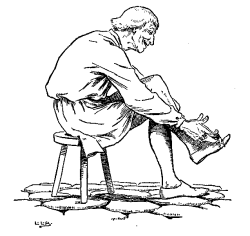
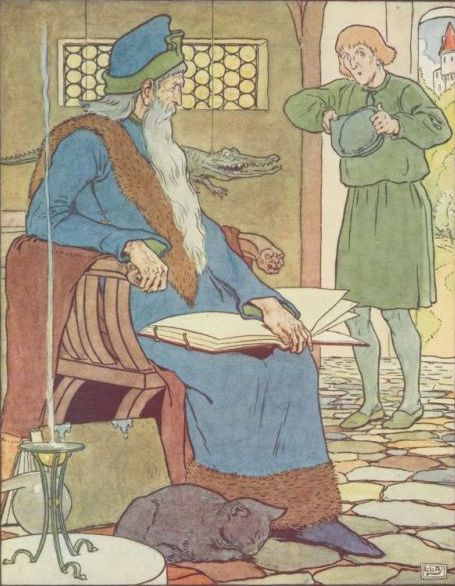
Long ago, in the merry days of good King Arthur, there lived a ploughman and his wife. They were very poor, but would have been contented and happy if only they could have had a little child. One day, having heard of the great fame of the magician Merlin, who was living at the Court of King Arthur, the wife persuaded her husband to go and tell him of their trouble. Having arrived at the Court, the man besought Merlin with tears in his eyes to give them a child, saying that they would be quite content even though it should be no bigger than his thumb. Merlin determined to grant the request, and what was the countryman's astonishment to find when he reached home that his wife had a son, who, wonderful to relate, was no bigger than his father's thumb!


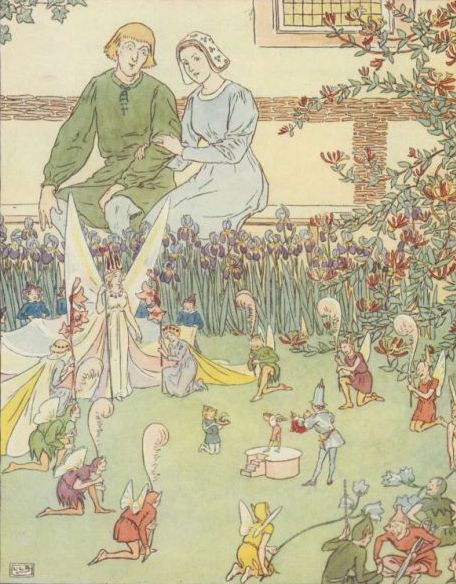
The parents were now very happy, and the christening of the little fellow took place with great ceremony. The Fairy Queen, attended by all her company of elves, was present at the feast. She kissed the little child, and, giving it the name of Tom Thumb, told her fairies to fetch the tailors of her Court, who dressed her little godson according to her orders. His hat was made of a beautiful oak leaf, his shirt of a fine spider's web, and his hose and doublet were of thistledown, his stockings were made with the rind of a delicate green apple, and the garters were two of the finest little hairs imaginable, plucked from his mother's eyebrows, while his shoes were made of the skin of a little mouse. When he was thus dressed, the Fairy Queen kissed him once more, and, wishing him all good luck, flew off with the fairies to her Court.

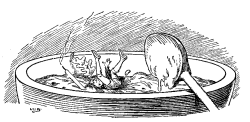

As Tom grew older, he became very amusing and full of tricks, so that his mother was afraid to let him out of her sight. One day, while she was making a batter pudding, Tom stood on the edge of the bowl, with a lighted candle in his hand, so that she might see that the pudding was made properly. Unfortunately, however, when her back was turned, Tom fell into the bowl, and his mother, not missing him, stirred him up in the pudding, tied it in a cloth, and put it into the pot. The batter filled Tom's mouth, and prevented him from calling out, but he had no sooner felt the hot water, than he kicked and struggled so much that the pudding jumped about in the pot, and his mother, thinking the pudding was bewitched, was nearly frightened out of her wits. Pulling it out of the pot, she ran with it to her door, and gave it to a tinker who was passing. He was very thankful for it, and looked forward to having a better dinner than he had enjoyed for many a long day. But his pleasure did not last long, for, as he was getting over a stile, he happened to sneeze very hard, and Tom, who had been quite quiet inside the pudding for some time, called out at the top of his little voice, "Hallo, Pickens!" This so terrified the tinker that he flung away the pudding, and ran off as fast as he could. The pudding was all broken to pieces by the fall, and Tom crept out, covered with batter, and ran home to his mother, who had been looking everywhere for him, and was delighted to see him again. She gave him a bath in a cup, which soon washed off all the pudding, and he was none the worse for his adventure.
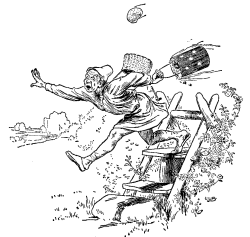
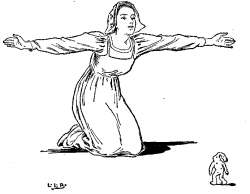
A few days after this, Tom accompanied his mother when she went into the fields to milk the cows, and, fearing he might be blown away by the wind, she tied him to a sow-thistle with a little piece of thread. While she was milking, a cow came by, bit off the thistle, and swallowed up Tom. Poor Tom did not like her big teeth, and called out loudly, "Mother, mother!" "But where are you, Tommy, my dear Tommy?" cried out his mother, wringing her hands. "Here, mother," he shouted, "inside the red cow's mouth!" And, saying that, he began to kick and scratch till the poor cow was nearly mad, and at length tumbled him out of her mouth. On seeing this, his mother rushed to him, caught him in her arms, and carried him safely home.

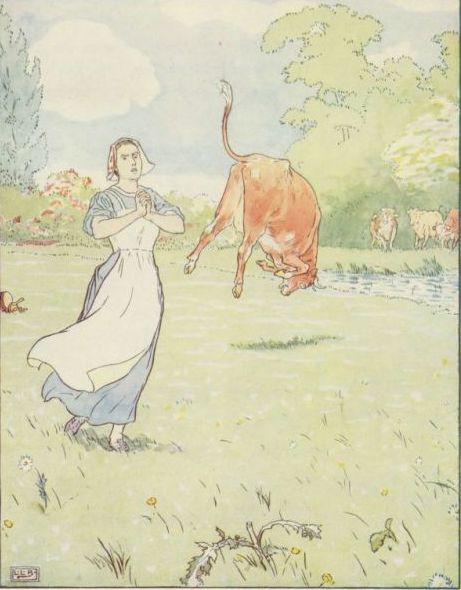
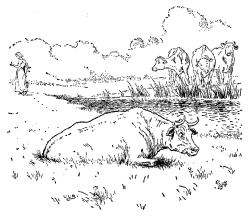
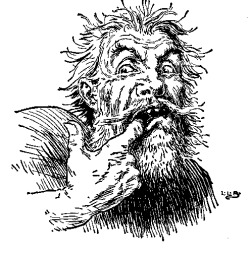
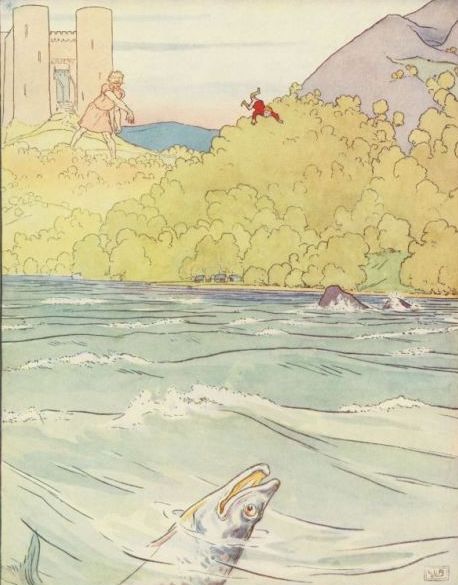
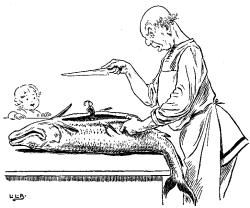
Some days after this, his father took him to the fields a-ploughing, and gave him a whip, made of a barley straw, with which to drive the oxen; but little Tom was soon lost in a furrow. An eagle seeing him, picked him up and flew with him to the top of a hill where stood a giant's castle. The giant put him at once into his mouth, intending to swallow him up, but Tom made such a great disturbance when he got inside that the monster was soon glad to get rid of him, and threw him far away into the sea. But he was not drowned, for he had scarcely touched the water before he was swallowed by a large fish, which was shortly afterwards captured and brought to King Arthur, as a present, by the fisherman. When the fish was opened, everyone was astonished at finding Tom inside. He was at once carried to the King, who made him his Court dwarf.
The Queen was delighted with the little boy, and made him dance a gaillard on her left hand. He danced so well that King Arthur gave him a ring, which he wore round his waist like a girdle.
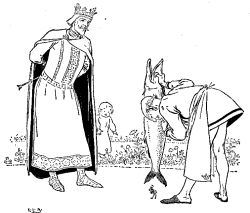
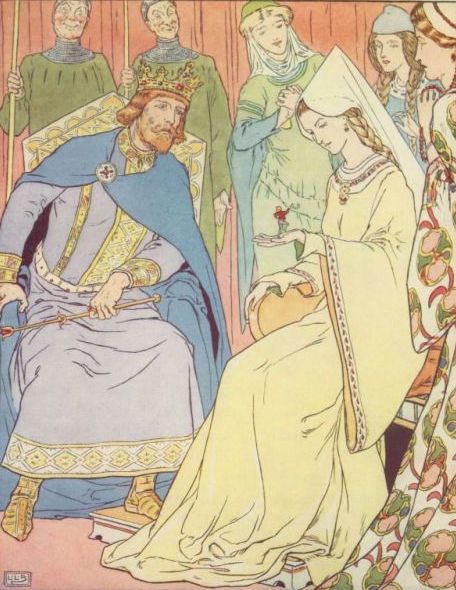
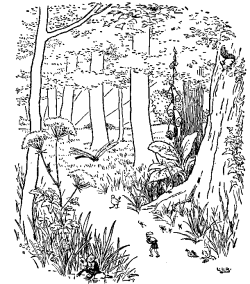
Tom soon began to long to see his parents again, and begged the King to allow him to go home for a short time. This was readily permitted, and the King told him he might take with him as much money as he could carry.
He had to rest more than a hundred times by the way, but, after two days and two nights, he reached his father's house in safety. His mother saw him coming, and ran out to meet him, and there was great rejoicing at his arrival. He spent three happy days at home, and then set out for the Court once more.
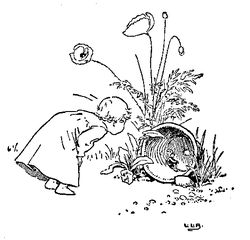
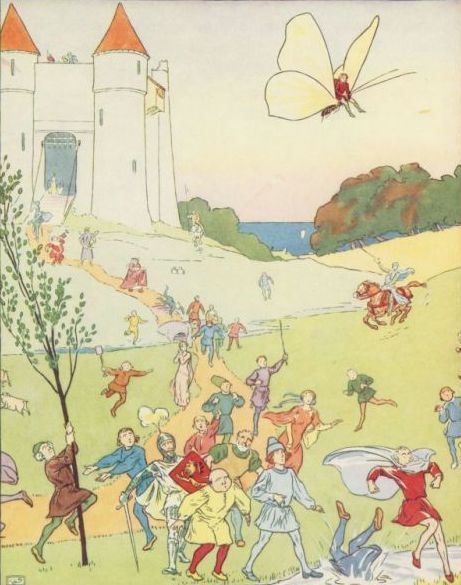
Shortly after his return, he one day displeased the King, so, fearing the royal anger, he crept into an empty flower-pot, where he lay for a long time. At last he ventured to peep out, and, seeing a fine large butterfly on the ground close by, he stole out of his hiding-place, jumped on its back, and was carried up into the air. The King and nobles all strove to catch him, but at last poor Tom fell from his seat into a watering-pot, in which he was almost drowned, only luckily the gardener's child saw him, and pulled him out. The King was so pleased to have him safe once more that he forgot to scold him, and made much of him instead.
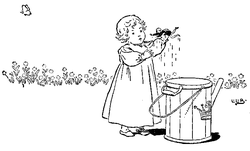
Tom afterwards lived many years at Court, one of the best beloved of King Arthur's knights.
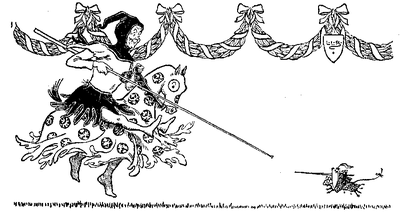

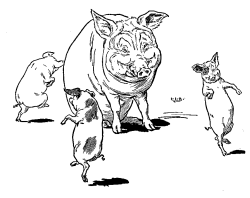
Once upon a time there was an old Sow with three little Pigs, and as she had not enough to keep them, she sent them out to seek their fortune.
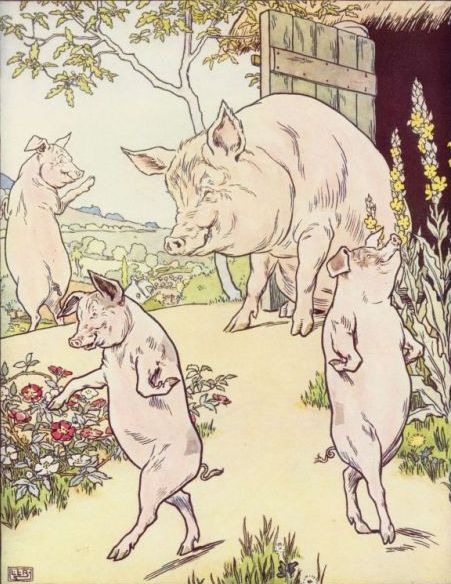

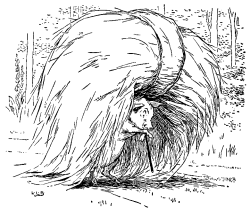
The first that went off met a Man with a bundle of straw, and said to him, "Please, Man, give me that straw to build me a house"; which the Man did, and the little Pig built a house with it. Presently came along a Wolf, and knocked at the door, and said, "Little Pig, little Pig, let me come in."
To which the Pig answered, "No, no, by the hair of my chinny chin chin."
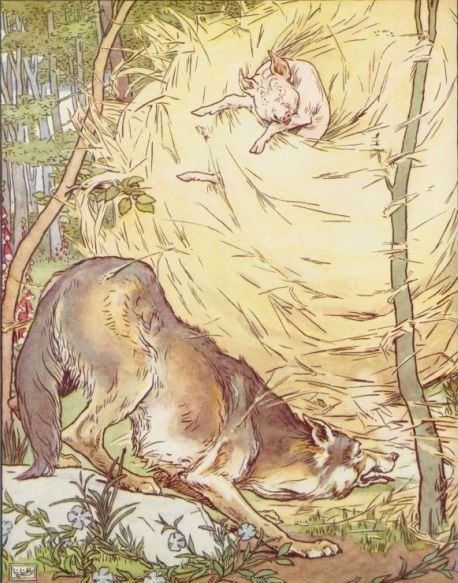
"Then I'll huff and I'll puff, and I'll blow your house in!" said the Wolf. So he huffed, and he puffed, and he blew his house in, and ate up the little Pig.
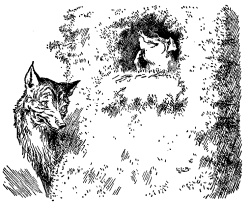
The second Pig met a Man with a bundle of furze, and said, "Please, Man, give me that furze to build a house"; which the Man did, and the Pig built his house. Then along came the Wolf and said, "Little Pig, little Pig, let me come in."
"No, no, by the hair of my chinny chin chin."
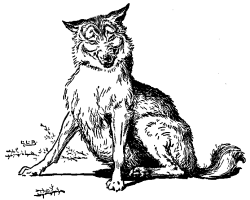
"Then I'll puff and I'll huff, and I'll blow your house in!" So he huffed and he puffed, and he puffed and he huffed, and at last he blew the house down, and ate up the second little Pig.
The third little Pig met a Man with a load of bricks, and said, "Please, Man, give me those bricks to build a house with"; so the Man gave him the bricks, and he built his house with them. So the Wolf came, as he did to the other little Pigs, and said, "Little Pig, little Pig, let me come in."
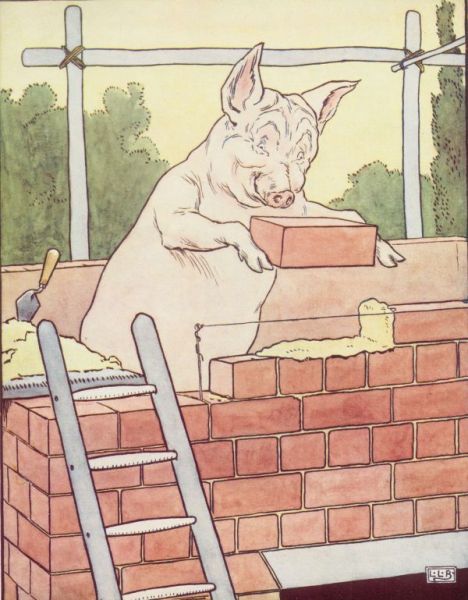
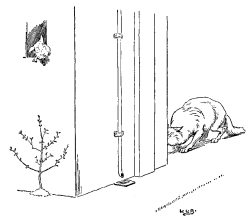
"No, no, by the hair of my chinny chin chin." "Then I'll huff and I'll puff, and I'll blow your house in." Well, he huffed and he puffed, and he huffed and he puffed, and he puffed and he huffed; but he could not get the house down. When he found that he could not, with all his huffing and puffing, blow the house down, he said, "Little Pig, I know where there is a nice field of turnips."
"Where?" said the little Pig.
"Oh, in Mr. Smith's home-field; and if you will be ready to-morrow morning, I will call for you, and we will go together and get some for dinner."
"Very well," said the little Pig, "I will be ready. What time do you mean to go?"
"Oh, at six o'clock."
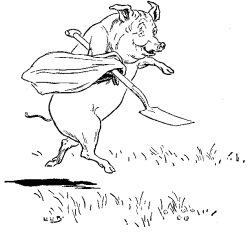
Well, the little Pig got up at five, and got the turnips and was home again before six. When the Wolf came he said, "Little Pig, are you ready?"
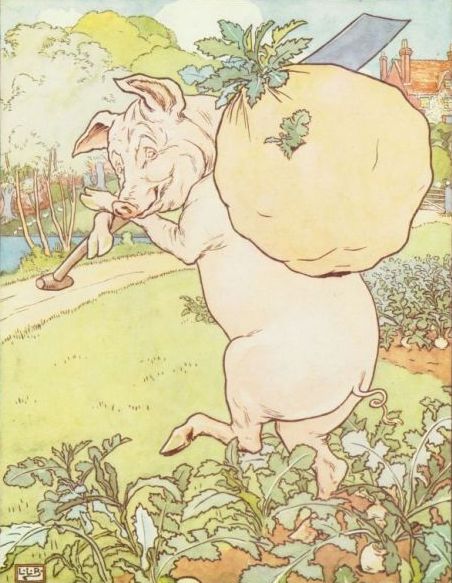

"Ready!" said the little Pig, "I have been and come back again, and got a nice pot-full for dinner."
The Wolf felt very angry at this, but thought that he would be up to the little Pig somehow or other; so he said, "Little Pig, I know where there is a nice apple-tree." "Where?" said the Pig.
"Down at Merry-garden," replied the Wolf; "and if you will not deceive me I will come for you, at five o'clock to-morrow, and we will go together and get some apples."
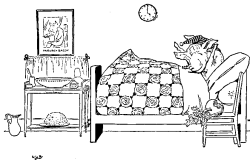
Well, the little Pig woke at four the next morning, and bustled up, and went off for the apples, hoping to get back before the Wolf came; but he had farther to go, and had to climb the tree, so that just as he was coming down from it, he saw the Wolf coming, which, as you may suppose, frightened him very much. When the Wolf came up he said, "Little Pig, what! are you here before me? Are they nice apples?"
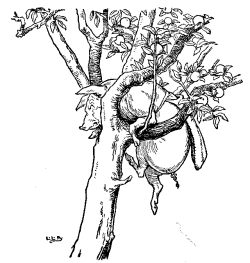
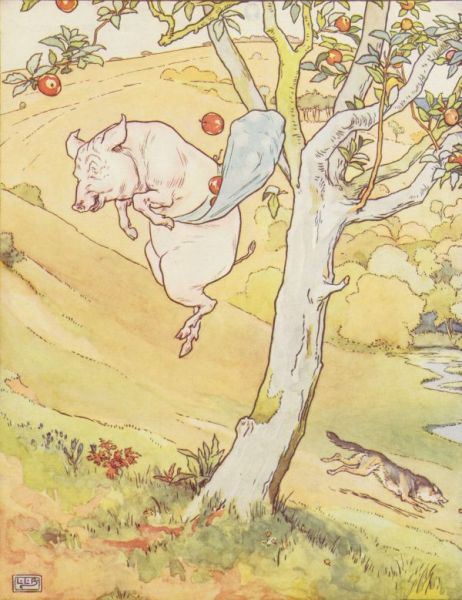
"Yes, very," said the little Pig; "I will throw you down one." And he threw it so far that, while the Wolf was gone to pick it up, the little Pig jumped down and ran home.
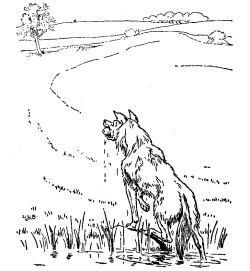
The next day the Wolf came again, and said to the little Pig, "Little Pig, there is a Fair in the Town this afternoon: will you go?"
"Oh, yes," said the Pig, I will go; what time shall you be ready?"
"At three," said the Wolf.
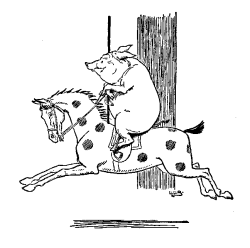
So the little Pig went off before the time, as usual, and got to the Fair, and bought a butter churn, and was on his way home with it when he saw the Wolf coming. Then he could not tell what to do. So he got into the churn to hide, and in doing so turned it round, and it began to roll, and rolled down the hill with the Pig inside it, which frightened the Wolf so much that he ran home without going to the Fair.
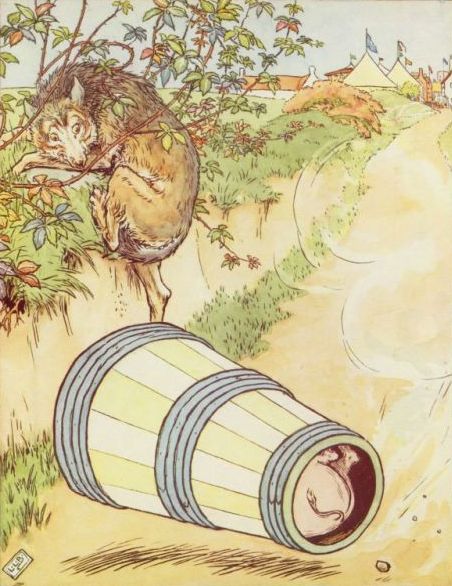

He went to the little Pig's house, and told him how frightened he had been by a great round thing which came down the hill past him.
Then the little Pig said, "Hah! I frightened you, did I? I had been to the Fair and bought a butter churn, and when I saw you I got into it, and rolled down the hill."
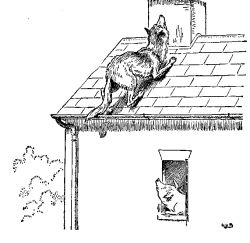
Then the Wolf was very angry indeed, and declared he would eat up the little Pig, and that he would get down the chimney after him.
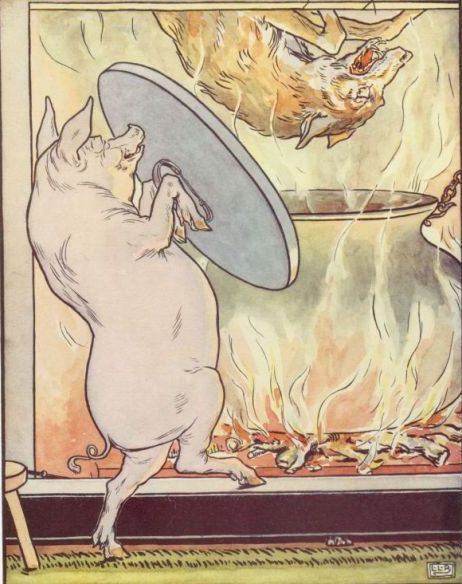
When the little Pig saw what he was about, he hung on the pot full of water, and made up a blazing fire, and, just as the Wolf was coming down, took off the cover of the pot, and in fell the Wolf. And the little Pig put on the cover again in an instant, boiled him up, and ate him for supper, and lived happy ever after.
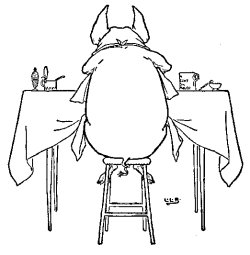
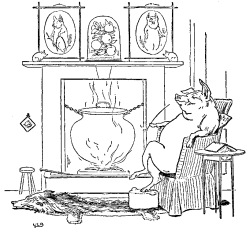
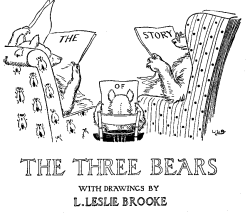
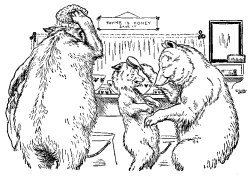
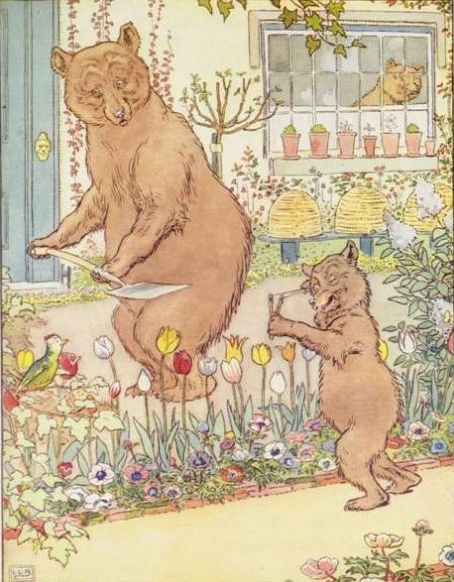
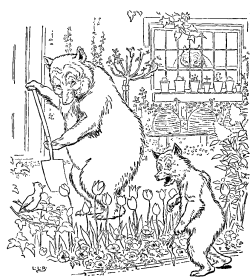
Once upon a time there were Three Bears, who lived together in a house of their own, in a wood. One of them was a Little, Small, Wee Bear; and one was a Middle-sized Bear, and the other was a Great, Huge Bear. They had each a pot for their porridge; a little pot for the Little, Small, Wee Bear; and a middle-sized pot for the Middle Bear, and a great pot for the Great, Huge Bear. And they had each a chair to sit in; a little chair for the Little, Small, Wee Bear; and a middle-sized chair for the Middle Bear, and a great chair for the Great, Huge Bear. And they had each a bed to sleep in; a little bed for the Little, Small, Wee Bear; and a middle-sized bed for the Middle Bear, and a great bed for the Great, Huge Bear.
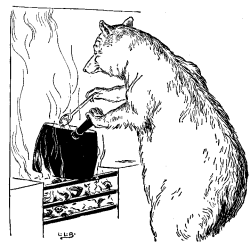
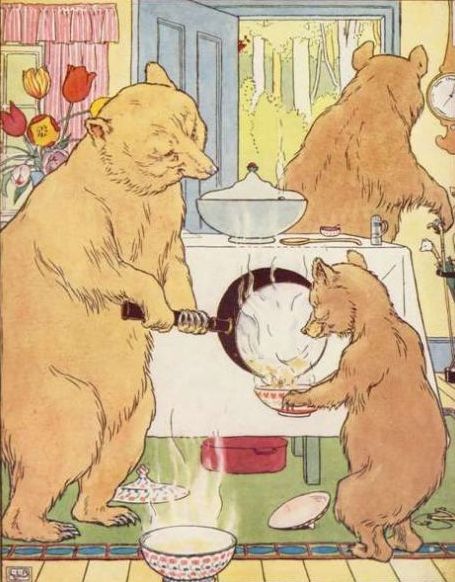
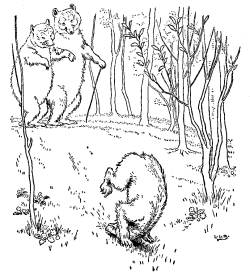
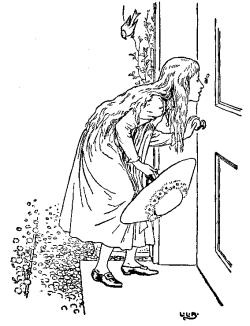
One day, after they had made the porridge for their breakfast, and poured it into their porridge-pots, they walked out into the wood while the porridge was cooling, that they might not burn their mouths by beginning too soon to eat it. And while they were walking, a little Girl called Goldenlocks came to the house. First she looked in at the window, and then she peeped in at the keyhole; and seeing nobody in the house, she turned the handle of the door. The door was not fastened, because the Bears were good Bears, who did nobody any harm, and never suspected that anybody would harm them. So Goldenlocks opened the door, and went in; and well pleased she was when she saw the porridge on the table. If she had been a thoughtful little Girl, she would have waited till the Bears came home, and then, perhaps, they would have asked her to breakfast; for they were good Bears—a little rough or so, as the manner of Bears is, but for all that very good-natured and hospitable. But the porridge looked tempting, and she set about helping herself.
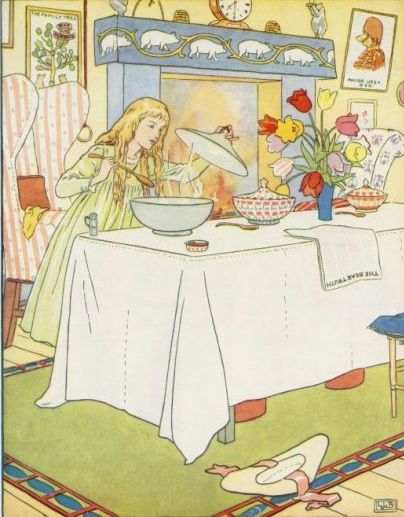
So first she tasted the porridge of the Great, Huge Bear, and that was too hot for her. And then she tasted the porridge of the Middle Bear, and that was too cold for her. And then she went to the porridge of the Little, Small, Wee Bear, and tasted that; and that was neither too hot nor too cold, but just right, and she liked it so well that she ate it all up.
Then Goldenlocks sat down in the chair of the Great, Huge Bear, and that was too hard for her. And then she sat down in the chair of the Middle Bear, and that was too soft for her. And then she sat down in the chair of the Little, Small, Wee Bear, and that was neither too hard nor too soft, but just right. So she seated herself in it, and there she sat till the bottom of the chair came out, and down she came plump upon the ground.
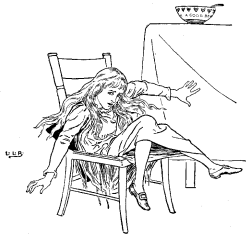
Then Goldenlocks went upstairs into the bedchamber in which the three Bears slept. And first she lay down upon the bed of the Great, Huge Bear, but that was too high at the head for her. And next she lay down upon the bed of the Middle Bear, and that was too high at the foot for her. And then she lay down upon the bed of the Little, Small, Wee Bear; and that was neither too high at the head nor at the foot, but just right. So she covered herself up comfortably, and lay there till she fell fast asleep.
By this time the Three Bears thought their porridge would be cool enough; so they came home to breakfast. Now Goldenlocks had left the spoon of the Great, Huge Bear standing in his porridge.
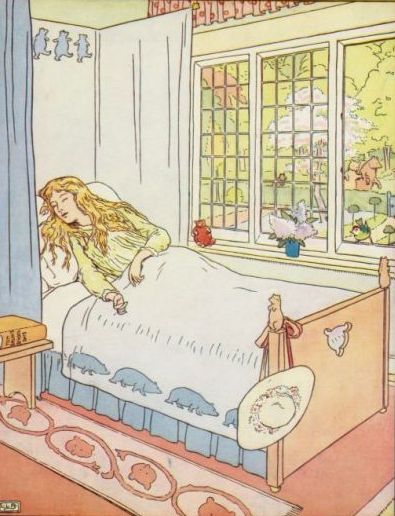
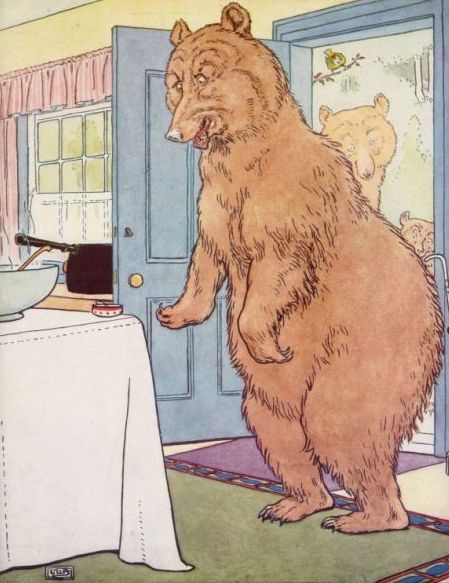
"SOMEBODY HAS BEEN AT MY PORRIDGE!" said the Great, Huge Bear, in his great, rough, gruff voice. And when the Middle Bear looked at hers, she saw that the spoon was standing in it too.

"SOMEBODY HAS BEEN AT MY PORRIDGE!" said the Middle Bear, in her middle voice. Then the Little, Small, Wee Bear looked at his, and there was the spoon in the porridge-pot, but the porridge was all gone.
"SOMEBODY HAS BEEN AT MY PORRIDGE, AND HAS EATEN IT ALL UP!" said the Little, Small, Wee Bear, in his little, small, wee voice.
Upon this the Three Bears, seeing that someone had entered their house, and eaten up the Little, Small, Wee Bear's breakfast, began to look about them. Now Goldenlocks had not put the hard cushion straight when she rose from the chair of the Great, Huge Bear.
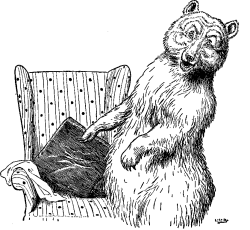
"SOMEBODY HAS BEEN SITTING IN MY CHAIR!" said the Great, Huge Bear, in his great, rough, gruff voice.

And Goldenlocks had squatted down the soft cushion of the Middle Bear.
"SOMEBODY HAS BEEN SITTING IN MY CHAIR!" said the Middle Bear, in her middle voice.
And you know what Goldenlocks had done to the third chair.
"SOMEBODY HAS BEEN SITTING IN MY CHAIR, AND HAS SAT THE BOTTOM OUT OF IT!" said the Little, Small, Wee Bear, in his little, small, wee voice.

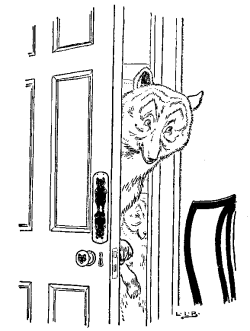
Then the Three Bears thought it necessary that they should make farther search; so they went upstairs into their bedchamber. Now Goldenlocks had pulled the pillow of the Great, Huge Bear out of its place.
"SOMEBODY HAS BEEN LYING IN MY BED!" said the Great, Huge Bear, in his great, rough, gruff voice.
And Goldenlocks had pulled the bolster of the Middle Bear out of its place.
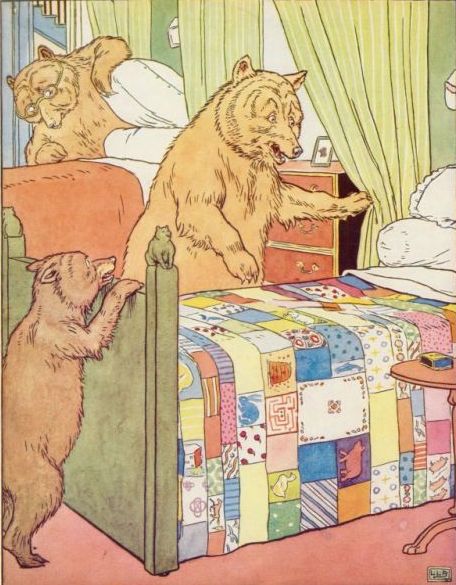
"SOMEBODY HAS BEEN LYING IN MY BED!" said the Middle Bear, in her middle voice.
And when the Little, Small, Wee Bear came to look at his bed, there was the bolster in its place; and the pillow in its place upon the bolster; and upon the pillow was the head of Goldenlocks—which was not in its place, for she had no business there.
"SOMEBODY HAS BEEN LYING IN MY BED—AND HERE SHE IS!" said the Little, Small, Wee Bear, in his little, small, wee voice.

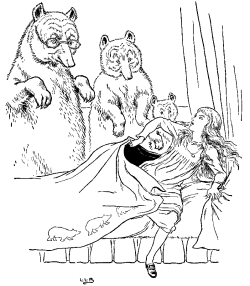
Goldenlocks had heard in her sleep the great, rough, gruff voice of the Great, Huge Bear, and the middle voice of the Middle Bear, but it was only as if she had heard someone speaking in a dream. But when she heard the little, small, wee voice of the Little, Small, Wee Bear, it was so sharp, and so shrill, that it awakened her at once. Up she started; and when she saw the Three Bears on one side of the bed she tumbled herself out at the other, and ran to the window. Now the window was open, because the Bears, like good, tidy Bears, as they were, always opened their bedchamber window when they got up in the morning. Out Goldenlocks jumped, and ran away as fast as she could run—never looking behind her; and what happened to her afterwards I cannot tell. But the Three Bears never saw anything more of her.


Little Red Hen lived in a
barnyard. She spent almost all of
her time walking about the barnyard
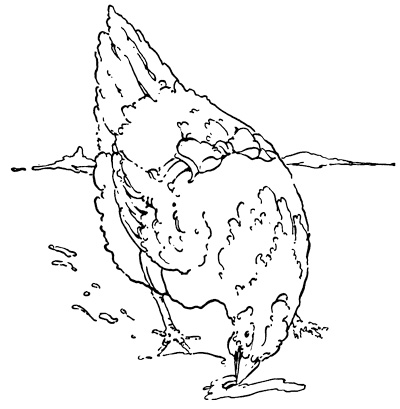
in
her
picketty-pecketty
fashion,
scratching
everywhere
for
worms.

he dearly loved fat, delicious worms and felt they were absolutely necessary to the health of her children. As
 often as
often as
she
found a
worm
she
would
call
“Chuck-chuck-chuck!” to her chickies.

hen they were gathered about her, she would distribute choice morsels of her tid-bit. A busy little body was she!
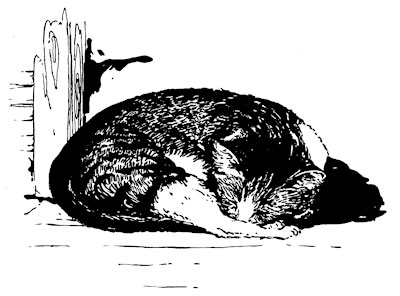
A cat usually napped lazily in the barn door, not even bothering herself to scare the rat who ran here and there as
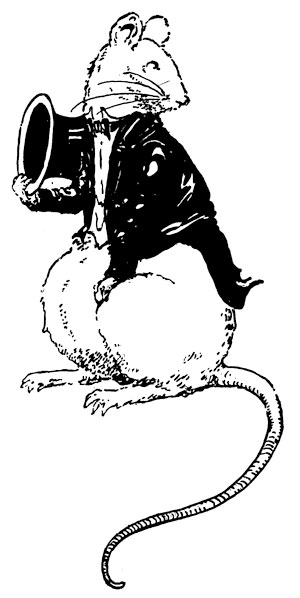
he pleased.
And
as for
the pig
who lived
in the
sty—he
did
not care what
happened so long as he could eat and grow fat.

ne day the Little Red Hen found a Seed. It was a Wheat Seed, but the Little Red Hen was so accustomed to bugs and worms that she supposed this to be some new and perhaps very delicious kind of meat. She bit it gently and found that it resembled a worm in no way whatsoever as to taste although because it was long and slender, a Little Red Hen might easily be fooled by its appearance.

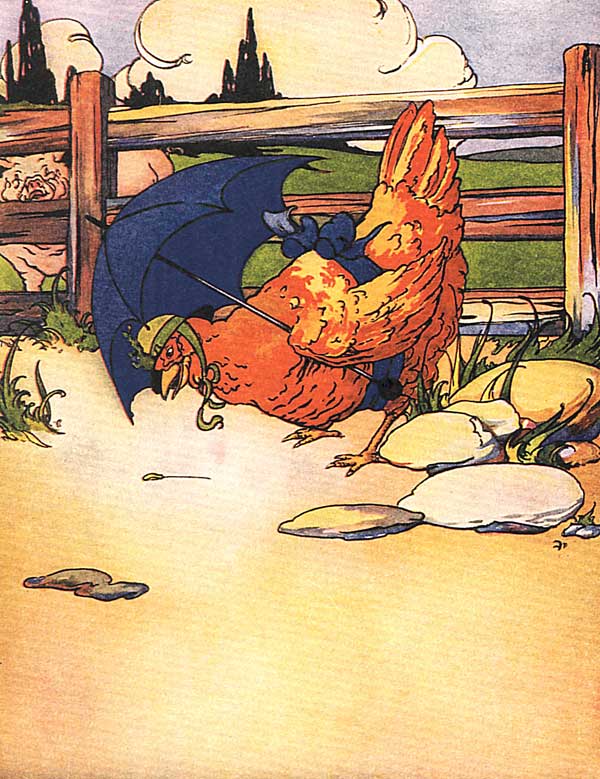

arrying it about, she made many inquiries as to what it might be. She found it was a Wheat Seed and that, if planted, it would grow up and when ripe it could 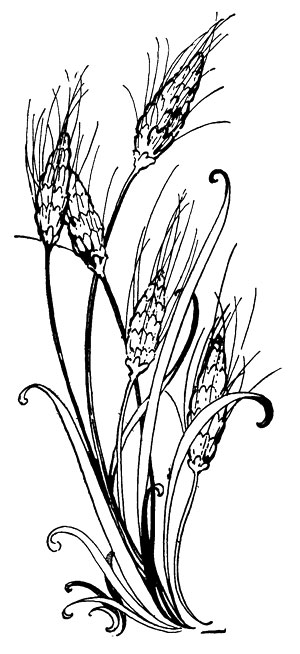 be made into flour and then into bread.
be made into flour and then into bread.
When she discovered
that, she knew it ought
to be planted. She was
so busy hunting food for
herself and her family
that, naturally, she
thought she ought not
to take time to plant it.
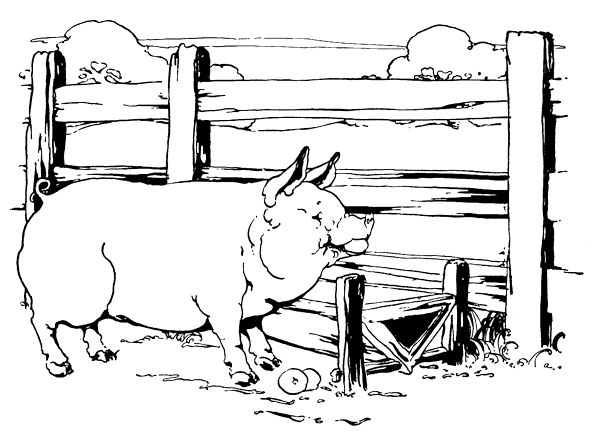

o she thought of the Pig—upon whom time must hang heavily and of the Cat who had nothing to do, and of the great fat Rat with his idle hours, and she called loudly:

“Who
will
plant
the
Seed?”
But the Pig said, “Not I,”
and the Cat said, “Not I,”
and the Rat said, “Not I.”
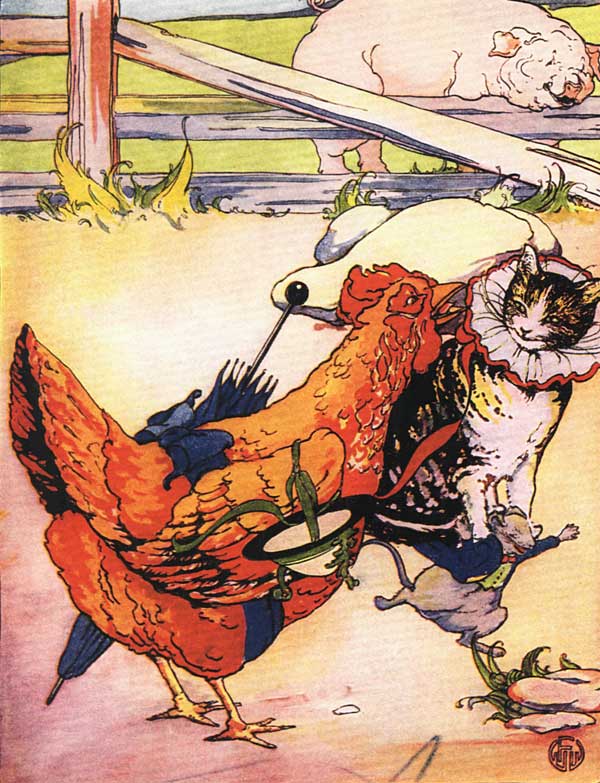
“Well, then,” said the Little Red Hen, “I will.”
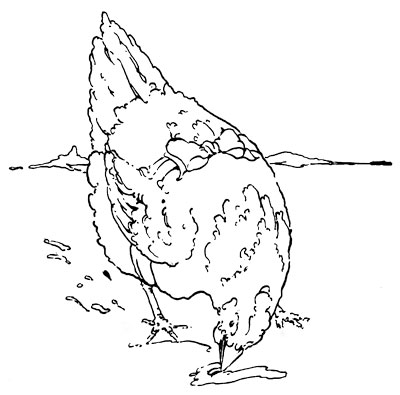
And she did.
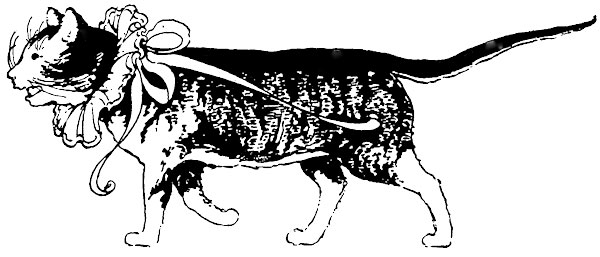

hen she went on with her daily duties through the long summer days, scratching for worms and feeding her chicks, while
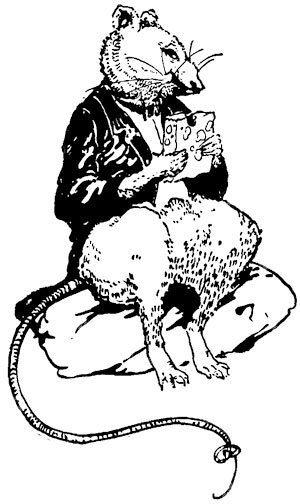 the Pig grew fat,
the Pig grew fat,
and the Cat grew fat,
and the Rat grew fat,
and the Wheat
grew tall and
ready for
harvest.

o one day the Little Red Hen chanced to notice how large the Wheat was and that the grain was ripe, so she ran about calling briskly: “Who will cut the Wheat?”
The Pig said, “Not I,”
the Cat said, “Not I,”
and the Rat said, “Not I.”
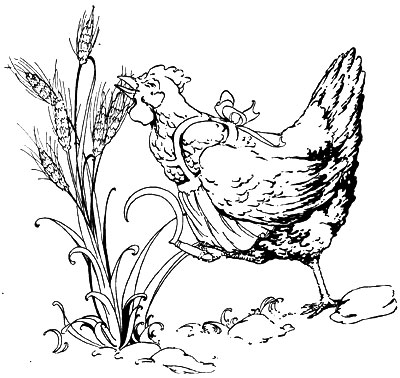
“Well,
then,”
said the
Little
Red Hen,
“I will.”
And she did.

he got the sickle from among the farmer's tools in the barn and proceeded to cut off all of the big plant of Wheat.
On the ground lay the nicely cut Wheat, ready to be gathered and threshed, but the newest and yellowest and downiest of Mrs.
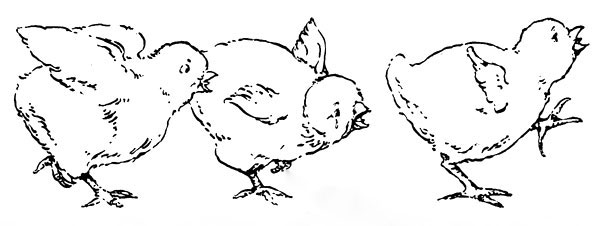
Hen's chicks set up a “peep-peep-peeping” in their most vigorous fashion, proclaiming to the world at large, but most particularly to their mother, that she was neglecting them.
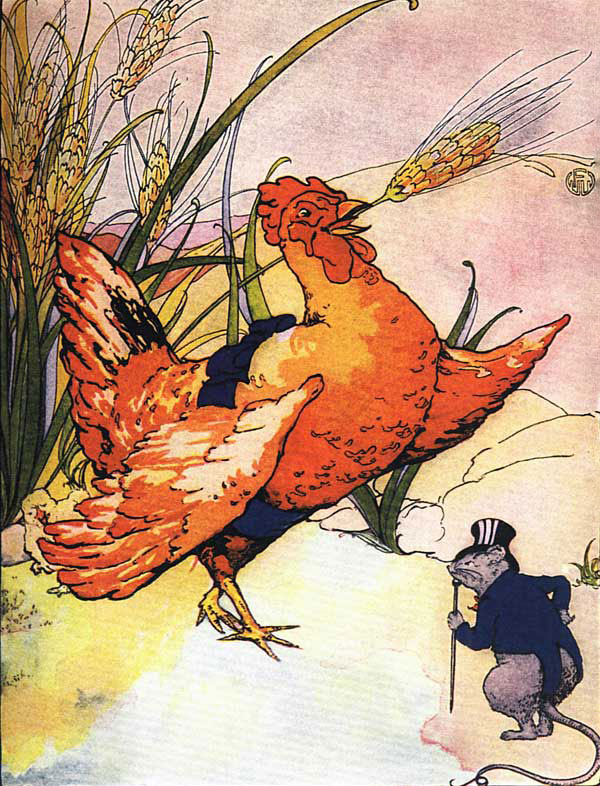

oor Little Red Hen! She felt quite bewildered and hardly knew where to turn.
Her attention was sorely divided between her duty to her children and her duty to the Wheat, for which she felt responsible.
So, again, in a very hopeful tone, she called out, “Who will thresh the Wheat?”
But the Pig, with a grunt, said, “Not I,” and the Cat, with a meow, said, “Not I,” and the Rat, with a squeak, said, “Not I.”
So the Little Red Hen, looking, it must be admitted, rather discouraged, said, “Well, I will, then.”
And she did.
Of course, she had to feed her babies first, though, and when she had gotten them all to sleep for their afternoon nap, she
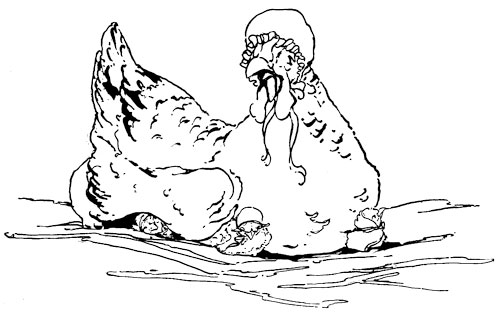
went out and threshed the Wheat. Then she called out: “Who will carry the Wheat to the mill to be ground?”
Turning their backs with snippy glee, that Pig said, “Not I,”
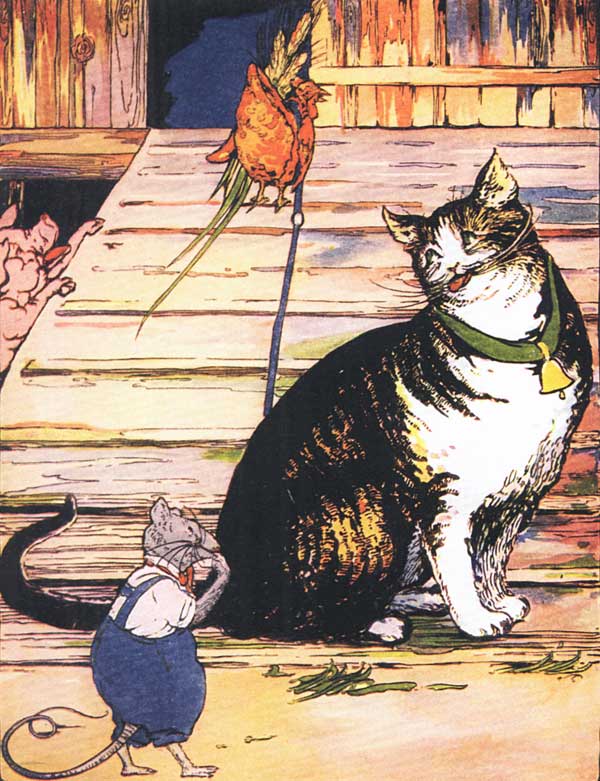
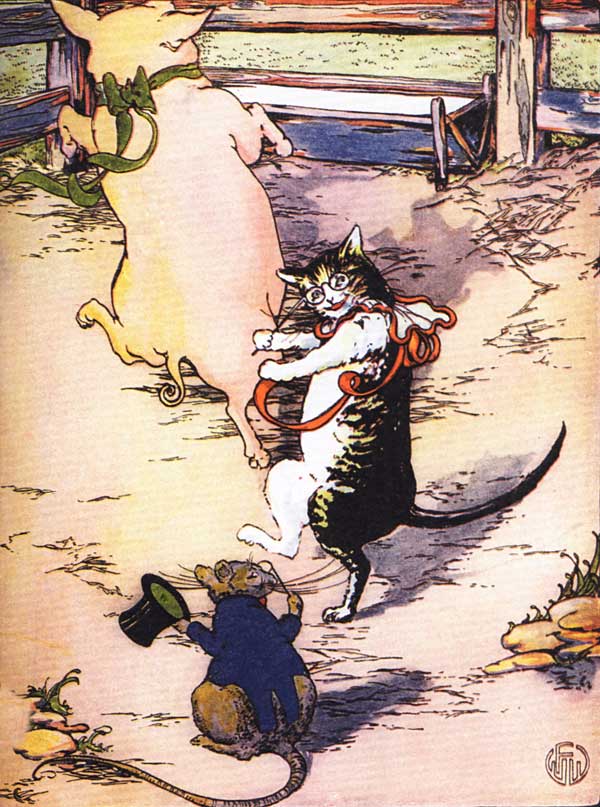
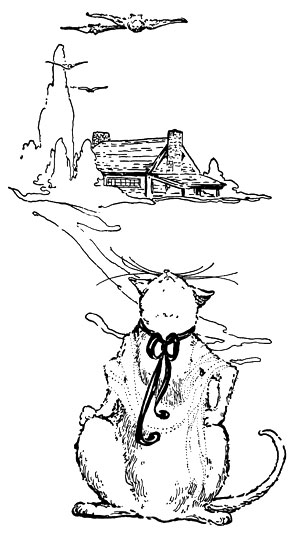
and
that
Cat
said,
“Not I,”
and
that
Rat
said,
“Not I.”

o the good Little Red Hen could do nothing but say, “I will then.” And she did.
Carrying the sack of Wheat, she trudged off to the distant mill. There she ordered the Wheat ground into beautiful white flour. When the miller brought her the
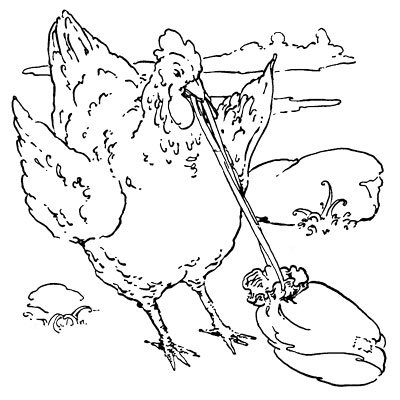
flour she
walked
slowly
back all
the way
to her own
barnyard
in her own
picketty-pecketty
fashion.
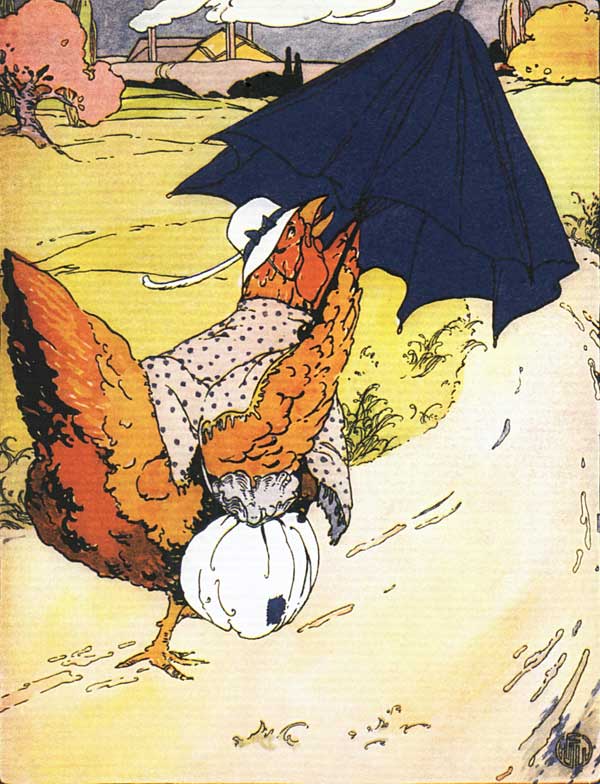


he even managed, in spite of her load, to catch a nice juicy worm now and then and had one left for the babies when she reached them. Those cunning little fluff-balls were so glad to see their mother. For the first time, they really appreciated her.
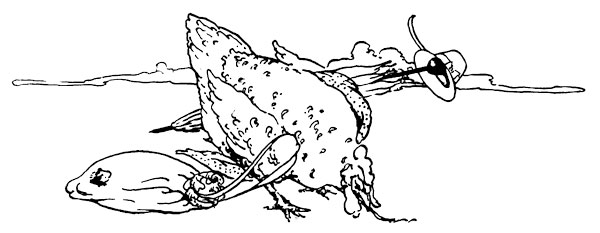
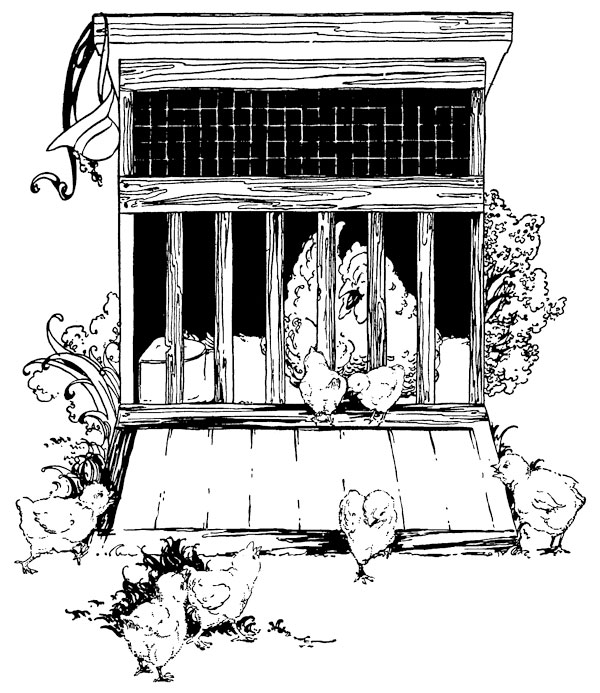
After this really strenuous day Mrs. Hen retired to her slumbers earlier than usual—indeed, before the colors came into the sky to herald the setting of the sun, her usual bedtime hour.
She would have liked to sleep late in the morning, but her chicks, joining in the morning chorus of the hen yard, drove away all hopes of such a luxury.
Even as she sleepily half opened one eye, the thought came to her that to-day that Wheat must, somehow, be made into bread.
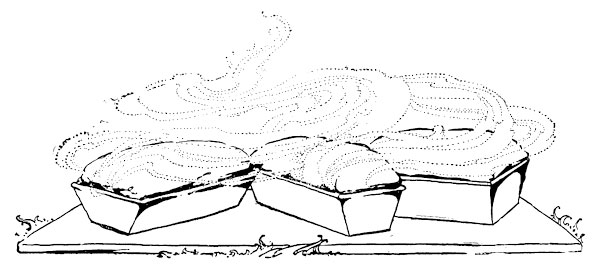
She was not in the habit of making bread, although, of course, anyone can make it if he or she follows the recipe with care, and she knew perfectly well that she could do it if necessary.
So after her children were fed and made sweet and fresh for the day, she hunted up the Pig, the Cat and the Rat.
Still confident that they would
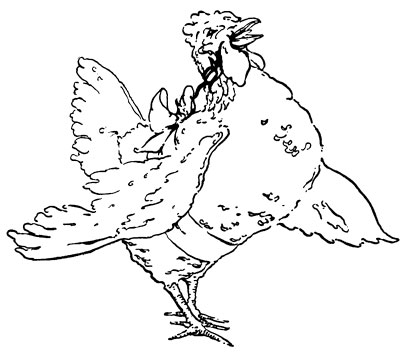
surely help
her some day
she sang out,
“Who will
make the
bread?”

las for the Little Red Hen! Once
more her hopes were dashed! For
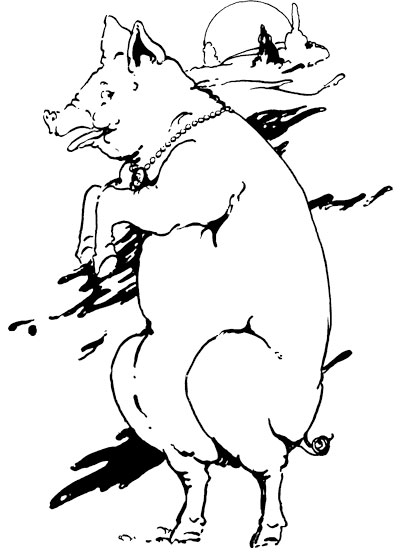
the
Pig
said,
“Not
I,”

the
Cat
said,
“Not
I,”
and
the
Rat
said,
“Not
I.”

o the Little Red Hen said once more, “I will then,” and she did.
Feeling that she might have known all the time that she would have to do it all herself, she went and put on a fresh apron and spotless cook's cap. First of all she set the dough, as was proper. When it was time she brought out the moulding board and the baking tins, moulded the bread, divided it into loaves, and put them into the oven to bake. All the while the Cat sat lazily by, giggling and chuckling.
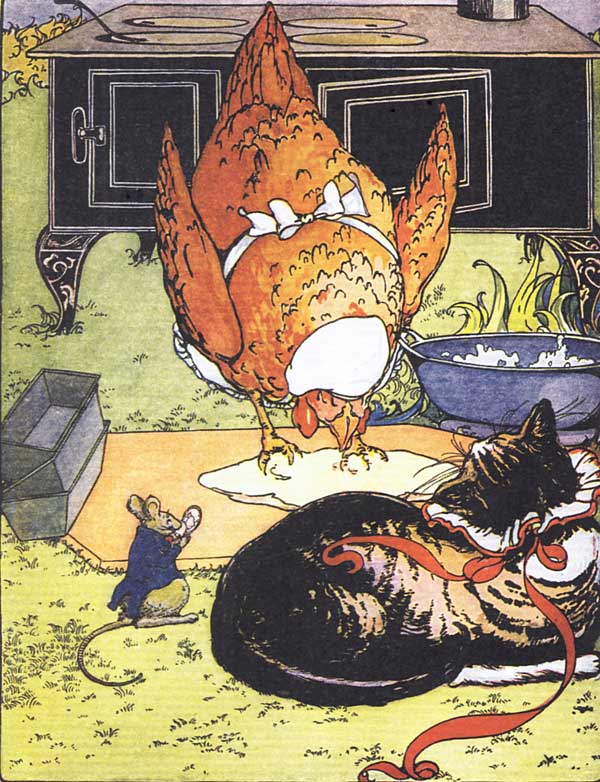

And close at
hand the
vain Rat
powdered
his nose
and admired
himself
in a mirror.
In the distance
could be
heard the long-drawn
snores of
the dozing Pig.

t last the great moment arrived. A delicious odor was wafted upon the autumn breeze. Everywhere the barnyard citizens sniffed the air with delight.

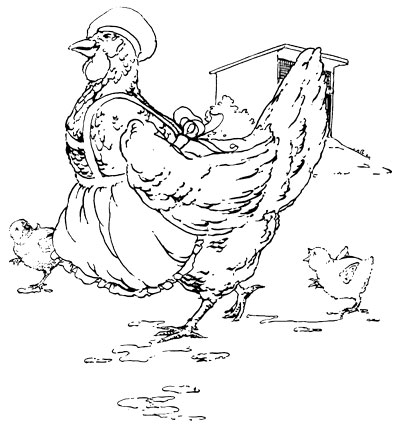
The Red Hen ambled in her picketty-pecketty way toward the source of all this excitement.

lthough she appeared to be perfectly calm, in reality she could only with difficulty restrain an impulse to dance and sing, for had she not

done
all
the
work
on
this
wonderful
bread?

mall wonder that she was the most excited person in the barnyard!
She did not know whether the bread would be fit to eat, but—joy of joys!—when the lovely brown loaves came out of the oven,

they were done to perfection.
Then, probably because she had acquired the habit, the Red Hen called:
“Who
will
eat
the
Bread?”

All the animals in the barnyard were watching hungrily and smacking their lips in anticipation, and
the Pig said, “I will,”
the Cat said, “I will,”
the Rat said, “I will.”
But the Little Red Hen said,
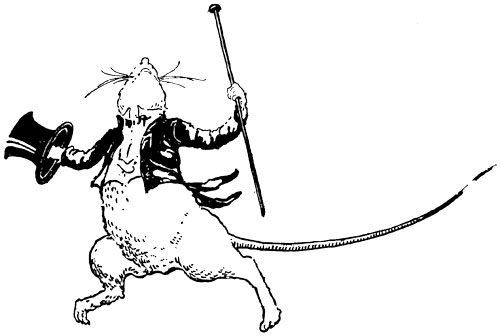
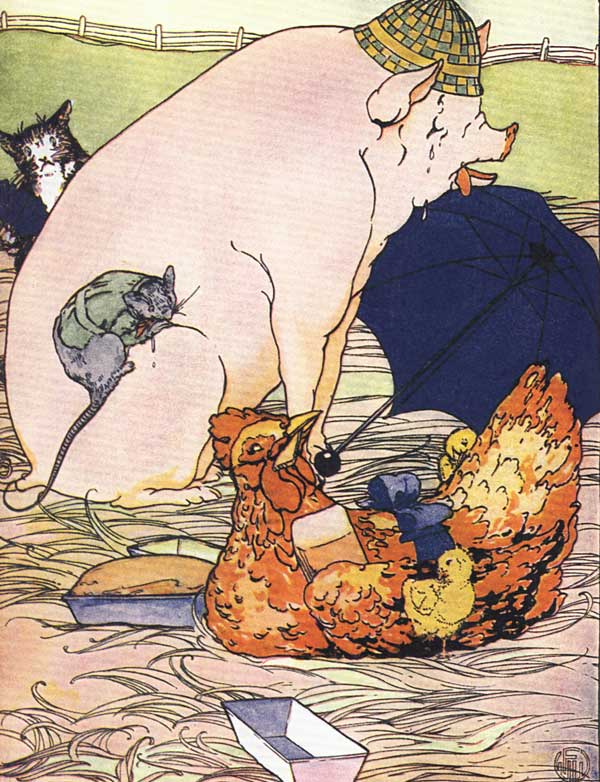
“No, you won't. I will.”

And
she
did.
Once on a time there was a Little Old Woman who lived in a Shoe. This shoe stood near a great forest, and was so large that it served as a house for the Old Lady and all her children, of which she had so many that she did not know what to do with them.
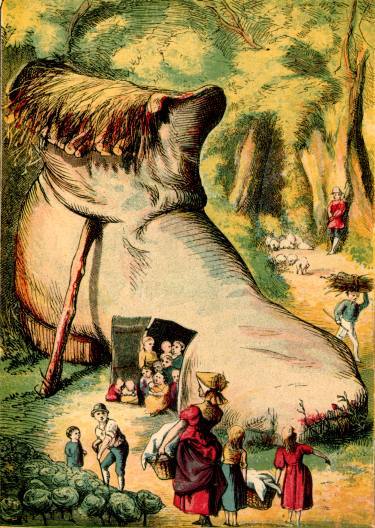
But the Little Old Woman was very fond of her children, and they only thought of the best way to please her. Strong-arm, the eldest, cut down trees for firewood. Peter made baskets of wicker-work. Mark was chief gardener. Lizzie milked the cow, and Jenny taught the younger children to read.
Now this Little Old Woman had not always lived in a Shoe. She and her family had once dwelt in a nice house covered with ivy, and her husband was a wood-cutter, like Strong-arm. But there lived in a huge castle beyond the forest, a fierce giant, who one day came and laid their house in ruins with his club; after which he carried off the poor wood-cutter to his castle beyond the forest. When the Little Old Woman came home, her house was in ruins and her husband was no where to be seen.

Night came on, and as the father did not return, the Old Lady and her family went to search for him. When they came to that part of the wood where the Giant had met their father, they saw an immense shoe. They spent a long time weeping and calling out for their father, but met with no reply. Then the Old Lady thought that they had better take shelter in the shoe until they could build a new house. So Peter and Strong-arm put a roof to it, and cut a door, and turned it into a dwelling. Here they all lived happily for many years, but the Little Old Lady never forgot her husband and his sad fate. Strong-arm, who saw how wretched his mother often was about it, proposed to the next eleven brothers that they should go with him and set their father free from the Giant. Their mother knew the Giant's strength, and would not hear of the attempt, as she feared they would be killed. But Strong-arm was not afraid. He bought a dozen sharp swords, and Peter made as many strong shields and helmets, as well as cross-bows and iron-headed arrows. They were now quite ready; Strong-arm gave the order to march, and they started for the forest. The next day they came in sight of the Giant's Castle. Strong-arm, leaving his brothers in a wood close by, strode boldly up to the entrance, and seized the knocker. The door was opened by a funny little boy with a large head, who kept grinning and laughing.
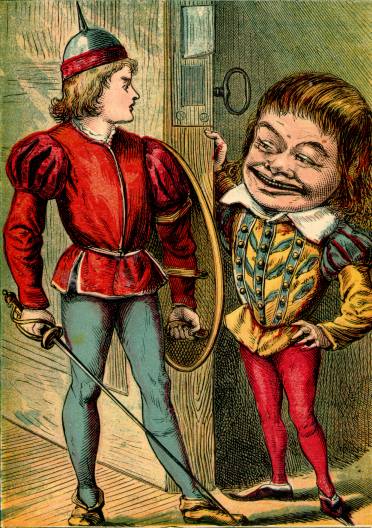
Strong-arm then walked boldly across the court-yard, and presently met a page, who took off his hat and asked him what he wanted. Strong-arm said he had come to liberate his father, who was kept a prisoner by the Giant; on this the little man said he was sorry for him, because the part of the castle in which his father was kept was guarded by a large dragon. Strong-arm, nothing daunted, soon found the monster, who was fast asleep, so he made short work of him by sending his sword right through his heart; at which he jumped up, uttering a loud scream, and made as if he would spring forward and seize Strong-arm; but the good sword had done its work, and the monster fell heavily on the ground, dead.
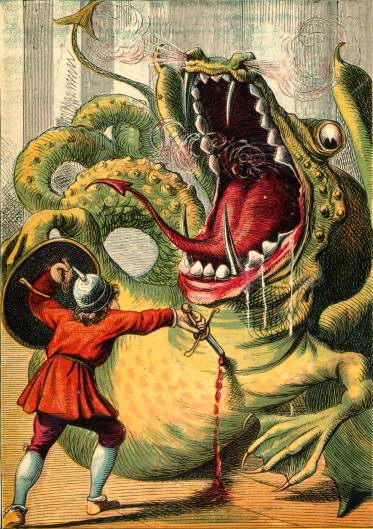
Now the Giant, who had been drinking much wine, was fast asleep in a remote part of the castle. Strong-arm had no sooner finished the Dragon, than up started the funny little boy who had opened the door. He led Strong-arm round to another part of the court-yard, where he saw his poor father, who at once sprung to his feet, and embraced him. Then Strong-arm called up his brothers, and when they had embraced their father, they soon broke his chain and set him free.
We must now return to the Little Old Woman. After her sons had started she gave way to the most bitter grief. While she was in this state, an old witch came up to her, and said she would help her, as she hated the Giant, and wished to kill him. The Old Witch then took the little Old Lady on her broom, and they sailed off through the air, straight to the Giant's castle.
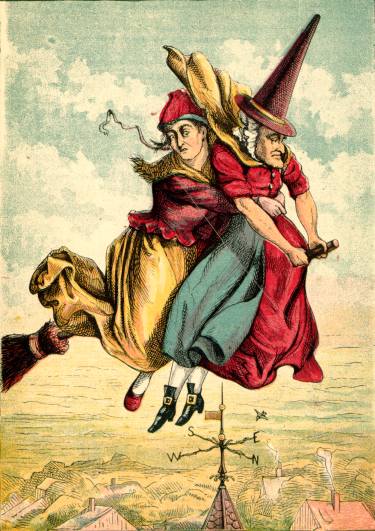
Now this old Witch had great power, and at once afflicted the Giant with corns and tender feet. When he awoke from his sleep he was in such pain that he could bear it no longer, so he thought he would go in search of his missing shoe, which, like the other one he had in his castle, was easy and large for his foot. When he came to the spot where the Old Lady and her children lived, he saw his old shoe, and with a laugh that shook the trees, he thrust his foot into it, breaking through the roof that Strong-arm and Peter had put to it. The children, in great alarm, rushed about inside the shoe, and frightened and trembling, scrambled through the door and the slits which the Giant had formerly made for his corns. By this time the witch and the Little Old Lady, as also Strong-arm, his eleven brother and his father, were come up to the spot. Strong-arm and his brothers shot their arrows at him till at last he fell wounded, when Strong-arm went up to him and cut off his head. Then the father and the Little Old Woman and all their children built a new house, and lived happily ever afterwards.
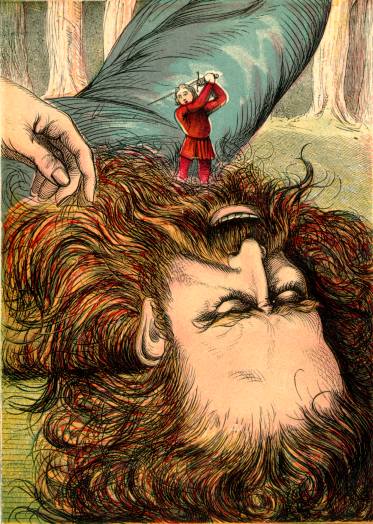
A gentleman of good account
In Norfolk dwelt of late,
Whose wealth and riches did surmount
Most men of his estate.
Sore sick he was, and like to die,
No help his life could save;
His wife by him as sick did lie,
And both were near the grave.
No love between these two was lost:
Each to the other kind;
In love they lived, in love they died,
And left two babes behind.
Now if the children chanced to die,
Ere they to age should come,
Their uncle should possess their wealth:
For so the will did run.
“Now brother,” said the dying man,
“Look to my children dear;
Be good unto my boy and girl,
No friend else have they here.”
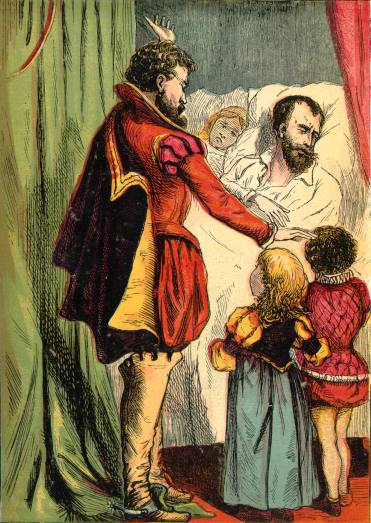
Their parents being dead and gone,
The children home he takes,
And brings them both unto his house,
Where much of them he makes.
He had not kept these pretty babes
A twelvemonth and a day,
When, for their wealth, he did devise
To make them both away.
He bargain'd with two ruffians bold,
Who were of savage mood,
That they should take the children twain,
And slay them in a wood.
They prate and prattle pleasantly
While riding on the way,
To those their wicked uncle hired,
These lovely babes to slay:
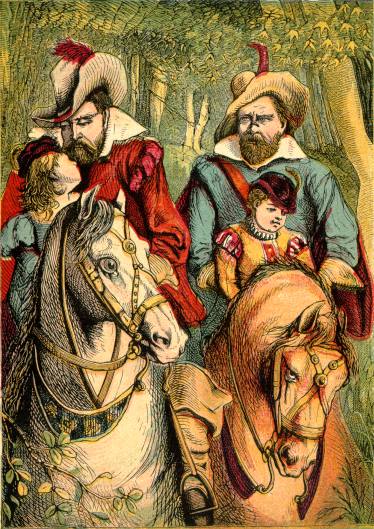
So that the pretty speech they had,
Made the ruffians' heart relent;
And they that took the deed to do,
Full sorely did repent.
Yet one of them, more hard of heart,
Did vow to do his charge,
Because the wretch that hired him
Had paid him very large.
The other would not agree thereto,
So here they fell at strife;
With one another they did fight,
About the children's life:
And he that was of milder mood,
Did slay the other there,
Within an unfrequented wood;
The babes did quake for fear!
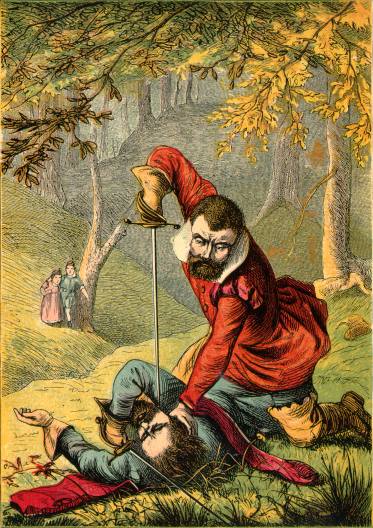
He took the children by the hand,
While they for bread complain:
“Stay here,” said he, “I'll bring ye bread,
When I do come again.”
These pretty babes, with hand in hand,
Went wandering up and down;
But never more they saw the man,
Approaching from the town:
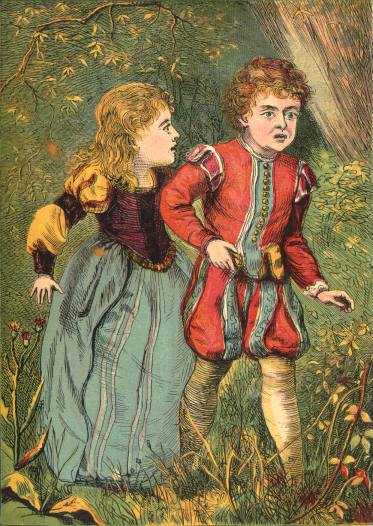
Thus wander'd these two pretty dears,
Till death did end their grief;
In one another's arms they died,
Poor babes, past all relief:
No burial these innocents
Of any man receives,
But robin red-breast lovingly
Did cover them with leaves.
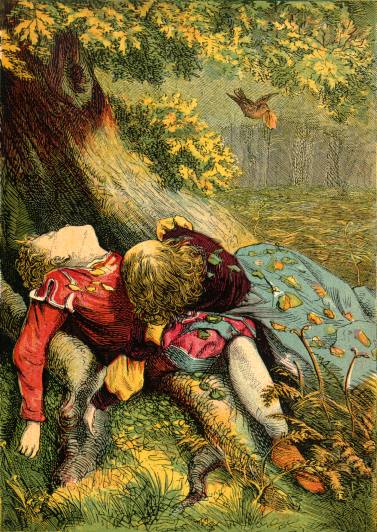
The fellow that did take in hand
These children for to kill,
Was for a robbery judged to die,
As was God's blessed will:
And did confess the very truth,
The which is here express'd;
Their uncle died while he for debt
Did long in prison rest.
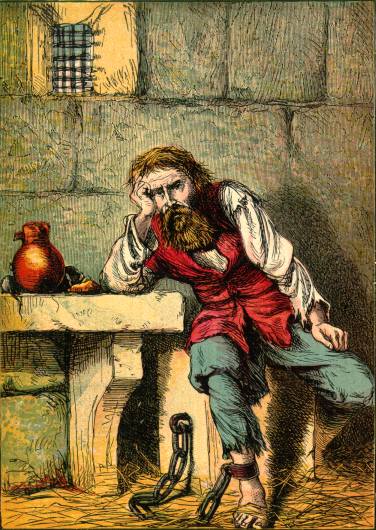
“Little Bo-Peep she lost her sheep
And didn't know where to find them.
Let them alone, and they'll come home,
And bring their tails behind them!”
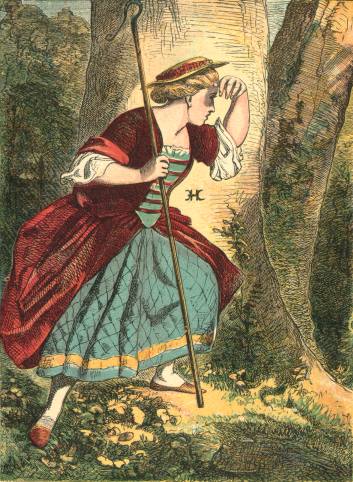
So runs the Nursery Rhyme. Little Bo-Peep was a very nice little girl. Her cheeks had a bloom on them like a lovely peach, and her voice sounded like a sweet silver bell.
But though Little Bo-Peep was as good as she was beautiful, she sometimes met with misfortunes that made her very sad. Once, when she lost her sheep, she was very doleful indeed. And this is how it happened.
One summer evening, when the sun was setting, Little Bo-Peep, who had to rise very early in the morning, felt tired, and sat down on a bank covered with daisies. Being very weary she soon fell fast asleep. Now the Bell-wether of Bo-Peep's flock was a most stupid and stubborn fellow. I dare say you know that all the sheep in a flock will follow the Bell-wether, and that he always wears a bell round his neck. It was a great pity, but the Bell-wether of Bo-Peep's flock was very wild, and was much given to wander far away into the wood, where of course the rest of the sheep would follow him.
Finding Little Bo-Peep asleep, the tiresome fellow began by standing on his hind legs and making a great bow to his shadow before him on the grass. After this he whirled himself round like a top, shaking his head all the time, and ringing his bell.
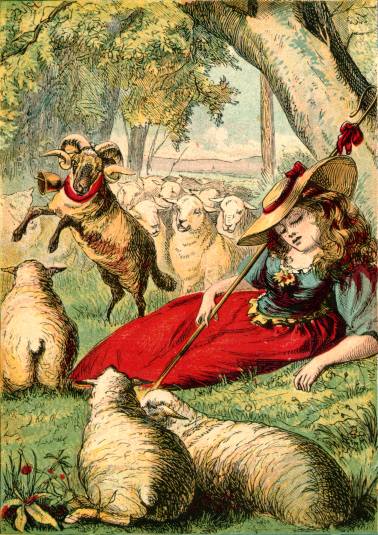
Very soon the rest of the flock began to dance and caper too. And when they had wheeled round their leader for a time, they ran off after him with a bound into the wood. Away they went, till they were quite tired out; and then they came to a stand-still, staring at their leader with very blank faces. But the Bell-wether looked foolish enough now, and did nothing but shake his head slowly and ring his bell, which seemed to say quite clearly, “You are lost, you are lost!”
When Little Bo-Peep awoke she found her sheep gone, and hardly knowing what she did, she walked on and on, far into the wood. She met some people with hoes and rakes in their hands, and asked them if they had seen her sheep. But they only laughed at her, and said, No. One man was very cross, and threatened to beat her. At last she came to a stile, on which an old Raven was perched. He looked so wise that Little Bo-Peep asked him whether he had seen a flock of sheep. But he only cried “Caw, caw, caw;” so Bo-Peep ran on again across the fields.
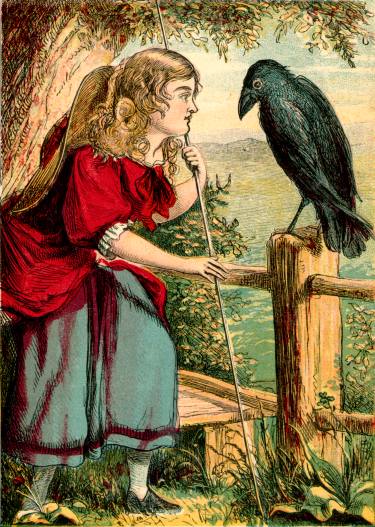
She wandered on till night-fall, and being faint with hunger, was very glad to see a light just before her. As she went on, she saw that it shone from a cottage window. But when she came to the door, it looked so dark and dismal that she was afraid to go in, and was just going to run away, when a cross-looking old woman came out, and dragged her into the cottage. She made her sit by the side of her son, who was a very ugly youth with a great red face and red hair.
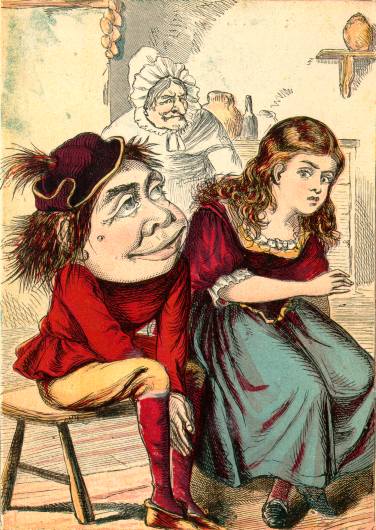
The old woman told him that she had brought Bo-Peep to be his wife, so Bo-Peep, who did not like him at all, ran away while they were asleep. But she did not know where to go, and gave herself up for lost, when she heard something cry, “tu-whit—tu-whoo,” in the tree above her. It was a great owl, which began flapping its wings with joy. Bo-Peep was frightened at first, but as the owl seemed very kind, she followed it. It took her to a cottage were there was plenty to eat and drink, and then, to Bo-Peep's great surprise, it began to speak, and told her this story:—
“Know, dear Maiden,” said the owl, “that I am the daughter of a King, and was a lovely Princess; but I was changed into an owl by the old woman at the cottage, because I would not marry her ugly son. But I have heard the fairies say that one day a lovely maiden, who would come into this wood to find her lost sheep, should be the means of my gaining my own form again. You are that pretty maid, and I will take you to a spot where you will find your sheep, but without their tails. The elves will play with them for this night, but in the morning every sheep will have its tail again, except the stupid Bell-wether. You must then wave his tail three times over my head, and I shall resume my shape again.”
The owl flew off, and led Bo-Peep into the wood, and said, “Sleep, maiden, I will watch.” How long she was asleep she could not tell, but the charmed spot was suddenly lighted up, and she saw the Queen of the Fairies seated on a bank. The Queen said the sheep should be punished for running away. She then saw all her sheep come trooping into the place, and on every sheep there was an Elf, who held in his hand a sheep's tail.
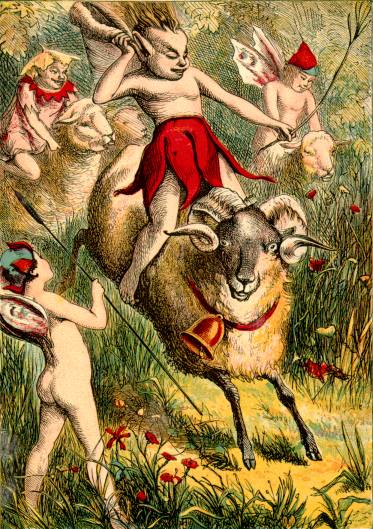
After riding them about for some time, and having great fun with them, the mad sport ceased, and each Elf restored the tail to his sheep—all but the Bell-wether's, which their leader hid in a tree. When Bo-Peep awoke, she saw the owl flapping its wings as if to remind her of her promise; so she fetched the tail, and waved it three times over its head, when up started the most charming Princess that ever was seen. The princess gave Bo-Peep a beautiful cottage, and her sheep never ran away from their kind mistress again.
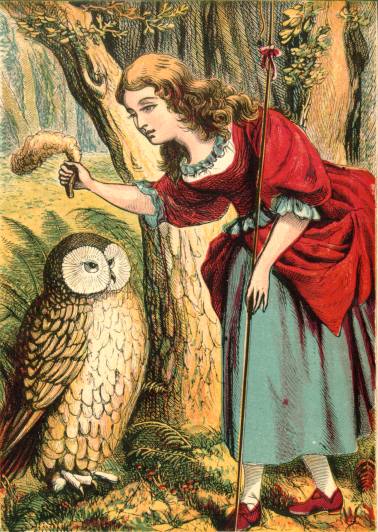
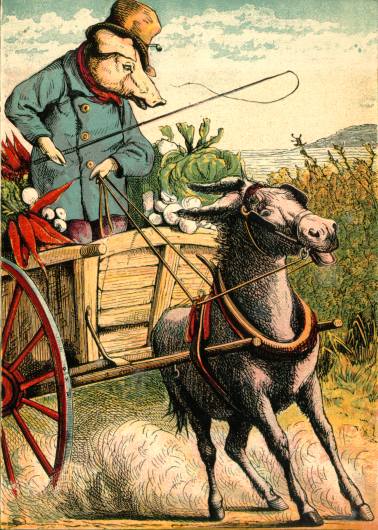
There was once a family of Five Little Pigs, and Mrs. Pig, their mother, loved them all very dearly. Some of these little pigs were very good, and took a great deal of trouble to please her. The eldest pig was so active and useful that he was called Mr. Pig. One day he went to market with his cart full of vegetables, but Rusty, the donkey, began to show his bad temper before he had gone very far on the road. All the coaxing and whipping would not make him move. So Mr. Pig took him out of the shafts, and being very strong, drew the cart to market himself. When he got there, all the other pigs began to laugh. But they did not laugh so loudly when Mr. Pig told them all his struggles on the road. Mr. Pig lost no time in selling his vegetables, and very soon after Rusty came trotting into the market-place, and as he now seemed willing to take his place in the cart, Mr. Pig started for home without delay. When he got there, he told Mrs. Pig his story, and she called him her best and most worthy son.
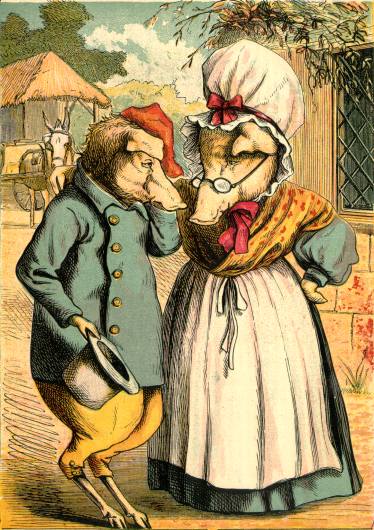
This little pig very much wanted to go with his brother, but as he was so mischievous that he could not be trusted far away, his mother made him stay at home, and told him to keep a good fire while she went out to the miller's to buy some flour. But as soon as he was alone, instead of learning his lessons, he began to tease the poor cat. Then he got the bellows, and cut the leather with a knife, so as to see where the wind came from: and when he could not find this out, he began to cry. After this he broke all his brother's toys; he forced the drum-stick through the drum, he tore off the tail from the kite, and then pulled off the horse's head. And then he went to the cupboard and ate the jam. When Mrs. Pig came home, she sat down by the fire, and being very tired, she soon fell asleep. No sooner had she done so, than this bad little pig got a long handkerchief and tied her in her chair. But soon she awoke and found out all the mischief that he had been doing. She saw at once the damage that he had done to his brother's playthings. So she quickly brought out her thickest and heaviest birch, and gave this naughty little pig such a beating as he did not forget for a long time.
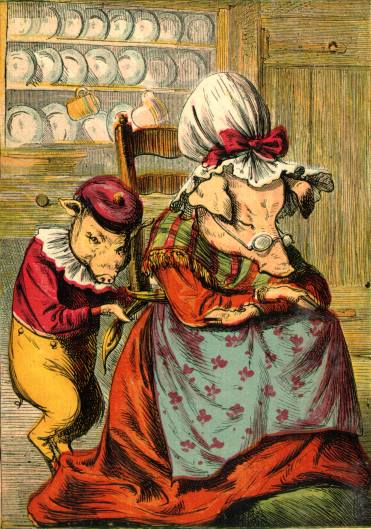
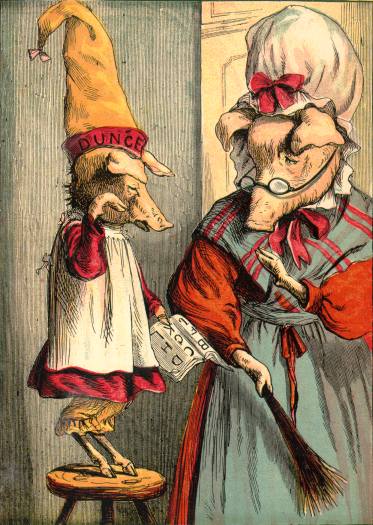
This little pig was a very good and careful fellow. He gave his mother scarcely any trouble, and always took a pleasure in doing all she bade him. Here you see him sitting down with clean hands and face, to some nice roast beef, while his brother, the idle pig, who is standing on a stool in the corner, with the dunce's cap on, has none. He sat down and quietly learned his lesson, and asked his mother to hear him repeat it. And this he did so well that Mrs. Pig stroked him on the ears and forehead, and called him a good little pig. After this he asked her to allow him to help her make tea. He brought everything she wanted, and lifted off the kettle from the fire, without spilling a drop either on his toes or the carpet. By-and-bye he went out, after asking his mother's leave, to play with his hoop. He had not gone far when he saw an old blind pig, who, with his hat in his hand was crying at the loss of his dog; so he put his hand in his pocket and found a halfpenny which he gave to the poor old pig. It was for such thoughtful conduct as this that his mother often gave this little pig roast beef. We now come to the little pig who had none.
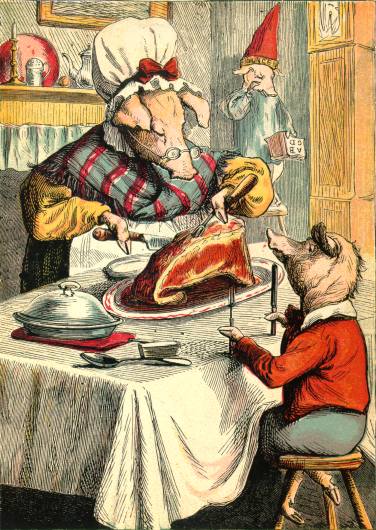
This was a most obstinate and wilful little pig. His mother had set him to learn his lesson, but no sooner had she gone out into the garden, than he tore his book into pieces. When his mother came back he ran off into the streets to play with other idle little pigs like himself. After this he quarrelled with one of the pigs and got a sound thrashing. Being afraid to go home, he stayed out till it was quite dark and caught a severe cold. So he was taken home and put to bed, and had to take a lot of nasty physic.
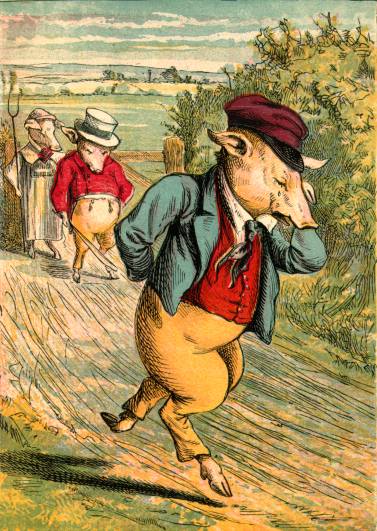
This little pig went fishing. Now he had been told not to go into Farmer Grumpey's grounds, who did not allow any one to fish in his part of the river. But in spite of what he had been told, this foolish little pig went there. He soon caught a very large fish, and while he was trying to carry it home, Farmer Grumpey came running along with his great whip. He quickly dropped the fish, but the farmer caught him, and as he laid his whip over his back for some time, the little pig ran off, crying, “Wee, wee, wee,” all the way home.

Old Mother Goose lived in a cottage with her son Jack. Jack was a very good lad, and although he was not handsome, he was good-tempered and industrious, and this made him better-looking than half the other boys. Old Mother Goose carried a long stick, she wore a high-crowned hat, and high-heeled shoes, and her kerchief was as white as snow. Then there was the Gander that swam in the pond, and the Owl that sat on the wall. So you see they formed a very happy family. But what a fine strong fellow the Gander was! Whenever Old Mother Goose wanted to take a journey, she would mount upon his broad strong back, and away he would fly and carry her swiftly to any distance.
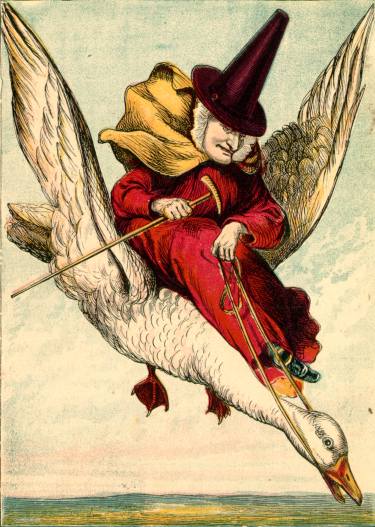
Now Old Mother Goose thought her Gander often looked sad and lonely; so one day she sent Jack to market to buy the finest Goose he could find. It was early in the morning when he started, and his way lay through a wood. He was not afraid of robbers; so on he went, with his Mother's great clothes-prop over his shoulder. The fresh morning air caused Jack's spirits to rise. He left the road, and plunged into the thick of the wood, where he amused himself by leaping with his clothes-prop till he found he had lost himself. After he had made many attempts to find the path again, he heard a scream. He jumped up and ran boldly towards the spot from which the sound came. Through an opening in the trees he saw a young lady trying to get away from a ruffian who wanted to steal her mantle. With one heavy blow of his staff Jack sent the thief howling away, and then went back to the young lady, who was lying on the ground, crying.
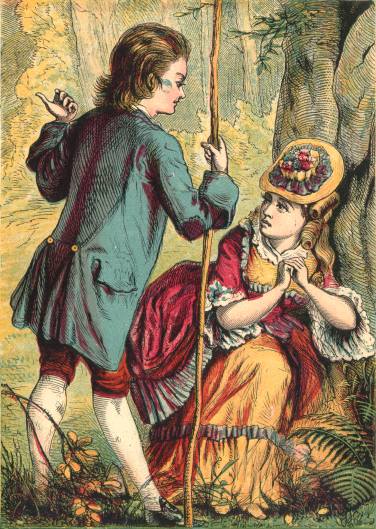
She soon dried her tears when she found that the robber had made off, and thanked Jack for his help. The young lady told Jack that she was the daughter of the Squire, who lived in the great white house on the hill-top. She knew the path out of the wood quite well, and when they reached the border, she said that Jack must come soon to her father's house, so that he might thank him for his noble conduct.
When Jack was left alone, he made the best of his way to the market-place. He found little trouble in picking out the best Goose, for when he got there he was very late, and there was but one left. But as it was a prime one, Jack bought it at once, and keeping to the road, made straight for home. At first the Goose objected to be carried; and then, when she had walked along slowly and gravely for a short time, she tried to fly away; so Jack seized her in his arms and kept her there till he reached home.
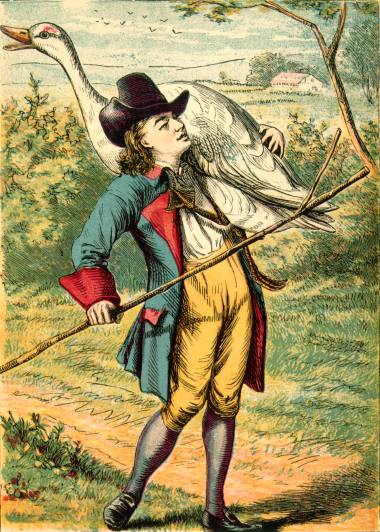
Old Mother Goose was greatly pleased when she saw what a fine bird Jack had bought; and the Gander showed more joy than I can describe. And then they all lived very happily for a long time. But Jack would often leave off work to dream of the lovely young lady whom he had rescued in the forest, and soon began to sigh all day long. He neglected the garden, cared no more for the Gander, and scarcely even noticed the beautiful Goose. But one morning, as he was walking by the pond, he saw both the Goose and the Gander making a great noise, as though they were in the utmost glee. He went up to them and was surprised to find on the bank a large golden egg. He ran with it to his mother, who said, “Go to market, my son; sell your egg, and you will soon be rich enough to pay a visit to the Squire.” So to market Jack went, and sold his golden egg; but the rogue who bought it of him cheated him out of half his due. Then he dressed himself in his finest clothes, and went up to the Squire's house. Two footmen stood at the door, one looking very stout and saucy, and the other sleepy and stupid.
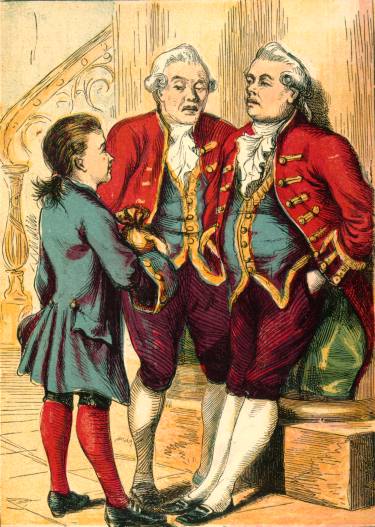
When Jack asked to see the Squire, they laughed at him, and made sport of his fine clothes; but Jack had wit enough to offer them each a guinea, when they at once showed him to the Squire's room.
Now the Squire, who was very rich, was also very proud and fat, and scarcely turned his head to notice Jack; but when he showed him his bag of gold, and asked for his daughter to be his bride, the Squire flew into a rage, and ordered his servants to throw him into the horse-pond. But this was not so easy to do, for Jack was strong and active; and then the young lady come out and begged her father to release him. This made Jack more deeply in love with her than ever, and he went home determined to win her in spite of all. And well did his wonderful Goose aid him in his design. Almost every morning she would lay him a golden egg, and Jack, grown wiser, would no longer sell them at half their value to the rogue who had before cheated him. So Jack soon grew to be a richer man than the Squire himself. His wealth became known to all the country round, and the Squire at length consented to accept Jack as his son-in-law. Then Old Mother Goose flew away into the woods on the back of her strong Gander, leaving the cottage and the Goose to Jack and his bride, who lived happily ever afterwards.
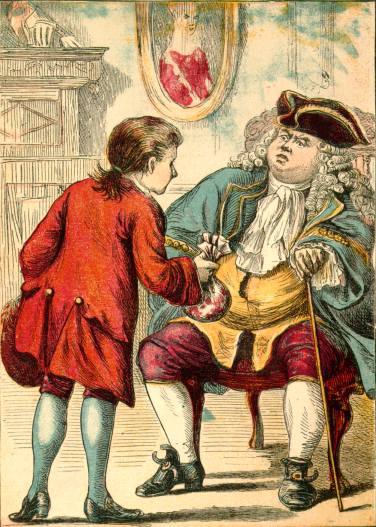
그냥 죽죽 읽어 나가세요. 모르는 문장이나 단어가 나와도 그냥 추측하고 지나가시기 바랍니다. 작은 것을 버리고 큰 것을 얻으면 됩니다. 모르는 문장은 그런 상황을 뒤에서 여러번 만나면 저절로 알게 됩니다. 그리고 단어는 미리 혹은 나중에 따로 공부하면 됩니다. 그런 것에 자꾸 걸리면 진도가 안나가고 진도가 안나가면 금방 그만 둡니다. 읽을 때는 오직 줄거리에만 집중하셔야 합니다.
독해는 종합적인 공부로서 단어, 숙어, 문법, 회화, 듣기, 작문 실력을 한꺼번에 늘려 줍니다. 모든 영어공부 중에서 가장 종합적인 것이 읽기 입니다. 독해를 많이 하면 소위 영어의 내공이 쌓여 갑니다. 책을 많이 읽는 사람은 도저히 당할 수가 없습니다. 진짜 영어고수들은 모두 독서를 많이 한 사람들입니다.
중고등학교에서 영어성적 상위 1%에 드는 학생이라면 대체로 초등학교 때 영어동화책을 많이 읽은 학생입니다. 읽기는 모든 공부의 기초이면서 또한 완성입니다. 이런 동화들을 죽죽 읽어 나가다 보면 영문독해력은 그야말로 가랑비에 옷 젖듯이 자기도 모르게 쑥쑥 향상됩니다. 일단은 공부한다는 생각을 버리고 재미있게 읽는데 촛점을 맞추시기 바랍니다. 욕심을 버리고 재미있게 읽다보면 독해실력은 저절로 따라오죠. 욕심을 버리는 것! 이게 어렵습니다.
말이 나온 김에, 단어 이야기도 좀 하겠습니다. 모르는 단어도 여러번 실제 상황 속에서 만나게 되면 대충의 뜻을 저절로 알게 됩니다. 심지어 그 단어의 분위기나 색깔은 사전에서 보다 더 정확히 알 수 있습니다. 또 이렇게 체득된 단어는 아주 오래 갑니다. 단어실력을 유지하는 데도 독해가 최고죠. 최소한의 독서량을 유지만 해도 단어실력은 줄지 않습니다.
독서량이 늘면 어휘력이 증가되는 것은 물론, 기존의 어휘력이 유지 되며, 더 나아가 대충 알고 있던 의미가 더 정확해지고 뚜렷해 집니다. 저처럼 평소에 무식하게 단어만 따로 외웠더라도 나중에 독해를 많이 하게 되면, 여러 상황 속에서 그런 단어들을 접하게 되므로 독해를 하면서 외운 단어들처럼 깊이 체화됩니다. 한 마디로, 독해야말로 어휘력을 늘리고 유지하고 정확히 하는 데도 최선의 방법입니다. 그래서 독해는 종합공부인 것이죠.
참고로, 상급자라 해도 다 같은 실력은 아닙니다. 하늘과 땅 차이일 수도 있습니다. 그러면 초기 상급자란 무엇인가? 일단 독해에 자신감이 있고 어떤 문장에 대해서도 거부감이 없는 상태이며 모르는 문장들이 나오더라도 실망하기 보다는 의욕과 투지가 불타는 수준을 말합니다. 어떤 상황에서도 포기하지 않고 오히려 모르는 문장들을 발전의 기회로 바라보는 수준이죠. 이 수준까지 가면 일단 그 사람은 영어가 강점이 되었으며 더 이상의 단계로 가는 것은 그냥 시간문제입니다.
미안하지만 이런 사람은 결코 다시 중급자나 하급자가 될 수 없습니다. 한 동안 영어를 놓았더라도 약간만 하면 금방 이전 수준으로 회복 됩니다. 영어실력 자체는 변동이 있을 수 있지만 마음 속에 한 번 자리잡은 자신감은 결코 사라지지 않습니다. 마치 자전거를 한 번 배운 사람은 언제라도 다시 자전거를 탈 수 있듯이요.^^
-----------------------
The Fiend
In a certain country there lived an old couple who had a daughter called Marusia (Mary). In their village it was customary to celebrate the feast of St. Andrew the First-Called (November 30). The girls used to assemble in some cottage, bake pampushki,[19] and enjoy themselves for a whole week, or even longer. Well, the girls met together once when this festival arrived, and brewed and baked what was wanted. In the evening came the lads with the music, bringing liquor with them, and dancing and revelry commenced. All the girls danced well, but Marusia the best of all. After a while there came into the cottage such a fine fellow! Marry, come up! regular blood and milk, and smartly and richly dressed.
“Hail, fair maidens!” says he.
“Hail, good youth!” say they.
[Pg 25] “You’re merry-making?”
“Be so good as to join us.”
Thereupon he pulled out of his pocket a purse full of gold, ordered liquor, nuts and gingerbread. All was ready in a trice, and he began treating the lads and lasses, giving each a share. Then he took to dancing. Why, it was a treat to look at him! Marusia struck his fancy more than anyone else; so he stuck close to her. The time came for going home.
“Marusia,” says he, “come and see me off.”
She went to see him off.
“Marusia, sweetheart!” says he, “would you like me to marry you?”
“If you like to marry me, I will gladly marry you. But where do you come from?”
“From such and such a place. I’m clerk at a merchant’s.”
Then they bade each other farewell and separated. When Marusia got home, her mother asked her:
“Well, daughter! have you enjoyed yourself?”
“Yes, mother. But I’ve something pleasant to tell you besides. There was a lad there from the neighborhood, good-looking and with lots of money, and he promised to marry me.”
“Harkye Marusia! When you go to where the girls are to-morrow, take a ball of thread with you, make a noose in it, and, when you are going to see him off, throw it over one of his buttons, and quietly unroll the ball; then, by means of the thread, you will be able to find out where he lives.”
Next day Marusia went to the gathering, and took a ball of thread with her. The youth came again.
“Good evening, Marusia!” said he.
“Good evening!” said she.
Games began and dances. Even more than before did he stick to Marusia, not a step would he budge from her. The time came for going home.
“Come and see me off, Marusia!” says the stranger.
She went out into the street, and while she was taking leave of him she quietly dropped the noose over one of his buttons. He went his way, but she remained where she was, unrolling the [Pg 26] ball. When she had unrolled the whole of it, she ran after the thread to find out where her betrothed lived. At first the thread followed the road, then it stretched across hedges and ditches, and led Marusia towards the church and right up to the porch. Marusia tried the door; it was locked. She went round the church, found a ladder, set it against a window, and climbed up it to see what was going on inside. Having got into the church, she looked—and saw her betrothed standing beside a grave and devouring a dead body—for a corpse had been left for that night in the church.
She wanted to get down the ladder quietly, but her fright prevented her from taking proper heed, and she made a little noise. Then she ran home—almost beside herself, fancying all the time she was being pursued. She was all but dead before she got in. Next morning her mother asked her:
“Well, Marusia! did you see the youth?”
“I saw him, mother,” she replied. But what else she had seen she did not tell.
In the morning Marusia was sitting, considering whether she would go to the gathering or not.
“Go,” said her mother. “Amuse yourself while you’re young!”
So she went to the gathering; the Fiend[20] was there already. Games, fun, dancing, began anew; the girls knew nothing of what had happened. When they began to separate and go homewards:
“Come, Marusia!” says the Evil One, “see me off.”
She was afraid, and didn’t stir. Then all the other girls opened out upon her.
“What are you thinking about? Have you grown so bashful, forsooth? Go and see the good lad off.”
There was no help for it. Out she went, not knowing what would come of it. As soon as they got into the streets he began questioning her:
“You were in the church last night?”
[Pg 27] “No.”
“And saw what I was doing there?”
“No.”
“Very well! To-morrow your father will die!”
Having said this, he disappeared.
Marusia returned home grave and sad. When she woke up in the morning, her father lay dead!
They wept and wailed over him, and laid him in the coffin. In the evening her mother went off to the priest’s, but Marusia remained at home. At last she became afraid of being alone in the house. “Suppose I go to my friends,” she thought. So she went, and found the Evil One there.
“Good evening, Marusia! why arn’t you merry?”
“How can I be merry? My father is dead!”
“Oh! poor thing!”
They all grieved for her. Even the Accursed One himself grieved; just as if it hadn’t all been his own doing. By and by they began saying farewell and going home.
“Marusia,” says he, “see me off.”
She didn’t want to.
“What are you thinking of, child?” insist the girls. “What are you afraid of? Go and see him off.”
So she went to see him off. They passed out into the street.
“Tell me, Marusia,” says he, “were you in the church?”
“No.”
“Did you see what I was doing?”
“No.”
“Very well! To-morrow your mother will die.”
He spoke and disappeared. Marusia returned home sadder than ever. The night went by; next morning, when she awoke, her mother lay dead! She cried all day long; but when the sun set, and it grew dark around, Marusia became afraid of being left alone; so she went to her companions.
“Why, whatever’s the matter with you? you’re clean out of countenance!”[21] say the girls.
[Pg 28] “How am I likely to be cheerful? Yesterday my father died, and to-day my mother.”
“Poor thing! Poor unhappy girl!” they all exclaim sympathizingly.
Well, the time came to say good-bye. “See me off, Marusia,” says the Fiend. So she went out to see him off.
“Tell me; were you in the church?”
“No.”
“And saw what I was doing?”
“No.”
“Very well! To-morrow evening you will die yourself!”
Marusia spent the night with her friends; in the morning she got up and considered what she should do. She bethought herself that she had a grandmother—an old, very old woman, who had become blind from length of years. “Suppose I go and ask her advice,” she said, and then went off to her grandmother’s.
“Good-day, granny!” says she.
“Good-day, granddaughter! What news is there with you? How are your father and mother?”
“They are dead, granny,” replied the girl, and then told her all that had happened.
The old woman listened, and said:—
“Oh dear me! my poor unhappy child! Go quickly to the priest, and ask him this favor—that if you die, your body shall not be taken out of the house through the doorway, but that the ground shall be dug away from under the threshold, and that you shall be dragged out through that opening. And also beg that you may be buried at a crossway, at a spot where four roads meet.”
Marusia went to the priest, wept bitterly, and made him promise to do everything according to her grandmother’s instructions. Then she returned home, bought a coffin, lay down in it, and straightway expired.
Well, they told the priest, and he buried, first her father and [Pg 29] mother, and then Marusia herself. Her body was passed underneath the threshold and buried at a crossway.
Soon afterwards a seigneur’s son happened to drive past Marusia’s grave. On that grave he saw growing a wondrous flower, such a one as he had never seen before. Said the young seigneur to his servant:—
“Go and pluck up that flower by the roots. We’ll take it home and put it in a flower-pot. Perhaps it will blossom there.”
Well, they dug up the flower, took it home, put it in a glazed flower-pot, and set it in a window. The flower began to grow larger and more beautiful. One night the servant hadn’t gone to sleep somehow, and he happened to be looking at the window, when he saw a wondrous thing take place. All of a sudden the flower began to tremble, then it fell from its stem to the ground, and turned into a lovely maiden. The flower was beautiful, but the maiden was more beautiful still. She wandered from room to room, got herself various things to eat and drink, ate and drank, then stamped upon the ground and became a flower as before, mounted to the window, and resumed her place upon the stem. Next day the servant told the young seigneur of the wonders which he had seen during the night.
“Ah, brother!” said the youth, “why didn’t you wake me? To-night we’ll both keep watch together.”
The night came; they slept not, but watched. Exactly at twelve o’clock the blossom began to shake, flew from place to place, and then fell to the ground, and the beautiful maiden appeared, got herself things to eat and drink, and sat down to supper. The young seigneur rushed forward and seized her by her white hands. Impossible was it for him sufficiently to look at her, to gaze on her beauty!
Next morning he said to his father and mother, “Please allow me to get married. I’ve found myself a bride.”
His parents gave their consent. As for Marusia, she said:
“Only on this condition will I marry you—that for four years I need not go to church.”
[Pg 30] “Very good,” said he.
Well, they were married, and they lived together one year, two years, and had a son. But one day they had visitors at their house, who enjoyed themselves, and drank, and began bragging about their wives. This one’s wife was handsome; that one’s was handsomer still.
“You may say what you like,” says the host, “but a handsomer wife than mine does not exist in the whole world!”
“Handsome, yes!” reply the guests, “but a heathen.”
“How so?”
“Why, she never goes to church.”
Her husband found these observations distasteful. He waited till Sunday, and then told his wife to get dressed for church.
“I don’t care what you may say,” says he. “Go and get ready directly.”
Well, they got ready, and went to church. The husband went in—didn’t see anything particular. But when she looked round—there was the Fiend sitting at a window.
“Ha! here you are, at last!” he cried. “Remember old times. Were you in the church that night?”
“No.”
“And did you see what I was doing there?”
“No.”
“Very well! To-morrow both your husband and your son will die.”
Marusia rushed straight out of the church and away to her grandmother. The old woman gave her two phials, the one full of holy water, the other of the water of life, and told her what she was to do. Next day both Marusia’s husband and her son died. Then the Fiend came flying to her and asked:—
“Tell me; were you in the church?”
“I was.”
“And did you see what I was doing?”
“You were eating a corpse.”
She spoke, and splashed the holy water over him; in a [Pg 31] moment he turned into mere dust and ashes, which blew to the winds. Afterwards she sprinkled her husband and her boy with the water of life: straightway they revived. And from that time forward they knew neither sorrow nor separation, but they all lived together long and happily.[22]
Another lively sketch of a peasant’s love-making is given in the introduction to the story of “Ivan the widow’s son and Grisha.”[23] The tale is one of magic and enchantment, of living clouds and seven-headed snakes; but the opening is a little piece of still-life very quaintly portrayed. A certain villager, named Trofim, having been unable to find a wife, his Aunt Melania comes to his aid, promising to procure him an interview with a widow who has been left well provided for, and whose personal appearance is attractive—“real blood and milk! When she’s got on her holiday clothes, she’s as fine as a peacock!” Trofim grovels with gratitude at his aunt’s feet. “My own dear auntie, Melania Prokhorovna, get me married for heaven’s sake! I’ll buy you an embroidered kerchief in return, the very best in the whole market.” The widow comes to pay Melania a visit, and is induced to believe, on the evidence of beans (frequently used for the purpose of divination), that her destined husband is close at hand. At this propitious [Pg 32] moment Trofim appears. Melania makes a little speech to the young couple, ending her recommendation to get married with the words:—
“I can see well enough by the bridegroom’s eyes that the bride is to his taste, only I don’t know what the bride thinks about taking him.”
“I don’t mind!” says the widow. “Well, then, glory be to God! Now, stand up, we’ll say a prayer before the Holy Pictures; then give each other a kiss, and go in Heaven’s name and get married at once!” And so the question is settled.
From a courtship and a marriage in peasant life we may turn to a death and a burial. There are frequent allusions in the Skazkas to these gloomy subjects, with reference to which we will quote two stories, the one pathetic, the other (unintentionally) grotesque. Neither of them bears any title in the original, but we may style the first—
그냥 죽죽 읽어 나가세요. 모르는 문장이나 단어가 나와도 그냥 추측하고 지나가시기 바랍니다. 작은 것을 버리고 큰 것을 얻으면 됩니다. 모르는 문장은 그런 상황을 뒤에서 여러번 만나면 저절로 알게 됩니다. 그리고 단어는 미리 혹은 나중에 따로 공부하면 됩니다. 그런 것에 자꾸 걸리면 진도가 안나가고 진도가 안나가면 금방 그만 둡니다. 읽을 때는 오직 줄거리에만 집중하셔야 합니다.
독해는 종합적인 공부로서 단어, 숙어, 문법, 회화, 듣기, 작문 실력을 한꺼번에 늘려 줍니다. 모든 영어공부 중에서 가장 종합적인 것이 읽기 입니다. 독해를 많이 하면 소위 영어의 내공이 쌓여 갑니다. 책을 많이 읽는 사람은 도저히 당할 수가 없습니다. 진짜 영어고수들은 모두 독서를 많이 한 사람들입니다.
중고등학교에서 영어성적 상위 1%에 드는 학생이라면 대체로 초등학교 때 영어동화책을 많이 읽은 학생입니다. 읽기는 모든 공부의 기초이면서 또한 완성입니다. 이런 동화들을 죽죽 읽어 나가다 보면 영문독해력은 그야말로 가랑비에 옷 젖듯이 자기도 모르게 쑥쑥 향상됩니다. 일단은 공부한다는 생각을 버리고 재미있게 읽는데 촛점을 맞추시기 바랍니다. 욕심을 버리고 재미있게 읽다보면 독해실력은 저절로 따라오죠. 욕심을 버리는 것! 이게 어렵습니다.
말이 나온 김에, 단어 이야기도 좀 하겠습니다. 모르는 단어도 여러번 실제 상황 속에서 만나게 되면 대충의 뜻을 저절로 알게 됩니다. 심지어 그 단어의 분위기나 색깔은 사전에서 보다 더 정확히 알 수 있습니다. 또 이렇게 체득된 단어는 아주 오래 갑니다. 단어실력을 유지하는 데도 독해가 최고죠. 최소한의 독서량을 유지만 해도 단어실력은 줄지 않습니다.
독서량이 늘면 어휘력이 증가되는 것은 물론, 기존의 어휘력이 유지 되며, 더 나아가 대충 알고 있던 의미가 더 정확해지고 뚜렷해 집니다. 평소에 무식하게 단어만 따로 외웠더라도 나중에 독해를 많이 하게 되면, 여러 상황 속에서 그런 단어들을 접하게 되므로 독해를 하면서 외운 단어들처럼 깊이 체화됩니다. 한 마디로, 독해야말로 어휘력을 늘리고 유지하고 정확히 하는 데도 최선의 방법입니다. 그래서 독해는 종합공부인 것이죠.
참고로, 상급자라 해도 다 같은 실력은 아닙니다. 하늘과 땅 차이일 수도 있습니다. 그러면 초기 상급자란 무엇인가? 일단 독해에 자신감이 있고 어떤 문장에 대해서도 거부감이 없는 상태이며 모르는 문장들이 나오더라도 실망하기 보다는 의욕과 투지가 불타는 수준을 말합니다. 어떤 상황에서도 포기하지 않고 오히려 모르는 문장들을 발전의 기회로 바라보는 수준이죠. 이 수준까지 가면 일단 그 사람은 영어가 강점이 되었으며 더 이상의 단계로 가는 것은 그냥 시간문제입니다.
미안하지만 이런 사람은 결코 다시 중급자나 하급자가 될 수 없습니다. 한 동안 영어를 놓았더라도 약간만 하면 금방 이전 수준으로 회복 됩니다. 영어실력 자체는 변동이 있을 수 있지만 마음 속에 한 번 자리잡은 자신감은 결코 사라지지 않습니다. 마치 자전거를 한 번 배운 사람은 언제라도 다시 자전거를 탈 수 있듯이요.^^
-----------------------
The Story of the Merchant and the Genius
Sire, there was once upon a time a merchant who possessed great wealth, in land and merchandise, as well as in ready money. He was obliged from time to time to take journeys to arrange his affairs. One day, having to go a long way from home, he mounted his horse, taking with him a small wallet in which he had put a few biscuits and dates, because he had to pass through the desert where no food was to be got. He arrived without any mishap, and, having finished his business, set out on his return. On the fourth day of his journey, the heat of the sun being very great, he turned out of his road to rest under some trees. He found at the foot of a large walnut-tree a fountain of clear and running water. He dismounted, fastened his horse to a branch of the tree, and sat by the fountain, after having taken from his wallet some of his dates and biscuits. When he had finished this frugal meal he washed his face and hands in the fountain.
When he was thus employed he saw an enormous genius, white with rage, coming towards him, with a scimitar in his hand.
"Arise," he cried in a terrible voice, "and let me kill you as you have killed my son!"
As he uttered these words he gave a frightful yell. The merchant, quite as much terrified at the hideous face of the monster as at his words, answered him tremblingly, "Alas, good sir, what can I have done to you to deserve death?"
"I shall kill you," repeated the genius, "as you have killed my son."
"But," said the merchant, "how can I have killed your son? I do not know him, and I have never even seen him."
"When you arrived here did you not sit down on the ground?" asked the genius, "and did you not take some dates from your wallet, and whilst eating them did not you throw the stones about?"
"Yes," said the merchant, "I certainly did so."
"Then," said the genius, "I tell you you have killed my son, for whilst you were throwing about the stones, my son passed by, and one of them struck him in the eye and killed him. So I shall kill you."
"Ah, sir, forgive me!" cried the merchant.
"I will have no mercy on you," answered the genius.
"But I killed your son quite unintentionally, so I implore you to spare my life."
"No," said the genius, "I shall kill you as you killed my son," and so saying, he seized the merchant by the arm, threw him on the ground, and lifted his sabre to cut off his head.
The merchant, protesting his innocence, bewailed his wife and children, and tried pitifully to avert his fate. The genius, with his raised scimitar, waited till he had finished, but was not in the least touched.
Scheherazade, at this point, seeing that it was day, and knowing that the Sultan always rose very early to attend the council, stopped speaking.
"Indeed, sister," said Dinarzade, "this is a wonderful story."
"The rest is still more wonderful," replied Scheherazade, "and you would say so, if the sultan would allow me to live another day, and would give me leave to tell it to you the next night."
Schahriar, who had been listening to Scheherazade with pleasure, said to himself, "I will wait till to-morrow; I can always have her killed when I have heard the end of her story."
All this time the grand-vizir was in a terrible state of anxiety. But he was much delighted when he saw the Sultan enter the council-chamber without giving the terrible command that he was expecting.
The next morning, before the day broke, Dinarzade said to her sister, "Dear sister, if you are awake I pray you to go on with your story."
The Sultan did not wait for Scheherazade to ask his leave. "Finish," said he, "the story of the genius and the merchant. I am curious to hear the end."
So Scheherazade went on with the story. This happened every morning. The Sultana told a story, and the Sultan let her live to finish it.
When the merchant saw that the genius was determined to cut off his head, he said: "One word more, I entreat you. Grant me a little delay; just a short time to go home and bid my wife and children farewell, and to make my will. When I have done this I will come back here, and you shall kill me."
"But," said the genius, "if I grant you the delay you ask, I am afraid that you will not come back."
"I give you my word of honour," answered the merchant, "that I will come back without fail."
"How long do you require?" asked the genius.
"I ask you for a year's grace," replied the merchant. "I promise you that to-morrow twelvemonth, I shall be waiting under these trees to give myself up to you."
On this the genius left him near the fountain and disappeared.
The merchant, having recovered from his fright, mounted his horse and went on his road.
When he arrived home his wife and children received him with the greatest joy. But instead of embracing them he began to weep so bitterly that they soon guessed that something terrible was the matter.
"Tell us, I pray you," said his wife, "what has happened."
"Alas!" answered her husband, "I have only a year to live."
Then he told them what had passed between him and the genius, and how he had given his word to return at the end of a year to be killed. When they heard this sad news they were in despair, and wept much.
The next day the merchant began to settle his affairs, and first of all to pay his debts. He gave presents to his friends, and large alms to the poor. He set his slaves at liberty, and provided for his wife and children. The year soon passed away, and he was obliged to depart. When he tried to say good-bye he was quite overcome with grief, and with difficulty tore himself away. At length he reached the place where he had first seen the genius, on the very day that he had appointed. He dismounted, and sat down at the edge of the fountain, where he awaited the genius in terrible suspense.
Whilst he was thus waiting an old man leading a hind came towards him. They greeted one another, and then the old man said to him, "May I ask, brother, what brought you to this desert place, where there are so many evil genii about? To see these beautiful trees one would imagine it was inhabited, but it is a dangerous place to stop long in."
The merchant told the old man why he was obliged to come there. He listened in astonishment.
"This is a most marvellous affair. I should like to be a witness of your interview with the genius." So saying he sat down by the merchant.
While they were talking another old man came up, followed by two black dogs. He greeted them, and asked what they were doing in this place. The old man who was leading the hind told him the adventure of the merchant and the genius. The second old man had not sooner heard the story than he, too, decided to stay there to see what would happen. He sat down by the others, and was talking, when a third old man arrived. He asked why the merchant who was with them looked so sad. They told him the story, and he also resolved to see what would pass between the genius and the merchant, so waited with the rest.
They soon saw in the distance a thick smoke, like a cloud of dust. This smoke came nearer and nearer, and then, all at once, it vanished, and they saw the genius, who, without speaking to them, approached the merchant, sword in hand, and, taking him by the arm, said, "Get up and let me kill you as you killed my son."
The merchant and the three old men began to weep and groan.
Then the old man leading the hind threw himself at the monster's feet and said, "O Prince of the Genii, I beg of you to stay your fury and to listen to me. I am going to tell you my story and that of the hind I have with me, and if you find it more marvellous than that of the merchant whom you are about to kill, I hope that you will do away with a third part of his punishment?"
The genius considered some time, and then he said, "Very well, I agree to this."
그냥 죽죽 읽어 나가세요. 모르는 문장이나 단어가 나와도 그냥 추측하고 지나가시기 바랍니다. 작은 것을 버리고 큰 것을 얻으면 됩니다. 모르는 문장은 그런 상황을 뒤에서 여러번 만나면 저절로 알게 됩니다. 그리고 단어는 미리 혹은 나중에 따로 공부하면 됩니다. 그런 것에 자꾸 걸리면 진도가 안나가고 진도가 안나가면 금방 그만 둡니다. 읽을 때는 오직 줄거리에만 집중하셔야 합니다.
독해는 종합적인 공부로서 단어, 숙어, 문법, 회화, 듣기, 작문 실력을 한꺼번에 늘려 줍니다. 모든 영어공부 중에서 가장 종합적인 것이 읽기 입니다. 독해를 많이 하면 소위 영어의 내공이 쌓여 갑니다. 책을 많이 읽는 사람은 도저히 당할 수가 없습니다. 진짜 영어고수들은 모두 독서를 많이 한 사람들입니다.
중고등학교에서 영어성적 상위 1%에 드는 학생이라면 대체로 초등학교 때 영어동화책을 많이 읽은 학생입니다. 읽기는 모든 공부의 기초이면서 또한 완성입니다. 이런 동화들을 죽죽 읽어 나가다 보면 영문독해력은 그야말로 가랑비에 옷 젖듯이 자기도 모르게 쑥쑥 향상됩니다. 일단은 공부한다는 생각을 버리고 재미있게 읽는데 촛점을 맞추시기 바랍니다. 욕심을 버리고 재미있게 읽다보면 독해실력은 저절로 따라오죠. 욕심을 버리는 것! 이게 어렵습니다.
말이 나온 김에, 단어 이야기도 좀 하겠습니다. 모르는 단어도 여러번 실제 상황 속에서 만나게 되면 대충의 뜻을 저절로 알게 됩니다. 심지어 그 단어의 분위기나 색깔은 사전에서 보다 더 정확히 알 수 있습니다. 또 이렇게 체득된 단어는 아주 오래 갑니다. 단어실력을 유지하는 데도 독해가 최고죠. 최소한의 독서량을 유지만 해도 단어실력은 줄지 않습니다.
독서량이 늘면 어휘력이 증가되는 것은 물론, 기존의 어휘력이 유지 되며, 더 나아가 대충 알고 있던 의미가 더 정확해지고 뚜렷해 집니다. 평소에 무식하게 단어만 따로 외웠더라도 나중에 독해를 많이 하게 되면, 여러 상황 속에서 그런 단어들을 접하게 되므로 독해를 하면서 외운 단어들처럼 깊이 체화됩니다. 한 마디로, 독해야말로 어휘력을 늘리고 유지하고 정확히 하는 데도 최선의 방법입니다. 그래서 독해는 종합공부인 것이죠.
참고로, 상급자라 해도 다 같은 실력은 아닙니다. 하늘과 땅 차이일 수도 있습니다. 그러면 초기 상급자란 무엇인가? 일단 독해에 자신감이 있고 어떤 문장에 대해서도 거부감이 없는 상태이며 모르는 문장들이 나오더라도 실망하기 보다는 의욕과 투지가 불타는 수준을 말합니다. 어떤 상황에서도 포기하지 않고 오히려 모르는 문장들을 발전의 기회로 바라보는 수준이죠. 이 수준까지 가면 일단 그 사람은 영어가 강점이 되었으며 더 이상의 단계로 가는 것은 그냥 시간문제입니다.
미안하지만 이런 사람은 결코 다시 중급자나 하급자가 될 수 없습니다. 한 동안 영어를 놓았더라도 약간만 하면 금방 이전 수준으로 회복 됩니다. 영어실력 자체는 변동이 있을 수 있지만 마음 속에 한 번 자리잡은 자신감은 결코 사라지지 않습니다. 마치 자전거를 한 번 배운 사람은 언제라도 다시 자전거를 탈 수 있듯이요.^^
-----------------------
The Story of the First Old Man and of the Hind
I am now going to begin my story (said the old man), so please attend.
This hind that you see with me is my wife. We have no children of our own, therefore I adopted the son of a favorite slave, and determined to make him my heir.
My wife, however, took a great dislike to both mother and child, which she concealed from me till too late. When my adopted son was about ten years old I was obliged to go on a journey. Before I went I entrusted to my wife's keeping both the mother and child, and begged her to take care of them during my absence, which lasted a whole year. During this time she studied magic in order to carry out her wicked scheme. When she had learnt enough she took my son into a distant place and changed him into a calf. Then she gave him to my steward, and told him to look after a calf she had bought. She also changed the slave into a cow, which she sent to my steward.
When I returned I inquired after my slave and the child. "Your slave is dead," she said, "and as for your son, I have not seen him for two months, and I do not know where he is."
I was grieved to hear of my slave's death, but as my son had only disappeared, I thought I should soon find him. Eight months, however, passed, and still no tidings of him; then the feast of Bairam came.
To celebrate it I ordered my steward to bring me a very fat cow to sacrifice. He did so. The cow that he brought was my unfortunate slave. I bound her, but just as I was about to kill her she began to low most piteously, and I saw that her eyes were streaming with tears. It seemed to me most extraordinary, and, feeling a movement of pity, I ordered the steward to lead her away and bring another. My wife, who was present, scoffed at my compassion, which made her malice of no avail. "What are you doing?" she cried. "Kill this cow. It is the best we have to sacrifice."
To please her, I tried again, but again the animal's lows and tears disarmed me.
"Take her away," I said to the steward, "and kill her; I cannot."
The steward killed her, but on skinning her found that she was nothing but bones, although she appeared so fat. I was vexed.
"Keep her for yourself," I said to the steward, "and if you have a fat calf, bring that in her stead."
In a short time he brought a very fat calf, which, although I did not know it, was my son. It tried hard to break its cord and come to me. It threw itself at my feet, with its head on the ground, as if it wished to excite my pity, and to beg me not to take away its life.
I was even more surprised and touched at this action than I had been at the tears of the cow.
"Go," I said to the steward, "take back this calf, take great care of it, and bring me another in its place instantly."
As soon as my wife heard me speak this she at once cried out, "What are you doing, husband? Do not sacrifice any calf but this."
"Wife," I answered, "I will not sacrifice this calf," and in spite of all her remonstrances, I remained firm.
I had another calf killed; this one was led away. The next day the steward asked to speak to me in private.
"I have come," he said, "to tell you some news which I think you will like to hear. I have a daughter who knows magic. Yesterday, when I was leading back the calf which you refused to sacrifice, I noticed that she smiled, and then directly afterwards began to cry. I asked her why she did so."
"Father," she answered, "this calf is the son of our master. I smile with joy at seeing him still alive, and I weep to think of his mother, who was sacrificed yesterday as a cow. These changes have been wrought by our master's wife, who hated the mother and son."
"At these words, of Genius," continued the old man, "I leave you to imagine my astonishment. I went immediately with the steward to speak with his daughter myself. First of all I went to the stable to see my son, and he replied in his dumb way to all my caresses. When the steward's daughter came I asked her if she could change my son back to his proper shape."
"Yes, I can," she replied, "on two conditions. One is that you will give him to me for a husband, and the other is that you will let me punish the woman who changed him into a calf."
"To the first condition," I answered, "I agree with all my heart, and I will give you an ample dowry. To the second I also agree, I only beg you to spare her life."
"That I will do," she replied; "I will treat her as she treated your son."
Then she took a vessel of water and pronounced over it some words I did not understand; then, on throwing the water over him, he became immediately a young man once more.
"My son, my dear son," I exclaimed, kissing him in a transport of joy. "This kind maiden has rescued you from a terrible enchantment, and I am sure that out of gratitude you will marry her."
He consented joyfully, but before they were married, the young girl changed my wife into a hind, and it is she whom you see before you. I wished her to have this form rather than a stranger one, so that we could see her in the family without repugnance.
Since then my son has become a widower and has gone travelling. I am now going in search of him, and not wishing to confide my wife to the care of other people, I am taking her with me. Is this not a most marvellous tale?
"It is indeed," said the genius, "and because of it I grant to you the third part of the punishment of this merchant."
When the first old man had finished his story, the second, who was leading the two black dogs, said to the genius, "I am going to tell you what happened to me, and I am sure that you will find my story even more astonishing than the one to which you have just been listening. But when I have related it, will you grant me also the third part of the merchant's punishment?"
"Yes," replied the genius, "provided that your story surpasses that of the hind."
With this agreement the second old man began in this way.